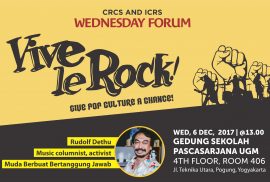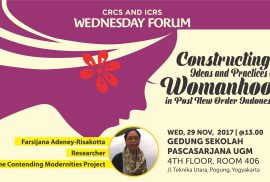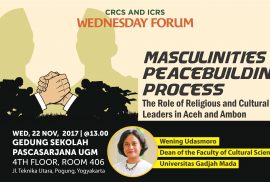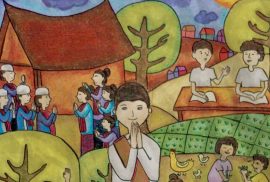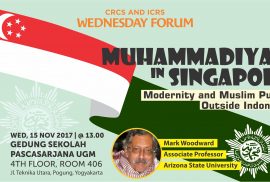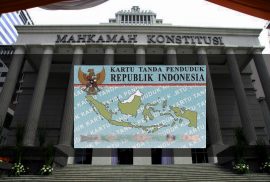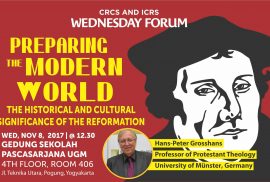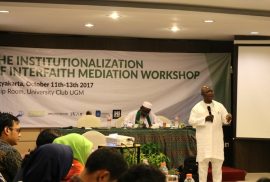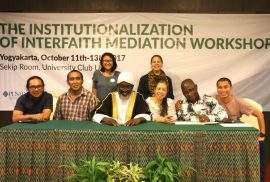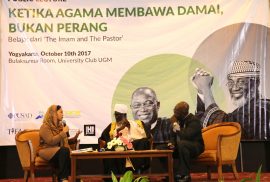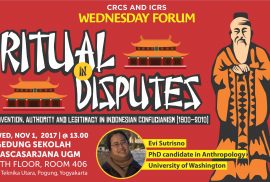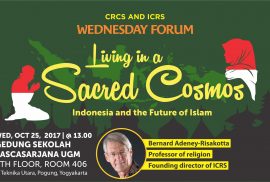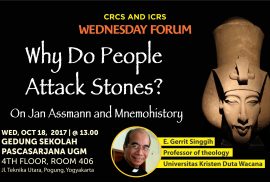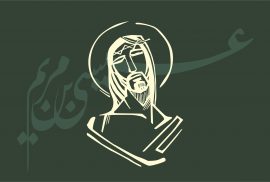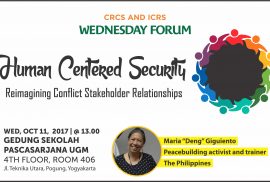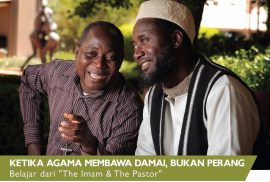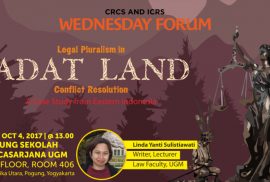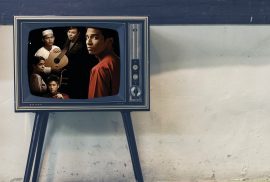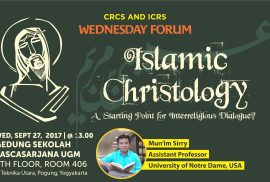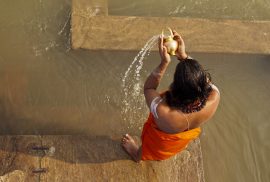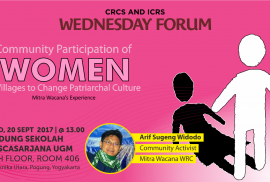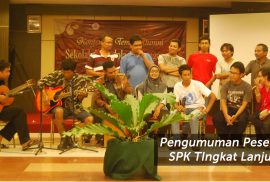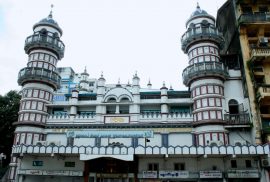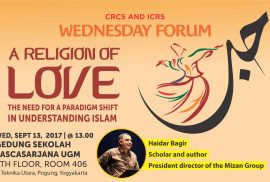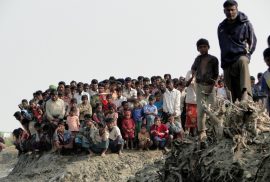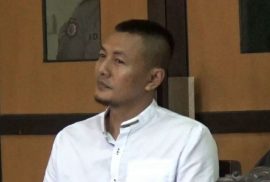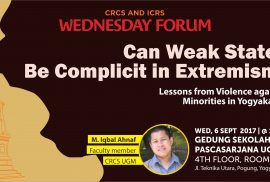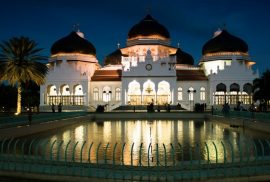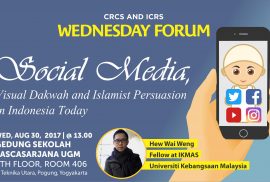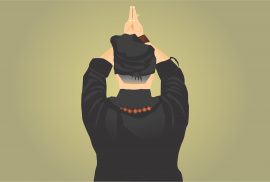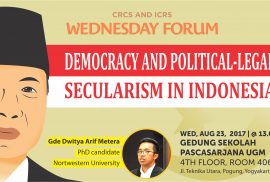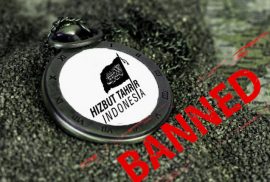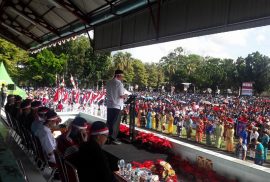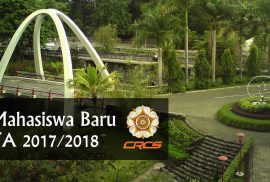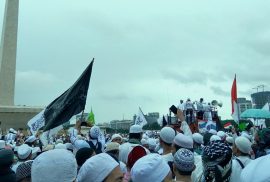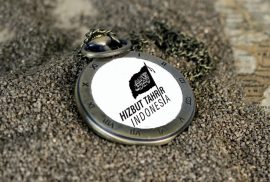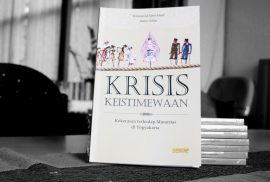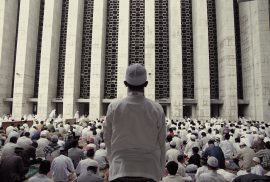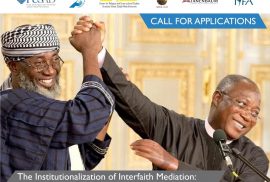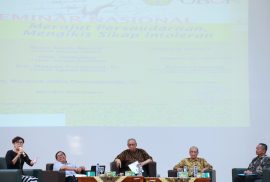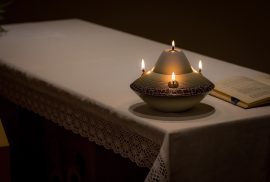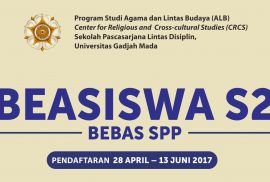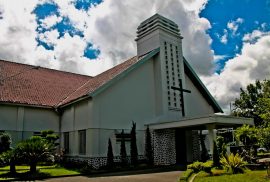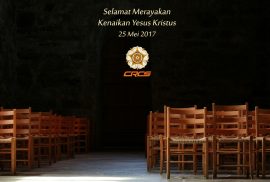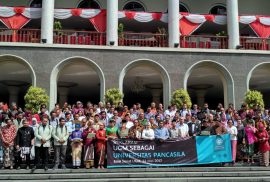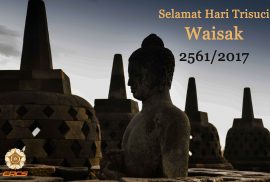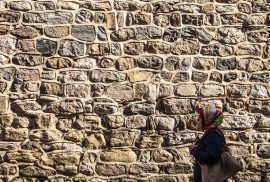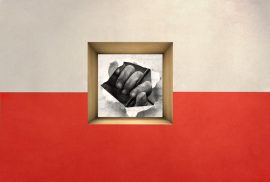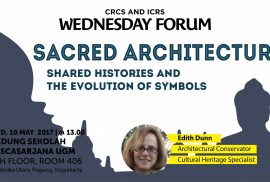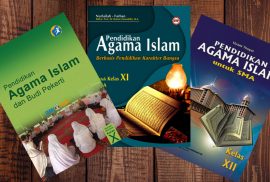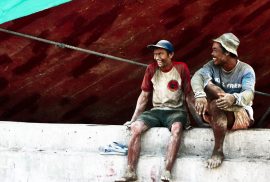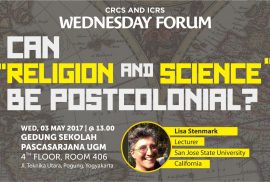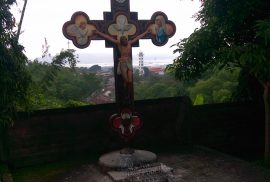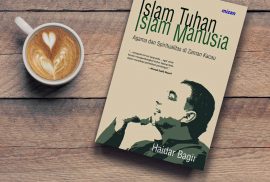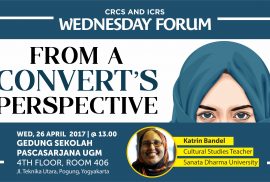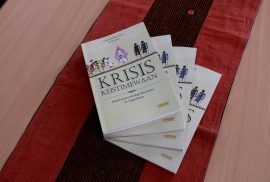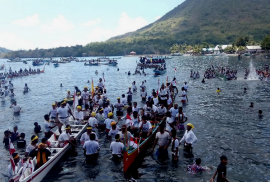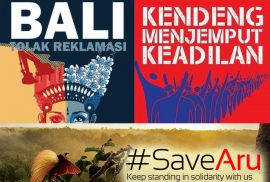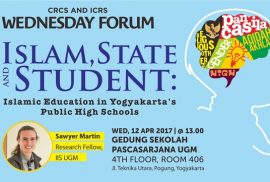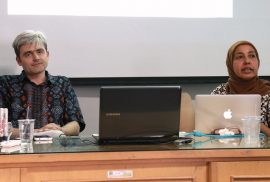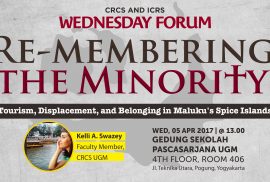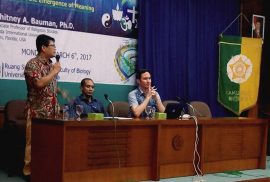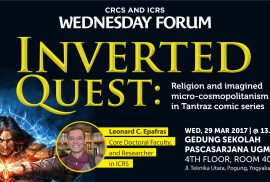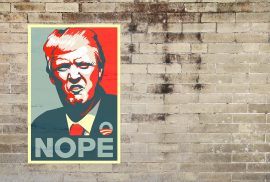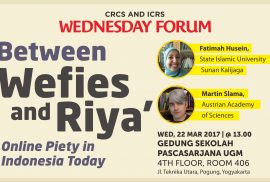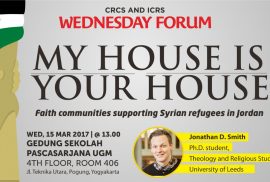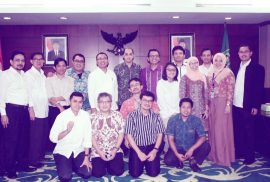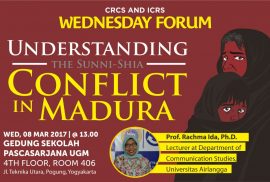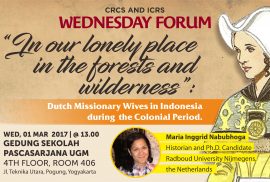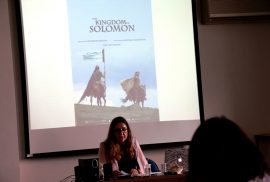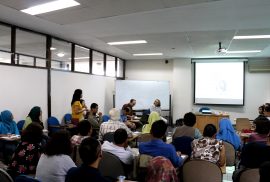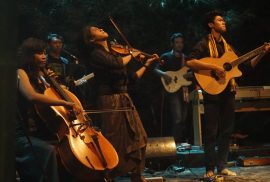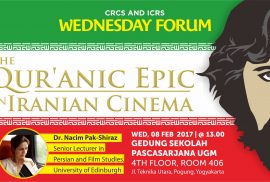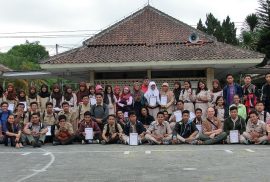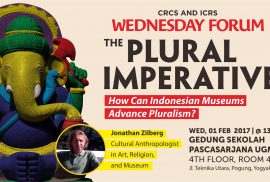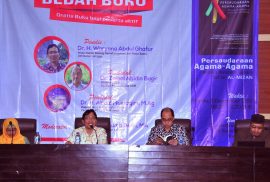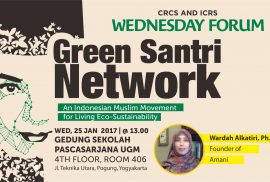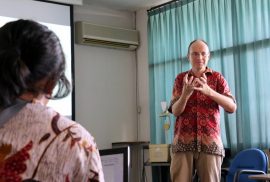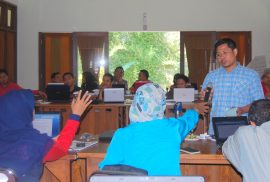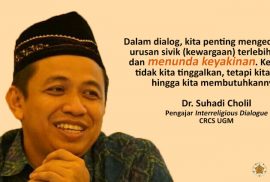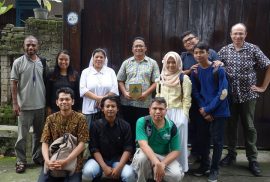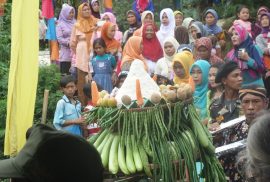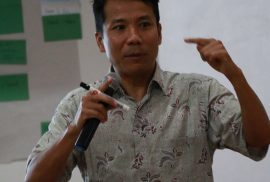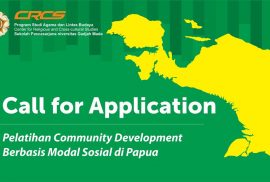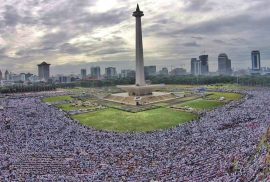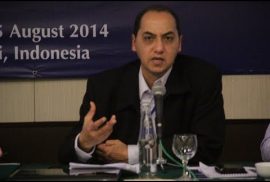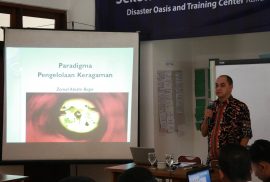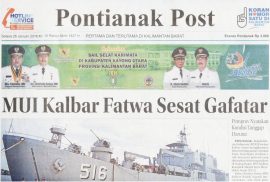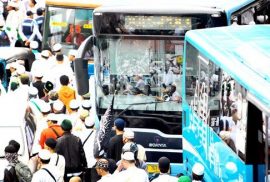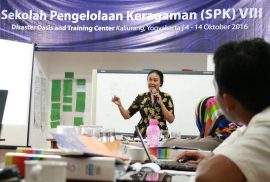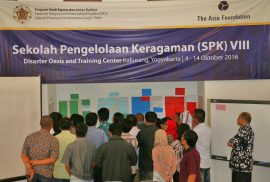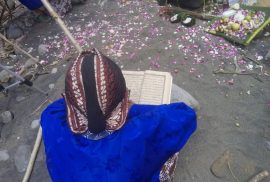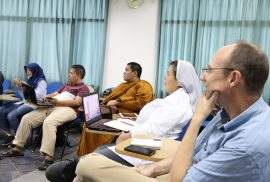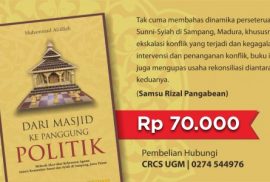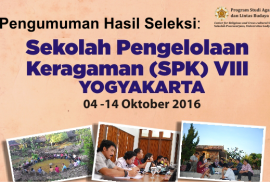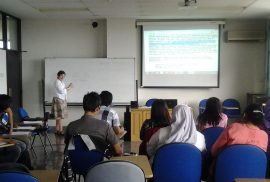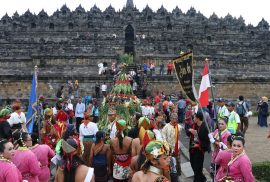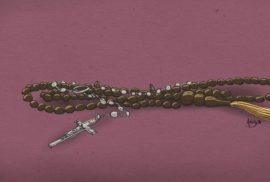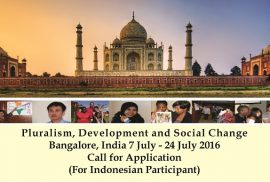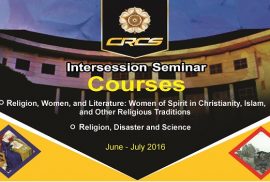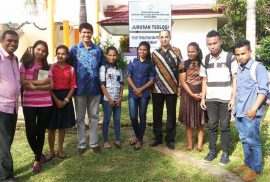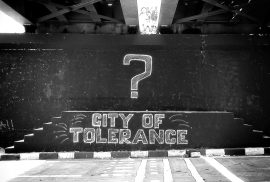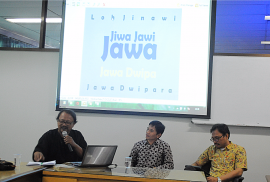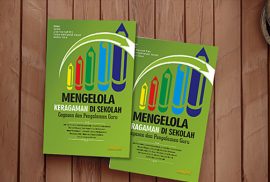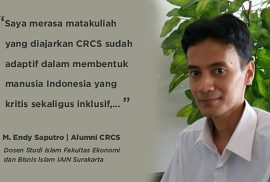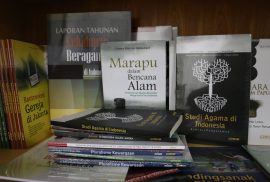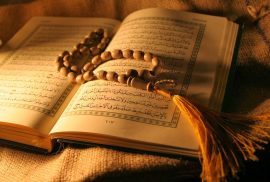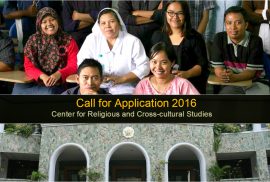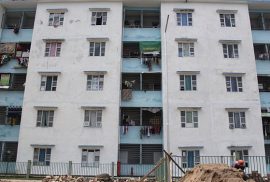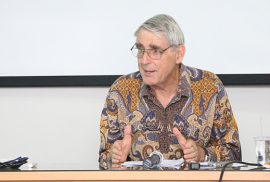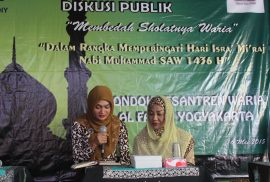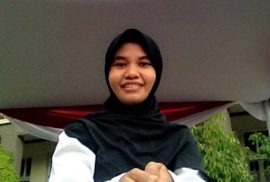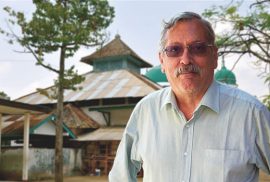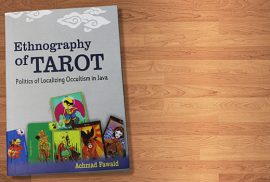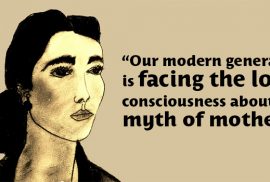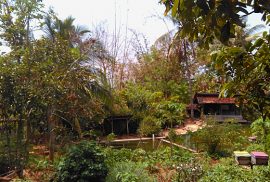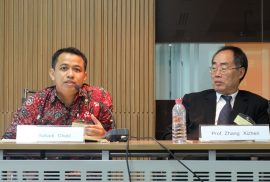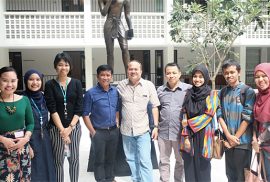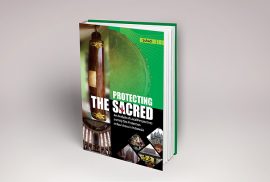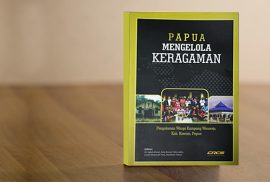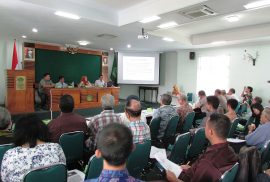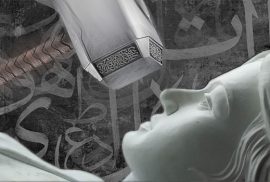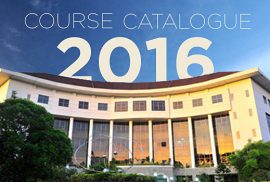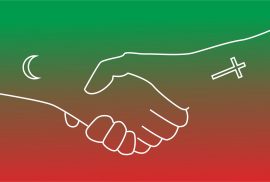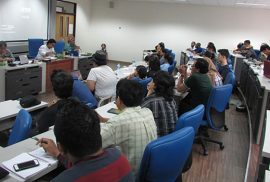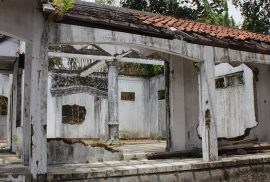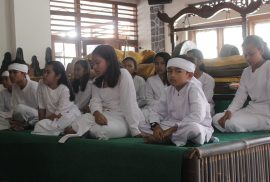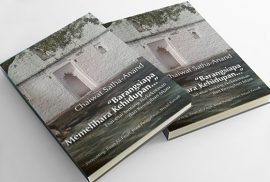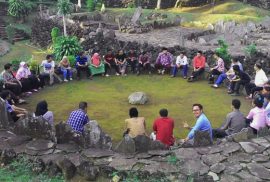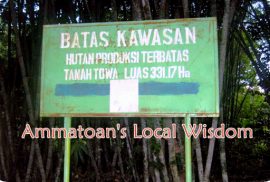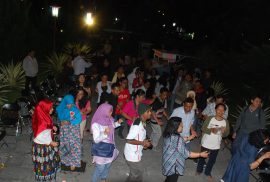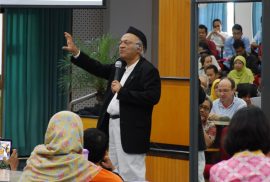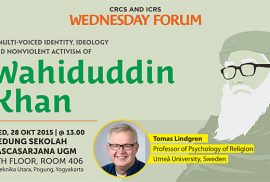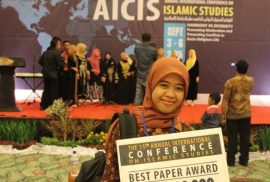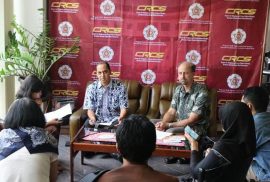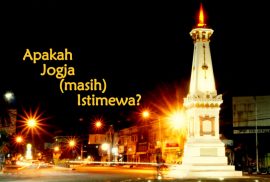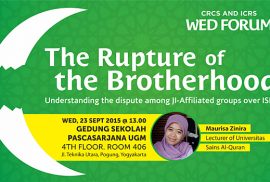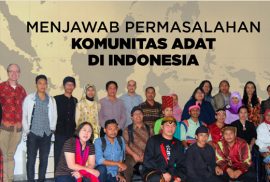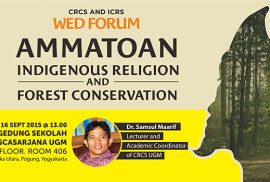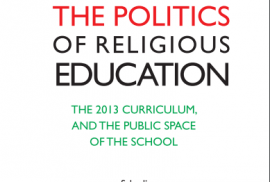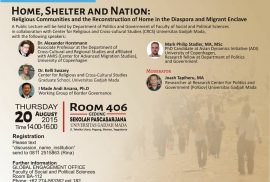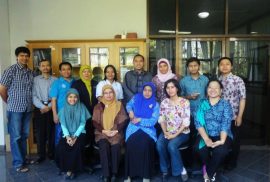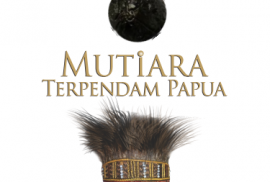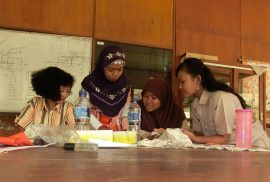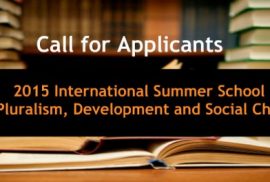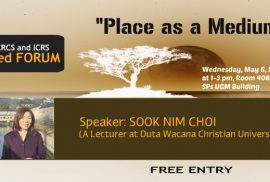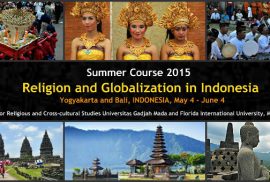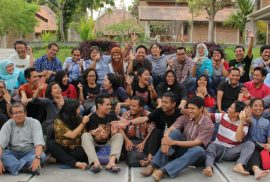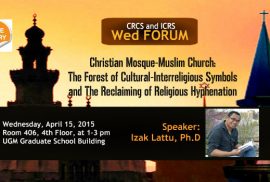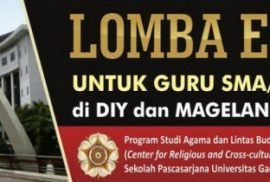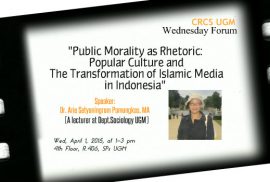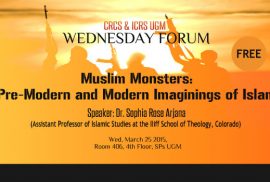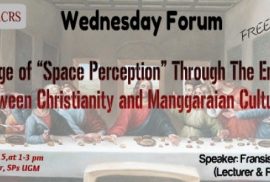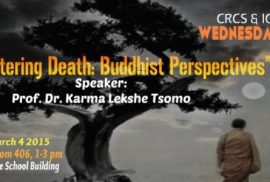Wednesday Forum, December 6, 2017. Speaker: Rudolf Dethu, founder of Muda Berbuat Bertanggung Jawab.
Headline
Wednesday Forum, 29 Nov 2017. Speaker: Farsijana Adeney-Risakotta, grantee of the Contending Modernities project.
Wednesday Forum, 22 November 2017. Speaker: Wening Udasmoro, the dean of the Faculty of Cultural Sciences, UGM.
CRCS, Kampung Halaman dan Satunama menyelenggarakan pemutaran film dan diskusi buku pada Kamis, 16 Nov 2017, pukul 13.00.
Wednesday Forum, 15 November 2017. Speaker: Mark Woodward, Associate Professor at Arizona State University.
Mahkamah Konstitusi: Pengosongan Kolom Agama bagi Penghayat Kepercayaan Bertentangan dengan UUD 1945
MK mengabulkan permohonan uji materi terkait aturan pengosongan kolom agama bagi penghayat kepercayaan di KK dan KTP.
Wednesday Forum, 8 November, 2017. Speaker: Prof. Dr. Hans-Peter Grosshans from Germany.
A report of the first day of the workshop on the institutionalization of interfaith mediation with Imam Ashafa and Pastor Wuye at UGM.
Liputan dari hari ketiga bersama Jacky Manuputty dalam rangkaian kuliah umum "Imam & Pastor" dan lokakarya Pelembagaan Mediasi Antariman.
Liputan acara kuliah umum bersama Imam Ashafa dan Pastor Wuye dari Nigeria di Gadjah Mada University Club, 10 Oktober 2017.
Wednesday Forum, Nov 1, 2017. Speaker: Evi Sutrisno, PhD candidate in Anthropology at the University of Washington.
Wednesday Forum report of the presentation by Maria "Deng" Giguiento, a peacebuilding activist and trainer at Mindanao Peacebuilding Institute.
Wednesday Forum, October 25, 2017. Speaker: Prof. Bernard Adeney-Risakotta, the founding director of ICRS, Yogyakarta.
Wednesday Forum, October 18, 2017. Speaker: Prof. Gerrit Singgih from Duta Wacana Christian University, Yogyakarta.
A report of Mun'im Sirry's presentation on Islamic christology at the CRCS-ICRS Wednesday Forum on September 27, 2017.
Wednesday Forum, Oct 11, 2017, with Maria (Deng) Gigiento from the Philippines.
Kuliah umum bersama Imam Muhammad Ashafa dan Pastor James Wuye di Gadjah Mada University Club, 10 Oktober 2017, pukul 18.30-21.00 WIB.
Wednesday Forum, October 4, 2017, with Linda Yanti Sulistiawati from the Faculty of Law, UGM.
A student's reflection on the Talentime movie watched in the CRCS's Religion and Film course.
CRCS-ICRS Wednesday Forum, Sept 27, 2017, with Dr Mun'im Sirry of the University of Notre Dame in Indiana.
A report on Dr Hew Wai Weng's presentation at the CRCS-ICRS Wednesday Forum, August 30, on the dakwah style of Chinese-Indonesia Felix Siauw.
Mengkaji agama-agama secara interreligius tidak bertujuan untuk mencari persamaan esensial dari semua agama, tetapi untuk memahami suatu agama dari perspektif agama itu sendiri.
Wednesday Forum, September 20, learning experiences of Mitra Wacana. Speaker: Arif Sugeng Widodo.
Pengumumaan 15 peserta SPK Tingkat Lanjut di Yogyakarta 2-8 Oktober 2017.
Tentang macam-macam kelompok Muslim di Myanmar, isu kewarganegaraan, konflik etnoreligius, dan munculnya gerakan ekstrem yang makin menajamkan perseteruan Buddhis-Muslim. Bacaan pengantar dari Prof. Imtiyaz Yusuf.
This presentation will argue for the need for a paradigm shift in the understanding of Islam from a religion oriented to law (nomos) to one oriented to love (eros), from prioritizing orthodoxy to orthopraxy.
Bagaimana hubungan agama dan kekerasan dalam tragedi Rohingya? Refleksi mahasiswa dari matakuliah Religion, Violence and Peacebuiliding di CRCS.
Setelah kasus "penodaan agama" mantan gubernur Jakarta, persekusi banyak terjadi di daerah. Tulisan ini membahas kasus dokter Otto Rajasa di Balikpapan.
CRCS-ICRS Wednesday Forum, Sept 6, 2017. Speaker: Dr. Mohammad Iqbal Ahnaf.
"Pelaksanaan syariat Islam" mendapat payung dari undang-undang, yang memanifes dalam qanun-qanun, dan telah menjadi wacana hegemonik di Aceh. Bagaimana advokasi toleransi beragama dapat dilakukan dalam konteks demikian?
CRCS-ICRS Wednesday Forum, August 30, 2017, at the Graduate School, Universitas Gadjah Mada, on the dakwah method of a young Hizbut Tahrir-affiliated preacher.
Berbagai kebijakan mengenai masyarakat, sejak masa kolonial hingga kini, telah kerap berubah. Namun pertanyaan utamanya tetap sama: sudahkah masyarakat adat berdaulat?
Wednesday Forum on August 23, 2017, discussing the relationship between Indonesia's New Order government and Muslim groups. The speaker: Gde Dwitya Arief Metera from Northwestern University.
After being dissolved, members of Hizbut Tahrir Indonesia have choices to be ideologically consistent or to make compromise. Each has its own consequences.
Denni H.R. Pinontoan | CRCS | Perspective

The fraught election of a new leader for Jakarta has triggered reactions from regions across Indonesia and influenced the dynamics of local identity politics. As will be discussed in this essay, adat organizations promoting local identity as grounded in ethnic customs, in Minahasa, a Christian majority region of North Sulawesi, have gained momentum from controversies in Jakarta to reassert their existence by protesting against organizations they identify as intolerant towards Indonesian pluralism. Specifically, they have turned their attention to those groups pushing the position that, as a Christian, former Jakarta governor Basuki Tjahaha Purnama (known as Ahok), was not permitted (according to one reading of the Quran) to serve as the governor of a majority Muslim province.
However, we shouldn’t rush to characterize the reactions of these organizations based in adat and (Christian) religion as primordial or sectarian. There is a wider context that must be understood in the examination of these symptoms. The presence of these adat organizations and their self-declarations in the process of rejecting intolerance and political turmoil must also be read as an expression of politicized identities in the context of the dynamics of local politics.
Minahasan Identity in the Era of National Political Transition from the New Order to Reformasi and Democracy
Studies of the local politics in Indonesia which unfolded in a relatively new context during the transitional period from 1998 through the early 2000s have shown that local conflicts over religion and adat were not divorced from turbulent national politics. The conflicts in Ambon and Poso starting in 1998 through the early 2000s, and the efforts of “Islamic politics” groups in Jakarta lobbying for their political agenda in the national parliament provided the context through which regional/local communities understood their position within the so-called Unified State of the Republic of Indonesia (NKRI).
In Minahasa, various responses emerged to the threat of Islamicized politics. For example, a discourse of “Independent Minahasa” was heard at the first two Great Minahasa Congresses (Kongres Minahasa Raya). The implications of these statements should not be exaggerated as they were seen as reactionary and failed to find a wide reception with the Minahasan public. Instead, a discussion of federalism emerged, in connection with its well known supporter, Dr. Bert Supit, drawing on the ideas of national hero of the movement for independence from the Dutch Dr. G.S.S.J Sam Ratulangi. The idea of Minahasa as a unified political entity taking the form of a special autonomous province was also part of the conversation. These discourses originally only circulated amongst intellectual and political elites, and even they did not agree among themselves.
The early emergence of this discourse in the early 2000s therefore cannot be said to have had any significant impact. The point, however, is that the disconnected symbols of adat and culture used to represent Minahasan identity were drawn into political contestation for the first time since the Permesta conflict (1957-1962), when several generals from Minahasa sought to consolidate the regional public to challenge the central government in Jakarta.
Adat Organizations and Local Politics in Minahasa
The first adat organization to play a role in post-New Order local politics in Minahasa or North Sulawesi was the Manguni Brigade (Brigade Manguni or BM), formed in the year 2000 as response to violent conflicts in two regions not far from North Sulawesi: Ambon and Poso. The organization’s founders declared that it was created to protect the adat lands of Minahasa from the threat of conflict. Throughout its growth, BM consistently claimed to be organization dedicated to protecting the stability of Minahasa within the framework of “Indonesian-ness“. Yet the Manguni Brigade also reminded the Minahasan public of the period of Permesta, as its name and symbol (an indigenous owl (Otus manadensis) that is sacred in local tradition) were taken from one of Permesta’s military units.

Another notable organization is the Waraney (Warrior) Militia (Milisi Waraney or MW), a group with a more robust Christian identity. The orientation of the Waraney Militia is clearly portrayed in its logo depicting a yellow manguni owl with a blue Star of David in the background and a red cross above its head. The phrase “I Yayat U Santi” (loosely meaning “lift up and point your sword“) is written in color at its feet. This logo signals that, for the Waraney Militia, Minahasan identity references relations of (ethnic) descent and (Christian) religion. The Manguni Brigade uses the same image of the manguni owl and the slogan “I Yayat U Santi“.
In Minahasan tradition, the manguni is a sacred bird and “I Yayat U Santi” is commonly understood as the battle cry of the waraney (warrior).
Other civil society organizations that emerged in the early post-New Order years are the Christi Militia (unofficially affiliated with the Evangelical Church of Minahasa or GMIM), and the Legium Christum, associated with the Roman Catholic Church in the region. A number of other organizations with relatively similar aims were also formed in the late 2000s, well after violence in Ambon and Poso had ended. Their logos do not differ much from the one used by the Manguni Brigade, a blend of symbols for Minahasan local culture and Christianity.
In connecting these phenomena, it is increasingly clear that these organizations have responded on the basis of (Christian) religion. Since Christianity is perceived of as inseparable from local culture, the two identities are fused.
In 2014, these organizations found their platform when they united in response to the proposed renovation of the Al Khairiyah Mosque, one of the larger mosques located in the former Texas Village in the center of Manado, the capital city of the province. The organizations consolidated in an alliance they called the Alliance of the Kawanua Community for Tolerance (Makapetor). With this development, it was clear that the polarization of Christianity and Islam that began in the early post-New Order years had become the main context motivating the political actions of these organizations.
There are, in fact, many local Minahasan organizations based on adat and religion and many of these adat organizations have a different stance. the Mawale Cultural Center (MCC) is a network of cultural groups and Minahasan intellectuals that takes a critical position towards state intervention in cultural revival efforts in Minahasa. They express the same view towards adat activism by churches and towards the Christian identity that serves as a dominant force in local politics.
Leaders of such groups in the MCC network as the arts and culture organizations Waraney Wuaya and Pinaesaan Tontemboan (PITON) took a different perspective on the mosque renovation in Texas Village from those organizations based in a Christian identity. Although these two organizations were repeatedly invited to join the Makapetor Alliance, they remained loyal to MCC’s idealism that all people whatever their background have a right to live in Minahasa, as long as they honor the obligation to protect Minahasa as safe place to live together.
After the Jakarta Election, What Then?
The actions of Islamic groups to influence the Jakarta election, particularly the 411 and 212 “demonstrations to defend Islam,” infuriated many Christians in Minahasa. This gave Minahasan adat organizations the momentum to express their views.
In November 2016, several adat organizations in Minahasa organized an event calling for the disbanding of the Islamic Defender’s Front (FPI) regional branch in North Sulawesi’s provincial capital city of Manado. The main reason given for their demand was that FPI is a radical organization that threatens Indonesia’s diversity. They also emphasized that the national ideology of Pancasila, the founding laws of 1945, the national motto of Unity in Diversity and the concept of the Unitary State of the Republic of Indonesia (NKRI) are incontestable principles. The support of North Sulawesi’s Regional Leadership Coordination Forum (Forkopidma) for the participation of the adat organizations in the Unified Nusantara Parade scheduled for December 1st, 2016, gave the impression of the state’s recognition of the existence of these groups. On the other hand, perhaps they were not aware that recognition is also part of the state’s effort to maintain control.
Going along with the state’s doctrine and methods of ensuring stability through supporting the Unitary State of the Republic of Indonesia campaign appears to be a way for these Christian-adat organizations to negotiate the politics of Minahasan-ness and religiousness (identity politics) through the politics of the state in the local sphere. The actions of Islamic groups in Jakarta served as real and factual proof for their belief that “Islamic politics” poses a serious threat to the existence of Minahasan identity and Christianity.
Previous events, such as the appearance of local shariah-based policies in several other regions including in South Sulawesi, as well as the forced closure of a number of churches in Java, have successfully been reconstructed by elite members of these organizations to assure their members (primarily young people) that their participation is part of a noble struggle for the continued existence of Minahasa and freedom of religion as Christians.
In my view, it is this vision of “noble struggle” that will ensure the continued existence of these organizations in local politics in Minahasa. Yet I predict that these organizations will never become a unified group. The case of the Manguni Brigade can serve as a precedent. Around ten years after its creation, the group split, with an offshoot organization arising called Laskar Manguni Indonesia. Shortly afterward another offshoot emerged called Laskar Adat Manguni Indonesia (LAMI). Other organizations are experiencing the same fate, not primarily due to matters of leadership, but because the basis of their struggle is repeatedly reassessed as generations, political contexts, and interests change. Even the Makapetor Alliance is prone to division as it basically a short-term partnership between independent groups.
Focusing more on study, revitalization and discussion, MCC and its network have to some degree served as a stabilizing force in the discourse of local politics in Minahasa. During the response to the Jakarta election in the region, MCC intellectuals and activists, along with their wide networks across Minahasa, were more involved in peace activism with interfaith groups and other civil communities and were always cautious not to get cornered into campaigns for nationalism.
These events display the active dynamics of local politics in Minahasa. The adat organizations themselves are prone to dissolution because there is no single unifying ideology among them, and there is always space for differing opinions. This means that these groups inhabit a dialectical position in Minahasan local politics. Although they often give the impression of being ‘frightening’ or ‘extreme’ due to their militia or paramilitary character, these political dynamics will continue to prevent them from becoming more involved in physical violence towards the groups they identify as their enemies. In fact, these groups are still open to discussions about diversity with Muslim organizations like the Nahdlatul Ulama Paramilitary (Banser NU).
In addition to local dynamics, national political unrest also influences the movements undertaken by these adat organizations. The response towards the events surrounding the Jakarta election that spurred the consolidation the Christian adat organizations is one effect of these politics of the center that have spread to the outer regions.
Denni H.R. Pinontoan, a lecturer in Religious Studies in the Faculty of Theology at the Indonesian Christian University of Tomohon (UKIT) in North Sulawesi, is an alumnus of the School of Diversity Management IV held by CRCS in 2014.
This article is a translation by Kelli Swazey from its original version in Indonesian:Pilkada Jakarta dan Ormas Adat dalam Politik Lokal Minahasa.
Setelah dibubarkan, anggota Hizbut Tahrir Indonesia memiliki dua pilihan: tetap bersikukuh dengan prinsip ideologinya atau berkompromi dengan realitas politik. Masing-masing punya konsekuensi.
Selamat kepada mahasiswa baru CRCS UGM TA 2017/2018.
The overly optimistic view regarding the prospects for Indonesia's religious democracy needs to be qualified.
Empat tautan bacaan tentang HTI, Pancasila, dan isu terkait di situsweb CRCS.
Review buku Krisis Keistimewaan: Kekerasan terhadap Minoritas di Yogyakarta (CRCS 2017)
Konservatisme tak perlu menjadi sumber kecemasan. Isu yang lebih penting bersifat sangat praktis: bagaimana negara, khususnya aparat penegak hukum, mampu menjaga ruang deliberasi yang aman.
CALL FOR APPLICATIONS. The Institutionalization of Interfaith Mediation: A Workshop with Imam Muhammad Ashafa & Pastor James Wuye. Deadline: July 15, 2017.
A. S. Sudjatna | CRCS | Liputan

Hadirnya kelompok-kelompok radikal-intoleran yang kerap melakukan kekerasan atas nama agama adalah suatu tantangan iman. Dalam menghadapi kelompok ini, umat beriman semestinya tidak membalasnya dengan kekerasan yang serupa, tetapi harus dengan cara-cara yang selayaknya dilakukan orang beriman, yakni cara yang penuh kasih dan kelembutan.
Itulah di antara yang diungkapkan Kardinal Julius Darmaatmadja, SJ, dalam seminar nasional bertajuk Merajut Persaudaraan, Mengikis Sikap Intoleran yang dihelat di Fakultas Teologi Universitas Sanata Dharma pada 16 Mei 2017. “Yang paling membuat tantangan iman semakin besar di dalam diri kita adalah kalau yang menjadi marah besar itu kita sendiri. Itu tantangan iman untuk diri kita sendiri,” ungkapnya
Oleh sebab itu, menurut Romo Kardinal, gejala arus balik yang tengah terjadi di masyarakat akhir-akhir ini atas perilaku kelompok radikal itu hendaklah pula diwaspadai agar tidak melenceng dari batas-batas yang telah ditentukan negara dan diajarkan agama. Perlawanan atas perilaku intoleran dan kekerasan dari kelompok radikal mesti tetap mengedepankan Pancasila, keutuhan NKRI, dan menjunjung tinggi kebinekaan.
Dalam hal ini, Romo Kardinal menyatakan apresiasi terhadap Muhammadiyah dan Nahdlatul Ulama yang konsisten menjaga persaudaraan di antara umat beragama dan menegaskan bahwa Islam harus menjadi rahmat bagi semua, rahmat bagi seluruh ciptaan Tuhan. “Saya tersentuh saat pimpinan Muhammadiyah, Haidar Nashir, menyampaikan khotbah pada perayaan Idul Adha yang berjudul Menyembelih Egoisme, Merayakan Solidaritas,” ujar Romo Kardinal. Ia kemudian menyitir beberapa bagian dari khotbah Haidar Nashir tersebut yang dimuat Kompas, 11 September 2016. Menurut beliau, sikap altruis yang disebut-sebut oleh Haidar Nashir di dalam khotbahnya itu akan melahirkan sikap kasih kepada sesama tanpa sekat agama, suku, ras, dan golongan.
Terhadap umat Katolik dan Protestan, Kardinal Darmaatmadja menyerukan untuk tetap mengutamakan kasih atas sesama seperti mengasihi diri sendiri. Sebab, mengutip Yohanes, kasih kepada Tuhan harus dibuktikan lewat mengasihi sesama. “Karena barangsiapa yang tidak mengasihi saudaranya yang dilihatnya, maka tidak mungkin mengasihi Allah yang tak dilihatnya,” ujarnya menegaskan.
Menutup ceramahnya, Romo Kardinal menegaskan kembali pernyataanya. “Kita tegakkan negara kita berdasarkan Pancasila; kita perkokoh NKRI dan persaudaraan nasional. Namun, sikap kita yang inklusif tetap perlu dipertahankan selalu, terhadap kelompok yang radikal pun. Hukum balas-membalas tidak boleh dilakukan oleh orang beriman. Sebaliknya, kita tetap memegang teguh sikap mengasihi dan mengampuni. Kita ampuni orangnya meski kita menolak perbuatannya.”
Menanggapi Romo Kardinal, Buya Syafi’i Ma’arif sebagai pembicara selanjutnya mengatakan bahwa apa yang dikatakan oleh Romo Kardinal itu, terutama dalam soal kasih, persis seperti ajaran Islam di dalam mengasihi sesama. “Apa yang disampaikan Kardinal itu seperti suara seorang muslim yang belum terkontaminasi.”
Buya Syafi’i menegaskan bahwa Islam sebagai rahmatan lil alamin itu universal bagi seluruh umat manusia. Kemunculan kelompok Islam radikal yang kerap melakukan kekerasan seperti itu disebabkan mereka terjebak dalam lingkaran—yang disebut Buya Syafi’i sebagai—“misguided arabism” yang sudah berlangsung berabad-abad dan membuat peradaban umat Islam—khususnya di wilayah Timur Tengah saat ini—porak poranda.
“Yang berlaku di dunia Arab sekarang ini adalah peradaban Arab yang sudah bangkrut,” tegas Buya Syafi’i. Celakanya, peradaban yang bangkrut ini dicoba untuk dibawa ke Indonesia oleh kelompok-kelompok tertentu. Tak heran jika isu sektarian yang menjadi pemicu perpecahan umat Islam di dunia Arab sana juga mulai muncul dan berkembang di Indonesia saat ini.
Buya Syafi’i menyebutkan bahwa perilaku kekerasan kelompok radikal itu muncul dikarenakan mereka mengadopsi teologi maut. “Teologi maut ini keluar dari perasaan keputusasaan. Hopeless. Tidak berdaya. Kalah. Kalau sudah kalah, ujungnya kalap,” ucapnya. Akibatnya, tak sedikit umat Islam yang akhirnya lebih memilih pindah ke negara-negara mayoritas nonmuslim, sebab di sana dirasa lebih aman dan nyaman untuk mengekspresikan diri. Sedangkan di kampung halamannya, mereka diberangus.
Pembicara ketiga, Widiyono, tokoh dari umat Buddha dan juga alumnus CRCS, menegaskan bahwa agar tidak terjebak dalam radikalisme, setiap kita mesti menyadari akan niscayanya sebuah keragaman. Kesadaran akan saling keterikatan di dalam keragaman dan bukannya saling bermusuhan sangat dibutuhkan. Di dalam ajaran Buddha, menurutnya, kesadaran akan keragaman dan saling keterhubungan di antara segala hal disebut dengan paticcasamuppada. Hilangnya kesadaran akan hal ini akan melahirkan sikap permusuhan dan tindak kekerasan yang nyata, seperti yang dapat disaksikan pada perilaku sekelompok penganut agama Budha di Sri Lanka atau Myanmar. Menurutnya, tanpa keragaman tak akan ada kehidupan.
Pembicara keempat, Romo Mateus Purwatma dari Katolik, menegaskan bahwa agar tidak terjebak dalam radikalisme ini, seorang Katolik harus menjadi misioner, menjadi seorang saksi, yakni mengamalkan ajaran Yesus di tengah masyarakat beriman secara cerdas, mengerti apa yang diimani dan dapat membaca Alkitab secara benar. Menurutnya, kemampuan membaca Alkitab secara benar ini sangatlah penting, agar saat berjumpa dengan ayat-ayat yang mengekslusikan yang lain tidak terjebak dalam pembacaan yang kaku, sehingga tak salah mengerti. Selain itu, Romo Mateus melanjutkan, seorang Katolik juga mesti menyadari bahwa ia beriman dalam konteks masyarakat majemuk, sehingga saat ia berjumpa dengan orang dari agama lain, ia tahu bagaimana cara menempatkan keimanannya di sana.
*A. S. Sudjatna adalah mahasiswa CRCS angkatan 2015.
The secularists must learn to accommodate religion in the public sphere while the religious leaders must help balance the public role of religion with spirituality.
Beasiswa bebas SPP di CRCS untuk alumni perguruan tinggi non-Islam.
“Gereja-gereja memahami perdamaian secara sempit, sekadar sebagai negative peace. Perdamaian dianggap tercapai apabila tidak ada konflik.”
Sebagai salah satu pusat iman Kekristenan, Kenaikan Yesus selaiknya menjadi momen refleksi. Salah satunya tentang pesan Yesus sebelum naik meninggalkan para murid-Nya.
Pada hari Senin, 22 Mei 2017, Universitas Gadjah Mada (UGM) mengumandangkan deklarasi meneguhkan kembali Pancasila. Termasuk dalam rangkaian acara adalah sarasehan dan FGD bersama akademisi dan budayawan.
The government’s reason in its move to disband Hizbut Tahir Indonesia, claimed to have an ideology that contradicts Pancasila, should remind us of the “Pancasila as the sole foundation” politics of the authoritarian New Order regime.
Pilkada Jakarta berimbas pada dinamika politik lokal berbasis identitas dari ormas-ormas adat-Kristen di Tanah Minahasa.
Yulianti | CRCS | Perspektif

Perayaan Waisak adalah salah satu hari besar umat Buddha untuk memperingati tiga peristiwa: hari lahir Sidharta Gotama (calon Buddha Gautama), momen Sidharta mendapatkan pencerahan ilmu, dan hari mangkatnya Buddha. Ketiga peristiwa ini terjadi pada bulan Waisak saat purnama.
Waisak dirayakan dalam berbagai bentuk dengan skala yang beragam. Denyut perayaan Waisak tidak hanya terasa di negara-negara berpenduduk mayoritas Buddha seperti Sri Lanka, Thailand, Myanmar, atau wilayah mainland Asia Tenggara lain. Negara-negara di mana agama Buddha tidak dipeluk mayoritas penduduknya seperti Indonesia pun menggemakan Waisak melalui acara-acara besar.
Sharing her experience as a German woman converting to Islam, Dr Katrin Bandel gave a presentation at the Wednesday Forum.
Anna M. Maćkowiak, a doctoral student from Jagiellonian University presented her research in Wednesday Forum about how Islam has been perceived in her home country, Poland.

Abstract
The architectural form is one indicator that reflects religious practices evolve over long periods of time. There are scholars who do not accept that religions and religious architecture have a history. These scholars prefer to believe that religious practices emerge fully formed and that they are static (i.e. they do not change). Most scholars, however, view the practice of religion as an evolving phenomenon based upon cultural symbolism. Furthermore, religious practices can be influenced by contact with external groups and often reflect shared histories between different religions. This is an idea that is frequently in conflict with political sensitivities, but may also offer opportunities for inter-faith dialogue.
Speaker
Edith Dunn is an Architectural Conservator and Cultural Heritage Specialist with more than 20 year experience. She earned an MS in Historic Preservation from Columbia University, and PhD in Interdisciplinary Archeological Studies from University of Minnesota. Her projects have included monuments and archeological sites in the U.S., Africa, and the Middle East. Many of her projects have included religious buildings and sacred landscapes.
Look at the full poster of the event here.
Anang G Alfian | CRCS | Wednesday Forum Report

At the CRCS-ICRS Wednesday Forum on April 12th, 2107, Sawyer Martin French, a research fellow at the Institute for International Studies at the Faculty of Social and Political Sciences at Universitas Gadjah Mada, gave presentation on the government-mandated curricula of Islamic education in public high schools. He took several public high schools (Sekolah Menengah Atas, SMA) in the province of Yogyakarta, with the method of classroom observation, interviews with teachers, and student focus group discussions in a few schools. More importantly, he also presented his research on Islamic textbooks used in those high schools which he observed have undergone content changes.
In his presentation, French showed that each political period has a difference in the emphasis of the contents of the Islamic textbooks used in SMA. There are three political periods where curricula for Islamic education in SMA have evolved, from the 1994 curriculum, which was formed under the Suharto New Order’s regime; then replaced by the 2006 curriculum under the post-reformation period; and the latest, 2013 curriculum. French shows the content of the Islamic curricula has undergone several changes, three main of which are that related to tolerance, democracy and gender issues.

Regarding democracy, French mentioned an example of 1994 Islamic textbook mentioning the importance of “mushawarah” (lit. consultation to each other) as an Islamic teaching in managing Indonesian politics and governmental administrations. The 2003 textbook mentioned the importance of being a good citizen, meaning a democratic citizen, by further interpreting the meaning of mushawarah. This shows the change due to discourse on democracy generated by reformation. In the 2013 textbook, there is a reference to put more details of how Indonesia democracy should take the ideal shape, and that is to take the example set by the Medinan charter during the time of the Prophet.
Relating to tolerance, the textbooks show changes in the way Muslim should deal with other religions or Islamic sects. In the 1994 textbook, Pancasila was referred to as be the basis of harmony among religious communities while in the 2006 textbook, tolerance can be built along social matters but not along religious lines. The 2013 textbook mentioned that tolerance is a tool to unite the nation, but there are a few sentences which suggest intolerance against some Islamic sects, such as that some Sufi orders practice bid’ah or heretical rituals and that Shiites and Ahmadis are deviant and beyond the limit of tolerance.
As on gender issues, the dominant content of the 1994 textbook upholds the obligation of men as the leader of the family and women as the one who must be obedient to her husband. This was set as an example of a good family. In the 2013 textbook, the focus was more to a companionate marriage and mutual relationship. The notions of housewife and superiority of men which were mentioned in the previous textbooks are now gone and replaced by sentences suggesting a more equal relationship between the husband and the wife, though there is still an emphasis that, despite the same level, “their roles are different.”
*Anang G Alfian is CRCS student of the 2016 batch
Redaktur Web | CRCS | Berita

Dalam aturan perundang-undangan, para penghayat kepercayaan atau penduduk yang agamanya “belum diakui” diminta untuk tidak mengisi kolom agama dalam Kartu Tanda Penduduk (KTP), “tetapi tetap dilayani dan dicatat dalam database kependudukan”.
Namun pada kenyataannya di lapangan, para penghayat kepercayaan yang mengosongkan kolom agama di KTP tidak mendapatkaan pelayanan yang setara sebagaimana warga negara pada umumnya, bahkan mengalami diskriminasi.
Kenyataan itu mendorong sejumlah pemohon mengajukan pengujian undang-undang (judicial review) ke Mahkamah Konstitusi (MK). Para pemohon yang berasal dari kepercayaan Marapu (Sumba Timur), Parmalim (Sumatera Utara), Ugamo Bangsa Batak (Sumatera Utara), dan Sapto Darmo (Jawa) memohon judicial review terhadap Undang-Undang Nomor 23 Tahun 2006 tentang Administrasi Kependudukan (UU Adminduk) jo. Undang-Undang Nomor 24 Tahun 2013 tentang Perubahan atas UU Adminduk 2006.
Beberapa dari perlakuan diskriminatif yang menimpa para pemohon berupa ketidaksetaraan dalam akses terhadap pekerjaan, akses terhadap hak atas jaminan sosial, dan tidak diakuinya perkawinan adat mereka yang berimbas pada akta kelahiran anak dan pendidikannya. Dalam beberapa kasus juga ditemukan stigma-stigma negatif dalam kehidupan sosial mereka. Dalam kasus lain ditemukan ada yang terpaksa mengisi kolom agama dengan agama yang bukan kepercayaannya agar administrasi pembuatan KTP “lebih mudah”.
Para pemohon menilai bahwa pengosongan kolom agama untuk pemeluk agama yang “belum diakui” bertentangan dengan prinsip kesetaraan warga negara di depan hukum. Para pemohon juga menekankan bahwa kebebaasan dari perlakuan diskriminatif telah dijamin oleh Undang-Undang Dasar, UU Hak Asasi Manusia Tahun 1999, dan Kovenan Internasional Hak-hak Sipil dan Politik yang telah diratifikasi Indonesia.
Dalam rangkaian judicial review di MK itu, salah satu dosen Program Studi Agama dan Lintas Budaya (CRCS), Dr. Samsul Maarif, hadir sebagai salah satu saksi ahli pada Rabu 3 Mei 2017. Alumnus dan kini pengajar di CRCS ini meraih gelar Ph.D. dari Arizona State University pada 2012 dengan disertasi tentang praktik keagamaan masyarakat Ammatoa di Sulawesi Selatan.
Di hadapan 9 hakim konstitusi, Samsul menguraikan hubungan negara, agama, dan kepercayaan yang tidak bisa dilepaskan dari konteks sejarah politik Indonesia. “Sejarah relasi negara, agama, dan kepercayaan senantiasa berada dalam konteks politik rekognisi,” demikian ujarnya sebagaimana terkutip dalam Risalah Sidang MK.
Presentasi Samsul memaparkan bahwa pada era Orde Lama, agama didefinisikan dengan sangat eksklusif, yaitu yang memiliki kitab suci, nabi, dan pengakuan internasional. Definisi ini menjadi penentu siapa yang dilayani (penganut agama “resmi”) dan siapa yang tak dilayani (penganut kepercayaan). Pemerintah Orde Lama bahkan membentuk Pengawas Aliran Kepercayaan (PAKEM) pada 1953.
Meski mendapat pengawasan, para penganut aliran kepercayaan berhasil berkonsolidasi. Departemen Agama pada waktu itu melaporkan bahwa pada 1953 telah ada 360 organisasi Kebatinan/Kepercayaan. Terwadahi dalam Badan Koordinasi Kebatinan Indonesia (BKKI), organisasi-organisasi kebatinan itu berhasil menyelenggarakan kongres pertama pada 1955 dengan ketuanya Mr. Wongsonegoro, salah satu perumus UUD 1945.
Pergolakan politik sempat terjadi pada 1965. Pada tahun ini lahir Penetapan Presiden (yang nantinya menjadi UU PNPS 1/1965 tentang Penodaan Agama) yang ingin melindungi agama dari penodaan oleh aliran kepercayaan. Setelah peristiwa 30 September 1965, aliran kepercayaan mendapat tekanan besar: mereka dicurigai sebagai bagian dari komunisme.
Nasib penghayat kepercayaan sempat membaik ketika pada 1970 Golkar membentuk Sekretariat Kerja Sama Kepercayaan (SKK). BKKI lalu bertransformasi menjadi Badan Kongres Kepercayaan Kejiwaan Kerohanian Kebatinan Indonesia (BK5I). Pada 1973 TAP MPR tentang GBHN menyatakan bahwa agama dan kepercayaan adalah ekspresi kepercayaan terhadap Tuhan YME yang sama-sama “sah”, dan keduanya “setara”.
Momen yang paling berimbas terhadap nasib aliran kepercayaan terjadi pada 1978. Pada tahun ini keluar Ketetapan MPR yang menyatakan bahwa kepercayaan bukanlah agama, melainkan kebudayaan. TAP MPR Nomor 4 Tahun 1978 ini juga mengharuskan adanya kolom agama (yang wajib diisi dengan salah satu dari 5 agama) dalam formulir pencatatan sipil. Mulai tahun inilah kolom agama tercantum dalam KTP. “Pada periode kedua Orde Baru, mulai 1978, agama mulai ‘diresmikan’—saya pakai tanda kutip, [karena] ini politik,” ujar Samsul, yang mengajar mata kuliah Indigenous Religions (Agama-agama Lokal) di CRCS.
Pada era pascareformasi, dengan masuknya klausul-klausul HAM dalam instrumen legal negara, para penganut kepercayaan kembali mendapat pengakuan. Dengan instrumen HAM, para penganut kepercayaan terlindungi dari pemaksaan untuk pindah ke agama “resmi”. Namun diskriminasi masih ada, yaitu dengan adanya Pasal 61 UU Adminduk 2006: identitas kepercayaan tidak dicatatkan dalam kolom agama.
Dengan peraturan semacam itu, menurut Samsul, negara telah melanggengkan ‘politik rekognisi’. “[Maksud politik rekognisi itu] agama dipakai untuk membedakan warga negara.”
Lebih dari itu, lanjut Samsul, “[Dengan UU Adminduk itu] negara masih melanggengkan stigma sosial terhadap penganut kepercayaan.” Stigma-stigma yang dimaksud adalah tuduhan sesat, ateis, penganut animisme, dan orang-orang belum beragama yang sah sebagai target konversi.
Mengakhiri presentasinya, Samsul merekomendasikan agar permohonan perbaikan UU Adminduk diterima. “Kepercayaan perlu dicatatkan sebagai identitas, sebagaimana kelompok agama lain… Pembedaan tersebut adalah diskriminasi.”
“Saya sadar masalah yang dihadapi kelompok penghayat ini besar, banyak sekali. Yang untuk ini saja sebenarnya saya membayangkan tidak mampu mengatasi semuanya, tetapi akan mengatasi secara signifikan sebagian besar yang dihadapi oleh penghayat kepercayaan.”
Dalam sidang, hampir semua hakim mengajukan pertanyaan. Di antara satu yang paling krusial adalah pertanyaan mengenai kompatibilitas “agama” dan “kepercayaan”. Menurut hakim yang mempertanyakan hal ini, agama perlu dipahami secara teologis dan eskatologis, bukan sosiologis, dan karena itu agama bukan sekadar persoalan administrasi.
Menanggapi pertanyaan ini, Samsul menjawab bahwa konsep agama yang teologis itu pun bukan tak mengalami konstruksi politik, dan karena itu tak bisa dilepaskan dari konteks sejarah kemunculannya sebagai diskursus. “Agama, yang merupakan terjemahan literal dari religion,” ungkap Samsul, “dipahami dengan menjiplak konsep religion di Eropa.” Para intelektual Eropa menjadikan Kristen sebagai prototype untuk menilai apakah praktik-praktik yang mereka temui di wilayah kolonial layak disebut religion atau tidak. Model konstruksi agama di Barat yang didasarkan pada (teologi) Kristen dijiplak di Indonesia, tetapi prototype-nya adalah (teologi) Islam.
“Jika definisi agama di Eropa dulu adalah untuk menegaskan superioritas Barat atas non-Barat, definisi agama di Indonesia adalah untuk menegaskan politik rekognisi: mengistimewakan kelompok warga negara tertentu dan sekaligus mendiskriminasi kelompok warga negara lain, seperti penghayat kepercayaan,” demikian Samsul menjawab pertanyaan hakim. [CRCS/aaf]

Last week Ian Wilson wrote in a New Mandala article—subsequently republished at the Jakarta Post and a number of other English Language publications, as well as being translated into Bahasa Indonesia by Tirto—about issues of inequality and poverty that didn’t feature prominently in discourses surrounding Jakarta’s gubernatorial election, either in local or international mainstream media.
The critical content of Wilson’s article was largely aimed at the campaigns of both sides in the second round of the election. I agree with the main goal of the article, namely to oppose the dominant narratives in the Jakarta election, which have been framed in binary terms (‘diversity vs. sectarian populism’), and express the issues of inequality and poverty that are of paramount importance and therefore ought to be a priority of political programs. But my agreement is accompanied by two corrections and one additional note.
Allow me to quote one sentence that summarises the article’s content and forms its main thesis. Wilson says:

Abstract
In the late-15th to mid-16th century, Europe experienced three revolutions: a geographical revolution (“voyages of discovery” and colonial expansion); a religious revolution (the Protestant Reformation) and a Scientific Revolution. Within the religion and science discourse, the relationship between two of these revolutions—the Protestant Reformation and the Scientific Revolution—has been much studied, while the third revolution has been ignored. As a result, the ghosts of colonialism still haunt us. This presentation will explore the ways considerations of the third revolution—and postcolonial perspectives—broaden out understanding and expand the discourse, with special attention to the contributions of postcolonial Science Fictions.
Speaker
Lisa Stenmark is author of Religion, Science and Democracy: A Disputational Friendship, and co-editor (with Whitney Bauman) of Religion, Science and Queer Theory, part of a series Religion and Science as a Critical Discourse. She teaches at San Jose University and, in her spare time, she practices Aikido (in which she has a Black Belt) and other martial arts, trains triathlons and is an avid Science Fiction fan.
Look at the full poster of the event here.
Anthon Jason | CRCS | Report

A tourist is half a pilgrim, if a pilgrim is half a tourist. (Turner and Turner, 1978:20)
There is an old man who is preoccupied with his rosary, praying devoutly in silence. There is also a family putting flowers on the altar and picking up holy water after doing a particular ritual. The shady trees, and the warm, soft sunlight pass through the leaves. There is silence in the air, people with calm expressions. All of these components give space for a peaceful and serene feeling, filling up the atmosphere around the place. On the other side of the park, a devout middle-aged couple is praying in small voices in front of the big cross with the high tower of a mosque visible in the background creates a unique religious nuance. This was the scene we encountered at Gua Maria at Ambarawa on our field visit to observe the intersection of religion and tourism.
On Sunday, April 9th, 2017, as part of our course on Religion and Tourism at CRCS, we visited two sites, Gua Maria in Ambarawa and Makam Sunan Pandanaran in Klaten. This field trip was important in the sense that CRCS has committed to always being up-to-date on the actual reality of religious phenomenon in Indonesia. By doing so, CRCS as an educational establishment was never meant to be an ivory tower of knowledge, but to contribute to the good of society in real life. The field trip was also an important method for comparing what we have learned in the class to the direct experience we observed in everyday life.
 Led by our lecturer Dr. Kelli Swazey, and M. Rizal Abdi, a student from the CRCS 2015 batch who is currently doing research on one of the sites, we got many insights how tourism, religion, and even politics are intertwined with the tourism industry. At the two tourism sites we visited, we could not only see how the theory we learned in class fit with the phenomena that we saw at the sites, but it also showed us that the validity of the theories we have studies can be challenged in the context of the tourism sites that we visited.
Led by our lecturer Dr. Kelli Swazey, and M. Rizal Abdi, a student from the CRCS 2015 batch who is currently doing research on one of the sites, we got many insights how tourism, religion, and even politics are intertwined with the tourism industry. At the two tourism sites we visited, we could not only see how the theory we learned in class fit with the phenomena that we saw at the sites, but it also showed us that the validity of the theories we have studies can be challenged in the context of the tourism sites that we visited.
Before undertaking our field visits, we had a short lesson on how to do participant observation as a method of social research. Participant observation is defined as a method in which a researcher takes part in the daily activities, rituals, interactions, and events of a group of people as one of the means of learning the explicit and tacit aspects of their life routines and culture. The main goal of participant observation is that we attempt to observe, try and see patterns, and figure out what we can say from those observations, without imposing a particular framework.
At our first destination, the Gua Maria at Ambarawa, most of the space in the parking area was filled with private cars, and I noticed there were only a few tourist buses there. From our observation, we noted that the visitors who come to Goa Maria Ambarawa are quite varied in terms of ethnic identity. There is a family with around ten members we met enjoying their time in the garden. They had traveled from Maluku and were staying in Salatiga where one of the family members was studying at the local university. We also met a Chinese family of four doing a ritual and praying in front of the Maria statue. Not all the visitors came with their own cars, as we also spoke to a woman who had reached the site by public transportation. She sharing her experience about partaking of the holy water from the Goa Maria with us.
Another interesting point that we understood from our observation was that visitors came to the Gua Maria to obtain a kind of sanctified ‘holy’ water that flowed from faucets installed in the cave. We learned that when the site was newly inaugurated, the statue and the wellspring in Gua Maria Ambarawa was blessed with holy water from Lourdes. This was the most compelling evidence that from the beginning, the Gua Maria Ambarawa was trying to imitate the sacredness of the Marian Grotto in Lourdes. The similarity of the Mary statue between this two places has also demonstrated this. This is mentioned in the site’s official website: “Nampak sekali bahwa Gua Maria Kerep Ambarawa sejak semula diusahakan agar bisa meniru kesakralan Gua Maria di Lourdes. Hal ini tampak pada kemiripan patung Perawan Maria di Lourdes” (It is apparent that Gua Maria Kerep Ambarawa was since its beginning built to imitate the sacredness of the Marian Grotto in Lourdes as evidenced by the similarity of the Mary statue in both sites).
These phenomena display what we have learned in class about the four meanings of authenticity from Edward M. Bruner (1994). For whatever reason people visit these kinds of sites, either for tourism or pilgrimage, both can be seen as quests for an authentic experience. Dealing with this premise, the authority of the Gua Maria site as a religious space relies on a sense of ‘authentic reproduction,’ as explained by Bruner in his definitions of four types of authenticity. In this case, the site is authentic in that it is is credible and convincing. Additionally, it also fulfills Bruner’s fourth definition of authenticity related to authority or a matter of power (1994:399-400). The Catholic church, in this case, has the authority to authenticate Gua Maria to become a religious site for believers.
At the second destination on our field trip, Makam Sunan Pandanaran, we had to pass a crowded traditional market and climb a number of stairs to reach the site. For those who are not in fit condition, climbing the stairs to reach the site could be hard. At the gate, we have to abandon our footwear to enter the site, just like when we are entering a mosque. Barefoot, we entered the site to find it was well-preserved. There are many small tombs spread around the site. Somehow, I felt a similar atmosphere to when one enters Hindu or Buddhist temples. Visitors to Makam Sunan Pandanaran can do ‘wudhu’ before entering the site, but it was optional, not obligatory for visitors. 
Most of the visitors at Makam Sunan Pandanaran arrive by bus, and come in large groups to the site. From the transportation used to reach the site, we can assume there is a difference in social class with these visitors than those we saw at Gua Maria. Generally speaking, we could see the social class of the visitors was rather different with the visitors of Makam Sunan Pandanaran. It is interesting to note that for some visitors, the journey to Makam Sunan Pandanaran was considered as an alternative pilgrimage for those who cannot afford to go on the required Islamic pilgrimage or Hajj in Mecca. Thus, we could see many tourism buses coming from rural areas around Java with the phrase ‘wisata religi’ on the banner clinging to the front of their buses.
Our experience at the Makam Pandaranan provided a new perspective in seeing the relationship between tourism and religion in Indonesia. Although we did not find any explicit rules about behavior or the kinds of visitors to expect at the site on the tomb’s website or any other advertisement, due to our experience we realized that there were some implicit assumptions at play in people’s behavior around the site. Tourist sites should by nature be visitors. However, when we arrived at the makam, it seemed that the site actually meant for a Muslim visitor. It is not explicitly stated, but we assumed that by observing the behavior from the people around the site.
One of the most obvious examples of this implicit rule was when our lecturer was not allowed by one of the tour guides from an outside tour agency to enter the central tomb area of Makam Sunan Pandanaran. We assumed that it was because our lecturer is a ‘bule’ with white skin and blonde hair and not using hijab, that her presence would decrease the sacred value of the space, in his perspective. In class, we have learned that exclusion is one strategy to protect and increase the sacred value of a place. This incident was valuable data in the eyes of a researcher. From this incident, we could see the paradox in ‘wisata religi’, when exclusionary tactics are applied in a tourism site. Moreover, it becomes a comprehensive example of what Justine Digance (2003) defines as ‘Contested sites’. Digance describes ‘Contested sites’ as “sacred locations where there is contest over access and usage by any number of groups or individuals who have an interest in being able to freely enter and move around the site” (2003: 144).
Another kind of contestation could be observed within the ranks of the visitors themselves. Although most of the visitors were Muslim, the religious practices they were performing at the site varied. There were some groups that recited tahlil, and other groups recited shalawat. The space within the central building of the site felt not only crowded with people, but also full of voices of praying that seemed to be competing with one another. This phenomenon demonstrates what Simon Coleman’s 2002 article criticizes about the theory of communitas in pilgrimage argued by Victor Turner. The Turneruan definition of communitas in anthropological usage claims that people at pilgrimage sites are equal, or that they share a spirit of community. In this theory, each member of the community shares a common experience, usually through a rite of passage. This phenomenon shows us the theoretical overlap between the communitas and ‘contestation’ paradigms.
One last point that emerged from our discussion in class after the field visits is that the general situation in Indonesia, where there is tension between and within religious believers, has the potential to influence the tourism industry and tourist behavior. As religious studies scholars, we are challenged to investigate the connection between religion and the other systems, such as tourism industry; as well as how religion intersects with politics, capitalism, and so on. Through the experience of this field trip and the discussion in the class, we are trained to be more alert to these connections.
*The writer Anthon Jason is CRCS student of the 2016 batch.
A.S. Sudjatna | CRCS | Liputan

“Tidak banyak orang yang berpikir bahwa ada ‘Islam Tuhan’ dan ada ‘Islam manusia’. Kebanyakan orang selama ini berpikir bahwa Islam itu, ya, hanya Islamnya Tuhan.” Demikian ungkap Dr. Haidar Bagir di awal peluncuran buku terbarunya yang berjudul Islam Tuhan Islam Manusia: Agama dan Spiritualitas di Zaman Kacau (Mizan, 2017) pada Jumat, 7 April 2017. Acara bedah buku ini diadakan oleh Laboratorium Studi al-Quran dan Hadis (LSQH) di Convention Hall UIN Sunan Kalijaga.
Membuka diskusi, Dr. Haidar Bagir menjelaskan dua dari sekian alasan yang membuatnya memilih judul bagi karya yang menjadi penanda ulang tahunnya yang keenampuluh itu. Pertama, menurutnya, Islam yang kini dipahami oleh seluruh muslim adalah “Islamnya manusia”, bukan Islamnya Tuhan. Artinya, apa yang dipahami oleh setiap muslim saat ini sebagai Islam atau ajaran Islam adalah keislaman yang sudah melalui proses tertentu, yakni melewati saringan otak dan hati masing-masing individu, yang tentu saja tidak kosong dari beragam faktor, termasuk nafsu di dalamnya. Karenanya, ia berbeda dengan Islam yang seutuhnya dikehendaki Tuhan. Dalam hal ini, manusia hanyalah berupaya untuk memahami Islam untuk sedapat mungkin mendekati yang dimaui Tuhan.
Dengan memahami hal ini, menurut Dr. Haidar, siapapun akan sadar bahwa setiap muslim, sepintar dan sealim apa pun, tetap memiliki peluang kesalahan sekecil apa pun di dalam pehamanan keislamannya. Tidak ada seorang pun—selain Rasulullah Saw.—dari barisan umat Islam yang pemahaman keislamannya itu mutlak betul. Dalam pandangan Dr. Haidar, jika ada orang yang menganggap bahwa hanya pemahaman keislamannyalah yang mutlak benar sedangkan yang lain mutlak salah, dia telah menempatkan dirinya sebagai Tuhan atau wakil Rasulullah.
Seharusnya, lanjut Dr. Haidar, kita belajar kepada para imam mazhab seperti Imam Syafi’i atau Imam Malik yang secara sadar mengatakan bahwa pendapatnya adalah pendapat yang benar namun tetap berpeluang salah; dan pendapat yang lain salah namun tetap berpeluang benar. Dengan begitu, siapapun tak akan berupaya memonopoli kebenaran. “Sekarang enggak; kalau melawan pendapat saya, berarti melawan Tuhan!” ujar Dr. Haidar mengungkapkan kesedihannya atas sekelompok umat Islam yang kerap menuduh sesat muslim lain dari luar golongannya.
Dr. Haidar juga menjelaskan bahwa ada kemungkinan untuk muncul lebih dari satu tafsir yang sama-sama benar dalam memahami kitab suci. Ini karena adanya sudut pandang atau pendekatan yang berbeda dalam membacanya. Menjelaskan ini, Dr. Haidar menggunakan analogi piramida: “Kalau kita lihat sejajar mata, maka tampak segitiga; kalau lihat dasarnya, maka segi empat; kalau dari atas lurus, maka jadilah seperti titik.” Perbedaan pandangan ini bukanlah sebentuk kekeliruan, namun parsialitas. Menguatkan pandangannya, Dr. Haidar menyitir ucapan Rumi bahwa kebenaran itu laiknya cermin yang jatuh ke bumi dan pecah berkeping-keping, lalu setiap orang mengambil satu kepingannya.
Alasan kedua memilih judul tersebut adalah bahwa Islam, menurut Dr. Haidar, diturunkan untuk manusia, bukan untuk Tuhan. Agama adalah seperangkat ajaran yang diturunkan demi kebaikan manusia. Di antara cara untuk itu, Dr. Haidar menekankan, adalah dengan menginternalisasi sifat Tuhan yang secara khusus tercantum dalam ucapan basmalah: ar-Rahman dan ar-Rahim. Orang Islam yang baik adalah orang yang menghabiskan hidupnya menebar kasih sayang ke semua manusia, menjadi agen rahman-rahim. Dan adalah keanehan, jika ada orang yang mendaku membela Tuhan namun begitu bernafsu membinasakan manusia, seolah-olah semakin banyak membunuh semakin ia mendapat rida Tuhan.
Di tengah-tengah diskusi, Dr. Haidar mengutarakan beberapa hal terkait isi buku setebal 288 halaman itu. Di antara yang sempat ditekankannya ialah tentang sejarah perang Nabi. Karena ada banyak narasi peperangan tertulis dalam literatur sirah Nabi, beberapa orang mengira bahwa perang adalah bagian esensial dari agama Islam. Padahal, jika dijumlah hari-hari yang digunakan Nabi untuk berperang, paling hanya dua tahun lebih sedikit saja dari total 23 tahun kerasulan beliau. “Bahkan,” lanjut Dr. Haidar, “ada penelitian yang minimalis, yang tidak memasukkan sariyyah, sehingga jika dijumlah perangnya Nabi hanya delapan puluh hari saja.” (Catatan redaksi: Dalam terminologi literatur sirah Nabi, sariyyah adalah ekspedisi pasukan tanpa dipimpin dan tak didampingi Nabi; ini yang membedakannya dari ghazwah yang dipimpin langsung oleh Nabi.)
Jika diajarkan dengan benar, Islam sebetulnya adalah agama yang menekankan perdamaian dan cinta kasih, bukan agama peperangan dan kebencian. Menegaskan hal ini, Dr. Haidar mengutip Imam Ja’far Shadiq yang secara retoris pernah berucap, “Hal al-din illa al-hubb?” (Apalagi agama itu kalau bukan cinta?) Sejalan dengan ini ialah sabda Nabi, “Cinta adalah asas(agama)ku” (al-hubb asasi). Kalau ada perintah mempersiapkan diri untuk berperang, seperti ditemukan dalam QS al-Anfal [8]:60, menurut Dr. Haidar, itu adalah tindakan preventif menghadapi serangan kelompok lain, dan bukan ditujukan untuk tindakan ofensif.
Hal lain yang juga sempat ditekankan Dr. Haidar dalam diskusi buku ini adalah tentang istilah yang populer dipakai untuk menyebut non-muslim, yaitu “kafir”. Dr. Haidar lugas menuturkan bahwa tidak seluruh non-muslim dapat dikategorikan kafir. Non-muslim yang dapat dikategorikan kafir hanyalah non-muslim yang telah menerima dakwah Islam dan telah sangat jelas memahaminya sebagai suatu kebenaran tetapi dengan sadar memilih untuk mengingkarinya karena vested interest atau alasan lain. Hal ini berdasar pada argumen-argumen dari nash al-Quran, hadis, dan pendapat para ulama lampau yang lebih detail dijelaskan di buku itu. “Untuk menyatakan non-muslim sebagai kafir itu harus ada qiyamul-hujjah,” ungkap Dr. Haidar, “Kalau Islam yang sampai kepada mereka tidak cukup meyakinkan mereka, itu berarti hujjah belum tegak, dan karena itu bukan kafir.” Dengan ini, ia mewanti-wanti agar kita tidak mudah mengobral tuduhan sesat dan kafir kepada orang yang berbeda mazhab atau beda keyakinan.
Menutup ceramahnya, Dr. Haidar menawarkan bahwa Islam paling baik diajarkan dengan memberikan penekanan pada aspek spiritualitas. Baginya, tasawuflah yang mewadahi aspek cinta dalam Islam. “Banyak umat Islam lupa kalau Islam bukan hanya terdiri dari rukun Islam dan rukun iman. Ada rukun yang merupakan puncak keimanan dan keislaman, yaitu rukun ihsan, yang ada dalam tasawuf. Ihsan inilah yang melahirkan cinta. Hilangnya ihsan membuat keislaman seseorang menjadi kering dan penuh kebencian,” pungkas Dr. Haidar.
Penulis, A.S. Sudjatna, adalah mahasiswa CRCS angkatan 2015.
A.S. Sudjatna | CRCS | Berita

“Terpujilah Engkau, Tuhanku, karena Saudari kami, Ibu Pertiwi, yang menyuapi dan mengasuh kami, dan menumbuhkan aneka ragam buah-buahan, beserta bunga warna-warni dan rumput-rumputan. Saudari ini sekarang menjerit karena kerusakan yang telah kita timpakan kepadanya, karena tanpa tanggung jawab kita menggunakan dan menyalahgunakan kekayaan yang telah diletakkan Allah di dalamnya.”
Begitulah Paus Fransiskus memulai bait-bait awal ensiklik keduanya. Didahului dengan ucapan “Laudato Si’, mi’ Signore,” “Terpujilah Engkau, Tuhanku,” yang ia kutip dari ucapan Santo Fransiskus dari Asisi, pendahulunya ratusan tahun lalu, Paus Fransiskus memulai penegasan sikapnya yang lahir dari refleksi keimanan atas realitas dunia yang hadir saat ini. Dua ratus empat puluh enam paragraf dari keseluruhan ensiklik ini berbicara soal bagaimana seharusnya manusia beragama dan beriman bersikap atas alam dan lingkungannya.
Ensiklik Laudato Si ini sejatinya adalah seruan profetik pemimpin tertinggi Gereja Katolik yang disandarkan pada ajaran keimanan Katolik. Sebuah ensiklik tak hanya merespons realitas sosial, namun juga mengungkapkan basis teologisnya, sehingga aksi-aksi implementatif terhadap ensiklik bukan hanya merupakan gerakan sosial melainkan juga gerakan keagamaan.
Membahas relevansi ensiklik ini dalam konteks Indonesia, Muda-Mudi Katolik (MUDIKA) Paroki Santo Antonius Kotabaru Yogyakarta mengadakan diskusi dengan judul Memandang Petani Kendeng dengan Ensiklik Laudato Si pada Selasa, 4 april 2017, di GKS Widyamandala. Diskusi ini dilatarbelakangi antara lain oleh keprihatinan akan kurangnya perhatian kawan-kawan muda Katolik atas perlawanan para petani terhadap pendirian pabrik semen di pegunungan Kendeng, padahal Gereja Katolik memiliki Ensiklik Laudato Si yang dapat menjadi basis gerakan untuk merespons persoalan semacam itu.
Dalam acara tersebut, pemantik diskusi Lilik Krismantoro memulai pembahasan dengan latar sejarah ensiklik. Ada banyak ensiklik yang sudah dikeluarkan gereja. Salah satu ensiklik yang cukup dikenal dan berpengaruh adalah Ensiklik Rerum Novarum yang dikeluarkan oleh Paus Leo XIII. Ensiklik ini merespons perkembangan komunisme di Eropa pada abad ke-18 dan memicu terbentuknya gerakan buruh Katolik. Ensiklik ini membahas dukungan gereja atas hak-hak buruh namun juga mengukuhkan hak milik pribadi dan menolak sosialisme.
Ensiklik Laudato Si merupakan salah satu dari dokumen-dokumen serupa yang lahir kemudian. Ensiklik ini dapat dibaca sebagai lanjutan dari ensiklik serupa sebelumnya, Populorum Progressio, yang dikeluarkan oleh Paus Paulus VI pada 26 Maret 1967 yang hadir sebagai refleksi iman Katolik tentang pembangunan yang berpusat pada manusia. Di luar ensiklik ini, ada praksis-praksis teologis lain yang lahir dari Gereja Katolik, seperti teoologi pembebasan yang menemukan pengejawantahannya dalam perjuangan Uskup Agung San Salvador Mgr Oscar Arnulfo Romero—yang mengalami assasinasi dan belakangan telah ditahbiskan sebagai martir oleh Paus Fransiskus pada 2015.
Terkait persoalan lingkungan, menurut Lilik, Gereja Katolik di Indonesia sebenarnya sudah mulai terlibat aktif sejak lama. Ini tampak misalnya dari keterlibatan Gereja Ganjuran di Yogyakarta sebagai tuan rumah seminar pertanian se-Asia pada tahun 1990 yang diadakan oleh Federasi Konferensi-Konferensi Waligereja Asia (FABC). Dengan bekal beragam gerakan gereja dan ensiklik sebagai pijakan teologisnya, menghubungkan persoalan Kendeng dengan Katolik bukan hal yang sulit. Gereja dan umat Katolik memiliki modal dan alasan yang cukup untuk terlibat aktif dalam persoalan Kendeng.
Menegaskan hal ini, salah seorang peserta diskusi yang juga aktivis pertanian organik, Beni Pudyastanto, mengatakan bahwa secara khusus Ensiklik Laudato Si membahas persoalan air di bab pertama bagian kedua. Dikatakan dalam ensiklik itu bahwa air dapat menjadi sumber konflik. Dalam kasus Kendeng, isu seputar Cekungan Air Tanah (CAT) Watuputih Kendeng adalah salah satu persoalan kunci yang mengemuka dalam polemik kehadiran pabrik semen di Kendeng. Air di CAT akan hilang atau menyusut sebab aktivitas penambangan, yang pada gilirannya merusak suplai air untuk wilayah Rembang, Kudus, Pati, Blora dan sekitarnya.
Beni juga mengingatkan peserta diskusi bahwa Laudato Si mengatakan bahwa keberlanjutan (sustainability) suplai dan ketersediaan air adalah anugerah bagi semua makhluk, dan di level ini manusia dengan makhluk lain berposisi sejarah di hadapan Tuhan. Akal budi yang dimiliki manusia tidak serta merta memberinya hak mutlak untuk mengeksploitasi alam.
Beni juga menegaskan bahwa membicarakan Kendeng dari kaca mata Laudato Si bukan semata-mata berbicara perihal lingkungan, namun juga soal adanya kelompok masyarakat yang butuh dibela di hadapan arogansi kekuasan. Dalam hal ini, ajaran Katolik tentang menolong sesama dan kaum tertindas seharusnya dapat menjadi landasan aksi. Maka, lanjut Beni, Ensiklik Laudato Si ini harus digaungkan sampai ke paroki-paroki hingga akar rumput. Untuk memulai semua itu, menurut Beni, hal pertama harus dilakukan adalah sebagaimana dibahas pada bab enam bagian tiga Ensiklik Laudato Si: pertaubatan ekologis. Setiap penganut Katolik harus bertaubat dari dosa-dosa ekologisnya.
Terkait kelompok miskin tertindas, Lilik menambahkan bahwa saat terjadi ketidakadilan ekonomi dan ekologi, korban terbanyak dan paling utama itu sama: masyarakat miskin. Merekalah kelompok yang paling rentan terdampak bencana akibat rusaknya lingkungan. Lilik mengingatkan peserta bahwa kini telah hadir jenis pengungsi baru, pengungsi lingkungan, yakni pengungsi yang lahir dari kerusakan lingkungan. Menyitir Laudato Si, Lilik mengingatkan bahwa konsep hutang semestinya tak hanya dipahami dalam kerangka finansial, tetapi juga ekologis, yakni hutang negara-negara maju karena mereka mengakses sumber daya alam dan mengorbankan masyarakat miskin dunia ketiga.
Menutup diskusi, Lilik mengajak peserta untuk merenungi iman masing-masing dengan pertanyaan retorisnya: “Harus disadari bahwa hati yang kaugunakan untuk mengasihi itu adalah hati yang sama dengan yang kaugunakan untuk merusak lingkungan. Itu bukan hati yang terpisah. Jadi, bagaimana kita bisa mengasihi jika pada saat yang sama kita merusak alam?!”
Penulis, A.S. Sudjatna, adalah mahasiswa CRCS angkatan 2015.

Abstract
Positionality is an important issue in the humanities and social sciences today. What is the relationship of the researcher to the topic she/he is discussing? From what position does she/he speak? To me personally as European living and working in Indonesia, this has always been challenging question. It has become even more complex and challenging since I converted to Islam. Only one essay in my newest book (2016) is explicitly about this, but basically the book is written from the perspective of someone in the process of crossing over (converting) and reflects on the ambivalence of this process.
Speaker
Katrin Bandel was born in 1972 in Wuppertal, Germany. She has been living in Yogyakarta since 2002, where she teaches at the Master Program for Religious and Cultural Studies at the Sanata Dharma University. She has published three books, the newest of which is Kajian Gender dalam Konteks Pascakolonial (2016).
Look at the full poster of the event here.

Yogyakarta telah lama menjadi rumah yang aman bagi berbagai tradisi, keyakinan, dan paham pemikiran yang beragam. Tetapi Daerah Istimewa ini belakangan disorot karena banyaknya aksi vigilantisme yang dilakukan sejumlah kelompok massa baik yang berlatar belakang agama atau politik. Aksi-aksi vigilantisme yang menyasar kelompok-kelompok sosial dan keagamaan minoritas menimbulkan pertanyaan apakah Yogyakarta, yang dikenal sebagai kota pendidikan dan pusat kebudayaan Jawa yang menekankan pada harmoni sosial, sudah berubah menjadi daerah yang intoleran? Laporan ini menunjukkan bahwa vigilantisme terhadap minoritas tidak cukup secara sederhana dipahami sebagai ekspresi konservatisme keagamaan dan intoleransi para pelaku terhadap minoritas, tetapi juga merupakan bagian dari proses perubahan sosial dan struktural yang diantaranya dipengaruhi oleh dinamika seputar status keistimewaan Yogyakarta. Tidak bisa dipungkiri, sektarianisme yang menguat belakangan ikut berpengaruh, tetapi seringkali kekerasan terhadap minoritas lebih tampak sebagai alat mobilisasi kelompok-kelompok kepentingan tertentu untuk mempertahankan basis sosial-politik yang menentukan kendali mereka atas ruang dan sumber daya.
_________________________
Judul: Krisis Keistimewaan: Kekerasan terhadap Minoritas di Yogyakarta
Penulis: Mohammad Iqbal Ahnaf & Hairus Salim
Penerbit: CRCS UGM
ISBN: 978-602-72686-7-8
Tebal: 134 halaman; 15×23 cm
Cetakan Pertama: April 2017
Harga: Rp60.000,00
__________________________
Narahubung untuk mendapatkan buku ini:
Divisi Marketing CRCS UGM
Gedung Lengkung Lantai 3
Sekolah Pascasarjana Lintas Disiplin Universitas Gadjah Mada
Jl. Teknika Utara, Pogung, Yogyakarta, Indonesia 55281
Telephone/Fax: 0274-544976
Atau melalui WA: 082141724150 (Bandri)
Lihat juga buku-buku publikasi CRCS yang lain di sini.

Abstract
The EU countries have been inefficiently managing the latest European migrant crisis, among them Poland was particularly unsuccessful. Contemporary discourse on refugees from the Middle East in Poland revolves around the following issues: the danger of altering Polish culture, the increase of the likelihood of terrorism, and the postulate of empathy towards people threatened by war. The religious factor plays a significant role in this discourse, since refugees who come from predominantly Muslim countries from a group of special interest in this Catholic-majority state. Halina Grzymała-Moszczyńska, Adam Anczyk, and Anna M. Maćkowiak have examined, qualitatively, how Poles perceive Islam, and how this image may be associated with attitudes towards refugees. The aim of this study was to analyze narratives about Islam and the religious Other, emerging from partially structured interviews. The questionnaire, containing citations from the Bible, the Quran, and the Bhagavad Gita served as the trigger for interviews conducted after filling it out.
Speaker
Anna M. Maćkowiak is a doctoral student at the Department of Phenomenology and Anthropology of Religion, Institute for the Study of Religions, Jagiellonian University, Krakow. Currently she is beginning to realization of her individual research grant (Preludium) concerning constructing meanings of selected Indonesian religious rituals by hosts, tourists, and travellers. Her academic interests and activities pertain also to inter-religious relations, religious syncretism, and the influence of religions on daily life of Indonesian and Poles.
Look at the full poster of the event here.
Anthon Jason | CRCS | Wednesday Forum Report

In Indonesia, people can be called by their homeland’s name, such as orang Batak, orang Sunda, orang Manado and so on. The Indonesian concepts that are tied tightly to ideas of land, community, and cosmology referred to as adat have a dynamic and complex relationship to people’s religious identification and how they understand their identities. People can be emplaced or displaced in regard to how their religious identity relates to their cultural identification with particular places. While emplacement is the process by which people identify themselves with a place, displacement is a dislocation, removal, expropriation, takeover, or ideological process to refute claims of rights over land, the use of cultural symbols, or the ability of people and groups to self-identify.
Jonathan D Smith | CRCS | Essay

Indonesia is home to many environmental movements, either led by established environmental activists or by groups of indigenous people. The reclamation project in Benoa Bay, cement mining in Kendeng area, Central Java, and the Save Aru movement are just a few recent examples. Does religion play a role in these movements? Are these local movements related to the growing global environmental movement?
The local and global is a crucial element of environmental movements, because environmental problems defy boundaries. Our rapidly-changing climate poses an urgent challenge that is both global and local. As national governments slowly acknowledge their role in reducing carbon emissions (with some exceptions), local communities in Indonesia are living with the problems of rising temperatures and sea levels, increases in natural disasters, and increasing pollution of our air and water.
Local-global connections in religious environmental movements
In 2016 at the climate summit in Morocco, governments met to affirm their adoption of the 2015 Paris Climate Agreement. Signed by 111 countries (as of November 2016), the agreement commits to reducing carbon emissions and recognizes the human impact on climate change. At the same climate summit in Marrakech, hundreds of religious leaders and environmental activists launched the Interfaith Climate Statement.
The Interfaith Climate Statement included these words:

Abstract
One of the most significant ways the Indonesian state plays an active role in the country’s religious life is through education: Muslim students at all levels are required to take Islamic education classes, for which the government writes curricula and employs teachers. Therefore, the state—from the center at the Ministry of Religious Affairs to the periphery at individual teacher at public schools—has considerable power to shape religious perspectives of each new generation. His ongoing research is an ethnographic study of Islamic education in public high schools (Sekolah Menengah Atas Negeri) in the province of Yogyakarta, carried out through classroom observation, teacher interviews, and student focus groups. He will present the characteristics and effects of Islamic education in three fields: (a) perspective of religious diversity within Islam; (b) the valorization of the democratic nation-state as Islamic; and (c) the gender ideologies promoted as normatively Islamic. It is also noted how these phenomena vary in and among schools, noting the influence of socio-economic class, education, gender and religious background.
Speaker
Sawyer Martin French is research fellow at the Institute for International Studies at the Faculty of Social and Political Sciences at Universitas Gadjah Mada. He is currently conducting a yearlong research project on Islamic education in public high schools in Yogyakarta with the support of a grant in socio-cultural anthropology from the National Science Foundation.
Look at the full poster of the event here.
Anang G Alfian | CRCS | Wednesday Forum Report

As a product of the globalized world, social media have created a virtual space of communication and interaction. Many people use it with enthusiasm as it helps humans build communication and connectivity much faster than ever before. On the other hand, many consider this phenomenon a challenge for living ethically and productively.
Dealing with this topic, Wednesday Forum on February 9th 2017 held a discussion on “wefies” (group self-portraits posted on social media) in relation to the Islamic concept of riya’ (showing off piety). The two speakers, Fatimah Husein, currently teaching at CRCS/ICRS as well as UIN Sunan Kalijaga, and Martin Slama of the Institute for Social Anthropology at the Austrian Academy of Sciences, presented the emerging phenomenon of online piety in Indonesia, especially on how Muslims rethink riya’ in today’s popular “wefie” culture. The presentation was based on Husein’s article titled “The Revival of Riya’: Displaying Muslim Piety Online in Indonesia” which has been submitted for a virtual issue of American Ethnologist and Slama’s research project on “Islamic (Inter)Faces of the Internet: Emerging Socialities and Forms of Piety in Indonesia” funded by the Austrian Science Fund.
Laine Berman | CRCS | Voices from America
The United States and Indonesia are both plural societies that struggle to understand how to live together in diversity and with the meaning of pluralism itself. From its beginnings seventeen years ago, CRCS has had strong ties with American academia. Pioneers in inter-religious studies from the U.S., including John Raines, Mahmud Ayoub and Paul Knitter, were present at our founding and have been followed by a number of visiting lecturers who have stayed for a few weeks, months, or years, and by generations of English teachers. In addition, more than thirty CRCS alumni/ae have continued their studies for MA and PhD degrees in American universities. As we followed the news of the U.S. election within the context of the anti-pluralist turns across Asia and Europe, we wanted to know what our American friends are thinking and so we invited them to contribute their reflections to this page. This article, written by Laine Berman, is the second of the Voices from America series. To read the Indonesian translation of this article, click here. To read the first of the series, click here.

Abstract
In post-conflict Maluku, there has been renewed interest in redeveloping the Banda Islands as a major tourist attraction for the region, and as a world heritage site. As practices of tourism represent culture for diverse audiences, they also inform how local inhabitants conceptualize their identities, as well as influence the processes of collective memory. The Indonesian concepts of culture draw on relationships to land, community and cosmology referred to as adat that have a dynamic and complex relationship to people’s religious identifications. In this talk, I’ll explore how Christians displaced from the Banda islands during the conflict are being “re-membered” as outsiders in the process of reconstructing culture for the consumption of tourists, and consider how representations of culture for the tourism industry can potentially strengthen exclusive versions of local identity.
Speaker
Kelli Alicia Swazey is a faculty member at the Center for Religious and Cross-Cultural Studies at the Graduate School of Universitas Gadjah Mada. She holds a PhD in Cultural Anthropology from the University of Hawai’i Manoa. Her research focuses on identity in the public sphere, representation and the media, minority religions in Indonesia, and religion and tourism. She has designed several programs on diversity in Southeast Asia, and has been a featured TED speaker and a fellow of the INK (Innovation and Knowledge) program.
Look at the full poster of the event here.
Anang G Alfian | CRCS | News

Universitas Gadjah Mada’s Faculty of Biology invited Whitney Bauman to present his on-going project at the Biology Hall on Monday, March 6th, 2017. Students and lecturers from various faculties came to hear his lecture. His specialization on the discourse of religion, science, and nature reflects his capacity as an associate professor at the Department of Religious Studies, Florida International University, as well as author of works including Theology, Creation, and Environmental Ethics (Routledge 2009) and Religion and Ecology: Developing a Planetary Ethics (2014). A longtime friend of CRCS who has taught intersession courses more than once, he is currently working to finish his third, single-authored book with a tentative title Truth, Beauty and Goodness: Ernst Haeckel and Religious Naturalism.
In his lecture, introduced by paleontology lecturer Donan Satria Yudha as the moderator, Bauman engaged religion and science in a contemporary discussion to look for a new way of understanding each through an evolutionary perspective. This perspective of religion-science relationship was inspired by the contemporary phenomenon in which religion has gained more spaces within science.
The emphasis Bauman made in the beginning of the lecture pointed out the direction of his topic of presentation. He started how historically the notion of religion has been discussed by different perspectives from dualism and reductionism to emergence theory. Along with the continuum of religion-science relationship, he challenged to look at the relation in a new way by focusing on the German scientist Ernst Haeckel (1834-1919) who formulated a new way of making sense out of the world through his studies of ecology and evolution. Bauman clearly stated his stance: “to place Haeckel’s Monism in continuity with this tradition of meaning-making.” He also emphasized that everything has undergone changes and the way we understand the relation between religion and science has always been a “relationship in constant flux.” He challenged the assumption of the previous models on religion-science relationship that views Religion and Science as two different traditions. “I argue that Religion and Science are always together, influencing one another,” Bauman continued, “there is no clear separation.”
As Bauman prefers to define “religion” through its meaning-making function, he observed that the way religion attains knowledge is also inseparable from the natural evolution perspective. Further, he explained that the relation involves not only human and nature as a traditional dichotomy but more as an interconnectedness of everything. This view triggered questions from the audience.
One member of the audience asked a question on a human special status over the rest of nature which challenged the way certain traditions or religions view the status of humans in their scriptures. “I am not sure if humans have a special status in nature,” Bauman answered, “In fact, not only humans have culture and language; many other creatures might have them too.” Because knowledge is always in process and moves together with history and experiences, he argued that it is normal for many traditions to have different understandings of nature and the Truth.
Another question posed was about whether the first human walking on earth was the one as narrated in the scripture. Baumann referred to “Adam” as mentioned in the Genesis as its literal meaning, i.e. a creature on the earth which did not refer to any specific gender. In addition, Donan Satria Yudha said that some Muslim scientists say that Homo sapiens may constitute the first human as mentioned in the scripture and it refers to the quality of being human in the evolution, and not to a specific figure.
The writer, Anang G Alfian, is CRCS student of the 2016 batch

Abstract
As suggested by Ben Anderson, media is a powerful means in creating imagined community and accordingly in establishing a sense of cosmopolitanism. Taking this insight, the presentation will explore the rethoric represented in the series of comic under the title Baladeva, published by Tantraz Comiks (/Comics) Bali, Denpasar. The comic will be framed within the notion of micro-cosmopolitanism—a cosmopolitanism from below (Cronin, 2006)—through which the pressing questions of imagination of nationalism and cosmopolitanism, counter-transnational religious discourse, and religious minority are played out. Contemplating the present day contestation between nationalism and transnationalism discourse, understanding contemporary comics to a degree might illuminate the shift in the present Indonesia, notably from the perspective of popular culture.
Speaker
Leonard Chrysostomos Epafras is a core doctoral faculty and researcher at the Indonesian Consortium for Religious Studies, at the Graduate School of UGM. His research projects include Jewish Studies, Digital Humanities, and Pop-Culture Studies.
Look at the full poster here.
Kate Wright | CRCS | Voices from America
The United States and Indonesia are both plural societies that struggle to understand how to live together in diversity and with the meaning of pluralism itself. From its beginnings seventeen years ago, CRCS has had strong ties with American academia. Pioneers in inter-religious studies from the U.S., including John Raines, Mahmud Ayoub and Paul Knitter, were present at our founding and have been followed by a number of visiting lecturers who have stayed for a few weeks, months, or years, and by generations of English teachers. In addition, more than thirty CRCS alumni/ae have continued their studies for MA and PhD degrees in American universities. As we followed the news of the U.S. election within the context of the anti-pluralist turns across Asia and Europe, we wanted to know what our American friends are thinking and so we invited them to contribute their reflections to this page. This is the first of the Voices from America series. To read the Indonesian translation of this article, click here. To read the second of the series, click here.

Abstract
The presenters examine popular forms of online piety in Indonesia. They are particularly concerned how Indonesian Muslims try to cope with the ambivalences that their social media practices inevitably generate. These practices range from taking wefies (selfies of a group of people) at religious events that are posted on social media platforms, participating in online Quran reading groups, various form of online da’wah (proselytization) to documenting one’s pilgrimages and meetings with Islamic figures online. Given the importance of visibility that these social media practices entail, the presentation has a special focus on the concept of riya’ (showing off one’s piety) reminding Muslims to avoid that behavior. Arguing that discussions about riya’ have experienced a kind of revival in today’s social media age, the presenters attempt to point out that online piety is inherently ambiguous eliciting a dynamic of discourses and practices that considerably informs the current field of Islam in Indonesia today.
Speaker
Fatimah Husein teaches at the State Islamic University Sunan Kalijaga Yogyakarta. Her latest article entitled “The Revival of Riya’: Displaying Muslim Piety Online in Indonesia” has been submitted for a virtual issue of American Ethnologist.
Martin Slama is a researcher at the Institute for Social Anthropology, Austrian Academy of Sciences. His latest publications include “A Subtle Economy of Time: Social Media and the Transformation of Indonesia’s Islamic Preacher” Economy (Economic Anthropology 4:1, 2017).
Look at the full poster here.

Abstract
Since 2011, 5 million Syrians have fled civil war in their country. Most of these refugees live in local communities in neighboring countries. Local faith communities and global humanitarian actors regularly work together to provide assistance for Syrian refugees. This talk presents research about Arab and Western Christians providing support for Syrian refugees living in Jordan, based on fieldwork conducted in 2015-16. The talk addresses three questions raised in literature about faith-based organizations working in humanitarian and development projects: 1) Do religious groups approach aid differently from non-religious (secular) organizations?; 2) What is the role of local faith communities in providing humanitarian aid?; 3) How do religious groups providing aid manage religious difference and deal with challenges of proselytization?
Speaker
Jonathan D. Smith is a PhD student in Theology and Religious Studies at the University of Leeds in the United Kingdom. His research focuses on faith-based organizations in the Middle East and their effect on Muslim-Christian relations. He is currently conducting research at CRCS about religion and environmental social movements.
Look at the event’s poster here.
Subandri Simbolon | CRCS | Berita

Agar tak salah arah, kebijakan seharusnya berdasar pada riset. Kesenjangan antara kebijakan dengan pengetahuan acapkali berujung pada kebijakan yang tak menyelesaikan masalah. Termasuk di sini kebijakan yang berkenaan dengan umat beragama.
Untuk menjembatani pemerintah dengan akademisi, pada 14 Februari 2017 Balitbang Kementerian Agama bekerja sama dengan Pusat Studi Agama dan Demokrasi (PUSAD) Paramadina mengadakan diskusi dengan topik mengenai definisi agama dan penodaan agama sebagai rangkaian dari serial diskusi “Analisis Kebijakan: Riset dan Kebijakan Terkait Kehidupan Beragama di Indonesia”. Serial diskusi ini direncanakan akan menghasilkan buku terkait tema-tema seperti intoleransi, konflik agama, kebebasan beragama dan berkeyakinan, dan kerukunan antarumat beragama. Forum diskusi itu dihadiri berbagai kalangan dari pihak Kemenag, termasuk Menteri Agama Lukman H. Saifuddin, para akademisi dan aktivis. Dua dosen Program Studi Agama dan Lintas Budaya (CRCS), Dr Samsul Maarif dan Dr Zainal Abidin Bagir, menjadi pembicara dalam forum itu.
Definisi Agama
Samsul Maarif memaparkan ulasannya dengan tajuk “Meninjau Ulang Definisi Agama, Agama Dunia, dan Agama Leluhur”. Ia menyampaikan bahwa definisi agama saat ini cenderung diskriminatif karena menggunakan paradigma “agama dunia” (world religion) untuk menilai agama lokal. Paradigma ini dalam diskursus klasik Barat prototipenya adalah Kristen sedangkan dalam konteks Indonesia adalah Islam. Agama-agama lokal, dalam paradigma ini, cenderung menempati posisi yang lebih rendah. Penggunaan paradigma agama dunia itu bukan saja menyusup ke dalam cara pengambilan kebijakan oleh pemerintah, melainkan juga telah menghantui dunia akademik di Indonesia.
Berdasar pada kritik itu, Samsul menyampaikan bahwa pemahaman mengenai agama yang cenderung esensialis harus dihindari, karena agama mesti dipahami secara diskursif berdasarkan konteks waktu, tempat, dan sejarahnya. Yang sebenarnya lebih diperlukan adalah mempertimbangkan definisi dari segi efektifitasnya dalam memecahkan masalah. Dalam hal ini, definisi yang dibuat seharusnya dapat membebaskan kelompok-kelompok tertentu, utamanya kalangan penganut agama leluhur, dari perlakukan diskriminatif.
Di samping itu, Samsul menegaskan bahwa kebijakan dan studi terhadap para penganut agama leluhur mesti dilakukan dalam konteks keragaman agama, yakni bahwa para penganut agama leluhur mendapat kebebasan untuk mendefenisikan agama mereka sendiri. Pemerintah diharapkan dapat memfasilitiasi self-determinism warganya dan melihat mereka sebagai warga negara yang setara. Definisi yang baik adalah definisi yang mampu memberikan hak-hak yang setara pada semua penganut agama, baik agama-agama dunia maupun agama-agama leluhur dan kepercayaan, di Indonesia.
Kebebasan Beragama dan Berkeyakinan
Dalam forum yang sama, Dr Zainal Abidin Bagir berbicara untuk tema “Kajian tentang Kebebasan Beragama dan Berkeyakinan di Indonesia dan Implikasinya untuk Kebijakan”.
Zainal memaparkan diskusi mutakhir tentang Kebebasan Beragama dan Berkeyakinan (KBB) baik di tingkat internasional maupun nasional serta tema-tema yang menonjol. Ia menegaskan bahwa dalam diskursus di tingkat internasional KBB bukanlah konsep yang sudah fixed dan statis, namun mengalami perkembangan hingga saat ini. Di antara masalah yang masih kerap muncul hingga kini dalam diskusi KBB adalah pertentangan antara mereka yang mengklaim universalitas KBB, sebagai bagian dari Deklarasi Universal Hak Asasi Manusia (DUHAM), dan negara-negara yang menggunakan sudut pandang partikularistik, yang merelatifkan KBB.
Terlepas dari itu, perkembangan yang menarik adalah regionalisasi HAM, yaitu diadopsinya HAM oleh beberapa regional, termasuk Uni Eropa, ASEAN, dan Organisasi Kerja Sama Islam (OKI). Lebih jauh, meskipun ada kecenderungan partikularistik itu, dalam perkembangannya HAM ASEAN dan OKI cenderung mengalami konvergensi ke HAM internasional.
Di Indonesia sendiri, Zainal melihat beberapa perkembangan penting HAM setelah 1998, termasuk ratifikasi beberapa kovenan, dan masuknya klausul khusus mengenai HAM dalam amandemen Undang-Undang Dasar. Selanjutnya, terjadi pengarusutamaan KBB dalam berbagai UU. Perkembangan ini menurut Zainal menjadi sebuah nilai plus bagi Indonesia jika dibandingkan dengan perkembangan regional, khususnya jika dibandingkan dengan banyak negara ASEAN dan OKI. Di Indonesia pun, partikularisasi KBB terjadi, yakni dalam menghadapkan HAM dengan apa yang dianggap sebagai kultur Indonesia dan aspirasi keagamaan sebagian kelompok beragama, khususnya muslim. Salah satu bentuk partikularitas itu diekspresikan dalam konsep “kerukunan”, yang hingga tingkat tertentu menjadi pembatas kebebasan.
Di bagian akhir paparannya, Zainal mengajukan beberapa rekomendasi untuk pengembangan kajian dan perumusan kebijakan terkait KBB. Pertama, “membumikan” KBB dalam tradisi kultural atau keagaman untuk memperluas tingkat penerimaan publik. Kedua, perlunya ada kajian komparatif dengan praktik-praktik kebijakan KBB di negara-negara lain untuk memperkaya perspektif dalam mengidentifikasi faktor-faktor yang menyumbang atau menghambat keberhasilan perumusan maupun implementasi kebijakan. Ketiga, perlunya ada perhatian pada best practices dari praktik-praktik yang sudah terjadi agar kajian kebijakan tak hanya melihat aspek legal secara abstrak namun juga situasi dan kondisi yang memungkinkan keberhasilan perumusan dan penerapan kebijakan.
Batas minimal? 
Dalam sesi tanya jawab, Menteri Agama Lukman Hakim Saifuddin mengajukan satu pertanyaan tentang batas minimal yang harus dilakukan negara dalam Perlindungan Umat Beragama (PUB). Andreas Harsono, dari Human Rights Watch, menjawab bahwa batas minimal adalah tidak terjadinya kekerasan kepada kelompok keagamaan manapun. Zainal melanjutkan dengan menyampaikan bahwa hak-hak administrasi kependudukan, kebebasan beribadah harus dipenuhi bagi semua pemeluk agama, terlepas dari bagaimana agama didefinisikan.
Kasus-kasus yang acapkali terjadi adalah sulitnya sebagian kalangan untuk mendapatkan hal-hak konstitusionalnya. Di beberapa daerah, hak-hak dasar pemeluk agama leluhur belum terlayani secara penuh. Misalnya, seorang anak tidak bisa dimasukkan dalam Kartu Keluarga orang tuanya hanya karena perkawinan mereka berdasarkan agama leluhur dan tak dapat dicatat dalam pencatatan sipil. Hal ini para gilirannya berakibat pada hilang atau berkurangnya akses-akses dalam bidang lain seperti pendidikan, kesehatan dan hak politik.
Di akhir diskusi, Menteri Agama menyampaikan bahwa Kementerian Agama terbuka untuk menerima masukan dari semua pihak, khususnya dalam upaya merumuskan RUU Perlindungan Umat Beragama yang sedang diproses.

Abstract
Conflict between Sunni and Shia Muslims has taken place in Madura, particularly in Sampang, for many years, triggered typically not in relation to different interpretations of the Islamic faith but rather by clashes between the various personal and political interests of the local religious elites. This study examines the opinions, beliefs, and experiences of the communities of Sunni and Shia adherents in Madura using a communication-cultural studies perspective in order to explore the contestation of meanings of local religious and ethnic identities. This perspective can provide an alternative for unpacking the everyday lives of the Sunni and Shiites and understanding the conflict through their local cultural backgrounds and religious experiences.
Speaker
Prof. Rachma Ida, Ph.D. is a lecturer at the Department of Communication Studies, Faculty of Social and Political Sciences, Universitas Airlangga, Surabaya, and a member of Indonesian Communication Bachelor Association. She earned her Ph.D. from Curtin University of Technology, Australia. Her research interests are in the studies of media and culture, gender studies, and Islam/Muslim identities.
Look at the event’s full poster.

Abstract
Until 1935, the Dutch Protestant mission (zending) in Indonesia was officially run by male missionaries. Women were considered to be supplementary rather than essential actors. Despite the fact that there is only limited information available about them, women were involved in the Dutch Protestant mission from the early nineteenth century. This talk presents a study about the experience and role of Dutch women in the Protestant mission, with particular reference to the existing letters written between 1855 and 1931 by four missionary wives who lived in Sulawesi and North Sumatra. The letters of the four women reveal their domestic and social activities, as well as their perceptions of their role in the mission and the society in which they lived. This talk explores gendered notions in missionary practices and points out the lack of attention to the study of women in Christian missions within the broader framework of Indonesian colonial history.
Speaker
Maria Ingrid Nabubhoga is now a Ph.D. candidate at the Faculty of Philosophy, Theology and Religious Studies at Radboud University Nijmegen, the Netherlands, in the project ‘Indonesia Mirrors’, jointly organized by Radboud University Nijmegen, The Nijmegen Institute for Mission Studies Radboud University and Duta Wacana Christian University (UKDW). Her Ph.D. project explores the perception of contemporary Indonesian immigrants on religion and modernity in the Netherlands, in continuity with the Dutch colonial past in Indonesia.
Meta Ose Ginting | CRCS | WedForum Report

Going to the cinema is a new social practice in modern society. To some extent it can also be perceived as a spiritual practice. Dr Nacim Pak-Shiraz, the Head of Persian Studies and a Senior Lecturer in Persian and Film Studies at the University of Edinburgh and guest speaker at the Wednesday Forum on February 9th, studies this paradox in the dynamics of Iranian cinema. She began by noting that there has been only a little academic attention to the movies based on Quranic epics, in contrast to what has happened with Biblical epics from Hollywood.
Meta Ose Ginting | CRCS | WedForum Report

Jonathan Zilberg, a cultural anthropologist whose research and advocacy focuses on museum ethnography, argued that Indonesian museums face such problems as performance, transparency and accountability, but they have the potential power to promote pluralism to the public. In his February 1st Wednesday forum presentation, he raised questions as to how Indonesian museums can be a strong bond to serve Indonesia’s diversity.
Based on his research in National Museum of Indonesia in Central Jakarta, Zilberg argued that museums are an extension of culture and identity. He conducted his research by closely examining the activities of visitors of National Museum. He took photos from different angles and then reflected on how visitors interact with the objects on display. He stressed that a museum that functions well should be a place to learn and display democracy. Different people come to the museum with various interests. These differences can lead them to learn about pluralism in comfortable ways.

Abstract:
Urban people are always exposed to soundscape, to sounds and noises in their everyday life. With the aid of technology, the soundscape of Yogyakarta has dramatically changed in the last 30-40 years. The sounds which once gave certain characteristics to the city have changed both quantitatively and qualitatively. For most people it does not bother them if they do not pay attention to them. However, people accept certain sounds as acceptable sounds while some other may reject them as disturbing noises. The result of such perceptions create spsychologically different responses, either positively or negatively. Therefore, exploring how people in the City of Tolerance responding to the religious soundscape of the place where they live is an effort to see an interfaith relationship from a different perspective, the auditory angle.
Speaker:
Jeanny Dhewayani, Ph.D. is the Associate Director of Indonesian Consortium for Religious Studies (ICRS) Yogyakarta.She got her Master degree from University of New Mexico and Ph.D. from Australian National University, both in Anthropology. Now, She is also a professor of anthropology at Duta Wacana Christian University.
Anang G Alfian | CRCS | Event

Issues of environmental damage are becoming more pervasive recently. It was just a few months ago we hear the voices of Samin community, indigenous people in the slopes of Mount Kendheng advocating environmental justice against industrialization attack surrounding the mountain, the issue of which inspired Dian Adi M.R., one of CRCS students, to compose instrumental music and conceptualize arts performance at the event called “Sounds of The Indigenous”.
Through his experience in music performance, Dian initiated the event and collaborated with various musicians, environmental activists, and academia of religious and cultural studies. This innovative way of giving collaborative performance is purposively to raise an awareness among various professions to work together on preserving nature.
Held at Taman Budaya Yogyakarta, many visitors crowded the event on the eve of January 25th 2017 to see the performance, which was started by a documentary film about the semen factory against Samin people and other environmental issues happening recently. Some commentaries from local peoples, scholars, and villagers were narrating a number of environmental problems especially in dealing with actors of interests and exploitation of nature. There is a need of consolidation and urgent answer to avoid further consequence of human misconducts toward nature.
As the introduction to the theme was read, a theatrical performance began to tell narratives and stories, and the instrumental music slowly echoed and filled the air of the room. Visitors seemed to enjoy the mystical yet artistic nuances coming out of the cello playing. Throughout the performance, music and theatrical arts were integrated and made a harmonious blend.
Some instruments were used to represent different and rich sounds from different cultures and origins. Besides guitar, violin, and other common instruments, there were also Gambus, a Middle Eastern music instrument played in the end of the session with Arabic vocal. A Dayak instrument called Sape was also used to sing with a children song. It produced a nostalgic scene of happy life when children can play with nature before industrialization has polluted environment and water.
A theatrical narrative called “Hunger” was also enacted to convey indigenous voices demanding justice and prosperity. The story was meant to see how the man’s greed is always the cause of destruction. “Those local cultures are indeed real guardians of the nature, while ironically many intellectuals go with the interests of those people to build their projects ignoring the locals and the environment,” said Dian commenting on the theme of the performance.
 Music can be a means to harmonize the relation between human and nature and awaken the awareness of the shared duty to preserve nature. Justitias Jellita, the Cello player, reflected on music as being in a harmony as she said, “The harmony is not only for musical tunes, but also for the self and the universe. Without harmony, journey of life will lose its meaning, and those who can return to his home is the ones that know where they come from. This Sounds of the Indigenous event is a valuable message and important warning that human will return to his home “Earth” anyway. Therefore, while alive, we’re responsible for our home.”
Music can be a means to harmonize the relation between human and nature and awaken the awareness of the shared duty to preserve nature. Justitias Jellita, the Cello player, reflected on music as being in a harmony as she said, “The harmony is not only for musical tunes, but also for the self and the universe. Without harmony, journey of life will lose its meaning, and those who can return to his home is the ones that know where they come from. This Sounds of the Indigenous event is a valuable message and important warning that human will return to his home “Earth” anyway. Therefore, while alive, we’re responsible for our home.”
Indigenous people of Dayak tribe have their own cosmology on their music as what Anang, the Sape player, said, “For Dayak people, they believe an old saying, ‘Sapeh Benutah tulaang to’awah,’ meaning Sape can crush the bones of evil ghosts.”
This event has given us a lesson on how to maintain the relation between man and nature as important elements in the harmony of life. And music is one of the languages the indigenous speak with. Now it is our turn whoever we might be; artists, scholars, or environmental practitioners; to know where we stand on and where we are going to return.
*Anang G Alfian is CRCS student of the 2016 batch
Dian Andriasari | SPK-CRCS | Opini

Agama dan negara memiliki relasi yang erat dalam kehidupan bernegara di Indonesia. Pembukaan Undang-Undang Dasar 1945 alinea ketiga menyatakan kemerdekaan Indonesia adalah “atas berkat rahmat Allah Yang Maha Kuasa.” Kalimat dalam alinea ketiga Pembukaan UUD 1945 itu adalah salah satu representasi pengakuan negara terhadap eksistensi agama, meskipun Indonesia menyatakan dirinya sebagai negara kesatuan yang mengakui keragaman melalui semboyan bhinneka tunggal ika. Indonesia merupakan suatu bangsa yang multietnis dan multireligius, dan rakyatnya memiliki multiidentitas.
Dalam ranah praksis, agama tidak semata berupa ritus, liturgi, doa atau pengalaman mistik yang bersifat personal dan unik. Agama juga hadir dan manifes dengan cara yang kadang tidak dikehendaki pemeluknya sendiri. Di satu sisi agama dapat menjadi sarana integrasi sosial; di sisi lain agama dapat menjadi instrumen yang cukup efektif dalam memicu disintegrasi sosial.
Relasi agama dan negara merupakan persoalan yang banyak menimbulkan perdebatan. Ketegangan hubungan agama dan negara dipicu antara lain oleh konstelasi sosial-budaya di Indonesia yang heterogen. Namun negara mengatur hak kebebasan beragama melalui Pasal 28E ayat (1) UUD 1945. Artinya secara konstitusional negara memiliki kewajiban untuk menjamin kebebasan beragama dan berkeyakinan sebagaimana dimandatkan oleh konstitusi. Pemerintah juga telah meratifikkasi Kovenan Internasional Hak-hak Sipil dan Politik yang menambah jaminan kebebasan beragama dan berkeyakinan.
Perkembangan demokrasi di beberapa negara menunjukkan bahwa kehidupan bersama dalam masyarakat majemuk bisa berdiri jika ditopang oleh beberapa pilar. Pilar pertama adalah konstitusi yang mengandung prinsip akuntabilitas yang mengontrol perimbangan kekuasaan dan penerimaan/pengakuan hak-hak warga negara (hak sipil, politik, sosial, ekonomi dan kultural). Proses mencapai tujuan negara demokrasi juga bertumpu pada pengembangan cita hukum sebuah negara, hukum yang melahirkan regulasi guna mewujudkan perlindungan dan ketertiban sosial.
Hakikat hukum bertumpu pada ide keadilan dan kekuatan moral. Ide keadilan tidak pernah lepas dari kaitan hukum, sebab membicarakan hukum, baik jelas maupun samar-samar, senantiasa merupakan pembicaraan mengenai keadilan (Satjipto Rahardjo, 1986:46). Kekuatan moral juga adalah unsur hakikat hukum, sebab tanpa adanya moralitas, hukum akan kehilangan supremasi dan independensinya. Keadilan dan ketidakadilan menurut hukum diukur dan dinilai oleh moralitas yang mengacu pada harkat dan martabat manusia.
Embrio formalisasi pengaturan agama oleh negara pertama kali disampaikan oleh Prof. Oemar Senoadji, SH dalam simposium “Pengaruh Kebudayaan dan Agama Terhadap Hukum Pidana” di Bali pada tahun 1975 dengan tulisan beliau berjudul “Delik Agama”. Oemar Senoadji mengemukakan landasan dan urgensi mengapa negara perlu mengatur agama. Landasan dan urgensi tersebut kemudian melahirkan beberapa teori-teori delik agama. Teori-teori tersebut bermaksud menjelaskan landasan teoritik atau latar belakang pemikiran konseptual mengenai perlunya dilakukan kriminalisasi terhadap delik agama.
Beberapa catatan penting dari landasan teoretik tersebut di antaranya adalah: Pertama. Religionsschutz-Theorie (teori perlindungan “agama”). Menurut teori ini, “agama” itu sendiri dilihat sebagai kepentingan hukum atau objek yang akan dilindungi (atau yang dipandang perlu untuk dilindungi) oleh negara melalui peraturan perundang-undangan yang dibuatnya. Kedua, Gefühlsschutz-Theorie (teori perlindungan “perasaan keagamaan”). Menurut teori ini, kepentingan hukum yang akan dilindungi adalah “rasa/perasaan keagamaan” dari orang-orang yang beragama. Ketiga, Friedensschutz-Theorie (teori perlindungan “perdamaian/ ketentraman umat beragama”). Objek atau kepentingan hukum yang dilindungi menurut teori ini adalah “kedamaian/ketentraman beragama interkonfessional di antara pemeluk agama/kepercayaan.”
Di dalam KUHP (WvS) selama ini tidak ada bab khusus mengenai delik agama, walaupun ada beberapa delik yang dapat dikategorikan juga sebagai delik agama dalam ketiga pengertian di atas. Delik agama dalam pengertian yang pertama (yaitu “delik menurut agama”) banyak tersebar di dalam KUHP karena pada dasarnya sebagian besar delik dalam KUHP juga terlarang menurut agama, seperti delik pembunuhan, pencurian, penipuan/perbuatan curang, penghinaan, fitnah, perkosaan, dan seterusnya. Artinya hal-hal yang dilarang dalam KUHP juga merupakan hal-hal yang dilarang ajaran agama.
Sedangkan delik agama dalam pengertian yang kedua terlihat dalam Pasal 156a, yakni penodaan terhadap agama dan melakukan perbuatan yang bertujuan agar orang tidak menganut agama. Oemar Senoadji turut memasukkan delik dalam Pasal 156-157 (penghinaan terhadap golongan/penganut agama, atau dikenal dengan istilah “group libel”) ke dalam kelompok delik agama dalam pengertian yang kedua.
Sebenarnya agak sulit untuk memasukkan Pasal 156-157 ke dalam kelompok “delik terhadap agama”, karena golongan/kelompok agama tidak identik dengan “agama”. Delik ini sulit untuk dikualifikasi sehingga pada praktiknya pasal ini akan mudah ditarik ke dalam berbagai keadaan atau situasi dan rentan terhadap penyelundupan hukum. Hal semacam ini akan berbahaya dan mengancam iklim demokrasi di Indonesia, bahkan mencederai marwah “negara hukum.”
Adapun delik agama dalam pengertian yang ketiga (“yang berhubungan dengan agama atau kehidupan beragama”) di dalam KUHP tersebar antara lain dalam Pasal 175-181 dan rancangan pasal 503 di buku II RUU KUHP yang sedang dibicarakan.
Dengan memperhatikan pengaturan pasal-pasal KUHP tersebut, terlihat jelas bahwa pada mulanya tidak ada delik yang ditujukan terhadap agama (pengertian delik agama kedua). Yang diatur dalam KUHP hanya delik-delik yang berhubungan dengan agama (pengertian ketiga). “Delik terhadap agama” (pengertian kedua) masuk pada tahun 1965 ke dalam KUHP, yaitu dengan ditambahkannya Pasal 156a ke dalam KUHP.
Dari perspektif politik hukum pidana yang hendak disasar pada masa itu dan dengan melihat aspek redaksional Pasal 156a itu, jelas terlihat bahwa delik yang dirumuskan ditujukan terhadap “agama” dan bukan pada terganggunya perasaan agama atau ketertiban masyarakat pada umumnya. Penambahan Pasal 156a ke dalam KUHP itu berdasarkan pada Pasal 4 UU No. 1/PNPS/ 1965 yang pada awalnya berbentuk Penpres. Perumusan tersebut tampak berlandaskan pada “Religionsschutz-theorie”. Dengan kata lain, ada divergensi atau ketidakharmonisan antara “status dan penjelasan delik” dengan “teks dan rumus delik”.
Ada bab khusus mengenai delik agama dalam konsep KUHP yang baru (RUU KUHP), yang berjudul “Tindak Pidana Terhadap Agama dan Kehidupan Beragama”. Bab khusus ini sudah sudah direncanakan sejak konsep pertama Buku II tahun 1977 sampai dengan konsep tahun 2014 dan merupakan bagian dari upaya pembaharuan kebijakan hukum pidana di Indonesia. Konsep baru KUHP ini mengkaji ulang KUHP warisan zaman Belanda yang menempatkan delik-delik yang berkaitan dengan keagamaan ke dalam salah satu bagian dari delik terhadap “ketertiban umum”.
Problem mendasar dari hal-hal ini adalah apakah fakta bahwa agama menjadi salah satu “objek” yang dilindungi oleh negara sejalan dengan amanat konstitusi berupa jaminan kebebasan beragama? Ataukah justru politik hukum pidana telah benar-benar secara nyata menghegemoni agama dan menjadikannya sebagai alat politisasi belaka?
*Penulis, Dian Andriasari, adalah dosen Fakultas Hukum Universitas Islam Bandung dan alumnus Sekolah Pengelolaan Keragaman (SPK) VIII CRCS UGM. Tulisan ini pertama kali dipublikasikan di satuharapan.com dengan judul Delik Agama: Hegemoni Negara terhadap Agama? Tulisan diterbitkan lagi di web ini dengan beberapa suntingan.

Abstract
Iranian cinema is one of the very few in the Muslim world to have employed this new medium in imagining and narrating stories of religious figures. The representation of religious figures in Islam has become particularly controversial in recent years. Therefore, it turned into a highly sensitive undertaking. In this talk I examine the complex socio-political context of Iran to study late emergence of the epic genre in Iranian cinema. In doing so I study the recent creation and development of ‘Qur’anic Films’ within Iranian cinema with specific reference to Kingdom of Solomon (Mulk-i Sulayman-i Nabi, Shahriar Bahrani, 2010), which I argue is the first Qur’anic epic in Iranian cinema if not in the Muslim world.
Speaker
Dr Nacim Pak-Shiraz is the Head of Persian Studies and Senior Lecturer in Persian and Film Studies at the University of Edinburgh. She is the author of Shi’i Islam in Iranian Cinema: Religion and Spirituality in Film (London, 2011) and a number of articles and chapters in the field of Iranian Film Studies. Dr. Pak-Shiraz also regularly collaborates with a number of film festivals, including the Edinburgh International Film Festival and The Edinburgh Iranian Festival.
Suhadi | CRCS | Perspektif

Bertebarannya hoax, provokasi, dan ujaran kebencian berbasis agama akhir-akhir ini merupakan fenomena yang sangat memprihatinkan. Untuk mengatasi hal ini, dengan tujuan yang berjangka panjang, pendidikan adalah hal yang tak bisa diabaikan.
Menyoroti hal itu, pada pertengahan Januari 2017, Jokowi memanggil Menag, Mendikbud, dan Menristekdikti. Sebagaimana diberitakan kemudian, menurut keterangan Menteri Agama Lukman Hakim Saifuddin, Presiden Jokowi antara lain memberikan pesan tentang pentingnya pengembangan pendidikan karakter bangsa terutama melalui pendidikan agama. Dengan bahasa lugas, Presiden berharap tiga menteri tersebut memberikan perhatian pada pengembangan pendidikan agama yang tidak konfrontatif, tapi “promotif”, yakni pendidikan yang mempromosikan religiositas dan sekaligus menghargai kebinekaan.
Dua aspek dari bangsa Indonesia menjadi pertimbangan dari upaya itu: di satu sisi, masyarakat Indonesia adalah masyarakat yang religius, atau setidaknya memiliki identitas keagamaan yang kuat; dan di sisi lain Indonesia memiliki kemajemukan agama yang sangat tinggi baik antaragama maupun intraagama. Kuatnya identitas agama di Indonesia itu diperkuat oleh hasil survei Pew Research Institute 2015 yang menyebutkan 95% orang Indonesia menyatakan agama penting bagi kehidupan mereka.
Temuan Penelitian
Penelitian tentang peran agama dan/atau pendidikan agama di sekolah dan pembentukan karakter siswa telah banyak dilakukan. CRCS UGM sendiri setidaknya telah mempublikasikan dua buku hasil penelitian dalam bidang ini.
Pertama, penelitian dengan judul Politik Ruang Publik Sekolah: Negosiasi dan Resistensi di SMUN di Yogyakarta (Hairus Salim HS, dkk, 2011). Buku ini menyajikan etnografi tiga sekolah negeri, dari yang toleran, “biasa”, dan kurang toleran terhadap kemajemukan. Penelitian ini tidak secara khusus mengkaji pendidikan agama dalam ruang kelas, tetapi tentang proses pembentukan ruang publik sekolah dan pengaruhnya terhadap relasi antar siswa.
Kedua, penelitian dengan judul Politik Pendidikan Agama: Kurikulum 2013 dan Ruang Publik Sekolah (Suhadi, dkk, 2014). Terbitan penelitian ini membahas genealogi atau asal usul pendidikan agama dalam sistem pendidikan nasional di Indonesia serta aspek politik pendidikannya dari satu rezim ke rezim lain setelah Indonesia merdeka. Penelitian ini juga mengkaji persoalan “kompetensi spiritual” dalam Kurikulum 2013.
Penelitian lain tentang pendidikan agama terkini juga telah dilakukan oleh Pusat Pengkajian Islam dan Masyarakat (PPIM) UIN Syarif Hidayatullah yang fokus pada content analysis buku-buku teks ajar Pendidikan Agama Islam (PAI) dari SD sampai SMA yang diterbitkan oleh Kementerian Pendidikan dan Kebudayaan (Kemendikbud). Policy brief dari riset ini diterbitkan pada September 2016 dengan judul Tanggung Jawab Negara terhadap Pendidikan Agama Islam.
Latar dari penelitian tersebut adalah fenomena protes dari masyarakat di beberapa daerah yang menemukan pernyataan intoleransi dan kekerasan dalam buku-buku dan Lembar Kerja Siswa (LKS) PAI. Salah satu dari pernyataan itu, misalnya, dapat ditemukan dalam sebuah LKS PAI Kelas XI SMA di beberapa daerah sekaligus (Jombang, Depok, Jakarta, Bandung) yang memuat kalimat “yang boleh dan harus disembah hanyalah Allah SWT, dan orang yang menyembah selain Allah, telah menjadi musyrik dan boleh dibunuh.” Meskipun pernyataan itu tak mengacu secara khusus ke suatu agama, tim PPIM mengkhawatirkan pernyataan itu dalam konteks Indonesia dapat disalahpahami merujuk pada pemeluk agama tertentu di luar Islam (PPIM 2016:4)
Sebagaimana disebutkan dalam policy brief PPIM itu, setelah ditelusuri LKS tersebut ternyata menyalin secara utuh buku Pendidikan Agama Islam dan Budi Pekerti Kelas XI SMA yang dipublikasikan oleh Kemendikbud (Mustahdi dan Mustakim 2014; PPIM 2016: 4). Walhasil, sinyalemen bahwa ada potensi intoleransi dan kekerasan dalam buku teks PAI bukanlah mengada-mengada.
Ketika diwawancarai tim peneliti PPIM, pejabat Kemendikbud menyebutkan mengapa hal tersebut bisa terjadi. Menurutnya, proses penyusunan dan penerbitan buku-buku tersebut bersifat kejar tayang atau terpepet dari sisi waktu, sehingga hasilnya tidak maksimal. Namun peneliti PPIM memandang buku-buku PAI bisa dimasuki pernyataan seperti di atas karena pemerintah tidak memiliki visi menjadikan PAI sebagai bagian dari politik kebudayaan nasional atau bagian dari upaya memperkuat Islam rahmatan lil’alamin (PPIM 2016: 6).
Berpikir Lebih Mendasar
Banyak pihak telah lama menyarankan pemerintah secara serius memikirkan dan mengupayakan perbaikan PAI yang kontekstual dengan keindonesiaan dengan ragam agama, paham kegamaan, dan etniknya. Persoalan memperbaiki kurikulum PAI tidaklah semudah membalikkan tangan. Untuk hasil yang lebih maksimal ada perlu perubahan pola pikir dalam memandang pendidikan agama yang lebih mendasar.
Pertama, Pendidikan Agama (PA) secara umum, tidak terkecuali PAI, dalam sejarahnya memuat beban ideologis. Sebelum tahun 1966, Pendidikan Agama (PA) bukan mata pelajaran wajib, tetapi pilihan. Namun instruksi TAP MPRS No. XXVII/MPRS/1966 tentang Agama, Pendidikan dan Kebudayaan kemudian menetapkan PA sebagai mata pelajaran wajib bagi semua siswa. Pewajiban tersebut, pada waktu itu, berkaitan dan berhubungan dengan bias anti-komunisme. Artinya, ada aspek semangat penegasian sang liyan. Karena sentimen anti-komunisme ini dan agama yang diakui oleh perundang-undangan saat itu (masih berlaku hingga saat ini) hanya enam agama, maka pendidian agama di luar enam agama tersebut tidak pernah ditawarkan sepanjang sejarah.
Untuk konteks saat ini, hal yang penting adalah bagaimana menggeser paradigma tersebut ke arah yang lebih positif. Saya tidak sedang ingin mengusulkan kembali PA menjadi tidak wajib lagi, tetapi bagaimana keberadaannya yang wajib kini lebih memiliki semangat positif. PAI harus keluar dari perspektif negatif menuju perspektif yang lebih positif dalam melihat perbedaan agama dan paham. Tanpa perubahan paradigma yang mendasar, harapan terhadap PAI, bahkan juga pendidikan agama lain, untuk menjadi “promotif” dan tidak konfrontatif akan sulit tercapai.
Kedua, kurikulum terbaru yang berlaku saat ini, yakni Kurikulum 2013 (selanjutnya disingkat K-13), tidak lagi menjadikan Pendidikan Agama sebagai satu-satunya ruang untuk menanamkan nilai-nilai keagamaan/spiritualitas. K-13 memperkenalkan konsep Kompetensi Inti (KI) dan Kompetensi Dasar (KD). KI kemudian diturunkan ke dalam empat kompetensi: kompetensi spiritual (KI-1), kompetensi sosial (KI-2), kompetensi pengetahuan (KI-3) dan kompetensi keterampilan (KI-4). Oleh karena itu kompetensi agama/spiritual tidak lagi hanya menjadi tanggung-jawab PA, tapi semua mata pelajaran. Artinya, agenda perbaikan terhadap kurikulum dan buku teks PAI tidak niscaya menyelesaikan masalah yang diprihatinkan di atas. Maka kita sekaligus juga harus memeriksa rumusan KI-1 yang tersebar di semua mata pelajaran.
Ketiga, banyak di antara pemerhati dan praktisi pendidikan sering terjebak menyederhakan tujuan pendidikan dalam kaitannya dengan tanggung jawab mata pelajaran tertentu. Misalnya, ketika dalam UU No. 20 tahun 2003 tentang Sisdiknas disebutkan bahwa tujuan pendidikan adalah mendorong peserta didik agar menjadi “manusia yang beriman dan bertakwa kepada Tuhan Yang Maha Esa”, tujuan itu dianggap menjadi tanggung jawab mata pelajaran PA. Sementara itu tujuan pendidikan untuk mendorong “menjadi warga negara yang demokratis serta bertanggung jawab” seringkali dianggap menjadi beban Pendidikan Pancasila dan Kewarganegaraan (PPKn). Paradigma semacam ini mengakibatkan adanya ambiguitas, yaitu PPKn mengajarkan keterbukaan sosial kebangsaan, sementara PA mengajarkan ketertutupan sosial kebangsaan.
Pemahaman ambigu tersebut seharusnya diakhiri. Mendorong lahirnya generasi bangsa yang “demokratis”, “bertanggung jawab”, “mandiri”, dan seterusnya, juga merupakan tanggung jawab pendidikan agama. Oleh karena itu, kurikulum PA seharusnya tidak saja berkutat pada keimanan dan ketakwaan, tapi juga hal-hal yang menyangkut sosial dan kebangsaan.
Perbaikan kurikulum terhadap buku teks yang konfrontatif memang menjadi agenda mendesak yang perlu segera dilakukan. Lebih dari itu, kita perlu memperbaiki hal-hal mendasar yang menyangkut paradigma dan pola pikir kita tentang pendidikan agama apabila mengharapkan pendidikan agama menjadi mata pelajaran yang lebih promotif terhadap nilai-nilai kebinekaan bangsa Indonesia.
*Penulis, Suhadi, adalah dosen Program Pascasarjana UIN Sunan Kalijaga dan associate researcher di Center for Religious and Cross-cultural Studies (CRCS), Sekolah Pascasarjana UGM.

Abstract:
In this discussion, Jonathan Zilberg will discuss problems fracing Indonesian museum in terms of performance, accountability and transparency. He will discuss the Goverment of Indonesia’s 2010-2014 museum revitalization program, the transformations that have been taking place in Indonesia museum over the last decade and the challenges posed for the future. He will look at museums as democracy machines and as postcolonial centers for advacing the ideology of pluralism in civil society. In particular he will address the integrated importance of museums, adchives and libraris for advacing the state of education at all levels including for countinuing adult education.
Speaker:
Jonathan Zilberg is a cultural anthropologist specializing in art and religion and in museum ethnography. He has been studying Indonesian museums for a decade and is particularly interested in museums as democracy machines and as post-colonial centers for advancing the ideology of pluralism in civil society. His immediate interests focus on Hindu-Buddhist heritage including the function of archaeological sites as open air museums as well as of museum collections and government depositories in terms of being under-utilized academic resources. For comparative purposes, he has studied museums in Aceh, Jambi, Jakarta and to a lesser extent observed select museums elsewhere in Indonesia. Currently he is CRCS UGM Visiting Scholar.
A. S. Sudjatna | CRCS | Event Report

Secara historis dan genealogis, Yahudi, Kristen, dan Islam mengklaim memiliki hulu yang sama, yakni dari Ibrahim atau Abraham. Ketiga agama ini kerap mendaku dirinya masing-masing sebagai agama penerus dari tradisi Ibrahimiah, Abrahamic religion, atau millah Ibrahim. Karenanya, tak heran jika sampai saat ini, ketiga agama ini kerap bersaing dalam klaim kebenaran sebagai yang paling Abrahamic, atau sebagai pewaris paling sah atas millah Ibrahim yang mendakwahkan monoteisme sebagai inti ajarannya.
Di Indonesia sendiri, para pemeluk Islam dan Kristen tak jarang terlibat konflik, baik secara terbuka maupun tertutup. Gesekan demi gesekan, kasus demi kasus dalam perebutan pengaruh dan klaim terus berlanjut hingga saat ini dengan tren fluktuatif. Faktor kekhawatiran atas kondisi semacam inilah yang kemudian menggerakkan Dr. H. Waryono Abdul Ghafur, Wakil Rektor Bidang Kemahasiswaan dan Kerjasama UIN Sunan Kalijaga, Yogyakarta, menulis sebuah buku berjudul Persaudaraan Agama-Agama: Millah Ibrahim dalam Tafsir al-Mizan. Harapannya, dengan memahami substansi dari millah Ibrahim sebagai hulu dari Islam dan Kristen serta Yahudi, setiap pemeluk agama-agama ini dapat menangkap kesan persaudaraan yang hadir di dalamnya.
Untuk tiba pada pemahaman akan hadirnya garis persaudaraan di antara agama-agama penerus millah Ibrahim ini, ada tiga terma penting yang harus dipahami terlebih dahulu, yakni millah, din dan syariat. Ketiga terma ini biasanya diterjemahkan dengan agama saja di dalam Bahasa Indonesia. Padahal ketiganya memiliki makna yang berbeda. Secara ringkas, din dapat dipahami sebagai agama secara umum; sedangkan millah dimaknai sebagai tradisi; dan syariat adalah cara atau jalan tertentu yang khusus bagi suatu umat atau dapat juga dipahami sebagai cara atau ajaran nabi tertentu terhadap umatnya yang akan berbeda dengan cara nabi lainnya, misalnya syariat shalat dan puasa umat Nabi Muhammad yang berbeda dengan syariat puasa dan shalatnya umat nabi-nabi terdahulu. Dalam hal ini, millah Ibrahim dapat dipahami sebagai tradisi Ibrahim di dalam beragama yang memiliki seperangkat cara/syariat tertentu.
Menanggapi buku setebal 274 halaman yang diterbitkan oleh penerbit Mizan ini, Dr. Abdul Mustaqim, Ketua Program Studi Ilmu Al-Quran dan Tafsir UIN Sunan Kalijaga, yang menjadi pembedah pertama buku tersebut, mengatakan bahwa konsep millah Ibrahim ini dapat menjadi basis teologis dan epistemologis kerukunan beragama, terutama tiga agama besar dunia, yakni Islam, Kristen dan Yahudi.
Secara lebih lanjut, ia lalu menjelaskan karakter dari millah Ibrahim yang telah dikonseptualisasikan oleh Dr. Waryono di dalam buku tersebut berdasarkan analisisnya terhadap tafsir al-Mizan, yakni fitrah, tauhid, hanif, islam dan iman. Fitrah berarti ajarannya itu sejalan dengan naluri kemanusiaan. Tauhid berarti mengesakan Tuhan. Hanif berarti condong kepada kebenaran atau lurus. Islam—dalam hal ini bukan Islam yang menjadi proper name agama—bermakna, di antaranya, kepasrahan sikap atau kepasrahan total terhadap Tuhan. Iman berarti konsistensi antara pengetahuan dan perbuatan, atau pembenaran terhadap sesuatu disertai dengan melakukan konsekuensinya. Dalam hal ini, suatu din atau agama dapat dikategorikan sebagai penerus millah Ibrahim jika memenuhi kriteria-kriteria tersebut.
Dr. Abdul Mustaqim juga menyoroti pembahasan mengenai Yahudi dan Nasrani yang dikategorikan sebagai ahli kitab di dalam pembahasan buku tersebut, termasuk pembagian Yahudi dan Nasrani yang dikategorisasi ke dalam dua bagian, yakni mukmin dan kafir. Ahli kitab yang kafir dicirikan dengan karakter thugyan (durjana/melampaui batas), ghuluw (ekstrem), melakukan penentangan, berbuat zalim dan nifaq. Menurutnya, ketika melakukan kategorisasi ini, Dr.Waryono sedang melakukan kajian tematik terma sekaligus tokoh. Disebut tematik terma karena Dr. Waryono banyak membahas soal terma-terma tertentu; disebut tematik tokoh karena ia memilih salah satu karya tokoh sebagai subjek bahasannya, yakni Thabathaba’i. Dalam hal ini, Dr. Abdul Mustaqim kemudian menyarankan bahwa karakter-karakter yang membuat ahli kitab dikategorikan sebagai kafir juga seharusnya direfleksikan terhadap muslim, sehingga ini dapat menjadi peringatan bagi umat Islam dalam beragama.
Memungkasi pembedahannya atas buku tersebut, Dr. Abdul Mustaqim mengatakan bahwa konsep millah Ibrahim ini dapat menjadi otokritik bagi klaim kebenaran yang tertutup terhadap para penganut abrahamic religion, yakni para penganut Islam, Kristen dan Yahudi, sebab semua agama secara historis memiliki potensi menyimpang. Dengan memahami ini, kita nantinya tak akan terjerumus kepada keberagamaan yang semu, melainkan akan memiliki keberagamaan yang otentik, yang menjadikan agama ini bukan untuk Tuhan, namun untuk kemaslahatan manusia. Selain itu, ia juga menegaskan bahwa fenomena perbedaan agama tidak semestinya dijadikan penghalang untuk merajut persaudaraan, sebab secara genealogis kita memiliki akar payung yang sama, yakni millah Ibrahim.
Pembedah kedua, Dr. Zainal Abidin Bagir dari CRCS, Sekolah Pascasarjana UGM, menyoroti soal signifikansi Ibrahim di dalam Islam. Menurutnya, kelekatan Islam terhadap Nabi Ibrahim sangat kentara. Selain dalam salat, sejatinya ibadah haji dapat pula disebut sebagi napak tilas Ibrahim. Ini sangat menarik, sebab Islam sebagai ajaran yang dibawa oleh Nabi Muhammad tidak melakukan napak tilas Muhammad, namun justru menapaktilasi Ibrahim di dalam salah satu ibadahnya.
Menyoroti terma-terma yang dibahas secara panjang lebar di dalam buku tersebut, terutama dengan istilah-istilah tauhid, kafir, iman, ihsan dan sebagainya, Dr. Zaenal Abidin Bagir mempertanyakan pemahaman mengenai terma-terma tersebut: apakah secara teologis ataukah etis. Menurutnya, jika dilihat dari maknanya, terma-terma semacam fitri, hanif, iman, islam, dan sejenisnya lebih dekat dengan persoalan etis ketimbang teologis. Di samping itu, dengan meletakkan terma-terma tersebut ke dalam landasan etis, maka nilai-nilai universal yang dapat hadir dan dimiliki bersama oleh ketiga agama yang mengklaim sebagai penerus millah Ibrahim ini lebih dapat mungkin untuk ditemukan dan dipertemukan, sehingga titik temu dan garis persaudaraan yang dimaksudkan dapat terlihat dengan lebih jelas. Selain itu, hal ini juga dikarenakan di dalam agama, menurutnya, aspek-aspek etis ini lebih ditekankan daripada teologis. Dalam hal ini, Dr. Zaenal Abidin Bagir mengingatkan penulis akan kalimatun sawa yang dideklarasikan di Jordan beberapa tahun lalu.
Menegaskan apa yang diajukan oleh Dr. Zaenal Abidin Bagir, di penghujung acara Dr. Abdul Mustaqim mengingatkan bahwa inti ajaran agama itu ada pada akhlak, atau persoalan etis, di mana Nabi Muhammad Saw. menegaskan di dalam haditsnya mengenai tujuan diutusnya, yakni untuk menyempurnakan akhlak, bukan melulu menegakkan aqidah, meski hal tersebut termasuk salah satu tugas kenabian. Ia kemudian menyampaikan bahwa sudah seharusnya kita mengubah paradigma dalam berteologi dari permusuhan menuju persaudaraan, dari kekerasan menuju kasih sayang, dari konflik menuju rukun, dari yang tercerai-berai menjadi bersatu, dari ekstremisme menuju moderasi, serta dari agama yang suka melaknat ke agama yang menebar rahmat.

Abstract:
The Green Santri Network aims to be a socio-ecological movement by Indonesian Muslim groups, using Muslims’ own sensibility and ‘thought language’ to effectively disseminate messages about Islamic ecological values for survival and sustainability and to advance the idea of relocalization, or returning to a smaller scale, as self-reliant communities with simpler ways of living and with self-local governance. It comes out of my research into how Indonesian Muslim groups, including both the large-scale Muhammadiyah and Nahdlatul Ulama and two examples of green intentional communities, Hidayatullah and An-Nadzir, can contribute toliving knowledge transmission or murabbias a way to make sustainability education relevant in the Islamic symbolic universe in the Indonesian context,based on the understanding that more than intellectual ability is needed to comprehend this knowledge; it must be made personal by living it.
Speaker:
Wardah Alkitiri earned her Ph.D. in Sociology at the University of Canterbury, New Zealand, in 2016. Her dissertation was entitled “Muhammad’s Nation is called “The Potential for Endogenous Relocalisation in Muslim Communities in Indonesia”. She is founder of AMANI, a not-for-profit organization that aims to promote ecological sustainability through entrepreneurial creativity in Jabodetabek and Central Java.
Meta Ose Ginting | CRCS | Wednesday Forum Report

Al Makin, a lecturer from ICRS and Ushuluddin Faculty in UIN Sunan Kalijaga, gave a fascinating presentation about his newest book Challenging Islamic Orthodoxy (Springer, 2016). He began his presentation by commenting that his research on prophethood in Indonesia may not be very new to the ICRS and CRCS community, but discussion of the polemics of prophethood is interesting as Indonesia is home for both the largest Muslim population of any country in the world and to many movements led by self-proclaimed prophets after the Prophet Muhammad. In Al Makin’s perspective, we should see this phenomenon from a different perspective, as part of the creativity of Indonesian Muslim society.
In 1993, the Ministry of Religious Affairs issued a selection of characters of what constitutes religion, include the definition of the prophet, a requirement of recognized religions. According to the Ministry of Religious Affair, prophets are those who receive revelation from God and are acknowledged by the scripture. However, following Islamic teaching, Muhamad is the seal. God no longer directly communicates with humankind. In Al Makin’s definition, prophets are those who, first, have received God’s voice and, second, establish a community and attract followers. He also reported that the Indonesian government has listed 600 banned prophets that fit these criteria. Interestingly, Indonesian prophets tend to come from “modernist” backgrounds connected to Muhammadiyah, which rejects other kinds of traditional and prophetic religious leadership, like wali and kyai.

After two years of trying, Al Makin gained complete trust from one well-known prophet in Jakarta, Lia Eden, and her community of followers. The wife of a university professor, Lia Eden was famous as a flower arranger and close to members of President Suharto’s circle. She quit her career when she was visited by bright light she later identified as Habibul Huda, the archangel Gibril. After that, she became prolific in her prophecies. She found many skills that she had not had before, like healing therapy. Her circle become a movement called Salamullah, meaning “peace from God” but also referring to salam or bay leaves, used in her healing treatment.
In orthodox Islam, there are no women prophets and no prophets after the Prophet himself. The ulama declared her and her followers heretics. Lia Eden returned the criticism, accusing the ulama of being conservative and criticizing Islam as an institution, especially how the ulama council uses its political power and authority.
Al Makin closed his presentation by showing the way public has responded to Lia Eden. This movement can be considered a New Religious Movement sparks controversy because of how they attract followers. In Indonesia it is more about theology than political or economic interest like it is elsewhere. Ultimately, Al Makin argues that Indonesia’s prophets should be recognized as unstoppable—they usually become more active when in prison—but should be seen as part of the wealth of Indonesia pluralism.
Al Makin responded to a question from Mark Woodward about why Lia Eden’s community with only 30 members would become such a big problem for the government by citing Arjun Appadurai, who has argued that a small number becomes a threat to the majority in terms of its purity. It is true that she has a very small number of followers but she is also very bold and outspoken in deliver her messages constantly sending letters to many political leaders, including the ambassadors from other countries and issuing very public condemnations. Greg, another lecturer from CRCS, also asked why she is called bunda and whether she is making a gender-based critique. Al Makin answered that there have been a few other women prophets besides Lia Eden in Indonesia and that Lia Eden’s closest associates are women.
Anang G. Alfian | CRCS | Class Journal
 One of the exciting courses at CRCS is “Religion and Globalization”. Dr. Gregory Vanderbilt, the lecturer, has approached the study in an active and critical manner involving all the students in class activities. According to him, throughout the class students are expected to increase their capability to raise questions concerning the relation between religion and globalization as he himself prefer framing the class in series of discussions with world-wide ranges of topic.
One of the exciting courses at CRCS is “Religion and Globalization”. Dr. Gregory Vanderbilt, the lecturer, has approached the study in an active and critical manner involving all the students in class activities. According to him, throughout the class students are expected to increase their capability to raise questions concerning the relation between religion and globalization as he himself prefer framing the class in series of discussions with world-wide ranges of topic.
As an American lecturer who has been working with CRCS since 2014 through Eastern Mennonite University, Virginia, he is a very well-experienced educator as he previously spent some years teaching in Japan. Moreover, his interest in following up the up-dated global issues including religious nuances, made him familiar with framing the methods of studying religion and globalization.
Global ethics is one of the topics we discussed in the class, the last material before the end of the class. Previously, we talked a lot about globalization as a phenomenon affecting religions as well as several religious responses toward globalization. Despite the supporters of globalization, many religions seem to fearfully reject it, some even proclaiming their resistance and becoming more radical.
 Given the case of the famous forgery the Protocols of the Elders of Zion, an issue which is widely spread even in Japan (as well as Indonesia) is that Jews are the scary ghost behind a world conspiracy that can eventually make Japan as its next target. At least, this is what had affected Aum Shinrikyo, a radical religious sect, to declare war on Jews conspiracy and blaming them for brain-washing Japanese people. In 1995, this sect even became more radical and went wild killing tens of people in the Tokyo subway by poisoning them with deadly gas and injuring thousands of victims. Their resistance is, in fact, affected by global issues brought by high velocity of information through media and technology which successfully landed in the minds of traditional society. In this case, Aum Shinrikyo shows the same fundamentality as that of the terrible bombing of 9/11 in New York City by international terrorist network, Osama Bin Laden. In Rethinking Fundamentalism, a book we discussed in the class, we could see the influences of globalization toward religious community attitudes caused apparently by their fear, and their will for religious purification from distortion they see as brought by globalization.
Given the case of the famous forgery the Protocols of the Elders of Zion, an issue which is widely spread even in Japan (as well as Indonesia) is that Jews are the scary ghost behind a world conspiracy that can eventually make Japan as its next target. At least, this is what had affected Aum Shinrikyo, a radical religious sect, to declare war on Jews conspiracy and blaming them for brain-washing Japanese people. In 1995, this sect even became more radical and went wild killing tens of people in the Tokyo subway by poisoning them with deadly gas and injuring thousands of victims. Their resistance is, in fact, affected by global issues brought by high velocity of information through media and technology which successfully landed in the minds of traditional society. In this case, Aum Shinrikyo shows the same fundamentality as that of the terrible bombing of 9/11 in New York City by international terrorist network, Osama Bin Laden. In Rethinking Fundamentalism, a book we discussed in the class, we could see the influences of globalization toward religious community attitudes caused apparently by their fear, and their will for religious purification from distortion they see as brought by globalization.
Therefore, to foster the stabilization of the world order from war and disputes, it is necessary to rethink globalization in ways that are more ethical and friendly to the world. On the topic discussion of global ethics, we learned about attempts by world organizations like the United Nations in generating international agreements including the UN Declaration on Human Rights. Besides, other agreements such as the Cairo and Bangkok Declarations represent local voices which to some points define human rights differently.
The difference in worldviews among international actors is interesting because each organization tries to define a global value within their own relativities. Moreover, some theories think that UN Declaration on Human Right is a Western domination over other cultures without considering cultural relativities, including religions, each of which inherits different theological and structures while at the same time sharing common values like peace, humanity, equality, and justice.
World issues indeed became valuable perspective in this class. Students are meant to not only understand theories but also keep updating their knowledge on what is happening in the recent international world. While negative influences of globalization such as war, religious radicalization, and other world disputes were discussed in the class, there is also a hope for a global agreement and bright future by sharing noble values like cooperation, justice, human dignity, and peace on global scale. The existence of world organizations and religious representatives in fostering global ethics proves the progress made towards creating world peace. The duty of students, in this case, is to contribute academically to spreading such values without neglecting the variety of cultural and religious perspectives.
*The writer is CRCS’s student of the 2016 batch.
Anang G. Alfian* | CRCS | Class Journal

Salah satu mata kuliah yang diajarkan di CRCS adalah Religion, Violence, and Peace Building (Agama, Kekerasan, dan Perdamaian). Tiga kata kunci ini menjadi variabel dan titik tolak diskusi tentang hubungan agama dan konflik sosial dan bagaimana upaya untuk membangun perdamaian.
Diampu oleh Dr. Iqbal Ahnaf, mata kuliah ini membahas, antara lain, persoalan relasi antara agama dan konflik. Ini dibahas di pertemuan pertama untuk membuka wawasan tentang perdebatan yang terjadi mengenai hubungan kausalitas antara agama dan kekerasan.
Pada pertemuan ini, satu dari dua bacaan yang dipakai sebagai bahan readings adalah artikel dari Andreas Hasenclever dan Volker Rittberger, Does Religion Make a Difference?: Theoretical Approaches to the Impact of Faith on Political Conflict (Journal of International Studies, 2000).
Dalam artikel itu, Hasenclever dan Rittberger memaparkan tiga mazhab dalam dunia akademik dalam membaca hubungan agama dan konflik, yaitu (1) primordialis, (2) instrumentalis, dan (3) konstruktivis.
Kaum primordialis berpandangan bahwa agama dalam dirinya sendiri memiliki unsur inheren yang dapat menyebabkan konflik. Ketika terjadi “konflik agama”, agama dibaca oleh kaum primordialis sebagai variabel yang independen, unsur yang tidak bergantung pada aspek-aspek lain, dan perbedaan identitas keagamaan itu sendiri bisa cukup sebagai penyebab konflik.

Kaum instrumentalis melihat peran agama dalam “konflik agama” sebagai instrumen saja, dan tidak memiliki peran objektif dalam dirinya sendiri. Menurut kaum instrumentalis, penyebab utama konflik adalah kepentingan politik dan ekonomi. Bagi kaum instrumentalis, agama hanya berperan dalam retorika saja, dan relasinya dengan konflik bersifat semu belaka.
Kaum konstruktivis tampak berada di tengah-tengah antara kedua kelompok di atas. Konstruktivis bersetuju dengan instrumentalis dalam hal bahwa penyebab fundamental konflik bukanlah agama, melainkan kepentingan politik dan ekonomi. Namun konstruktivis juga bersepakat dengan primordialis dalam hal bahwa agama memiliki peran nyata objektif, namun bukan sebagai penyebab utama, melainkan eskalator konflik. Agama, ketika terlibat dalam konflik, dapat membuat konflik semakin mematikan, deadly. Juga, berbeda dari primordialis yang berpandangan bahwa agama menjadi variabel independen dalam konflik, bagi kaum konstruktivis agama berperan secara dependen, tergantung pada faktor-faktor ekonomi dan politik lain yang melingkupi konflik tersebut; seberapa besar peran agama mengeskalasi konflik tergantung pada seberapa akut benturan antar kepentingan politik dan ekonomi dalam konflik itu.
Ketiga cara pandang di atas tidak bisa diperlakukan secara universal. Tapi ketiganya bisa dijadikan lensa analitis dan ditempatkan dalam suatu spektrum. Bagaimana menentukan peran agama dalam suatu konflik mestilah dimulai dari detil kasus konfliknya, lalu naik melihat lensa-lensa analitis yang ada, kemudian menentukan di antara yang tersedia manakah penjelasan yang lebih tepat.
Dalam “kasus Sunni-Syiah” Sampang, misalnya, dimensi konflik yang terjadi bukan hanya karena faktor perbedaan ideologis semata, namun juga karena adanya instrumentalisasi agama oleh elite politik, karena konflik ternyata bereskalasi pada masa perebutan kekuasaan menjelang pemilu daerah, sehingga narasi-narasi agama di legitimasi sedemikian rupa untuk suatu tujuan politik. Dalam melihat hal ini, kita tak bisa berhenti pada pandangan kaum primordialis—inilah pandangan yang diadopsi oleh mereka yang memercayai bahwa konflik Sampang itu adalah konflik Sunni-Syiah. Dimensi sosial politik dalam konflik itu wajib dihitung, mulai dari yang kecil seperti persengkataan internal keluarga, perebutan umat, hingga yang lebih makro seperti instrumentalisasi konflik untuk mendulang dukungan dalam pemilu.
Dalam perspektif konstruktivis, intervensi terhadap konflik dengan menyuarakan nilai-nilai kebajikan agama, kearifan lokal, dan slogan-slogan orang Madura Sampang sangat membantu upaya rekonsiliasi konflik, yakni untuk melakukan deskalasi terhadap konflik itu dengan mengajukan narasi tandingan primordialis. Penelitian Dr. Iqbal Ahnaf beserta peneliti yang lain dalam serial laporan CRCS tentang kehidupan beragama di Indonesia yang bertajuk Politik Lokal dan Konflik Keagamaan menunjukkan instrumentalisasi agama oleh elit politik di Sampang menjelang pilkada. Tesis S2 terkait kasus Sampang ini juga ditulis oleh mahasiswa CRCS angkatan 2010 Muhammad Afdillah yang kini telah dijadikan buku dengan judul Dari Masjid ke Panggung Politik.
Kasus Sampang merupakan contoh yang bagus untuk membaca seberapa besar peran agama dalam konflik, dan ini membutuhkan data dan analisis yang cermat. Contoh-contoh lain dari yang terjadi di Indonesia yang bisa diambil ialah kasus Ambon dan Poso, atau yang belum lama ini terjadi seperti di Tolikara, Tanjungbalai, atau bahkan kasus dugaan “penodaan agama” dalam pilkada Jakarta.
*Penulis adalah mahasiswa CRCS angkatan 2016
Ilham Almujaddidy & A.S. Sudjatna | CRCS | Event Report

Dialog antaragama sebagai upaya penyelesaian konflik bukan hal yang mudah dilakukan. Tidak jarang terjadi, dialog yang dimaksudkan untuk menjembatani perbedaan dan meminimalisasi konflik tidak berjalan sesuai tujuan awal, atau bahkan kontraproduktif dan menimbulkan masalah baru.
Dalam diskusi Forum Umar Kayam, Pusat Kebudayaan Koesnadi Hardjosoemantri (PKKH) UGM, pada Senin 25 Juli 2016, dosen CRCS Dr. Suhadi Cholil membahas persoalan ini. Dalam diskusi bertajuk “Menunda Keyakinan: Refleksi Membangun Pluralisme dari Bawah” itu, pengajar matakuliah Interreligious Dialogue di CRCS ini memberikan identifikasi-identifikasi penyebab dialog gagal mencapai tujuannya.
Pertama, kurangnya pemahaman substantif tentang fungsi dan metode dialog antaragama yang menyaratkan, antara lain, adanya saling percaya. Adanya praduga-praduga negatif terhadap mitra dialog dapat menimbulkan tiadanya saling percaya itu, dan pada gilirannya menjadi hambatan utama bagi efektivitas proses dialog.
Kedua, dialog antaragama yang semestinya menjadi interaksi untuk saling mengakomodasi masing-masing pihak yang terlibat, dalam prosesnya, malah terjebak dalam upaya untuk mendominasi.
Ketiga, dialog antaragama diandaikan sebagai penuntas konflik. Yang jarang dipahami, dialog dalam praksisnya tidak serta merta bisa menyelesaikan konflik. Beberapa konflik, apalagi konflik agama yang melibatkan klaim-klaim teologis yang sulit untuk dijembatani, tidak mudah dimediasi dengan dialog semata, dan karena itu memerlukan alternatif resolusi konflik yang lain.
Dengan menyadari hal-hal yang menghambat dialog antaragama itu, pemahaman yang tepat mengenai fungsi dan metode dialog antaragama bagi para pihak yang terlibat di dalamnya mutlak diperlukan, termasuk mensinergikan pengetahuan teoretis dan praksis.
Yang kerap menjadi problem di lapangan ialah banyak akademisi yang hanya fokus pada persoalan-persoalan teoretis atau teologis semata, namun abai pada ranah praktis. Sementara di sisi lain, ada banyak aktivis yang kurang reflektif secara teoretis maupun teologis, namun begitu aktif di pelbagai aktivitas dan advokasi perdamaian. Ketika kedua belah pihak ini terlibat dalam sebuah dialog, kerap kali muncul kesalahpahaman yang dapat memicu timbulnya permasalahan baru, dan karena itu kontraproduktif.
Hal lain untuk meminimalisasi hambatan dalam dialog antaragama ialah dengan mendudukkan isu teologis secara tepat. Tidak dapat dimungkiri, isu teologis merupakan isu sensitif, dan karena itu, jika tak hati-hati, justru dapat merusak proses dialog itu sendiri. Dalam proses dialog antaragama, isu teologis berada dalam ketegangan antara klaim eksklusifitas dan kehendak untuk menerima adanya keyakinan yang berbeda.
Dalam persoalan yang terakhir ini, Dr. Suhadi tidak mengusulkan untuk membuang eksklusivitas itu. Baginya, eksklusivitas itu sendiri tidak salah dalam dirinya sendiri. Ia akan menjadi masalah ketika tidak diterjemahkan dengan proporsi yang tepat di ruang publik. Banyak dari yang terlibat dalam proses dialog tidak membedakan antara ruang privat untuk ranah teologis dan ruang publik untuk pencarian titik temu guna menyelesaikan konflik. Karena kurangnya pemahaman untuk melokalisir klaim-klaim teologis pada ranah pikiran dan hati, dialog antaragama, alih-alih menjembatani perbedaan, justru rawan menjadi adu klaim teologis.
Merespons isu eksklusivitas teologis dalam dialog antaragama ini, Dr. Suhadi menawarkan gagasan bahwa untuk mengembangkan dialog antaragama yang lebih produktif, perspektif yang terbaik adalah dengan mendahulukan urusan sivik (kewargaan) dan menunda keyakinan. Hal ini tentu tidak berarti keyakinan ditinggalkan. Keyakinan ditunda, tidak dikedepankan, dan baru ditengok kembali ketika dibutuhkan dalam proses dialog.
*Laporan ini ditulis oleh mahasiswa CRCS, dan disunting oleh pengelola website.
Anang G. Alfian | CRCS | Article

“Jesus as an infant fled with his family into exile. During his public life, he went about doing good and healing the sick, with nowhere to lay his head”.
We were finally in the next to last meeting of Religion and Globalization class. Having studied religion and globalization through the whole sessions, we have come to understand a lot about what role of religions play in accord to globalization and how globalization affects the way religions are concerned with humanitarian issues.
On Monday, November 21, 2016, we had a field trip to one faith-based-NGO to understand how such religious organization works for humanity. Jesuit Refugee Service (JRS) is one of the well-known international organizations and it was a good place to learn the working field of faith-based organizations. Together with Gregory Vanderbilt as the lecturer of the class, we visited the national office of JRS in Yogyakarta and had a great time meeting Fr. Maswan, S.J., and learning directly from a member of the community
 Our visit began with Fr. Maswan’s presentation about the organization. Firstly established in Indonesia in 1999, Jesuit Refugees Services has been accompanying, advocating, and giving services to forcibly displaced people. Therefore, this organization has actually been well experienced in dealing with the issues. As we listen to his presentation, we come to realize that this problem of refugees and asylum seekers cannot be ignored for it belongs to international concern. The perpetuation of war, disasters, racial conflict, and many other causes make refugees seek for their safety life by migrating to other national boundaries.
Our visit began with Fr. Maswan’s presentation about the organization. Firstly established in Indonesia in 1999, Jesuit Refugees Services has been accompanying, advocating, and giving services to forcibly displaced people. Therefore, this organization has actually been well experienced in dealing with the issues. As we listen to his presentation, we come to realize that this problem of refugees and asylum seekers cannot be ignored for it belongs to international concern. The perpetuation of war, disasters, racial conflict, and many other causes make refugees seek for their safety life by migrating to other national boundaries.
However, it has never been easy for refugees because they have to face the legal and often difficult administrative regulations of the government where they are staying. This is exactly what happens to refugees in Indonesia. Because Indonesia has not ratified the 1951 Convention Relating to the Status of Refugees, refugees in Indonesia are not recognized as such by the Indonesian government—instead they are considered undocumented aliens—while they wait for recognition from the UNHCR which will allow them to resettle in another country. In some districts, refugees have to stay in detention center while waiting for their legal refugee status to be acknowledged by the law.
As recorded in JRS monitoring, refugees in Indonesia have reached a number of 4.344 people of whom 540 are female and 905 are children with 96 being unaccompanied minors and seperated children. So far, JRS has been accompanying two detention centers in Surabaya and Manado and being involved in other areas as well. In Aceh, JRS has advocated for protection over 625 people and has given psychosocial accompaniement to over 1558 refugees. In Yogyakarta, they are serving the refugees, mostly from Afghanistan, housed in the Ashrama Haji. They listen, accompany, and make activities to give hope for those people who had been separated from their family and their mother land.
So, where is exactly the religion to deal with this? This question come out of students trying to figure out the role of religion in this humanity organization. Then, the community member continued the presentation stating that the mission of JRS is intimately connected with the mission of Society of Jesus to serve faith and promote the justice of God’s kingdom in dialogues with cultures and religions. Yet, another student comes up with another concern, “Does it mean that JSR proselytize Christianity?” Well. This is very important because in the previous meeting, we read through Philip Fountain’s “Proselytizing Development” and he himself attended our class for discussing this topic. In sort, the religion has been inspired by the development organization as precedent in history while, vice versa, religion brings universal ethics to be put in dialogue with cultures and religion.
 In the last session of our discussion in JRS offices, Fr. Maswan emphasized some points such as it is the problem of humanity that we have to be concerned about and not at all concerned in religious kind of missionary work altough it might inspired the organization in its underlying ethics, building cooperation with other cultural, faith-based, and other types of organization. We also read the paper Fredy Torang (2013 batch) presented in Singapore about how JRS acts as an agent of “humanitarian diplomacy” between the refugees and the local communities and government. In 2017, JRS will continue lobbying local government to allow refugees to live in a community and not in detention and also monitoring the migration all over the world to help assisting the displaced people and consistently gives concern to human right and dignity.
In the last session of our discussion in JRS offices, Fr. Maswan emphasized some points such as it is the problem of humanity that we have to be concerned about and not at all concerned in religious kind of missionary work altough it might inspired the organization in its underlying ethics, building cooperation with other cultural, faith-based, and other types of organization. We also read the paper Fredy Torang (2013 batch) presented in Singapore about how JRS acts as an agent of “humanitarian diplomacy” between the refugees and the local communities and government. In 2017, JRS will continue lobbying local government to allow refugees to live in a community and not in detention and also monitoring the migration all over the world to help assisting the displaced people and consistently gives concern to human right and dignity.
Gregory Vanderbilt | CRCS UGM | Perspective

The kyai switched to English for just one sentence as he joined other village leaders in welcoming CRCS’s Eighth Diversity Management School or Sekolah Pengelolaan Keragaman (SPK) to the village of Mangundadi, 23 km west of Magelang, at the foot of Mt. Sumbing. Perhaps his choice was to honor the diversity present in this group—or that the chasm from ivory tower to mountain village had been bridged for an afternoon—as we tried to absorb the dance performance based on the carved reliefs of Borobudur we had just experienced. Though the village is 24km away from the 10th-century sacred site, and Muslim, it and its arts are part of the Ruwat-Rawat Festival movement that seeks to re-sacralize the great Buddhist monument from the disenchantment of the tourism industry and the weight of the busloads that climb it each day to snap selfies and admire in passing the craftsmanship of a millenium ago.
We were there because of the friendship with Ruwat-Rawat founder Pak Sucoro that has developed over the last year thanks to CRCS alumna Wilis Rengganiasih. Owner of the counter-narrative-producing Warung Info Jagad Cleguk across from the gates to the Borobudur parking lot and instigator of the eight-week festival each April-May, he had arranged an amazing afternoon for the excursion that has become an important change-of-page for SPK members after a week of ideas and passionate discussion. On the Saturday of the ten-day long school, the twenty-five members of SPK plus facilitators and friends departed by bus the school’s venue at the Disaster Oasis in Kaliurang, heading first to the warung at Borobudur to meet our guides and then heading another hour west from Magelang.
The road to the village of Mangundadi was too steep for our bus and so we were met at the main road by the pickups and motorcycles of the young men of the village. Having climbed on board, off we went to Mangundadi, the motorcycles revving their engines in a chorus of welcome. Afterwards SPK staffer Subandri admitted that he has now a tinge of positive feeling when he hears the youth gangs disrupt the city streets with their noisy machines, because what a welcome it was! When we reached the village, women lined the lane to shake our hands as we were ushered into one house to catch our breath, and then to process around the village’s new mosque with the genungan ritual mountain of vegetables, followed by the groups of performers, children, youth, adults, already in gorgeous costume and make-up. By the time we had feasted in another house, the performers were ready and, as the rain fell, they danced scenes from the stone reliefs. In the end, Pak Sucoro pulled some of us onto the stage to move with them and then they offered their salims and went back to their villages.
 In the evening we returned to the Omah Semar retreat house near the monument-park for a discussion with Pak Sucoro about his vision of Borobudur as a universal spiritual heritage and as a place of spiritual significance for local culture, a place for Indonesian society to make a new choice, to live in harmony with God, nature, and each other. The Ruwat-Rawat has incorporated and re-ignited local traditions by focusing them on a global question, the question I asked the Advanced Study of Buddhism students who met Pak Sucoro back in May: who owns Borobudur? The next morning, walking across the lawns where his village once stood, we could see the stupa-monument in a new way.
In the evening we returned to the Omah Semar retreat house near the monument-park for a discussion with Pak Sucoro about his vision of Borobudur as a universal spiritual heritage and as a place of spiritual significance for local culture, a place for Indonesian society to make a new choice, to live in harmony with God, nature, and each other. The Ruwat-Rawat has incorporated and re-ignited local traditions by focusing them on a global question, the question I asked the Advanced Study of Buddhism students who met Pak Sucoro back in May: who owns Borobudur? The next morning, walking across the lawns where his village once stood, we could see the stupa-monument in a new way.
This was my third SPK since I came to CRCS in 2014. For me, it is an opportunity to meet the activists, academics, government workers, and media people who come to participate and see how change is happening across Indonesia. Each SPK may have its own character—this one, for example, was quicker to start singing than put on a mop of cringe-worthy joke telling—but the greater tone of excitement at being among others as serious of purpose and as ready to be challenged to greater intellectual depth is constant. The participants are excited by guest insights from Bob Hefner and Dewi Candraningrum but even more by the well-developed program from a core of facilitators devoted to teaching “civic pluralism” as a paradigm for just co-existence in the contexts of Indonesian diversity, one basing access in the three Re-‘s of recognition, representation, and redistribution, combined with thinking systematically about such core CRCS emphases as taking apart religion as lived and governed in Indonesia, digging into research for advocacy and putting into practice the theories and methods of conflict resolution. Equally important, they stay up late sharing their work, from teaching to preaching to activating NGOs to working conscientiously from inside government. Some know of the program because they have heard about CRCS while visiting or studying in Yogyakarta; others, following friends and co-workers who applied previously; and others still from searching online for “pluralism school” in order to serve better as religious and social leaders.
Visiting SPK alumni in their homeplaces—Jakarta, Aceh, West Sumatra, and Jambi, so far—has also shown me glimpses of grass-roots possibility across Indonesia. Trainings and workshops are regular features of Indonesian civil society, but it appears SPK leaves a more lasting impression on its participants. This is perhaps because of the intensity of their twelve days in the aptly named Disaster Oasis and perhaps because it challenges them more to take an intellectually grounded, hopeful framework to the places they are working and asks them to return with a research project, on how a pluralistically civil society is being made in soccer clubs and local studies movements and activism for gender (five from SPK-VIII work against domestic violence) and ethnic equality and film festivals and women’s economic literacy programs in villages and so on. In that way, the village kyai is right.
*The writer, Gregory Vanderbilt, is a lecturer at CRCS, teaching courses, among others, on religion and globalization; and advanced study of Christianity.
Jekonia Tarigan | CRCS UGM | SPK News

Pada hari keempat Sekolah Pengelolaan Keragamaan (SPK) angkatan ke-VIII tahun 2016 ini, tampak para peserta mulai dapat melihat muara dari upaya pendidikan yang dilakukan dalam SPK ini. Setelah beberapa hari bergaul dengan materi-materi yang menjadi landasan pembangunan kesadaran akan keberagaman dan penghargaan subjektifitas semua entitas dalam keberagaman, seperti teori identitas, reifikasi agama di Indonesia, dan lain sebagainya, para peserta dibawa ke ranah upaya mempraktikkan apa yang telah dipelajari.
Hal ini terwujud dalam topik “Advokasi Berbasis Riset” yang disampaikan oleh Kharisma Nugroho, seorang peneliti dan konsultan kebijakan-kebijakan publik dari KSI (Knowledge Sector Initiative) sebuah lembaga riset kerjasama Indonesia dan Australia yang bergerak dalam upaya mengangkat pengetahuan atau kearifan lokal dalam pembuatan kebijakan-kebijakan di tingkat daerah maupun nasional.
Dalam sesi ini disampaikan, semua peserta SPK perlu sampai pada titik di mana mereka terpanggil untuk melalukan sebuah upaya advokasi, yang secara sederhana dapat diartikan sebagai upaya memperjuangkan nilai-nilai atau ideal-ideal yang diyakini kebenarannya, misalnya mengadvokasi hak-hak masyarakat adat terhadap tanah adat mereka yang ingin dicaplok oleh perusahaan multinasional.
Namun fasilitator menekankan bahwa kerja advokasi bukanlah kerja otot (kerja keras) semata, sehingga basisnya bukan hanya emosi dan pemaksaan kehendak. Lebih dari itu, kerja advokasi adalah kerja otak (kerja cerdas), yang berarti bahwa orang-orang yang mengadvokasi harus tahu benar apa yang ia bela dan bagaimana cara membuat pembelaan dan perjuangannya itu berhasil.
Untuk itu, fasilitator menjelaskan ada tiga pengetahuan penting yang harus dimiliki oleh setiap peserta SPK, yakni: pertama, scientific knowledge, yaitu pengetahuan atau riset yang berbasis teori sebagaimana yang dapat diperoleh dalam kehidupan akademik di kampus; kedua, financial knowledge, yaitu pengetahuan atau riset yang didorong oleh lembaga-lembaga donor tertentu yang menghendaki adanya kajian tentang sebuah topik atau kejadian sebelum mereka memberikan bantuan, dll; dan yang ketiga, bureaucratic knowledge, yaitu pengetahuan terkait pemahaman pemerintah atas sebuah hal atau peristiwa yang ingin diadvokasi oleh satu lembaga swadaya masyarakat tertentu. Ini karena pemerintah mempunyai logikanya tersendiri terkait sebuah kebijakan yang akan diambil yang membuat mereka tidak hanya perlu fokus pada satu hal yang diadvokasi oleh satu LSM atau lembaga riset, tetapi juga melihat urgensi dan keberlangsungan pelaksanaan kebijakan yang akan dibuat nantinya.
Dalam SPK ini dijelaskan pula bahwa para advokator perlu menjaga kredibilitas, dengan menjaga kualitas riset. Fasilitator mengingatkan bahwa advokasi berbasis riset atau penelitian harus benar-benar teliti dan mencari terus hal-hal yang ada di balik fenomena, dan bukan hanya melihat kulit luarnya saja.
Fasilitator memberikan contoh, ada sebuah penelitian tentang program BPJS di tahun 2015 yang menyatakan bahwa pelaksanaan BPJS buruk, terjadi antrian panjang, masyarakat bingung dan kebutuhan perempuan kurang diperhatikan. Informasi ini jelas baik, namun tidak menjawab pertanyaan “apa yang menyebabkannya fenomena tersebut terjadi?” Secara sederhana, fasilitator kemudian membuat penelitian dengan memperhatikan data-data bidang kesehatan sepuluh tahun terakhir. Dari data yang dimiliki, fasilitator menemukan bahwa dalam sebuah penelitian dengan metode wawancara ditemukan bahwa masyarakat yang merasa sakit selama satu bulan hanya sekitar 25%, namun setelah adanya BPJS masyarakat menjadi lebih mudah mengakses layanan kesehatan, sehingga permintaan layanan kesehatan naik hingga 60%.
Sebelum adanya BPJS mungkin masyarakat tidak terlalu banyak mengakses layanan kesehatan dikarenakan biaya yang mahal, namun setelah ada BPJS permintaan layanan kesehatan naik hampir 100% sementara jumlah fasilitas kesehatan dan tenaga medis tidak bertambah secara signifikan. Dari hasi penelitian ini penting sekali untuk menemukan akar dari sebuah persoalan, sehingga saat dilakukan upaya advokasi isu yang dibahas adalah isu yang esensial dan dapat menjadi landasan bagi pengambilan kebijakan.
Hal lain yang juga sangat penting dari sebuah upaya advokasi adalah perubahan paradigma dari para pelaku advokasi. Advokasi tidak selalu soal mengubah undang-undang atau sebuah kebijakan. Lebih dari itu, bukti dari perubahan itu tidak pula selalu soal pendirian lembaga tingkat nasional sampai daerah yang dimaksudkan untuk menangani satu isu tertentu, sebab belum tentu perubahan undang-undang dan pendirian lembaga itu merupakan jaminan terjadinya perubahan. Bisa jadi ini justru adalah jebakan baru (institutional trap) yang menjadikan perubahan semakin lambat terjadi. Oleh karena itu, fasilitator mengingatkan ada beberapa aspek yang menandai terjadinya perubahan setelah upaya advokasi yaitu:
Meta Ose Ginting | CRCS | Wednesday Forum Report

Akhmad Akbar Susamto, active lecturer in in the Graduate School of Universitas Gadjah Mada (UGM) started his presentation in Wednesday Forum about Islamic and Western economics by explaining the background behind the academic discipline of Islamic economics. Islamic economics has been developed based on a belief that Islam’s worldview differs from that of Western capitalism. Islamic economics has its own perspectives and values related to how decisions are made. According to Susanto, the boundaries of Islamic economics as a social science or a discipline are closer to economics than to theology or to fiqh.
There is a strong impression telling that Islamic economics is in complete opposition with the Western conventional economics. Susanto argued that such an impression is wrong: although the Islamic worldview does differ from the worldview of Western capitalism, Islamic economics as an academic discipline was established to realize the Islamic worldview and can stand together with conventional economics established in the West. Each can benefit from the other.
Susanto introduced a new framework for Islamic economic analysis that lays a foundation for the complementarity between Islamic and conventional or Western economics. This new framework can resolve the dilemma faced by Muslim economists and help to establish Islamic academic disciplines alongside their Western peers.
This new framework introduced by UGM economists to define the scope and methodology of Islamic economics. It is called the Bulak Sumur framework. The name is taken from the name of the place where UGM is located. Based on the framework, an economy can be considered Islamic as long as it constitutes visions and methods which are consistent with Islamic worldview and it is able to help and guide societies to transform their economy towards the achievement of welfare as Islamic worldview dictates. To be Islamic requires not only separating the sacred and profane but being able to depict both the current state and the ideal state. Thus, the Bulaksumur Framework includes:
Anang G. Alfian | CRCS | Article

The national news was shocked by a presence of nine middle-aged women pouring cement on their feet. It was on 13th April 2016, and the ‘Nine Kartini’ had made a long march from their villages in central Java to Jakarta to protest in front of Presidential Palace against a plan to build a cement company in Kendheng Mountain near Rembang, Pati, Grobogan.
Wanting to know more and study the problems faced by those women as well as the Samin indigenous culture, CRCS and ICRS students and lecturers traveled to Kendheng on Thursday-Friday, 24-25 November. This trip was aimed to give students an understanding of the real problems faced by the minority in preserving their lands and the place of religion and spirituality in their struggles.
Samin people have been famous recently for their resistance to cement production in Kendheng. Naming their community after their charismatic leader of the past, Samin Surosentiko, they have adopted his values of non-violence, reverence for life, resistance to injustice, bravery, and honesty.
In this trip, we were going to reflect what we had studied in the class involving subjects like religion and ecology, academic study of religion, and religion and conflict. Accompanied by Dewi Candraningrum, a feminist scholar and guest lecturer in our religion and ecology class, we were guided to reach their place in Sukolilo, Pati.
It took a five-hour journey by car to get there. As we arrived at Omah Kendheng, the place where Samin people gather, we were welcomed with warm hospitality. In the house with a wall made of woods and decorated with jugs attached around the wall, we catch an impression of a traditional Javanese nuance. There was also a gamelan in the right corner of the hall used by Samin people to preserve Javanese music and educate teenagers of their inheritance. Pak Gunretno, the leader, greeted us and served us lunch before we had discussion as planned.
Soon after that, we introduced ourselves and began the discussion. Started from Pak Gunretno, some important figures shared their explanation that the resistance to the cement company was because they want to preserve Kendheng Mountain. They proclaimed that it was their duty to preserve what they inherit from their ancestors. For them, nature is like a mother because it gives birth to natural resources for humans to consume. Therefore, exploiting it will only make the nature imbalanced and suffering from severe damage. Moreover, they argued that Central Java is supposed to be the source of rice fields and not exploited for underground materials.

Moreover, they explained about their refusal to receive a formal education. For them, the goal of education is to teach how to behave in a good way and live with wisdom. They are also famous for not taking any profession or occupation besides farming because they believe that the farm itself is enough to give them life. Other questions about their resistance and history were also asked by the students. Finally, the discussion ended in the early evening and we continued watching movie made by them as their resistance to the cement company. The next day, we visited some places like the forest where the source of water used for the field irrigation and we ended up in the sacred tomb of spiritual figure. The forest has been preserved and it is forbidden for anyone, including locals, to exploit it. The sacred tomb is the place where people sometimes gather to pray and have rituals.
Finally, before we had to go back to Jogjakarta, we discussed with the lecturers about what we had learned from this community. Zainal Abidin Bagir, the head of CRCS and the lecturer of Religion, Science, and Ecology, argued that the mountain is their identity and they cannot live without it. That is why they struggle so hard for preserving the mountain from mining production. They were really dependent on water and land. Moreover, he said that we can also articulate the interdependency of knowledge and authority. In this case, Samin people has been much influenced by their charismatic leader, Pak Gunretno, who leads the movement. However, this kind of knowledge-authority relationship is also there within academic life like the production of science that inevitably has to bow to certain authority.
Nevertheless, this trip opened our minds to the problems of minorities and modern life. It is interesting how indigenous religion has to struggle for preserving the mountain but, on the other hand, modern world demands more natural resources for consumption. In religion and conflict perspectives, for instance, we can observe this soft resistance of Samin people and what possible ways there are to reach for a solution. Many perspectives and experiences are as well needed to contribute and get involved in the academic study of religion.
Meta Ose Ginting | CRCS | Wednesday Forum Report

The aim of this research is to examine the background of the rumors spread in Sumba especially in relation to “foreign intruders”. For Kabova, Sumbanese rumors in general are an effort to define themselves in opposition to outside forces and also a tool for maintaining the norms within the society. Rumors according to Kabova are uncertain knowledge that spread rapidly. She added also that rumors are stories which are believed by the community and transmitted to them because they resonate with their life circumstances and address their social and/or moral concerns. Rumors also are not something that needs to be proved or disproved.
In Sumba, Kabova focused her research in Waikabubak the west part of Sumba island. In her previous research, Kabova tried to find some pattern and relation in the motivation and imagination of the incoming tourists. In this project, she did some structured interview with local people as well as participant observation. In her efforts to gather information, Kabova also tried to gather some informal narratives to her time spent with the local people of Sumba.
One of the myths perceived by the Sumbanese is the myth about sacrifices for bridge construction. Resurfacing from time to time, these rumors say that victims’ heads and other parts of the body are used to help the building construction. They use the terms penyamun and djawa toris to refer to anyone trying to kidnap local people, especially children, and take their body parts. One of the participants told her: “In the past we recognized djawa toris immediately, because a djawa, unlike us, would wear long trousers.” Djawa in the Lali dialect is anyone whose immediate ancestry is not from Sumba; djawa toris are those looking for body parts.
Following that, another idea about djawa toris or penyamun also talk about suspiciousness. “Maybe during the day he is good, but inside he is rotten. He is alone, he has a machete and in the night we will slit our children’s throat”. (Sumbanese woman talking about an Australian tourist). Due to this suspiciousness, tourists who do something outside the norm are considered djawa toris. Some places that tourist normally don’t go to will invite suspicion for the locals; tourists should stay in the cities and villages, should not go to the forest. If they go somewhere outside the norm, they should explain where they are going, what they are going to do, how long, and why.
Another aspect of the rumors is the prominence of electricity. Kabova told her stories about how the old people are usually afraid of the electricity because they think it consists of human fresh blood. Blood in Sumbanese narrative is a symbol of power. In the context of Sumba, blood has duality. The cold blood and the hot blood. Hot blood is the blood where people die in a harmful way, like in violence. This hot blood believed to has ability to speak. By her explanation, the roots of the rumors could be traced back to the era of slave trade past centuries ago. The cultural memories remain in people’s remembrance through the narratives that have been told times to times. For example, she quoted Needham (one of the researchers in Sumba): “When I lived in Kodi , in the mid-fifties, the appearance of a strange vessel out at sea, or just a rumor of one, would provoke all the signs of a general panic; men look fiercely serious, and screaming women dashed to pick up their children.”
The scenario of the rumors happened in this way. The victims are the Sumbanese, Lolinese, Kabihu members, uma members. The offenders are outsiders: missionaries, colonizers, Indonesian incomers, tourists, and state agents. Rumors can also be understood as a form of protest against the loss of political autonomy. The last point Kabova made about the circulation of the rumors as the mechanism of social control. It is a way of the local people to maintain norms. Deviation is punished by with accusations and then ostracism. For example, a man (former prisoner) accused of being a penyamun was completely ostracized by the community and those around. Mentally ill people are also often accused of being penyamun. The other way this rumors also have been used perpetually by the thieves who want to steal the animals in their neighborhood.
Some fascinating questions came up in the Q and A session. One of them is the role of religious leaders in the rumors spreading and why people still believe it up to now? Kabova told that the reactions toward the rumors are different between people in the village and in town. People keep using the story for some reason like to educate their children even though they do not believe in it. Also, the social gap between the old and younger generation shows different reaction. Subandri also came up with the story that almost in every place of Indonesia we can find narratives of head hunters. And children are always the target. Kabova thinks it is because the children are the weakest among the society because they need protection from others.

Komunitas tangguh adalah prasyarat utama bagi pembangunan sosial ekonomi yang berkeadilan. Bangunan komunitas tangguh selalu dilandasi dengan pondasi modal sosial yang kuat. Indonesia, termasuk Papua diketahui memiliki ragam modal sosial atau sering disebut dengan kearifan lokal yang diwariskan leluhur. Modal sosial/kearifan tersebut tidak hanya menguatkan ikatan komunitas, tetapi juga antar komunitas. Hanya saja, modal sosial warisan leluhur sering dianggap sudah kurang efektif karena kuatnya tantangan globalisasi. Di tengah kompleksitas fenomena globalisasi, modal sosial/kearifan lokal kembali dilirik dan dipercayai memiliki potensi dan efektivitas untuk kembali membangun komunitas yang tangguh. Ia bahkan dipercayai sebagai cara utama untuk menjamin pembangunan sosial, budaya, ekonomi yang berkeadilan: pembangunan berbasis komunitas.
Pelatihan ini bertujuan untuk memperkuat jejaring kader/fasilitator dalam membangun komunitas tangguh dengan merevitalisasi atau mereproduksi modal-modal sosial/kearifan lokal “hidup bersama” melalui program-program pengembangan komunitas di Papua, khususnya Jayapura dan Merauke.
Pelatihan ini diselenggarakan oleh Program Studi Agama dan Lintas Budaya (CRCS) UGM, Yogyakarta bekerjasama dengan Ilalang Institut, Jayapura. Pelatihan akan berlangsung selama 5 hari, pada:
Tanggal : 20 – 24 Februari 2017
Tempat : Kota Jayapura
Persyaratan:
Aksi Super Damai 212 patut diapresiasi sebagai bukti kemajuan dan kedewasaan umat Islam Indonesia dalam mengekspresikan aspirasi politiknya. Kesejukan yang hadir dalam aksi ini sudah seharusnya diapresiasi.
Namun demikian, bagi peserta aksi, tujuan mereka bukan sekadar membuktikan bahwa Aksi Bela Islam adalah gerakan damai. Ratusan ribu atau bahkan lebih dari sejuta orang bersusah payah mendatangi Jakarta dalam aksi 212. Sebagian bahkan rela jalan kaki berhari-hari demi “membela Islam”, dengan tuntutan memenjarakan Ahok. Menariknya, meskipun Ahok tidak ditahan, para peserta aksi 212 tampak pulang dengan perasaan menang.
Sampai esai ini ditulis, perayaan kemenangan masih berlanjut. Linimasa masih dibanjiri konten dan unggahan yang menunjukkan kedahsyatan momen setengah hari di bawah Monas itu. Sebagian bahkan menawarkan cenderamata dan kaos untuk mengenang momen kemenangan.
Lantas pertanyaannya: apa yang sebenarnya telah dimenangkan?
Perang Posisi, Bukan Perang Manuver
Bagi banyak orang, partisipasi dalam aksi 212 bisa menjadi bagian dari momen langka yang tidak terlupakan. Berada di tengah lautan manusia untuk “membela Islam” merupakan kepuasan spiritual. Aksi yang begitu besar, yang dilakukan dengan tertib dan tanpa menyisakan sampah, adalah sebuah kemenangan dalam melawan wacana atau tuduhan tentang ancaman kekerasan dan makar.
Meta Ose Ginting | CRCS | Wednesday Forum Report
 “Like the study of feminism, masculinity can be an important approach in religious studies. The study of masculinity emphasizes how man superiority has been graded or perceived from time to time that in turn it becomes a norm for society.”
“Like the study of feminism, masculinity can be an important approach in religious studies. The study of masculinity emphasizes how man superiority has been graded or perceived from time to time that in turn it becomes a norm for society.”
Rachmat Hidayat, a Project Director in Kalijaga Institute for Justice, State Islamic University Sunan Kalijaga, who shared his research in the weekly CRCS-ICRS Wednesday Forum, September 14, 2016, is and experiences about Muslim men from three Southeast Asia countries—Indonesia, Singapore, and Malaysia—living for years in Australia. His research questions are grounded in the problem of masculinity in Islamic studies.
In Muslim majority society, the figure of man is portrayed as the “imam” or, in a very general sense, the leader of the family. In the Muslim based society, the doctrine that male is the leader is embodied in the daily practices. The role as man in Muslim families anchors their responsibility in leading the household but, in contrast to the men living the non-Muslim society, the meanings and understandings change.
Building a framework that can help masculinity to be accepted in Islamic studies, Hidayat argued that just like the study of feminism, masculinity can be an important approach in religious studies. In general, the study of masculinity emphasizes how man superiority has been graded or perceived from time to time that in turn it becomes a norm for society.
The problem of masculinity in Muslim men living in Australia is in the sense of manhood within the family structure. In such context, the challenges are coming from the liberal and secular societies. Before explaining more about that problem, Hidayat described masculinity and how it works in the society. Masculinity is taking man as a gendered subject and perceiving men’s identity as related to but different to women. Men’s identity was constructed within certain historical, cultural, and social process. But this construction and the identity itself changes from time to time.
Furthermore, Hidayat asserted that gender construction and the meaning of the self is something that people define and negotiate every day because the discourse of the self is related to other. There are valves imply in Men’s identity. The gender construction adding the values such as bravery, toughness, rationality, to men’s identity and make people unconsciously define men in those values. In doing so, in Muslim community, being a man means being religious and strong at the same time. The practices of being a man in Muslim based society are included the practice of competition, dominance, and fathering. It shows that performance as a man cannot be separated to the relation with woman and kids.
Masculinity only can be defined and identified in the relationship therefore to study about masculinity in Islamic Studies, the approach must be done by examining men also as religious gender actors. In the context of secular of Australian society, the Muslim men identify challenges by some unfamiliar condition. Muslim men need to negotiate their position under the relation that lies between the Muslim women-Muslim brotherhood-the divine and the society itself.
With their various background, the 25 Muslim men in Australia whom he interviewed compromise and negotiate their position as Imam in their daily basis which relates to the men’s role as bread-winner in family. Facing the adversity and limitation, the Muslim men build their survival mechanism. In that survival mechanism, men need to share the authority, responsibility, and power to their partner who have more opportunity to get the money. Hence, some Muslim women replace the role of Men as bread-winner.
Responding to those facts, Samsul Maarif from CRCS asked whether women might also have masculinity and thus the term masculinity is not exclusive for men. “Masculinity, like feminine, is construction and it shows particular quality rather than embedded on sex,” said Hidayat. Within this framework, Muslim Southeast Asian women in Australia who perform their role as bread-winner also have masculine quality. However, as Hidayat underlined, men’s role as Imam is a non-negotiable status for men. Thus, responding to the challenges in every day live in Australia, Muslim men adopt some norm and apply it to the family as an act of negotiation. For example, the practice of partnership and individual freedom equality. Even when the wife becomes the bread-winner, the husband still has authority to manage the family. Furthermore, by giving permission to the wife for working, a husband serves their role as humble and just Imam because he aware of its limitation and humbly accept it. Hence, now Muslim men understand the role of Imam differently: as an act to love, to sacrifice, to share, and not being selfish with their family member.
 “Laporan ini menunjukkan bahwa dalam banyak kasus, Pilkada turut berperan dalam terciptanya struktur kesempatan politik yang memungkinkan mobilisasi dan peran kekuatan-kekuatan sosial yang mengusung ideologi intoleran.”
“Laporan ini menunjukkan bahwa dalam banyak kasus, Pilkada turut berperan dalam terciptanya struktur kesempatan politik yang memungkinkan mobilisasi dan peran kekuatan-kekuatan sosial yang mengusung ideologi intoleran.”
Laporan Kehidupan Beragama di Indonesia ini mengkaji peran pilkada sebagai struktur kesempatan politik bagi menguatnya konflik atau kekerasan keagamaan. Tanpa bermaksud mendelegitimasi Pilkada langsung, Laporan ini mengulas tiga kasus kekerasan terkait hubungan antar dan intra-agama. Ketiga kasus ini dihadirkan untuk memberi ilustrasi pentingnya mengantisipasi efek samping dari Pilkada terhadap situasi keragaman agama di Indonesia.
Ketiga Kasus tersebut adalah kekerasan terhadap Masjid Ahmadiyah dan beberapa gereja di Bekasi (Jawa Barat), kekerasan terhadap penganut Syiah di Sampang (Jawa Timur), dan sengketa pembangunan Masjid Nur Musafir di Kelurahan Batuplat, Kota Kupang (Nusa Tenggara Timur). Ketiga kasus ini dipilih untuk memberikan ilustrasi tentang pentingnya memperhatikan Pilkada sebagai masa kritis yang bisa menentukan pola hubungan antar-agama.
Dengan demikian, bertujuan untuk memberikan pemahaman mengenai peta permasalahan terkait kehidupan beragama, beberapa karakternya, dan peluang-peluang atau cara-cara konstruktif untuk menanggapinya. Hasil pemetaan menunjukkan bahwa sesungguhnya selama 15 tahun terakhir ini, ada beberapa jenis isu utama yang muncul secara konsisten. Misalnya, sementara kekerasan komunal berskala besar cenderung menurun secara tajam, namun kekerasankekerasan sporadis yang terkait dengan “penodaan agama” atau isu pembangunan rumah ibadah tampak makin intens; isu lain yang kerap muncul sebagai akibat demokratisasi adalah menguatnya wacana pro-kontra terkait pembuatan kebijakankebijakan publik, baik pada tingkat nasional maupun lokal.
Laporan ini bisa diunduh: http://wp.me/P5Fa8A-4P
Meta Ose Ginting | CRCS | Wednesday Forum Report

In a world so full of complexity, how does intimacy work? To Dian Arymami, it is very significant and important to revisit the understanding of intimacy because she observes the transformation of intimacy is connected to the transformation of society. The practice, the understanding of intimacy have been reconstructed from time to time. Usually people would think about intimacy as an act of loving, but up to now there are many cases show that intimacy could be something out of love, outside of committed relationship and, to be more precise, outside of marriage. Moreover personal needs and desires are also part of our religiosity. Religiosity and intimacy are not totally opposed to each other.
Dian Arymami’s ongoing research on new kinds of intimacy in the phenomenon of extradyadic or non-monogamous relationships that have quickly become widespread in urban areas of Indonesia is not advocacy on behalf of a group of people but she insists that she is studying the voices of the voiceless. Their emergence can be seen on a practical level as a rebellion against the structure and social fabric of Indonesian society but at the same time as part of an ongoing shift of ideological values and norms. Those who practice extradyadic relationships are a voice that could not be heard by the society because people would always claim that the problem is in person not society. We must think about this kind of intimacy as a social phenomenon and not a personal disease or failing.
Therefore, Dian came up with the signs of embodied practice of intimacy in the schizophrenic society. It related to something that material not representation. It is social not familial and she continue by saying that it multiplicity not personal. Many things transform relationships. According to the cases that Dian come up with, the social media is one of the biggest influence in transforming relationship in society. The discourse about intimacy embodied in the way people perceive things like divorce, sexuality, dating style, poly-amor trend and many others to follow. To define schizophrenic society, she refers to the theory of Gilles Delueze and Felix Guattari about the process of schizophrenia. Unlike Freud’s understanding about paranoia, the schizophrenic term in Delueze shows a condition of an experienced of being isolated, disconnected which fail to link up with a coherent sequence. She than continues that no one is born schizophrenic. Instead, schizophrenia is a process of being. In the schizophrenic society, everyone experiences diverse meanings in relation to other objects, and, in the other times or places, no meaning at all. In other words, meanings are based on the schizophrenic’s object experiences, but it is society itself that must be understood as schizophrenic.
By highlighting her respondents’ experiences, Dian shows that there are many consequences of the practice of intimacy or intimate relationships in (as) the schizophrenic society including “value crash,” double life, “time and place crash” and many others. In extradyadic relationship people become a substitution for something that they cannot fill.
In the question and answer session, there were many fascinating questions about this topic. Zoyer, a researcher concerned with on-line dating in Yogyakarta, offered the idea that the complexity of intimate relationships in urban areas in Indonesia is affected by the cultural expectation that young people marry by certain ages. That is why people are trying to free themselves by “jumping into the extraordinary.” The other question brings us to a reflection about what are the practitioners of these extradyadic relationships are becoming in society. Dian answered by changing the question: instead of questioning a person’s behavior, we must question society. Dian closed her remarkable presentation by stating that the idea of love is not exclusive and absolute.
Meta Ose Ginting | CRCS | Wednesday Forum Report
 Elizabeth Inandiak began her presentation in Wednesday Forum with the familiar fairy tale opening “once upon a time.” A distinguished French writer who has lived in Yogyakarta since 1989, she herself is a story teller. In her newest book Babad Ngalor Ngidul (Gramedia, 2016), she tells how she came to write her children’s book The White Banyan published in 1998, just at the end of the New Order. She explained that the book grew out of the tale of the “elephant tree” tale that she created herself after she “bumped” into a banyan tree while she was wandering in her afternoon walk back in 1991. Her story became reality when shemet Mbah Maridjan, the Guardian of Mt. Merapi, and was shown a sacred site at Kaliadem on the slopes of Mt. Merapi, a white banyan tree. Her new book about the conversation between the North and South areas of Yogyakarta takes its name from Babad (usually a royal chronicle, but here of two villages) and the phrase Ngalor-Ngidul, which in common Javanese means to speak nonsense but for her is about the lost primal conversation between Mount Merapi as the North and the sea as the South.
Elizabeth Inandiak began her presentation in Wednesday Forum with the familiar fairy tale opening “once upon a time.” A distinguished French writer who has lived in Yogyakarta since 1989, she herself is a story teller. In her newest book Babad Ngalor Ngidul (Gramedia, 2016), she tells how she came to write her children’s book The White Banyan published in 1998, just at the end of the New Order. She explained that the book grew out of the tale of the “elephant tree” tale that she created herself after she “bumped” into a banyan tree while she was wandering in her afternoon walk back in 1991. Her story became reality when shemet Mbah Maridjan, the Guardian of Mt. Merapi, and was shown a sacred site at Kaliadem on the slopes of Mt. Merapi, a white banyan tree. Her new book about the conversation between the North and South areas of Yogyakarta takes its name from Babad (usually a royal chronicle, but here of two villages) and the phrase Ngalor-Ngidul, which in common Javanese means to speak nonsense but for her is about the lost primal conversation between Mount Merapi as the North and the sea as the South.
Quoting the great French novelist Victor Hugo’s remark that “Life is a compilation of stories written by God” Inandiak highlighted how meaning is found in stories which come before larger systems like religion. In her book and her talk, she told stories from her experiences with the victims of natural disasters in two communities, one, Kinahrejo, in the North and one, Bebekan,in the South. Inandiak explained that the process of recovery after a natural disaster is a process with and within the nature. It is about the reconciliation between human communities and nature. In natural disasters people mostly lose their belongings such houses, money, clothes and domesticated animals, but, she said, the most important thing is not to lose their identity. Houses can be rebuilt, but once people lose identity they don’t know how to rebuild anything else. Inandiak spoke about the disaster as a conversation between the North and the South. This is also a kind of stories that helps people deal with their situation, by accepting that disaster are part of natural cycles.
Inandiak also spoke about rituals. First there were the rituals enacted by Mbah Maridjan and Ibu Pojo, the shamaness who was his unacknowledged partner, to connect human communities and nature. The offering ritual they made to Merapi included three important layers that describes their own identities: ancestors, Hinduism and Buddhism, and Islam especially Sufism. Despite all the issues that Mbah Marijan and Ibu Pojo faced before they died in the 2010 eruption, they insisted what they were doing is an act of communicating with the nature that was their home. Second, in order to overcome the difficulties after a disaster, stories and ritual mean a lot for reestablishing the victims’ identity. By doing rituals like dancing or singing, they connect to the wishes that become true. The wishes that they made bring such a different in their perspectives in continuing life. Through ritual people want to get connected with nature and Inandiak told how she helped these villages rebuild their identities.
In the question and answer session, we were moved by many fascinating question about the relation of nature and person. One of them is how the three layers in Javanese ritual—reverence for ancestors, Hinduism and Buddhism, and Islam, particularly Sufism—deal with the interference of world religion. Inandiak responded that there must be many changes brings by the world religion, especially in Kinahrejo, where Mbah Maridjan faced pressure from fundamentalists. The way villagers perceive myth changes from time to time. Their Muslim-Javanese identity is something they need to maintain in negotiation. In answering the issues about participants in the rituals wearing hijab, Inandiak argued that these layers should be clearer. They are not rooted in one story. But to maintain the customs is also important.
Inandiak closed her presentation with a remarkable message that disasters come from the interaction of people and nature but no one should feel guilty or think that any disaster is the result of sin or human mistakes. The most important things are not to give up and to work to rebuild identity.
Zainal Abidin Bagir | CRCS UGM | Opini

Tak sedikit tokoh, pejabat, politisi bahkan polisi yang memuji gelombang aksi protes terhadap ucapan Gubernur DKI Basuki Tjahaja Purnama (Ahok) yang kontroversial itu. Pujian-pujian itu beralasan, karena meskipun kelompok yang memobilisasi atau mendukung demo tampaknya berasal dari spektrum yang amat luas, mulai dari yang sangat moderat hingga yang disebut garis keras, tuntutan akhir mereka sama, yaitu menuntut agar Ahok diproses di jalur hukum, secara adil dan berkeadilan.
Supremasi hukum demi tegaknya keadilan tentu adalah jalan beradab, demokratis dan moderat. Tapi benarkah demikian? Saya khawatir, imajinasi tentang keadaban dan sikap moderat seperti ini terlalu cetek. Tentu tidak keliru, tapi tidak cukup. Penyelesaian masalah melalui jalur hukum harus dipuji, jika alternatifnya adalah respon kekerasan. Namun, khususnya dalam kasus “penistaan agama”, ada banyak alasan untuk meragukan bahwa seruan itu adalah jalan terbaik untuk memecahkan masalah, dan mungkin justru tak menjanjikan keadilan.
Sebab utamanya adalah bahwa peristiwa ini (ucapan Ahok dan pembingkaian atas peristiwa itu sebagai “penistaan agama”), jika masuk pengadilan, kemungkinan besar merujuk merujuk pada Pasal 156A KUHP, yang tidak memiliki karir gemilang dalam sejarah Indonesia. Ini adalah bagian dari pasal-pasal karet “kejahatan terhadap ketertiban umum” dalam KUHP. Pasal yang ditambahkan pada tahun 1969 atas perintah UU 1/PNPS/1965 ini memiliki nilai politis yang amat kuat. Target awalnya adalah untuk membatasi aliran-aliran kebatinan/kepercayaan yang terutama bersaing dengan kekuatan politik Islam pada tahun 1950 dan 1960an.
Setelah tahun 1998, target itu bergeser. Target lama tetap ada, meskipun bukan mengenai aliran-aliran kebatinan lama, tapi gerakan-gerakan baru seperti Salamullah yang dipimpin Lia Eden, atau Millah Abraham. Tak ada isu politik penting dalam mengejar kelompok-kelompok itu, namun alasan utamanya adalah “pemurnian” Islam (dan mungkin alasan soisal-ekonomi-politik lain). Selain itu, tujuan baru penggunaan pasal ini adalah sebagai upaya peminggiran intraagama, yaitu kelompok-kelompok dalam komunitas Muslim sendiri, seperti Ahmadiyah dan Syiah, yang sebetulnya sudah eksis di Indonesia sejak jauh sebelumnya. Dalam Kristen, ada beberapa kasus serupa. Pasal penodaan agama jarang digunakan sebagai ekspresi perselisihan antaragama, kecuali dalam beberapa kasus.
Melihat rentang wilayah penggunaan pasal KUHP itu, kita bisa segera mencurigai efektifitasnya. Bagaimana mungkin keyakinan (misalnya bahwa Nabi Muhammad adalah Rasul terakhir dalam Islam) dijaga dengan pasal yang sama yang memenjarakan orang selama 5 bulan karena memprotes speaker masjid yang terlalu keras (seperti di Lombok pada 2010; seorang perempuan Kristen yang mengomentari sesajen Hindu (seperti di Bali pada 2013); atau seorang “Presiden” Negara Islam Indonesia yang mengubah arah kiblat dan syahadat Islam, namun kemudian pada 2012 hakim memberi hukuman setahun, untuk dirawat di Rumah Sakit Jiwa. Itu hanyalah beberapa contoh yang bisa diperbanyak dengan mudah.
Selain rentang implementasi yang demikian luas, persoalan lain adalah amat kaburnya standar pembuktian kasus-kasus semacam itu. Kasus-kasus yang diadili dengan Pasal 156A tersebut biasanya menggunakan cara pembuktian serampangan, dengan pemilihan saksi ahli yang tak jelas standarnya pula (dalam satu kasus pada tahun 2012, seorang yang diajukan sebagai saksi ahli agama bahkan tidak lulus sekolah). Penistaan atau penodaan bukan sekadar pernyataan yang berbeda, tapi—seperti dinyatakan Pasal 156A itu—mesti bersifat permusuhan, penyalahgunaan atau penodaan, bahkan mesti ada maksud supaya orang tidak menganut agama apapun. Apakah Ahok, yang membutuhkan suara mayoritas Muslim Jakarta, berpikir untuk memusuhi mereka?
Selain itu, apakah ia dianggap menghina Islam, atau ulama? Yang dikritiknya adalah Muslim yang disebutnya membohongi pemilih DKI dengan menggunakan ayat 51 surat Al-Maidah. Apakah muslim seperti itu identik dengan Islam, sementara banyak ulama dan terjemahan Al-Qur’an memberikan tafsir berbeda?
Dalam kenyataannya, jika kasus ini masuk ke pengadilan, seperti dapat dilihat dalam banyak kasus, pertanyaan-pertanyaan tentang standar pembuktian kerap diabaikan. Yang menjadi pertimbangan yang tak kalah penting adalah “ketertiban umum” (yang menjadi judul Bab KUHP yang mengandung pasal tersebut). Persoalannya, ancaman terhadap “ketidaktertiban umum” itu lebih sering dipicu oleh pemrotes yang merasa tersinggung, dan bukan pelaku itu sendiri. Karena itulah, demonstrasi besar jilid satu dan dua pada 4 November nanti—dan bukan ucapan Ahok itu sendiri—menjadi penting sebagai dasar untuk menggelar pengadilan atas Ahok.
Pemurnian sebagai politik
Penting dilihat bahwa dalam kenyataannya, Pasal 156A dipakai hanya selama sekitar 10 kali sejak tahun 1965 hingga 2000, dan tiba-tiba dalam 15 tahun terakhir demikian populer, telah digunakan sekitar 50 kali! Apakah setelah Reformasi ada makin banyak para penoda agama atau orang-orang yang sesat? Atau ada penjelasan lain dengan melihat transisi politik pada 1998?
Seperti halnya pasal-pasal kriminal serupa di banyak negara lain tentang “penodaan”, “penistaan”, atau “blasphemy”, upaya seperti ini biasanya memang menggabungkan dua tujuan sekaligus: tujuan penjagaan “kemurnian agama” (tentu dalam versi kelompok yang memiliki kuasa untuk mendiktekannya) dan tujuan politik. Pasal ini menjadi instrumen efektif untuk menjalankan politik “pemurnian” agama, yaitu penegasan kuasa politik suatu kelompok keagamaan.
Pada tahun 2010, UU ini dan Pasal 156A diajukan ke Mahkamah Konstitusi. Benar MK mempertahankan pasal ini, namun perlu dilihat juga catatan panjang yang diberikan para hakim MK tentang kelemahan-kelemahannya, dan saran agar pasal ini direvisi supaya tidak diskriminatif serta mendukung pluralisme Indonesia. Bahwa ada unsur politik, bukan semata-mata pidana, dalam pasal ini, tampak dalam pertimbangan MK yang panjang, hingga mengelaborasi persoalan filosofis mengenai hubungan agama dan negara, dan sejarah Indonesia sebagai negara berketuhanan.
Bagaimana mengatasi Ahok: Imajinasi yang lebih kaya
Maka kita bisa bertanya, apa sebetulnya tujuan dari keinginan besar untuk mengadili Ahok sebagai penista agama? Soalnya mungkin bukan tentang umat Islam yang sudah seharusnya tersinggung atas upaya penistaan agamanya. Pertama, ketersinggungan itu mungkin dirasakan setelah pernyataan Ahok itu dibingkai orang dan kelompok tertentu, yang lalu memobilisasi massa. (Sekali lagi, ini mirip dengan kasus “penodaan” lain, seperti kasus kartun Denmark.)
Selain itu, jika tak ada alasan politik praktis menjelang pilgub DKI atau yang lain, tapi ini soal menjaga kemurnian agama, benarkah kita mau menggantungkan kemuliaan agama pada satu pasal karet yang sama yang telah digunakan untuk mengadili orang dengan gangguan kejiwaan, pencabut speaker masjid, seorang ibu rumah tangga yang mengomentari sesajen Hindu, atau banyak kasus-kasus lainnya?
Baca lagi –> https://islamindonesia.id/
_________
Penulis adalah seorang Dosen Center for Religious and Cross-cultural Studies – Universitas Gadjah Mada, Yogyakarta.
Meta Ose Margaretha | CRCS | Thesis Review

In 2014, the President of Indonesia, Susilo Bambang Yudhoyono, released a policy addressing the “revitalization” including potential reclamation and economic development, of Benoa Bay at the southern tip of Bali. In the months that followed, there was public debate about the economic and environmental consequences of the proposal involving many sectors of Balinese and Indonesian society. Since Bali is well-known as the one majority-Hindu part of Indonesia, it was to be expected that religious identities and value also would have a significant role in the controversy. Daud Partigor’s thesis “Significances of Theological Argumentation in Rejecting the Proposed Reclamation of Benoa Bay” focuses of religious elements of the debate, including the role of religious institutions and of religious language and ideology as the legitimation for arguments opposing the reclamation of the bay. His research also shows that the debates on rejecting the proposed reclamation of Benoa Bay are part of a complicated process merging ideas of religiosity, the environment, economic interests, culture, politics and humanity in one pot. But, here also, the author tries to emphasize how religious ideas could be implemented at other levels, such as in governmental regulations to advocate the existence of Benoa Bay area.
In this case, the key theological element being promoted and argued is the concept of sacred places. Local people around the Benoa Bay consider the bay itself as a sacred space. Toward the sacred space, Balinese Hindus have their certain understanding that leads them to behave also in a certain way.
The discourse of Benoa Bay’s sacredness based on the teachings of Hindu-Bali traditions became public in early 2015. The ideas about the sacredness came from by analyzing how exclusively religiously-based arguments become explicitly used in the public discussion, the thesis offers insight into thethe revival of religion in public in a different context than Islam-focussed studies have offered.
The discourse of Benoa Bay as a sacred place is used by some organizations to advocate and protect Benoa bay from the reclamation. This study case is important because it shows how the policies made by both state and religion are influence each other. In the Bali context, the key actor is the Hindu Supreme Council or Parisada. Partigor explains how Parisada is divided between local branches and the central office in Jakarta which makes regulation and decisions for all the members of Parisada locally and nationally. In early 2016, the national board of Parisada issued a formal statement declaring the sacredness around the Benoa site and rejected the reclamation. Coming from the highest level of Hindu council in Indonesia, Parisada’s statement had political influences at the national level. that claim has a because it claimed to represent the whole Hindu community in Indonesia.
Parisada became the pioneer in reconstructed again the understanding of sacred place and other theological conceptions that used by other movements to reject the reclamation. Beginning of 2013, Parisada developed a theological argument about the reclamation of Benoa Bay based on principles found in Tri Hita Karana and Sad Kertih. The central text for the Hindu-Bali communities, Tri Hita Karana talks about living in perfect harmony the three elements of human life: God, then other human beings and the environment. Another theological conception that has been used by the Parisada to reject the reclamation, Sad Kertih also talks about living in harmony with the universe. Sad Kertih specifically mentions the ocean, the forests, the lakes and also other human. While the Tri Hita Karana coming from general Hindu concepts found in the Vedas, Sad Kertih draws on the tradition of local Hindu-Bali traditions. Veda They have been used previously to support other political interests, including supporting the 1969 Rencana Pembangunan Lima Tahun (five-year development plan).
Even though Hindus are the majority in Bali, especially in Benoa Bay area, Bali is not homogeneous. There are some other communities that aren’t Hindu. Therefore, according to the author, the claimed of sacredness in Benoa Bay should not be the ultimate reason to reject the reclamation but the society need their own logic and perspectives to perceive this problem.
There are some characteristics of religion revival in the case of Teluk Benoa Bay if we compare to Thoft’s characteristics of religion revival. First, it refer to the participation of religious communities, which is this case are represent by the Parisada and other religious communities that live around Benoa Bay. Second, crisis on understanding religion from the secular world. In Indonesia’s context this process happened after the fall of new order, while religion and state being separated and even there was intervention to the religious related things. The third characteristic is the freedom of religious expression which is also begin after the fall of new order. And the last one is the influence of globalization, democracy and modernization.
Partigor argues that the discourse using a theological perspectives in order to reject the proposed reclamation could be an evaluation of John Rawls’s theory about public logic. Rawls argued that any decision made in public should be based in inclusive ideas that canbe accepted by everyone from various backgrounds. In the debates of Benoa Bay reclamation, an exclusive idea was used in public by a religious actor and the public accepted it.
Title: Significances of Theological Argumentation in Rejecting the Proposed Reclamation of Benoa Bay | Author: Partigor Daud Sihombing (CRCS, 2016)
Anang Alfian | CRCS UGM | SPK News
 “Kita tidak akan mencoba mengurangi keragaman karena itu sia-sia, dalam konteks negara demokratis, semua punya hak dan kewajiban yang sama”.
“Kita tidak akan mencoba mengurangi keragaman karena itu sia-sia, dalam konteks negara demokratis, semua punya hak dan kewajiban yang sama”.
Uraian Zainal Abidin Bagir, fasilitator SPK dari CRCS UGM, itu menjadi titik tolak diskusi para pertemuan SPK hari ketiga pada Kamis 6 agustus 2016. Bertempat di Disaster Oasis Kaliurang Yogyakarta, Bagir mengawali diskusi dengan memperkenalkan beberapa pendekatan terkini dari berbagai mahzab pengelolaan keragaman seperti seperti John Rawls (nalar publik), Abdullahi An-Naim (nalar kewargaan), Bikhu Parekh, Tariq Modood (kewarganegaraan multikultural), maupun Chantal Mouffe (“pluralisme agonistik”). Berbagai pendekatan ini memberikan gambaran bahwa metode pengelolaan keragaman pun tidak tunggal. Ide pluralisme kewarganegaraan ditawarkan sebagai pisau analisis dan perumusan model pengelolaan keragaman yang mampu menjawab tantangan Indonesia saat ini. Lantas fasilitator yang akrab dipangggil Pak Zain ini mengajak semua peserta memikirkan kembali paradigma pengelolaan keragaman yang tidak hanya mewadahi kerukunan tetapi juga mendorong ke arah keadilan sosial. “Isu pluralisme tidak semata-mata sebagai isu koeksistensi, yaitu kerukunan dan perdamaian tapi juga keadilan sosial” ujar Pak Zain.
Pada sesi berikutnya, Trisno Susanto memfokuskan bahasan pada politik keragaman di Indonesia dengan mendalami masalah-masalah hukum terkait dengan RUU Kerukunan Umat Beragama (KUB) dan RUU Perlindungan Umat Beragama (PUB) . Menurutnya, Indonesia menganut prinsip governed religion yaitu agama sebagai sesuatu yang dikendalikan oleh pemerintah. Namun, pada pelaksanaanya hal ini menjadi sangat problematis. Posisi penghayat, misalnya, tidak mendapat jaminan hukum di hadapan RUU PUB. Ini berbeda dengan pemeluk enam agama yang diakui di Indonesia. Padahal pengakuan terhadap legalitas identitas ini menjadi penting ketika berhadapan dengan kebijakan publik.
Yang unikmenarik, pada sesi diskusi bertema“ Konseptualisasi Pengelolaan Keragaman” ini para peserta tak hanya mendengarkan suara sumbang terhadap kebijakan pemerintah, tetapi juga upaya- upaya pemerintah yang sebenarnya sudah sejalan dengan kepentingan keragaman, “Pemerintah sebenarnya sudah mengutamakan pranata adat untuk penyelesaian masalah di wilayahnya sendiri,” cetus Fahdli, salah satu peserta SPK. Menurutnya, masalah yang kerap terjadi adalah tidak tersampaikannya aspirasi karena distorsi berbagai kepentingan. Untuk itu, advokasi harus dikawal dari bawah hingga ke atas, bahkan sampai pada implementasinya.
Antusiasme peserta semakin terlihat ketika mereka menjabarkan berbagai perspektif mulai dari peran pemerintah, diskriminasi yang terjadi, hingga berbagai pengalaman mereka di daerah. “Penghayat di Brebes itu gak bisa dimakamkan di pemakaman Muslim,” sebut Wijanarto, peserta dari Dinas Pariwisata, Pemuda dan Olahraga, Kabupaten Brebes. Tak dapat dipungkiri memang, diskriminasi terhadap identitas minoritas masih menjadi pertanyaan yang terus mencari jawaban penyelesaian. Materi pengelolaan keragaman ini tak hanya berusaha membantu khazanah teoritis para peserta sebagai aktivis dan pegiat kemanusiaan dalam advokasi mereka tetapi juga menjadi langkah awal dalam memahami tantangan pengelolaan keragaman yang makin kompleks di Indonesia.
Azis Anwar Fachrudin | CRCS UGM | Article
[perfectpullquote align=”full” cite=”” link=”” color=”” class=”” size=”12″]”Sebagai tanggapan atas fenomena Gerakan Fajar Nusantara (Gafatar) yang isunya memanas dan menjadi perbincangan populer di awal tahun ini dan masih berlangsung hingga hari ini, Program Studi Agama dan Lintas Budaya (CRCS), Universitas Gadjah Mada (UGM), menyelenggarakan diskusi terbatas bertajuk “Negara dan Penanganan Konflik Sosial: Kasus Gafatar/Millah Abraham” pada Jumat, 23 September 2016. Bertempat di gedung Sekolah Pascasarjana UGM, diskusi yang dipandu Dr. Zainal Abidin Bagir (Dosen CRCS UGM) tersebut menghadirkan tiga pembicara, yakni Hadi Suparyono (perwakilan dari eks-Gafatar), Tantowi Anwari (dari Serikat Jurnalis untuk Keragaman [SEJUK]), Dr. Mohammad Iqbal Ahnaf (Peneliti dan Dosen CRCS UGM), dan sekitar 40 orang sivitas akademika UGM maupun dari kalangan yang lebih luas. Tulisan ini didasarkan pada percakapan pada diskusi tersebut dan beberapa sumber lain, yang ditulis oleh Azis Anwar Fachrudin dan dilengkapi oleh Zainal Abidin Bagir.”[/perfectpullquote]
Bagaimana memahami fenomena Gerakan Fajar Nusantara (Gafatar) yang isunya memanas di awal tahun 2016 ini? Pembahasan tentang pertanyaan ini penting sebab dampak yang timbul dari gerakan yang merupakan kelanjutan dari gerakan Millah Abraham ini tidaklah sepele. Upaya menyelesaikan masalah tersebut harus dimulai dengan pemahaman yang tepat mengenai fakta dan juga narasi yang dibangun. Narasi itulah yang mendasari kebijakan pemerintah, di bawah banyak kementerian, bahkan juga tampaknya aspek penegakan hukumnya, termasuk pengadilan pidana.

Pada Januari-Februari 2016, terjadi aksi pembakaran terhadap perumahan dan properti yang disusul dengan pengusiran 2.422 keluarga yang berisi 7.916 orang eks-Gafatar dari Kalimantan Barat dan Kalimantan Timur; mayoritasnya berasal dari dua desa di Kabupaten Mempawah, Kalimantan Barat. Pada awal Februari, lebih dari 6000 orang telah dipaksa menjadi ‘pengungsi’, ditampung di enam tempat penampungan di Jakarta, Yogyakarta, Jawa Barat, dan Jawa Timur. Tak berhenti di sana, banyak dari mereka yang kembali dari Kalimantan itu mendapat stigma negatif dan diskriminasi ketika kembali ke kampung asalnya. Ada yang mengalami kesulitan untuk bekerja kembali karena stigma itu, sebagian bahkan mendapat kesulitan ketika mengurus Surat Keterangan Catatan Kepolisian (SKCK), yang menyebutkan “catatan kriminal” mereka, yaitu pernah menjadi anggota Gafatar. Selain itu, ada pula upaya kriminalisasi dengan dakwaan utama terlibat aliran menyimpang yang menodai agama atau upaya makar. Tiga orang pemimpin Gafatar/Millah Abraham dituduh melakukan penodaan agama, dan pada saat artikel ini ditulis berkas mereka telah dilimpahkan ke Kejaksaan oleh polisi. Jumlah orang sebanyak ini menjadikan peristiwa ini termasuk yang terbesar di antara banyak konflik bernuansa sektarian lain setelah Reformasi, khususnya sejauh menyangkut tuduhan “penodaan agama”.
Apakah Gafatar/Millah Abraham? Beragam Narasi
Pelbagai narasi untuk menggambarakan peristiwa di Mempawah muncul, mulai dari penculikan orang, upaya cuci otak (brainwashing), penodaan agama, makar, penyerangan properti, dan pemindahan paksa. Pemerintah (dari beberapa kementerian dan polisi), akademisi, maupun tokoh keagamaan mengajukan beragam narasi untuk memahami peristiwa itu. Setiap narasi membawa penekanan atau bias tertentu. Dan yang lebih penting, masing-masing narasi membawa konsekuensi berbeda.
Untuk itu Zainal Abidin Bagir (CRCS UGM) mengajukan beberapa pertanyaan krusial terkait identifikasi, baik peristiwanya maupun entitas Gafatar itu sendiri, dan akibat kongkretnya. Menurutnya, setidaknya ada tiga narasi yang berkembang. Pertama, Gafatar sebagai gerakan politik, persisnya gerakan makar yang diduga kuat punya agenda tersembunyi mendirikan negara dalam negara. Jika dianggap bertujuan makar, Gafatar adalah pelanggar hukum serius yang layak dikriminalisasi.
Kedua, gerakan sosial-ekonomi, yaitu gerakan yang—sebagaimana dinyatakan oleh beberapa petinggi eks-Gafatar sendiri—memiliki program unggulan dan perhatian utama pada pertanian untuk “ketahanan dan kemandirian pangan.” Sebagai gerakan sosial-ekonomi, Gafatar adalah organisasi yang selayaknya didukung pemerintah. Dan, benar, orgnisasi ini memang didukung banyak lembaga resmi negara, sebelum ia akhirnya ditolak di beberapa tempat dan lalu diramaikan media karena dikaitkan dengan kasus penculikan.
Narasi ketiga mengidentifikasi Gafatar sebagai gerakan keagamaan, dengan beberapa variasi. Pertama, dalam bahasa UU No.1/PNPS/1965 tentang pencegahan penodaan agama, Gafatar dianggap sebagai sebagai aliran menyimpang atau sesat, karena, sesuai bunyi UU itu, memberikan tafsir yang menyimpang dari pokok-pokok agama atau menyerupai suatu agama di Indonesia.
Perlu dicatat bahwa dalam 15 tahun terakhir, bahasa “penodaan agama” tampak makin populer, ditandai dengan semakin sering dipakainya UU tersebut dan Pasal 156 A KUHP yang terkait dengan UU itu. Beberapa penelitian mencatat bahwa dari tahun 1965 hingga tahun 2000, Pasal 156A KUHP itu hanya dipakai sekitar 10 kali; namun sejak tahun 2000 sudah ada sekitar 50 kasus. Ini mungkin tampak sebagai paradoks demokratisasi, namun bisa juga dilihat sebagai konsekuensi demokratisasi sendiri.
Narasi “penodaan agama” disampaikan umumnya oleh para tokoh keagamaan, khususnya dari Majelis Ulama Indonesia (MUI), karena Gafatar dianggap telah menyimpangkan ajaran Islam. Fatwa MUI menjadi salah satu dasar dari represi Gafatar/Millah Abraham yang dituangkan dalam Surat Keputusan Bersama Menteri Agama, Menteri Dalam Negeri, dan Jaksa Agung yang diumumkan pada 24 Maret.
Sebutan lain yang kerap digunakan untuk organisasi semacam Gafatar/Millah Abraham adalah gerakan “kultus” (cult), dengan ciri-ciri tipikal seperti hidup komunal-eksklusif, memuja suatu figur karismatik, kerap dituduh melakukan brainwashing, juga diikuti kasus-kasus yang terkadang disebut oleh anggota keluarganya sebagai penculikan.
Narasi Gafatar/Millah Abraham sebagai fenomena keagamaan tidak selalu harus negatif. Dalam studi sosiologis tentang agama, ada istilah lain, yaitu Gerakan Keagamaan Baru (New Religious Movement), yang telah lazim digunakan sebagai istilah akademik dan dianggap netral. Dosen sosiologi agama UIN Sunan Kalijaga Al Makin menggunakan istilah ini.
Baginya, sebetulnya fenomena ini bukan hal baru di Indonesia. Dalam bukunya yang baru diterbitkan (2016), Al Makin menunjukkan bahwa dalam rentang sejarah sejak setidaknya abad ke-19, Nusantara telah menjadi lahan subur bagi berkecambahnya gerakan spiritual. Ada ratusan tradisi agama yang dalam kajian akademik sosiologis bisa dikategorikan NRM, termasuk gerakan yang dipimpin Pangeran Diponegoro dan Si Singamangaraja XII, yang keduanya bergelar Pahlawan Nasional Indonesia. Di era Orde Lama, Orde Baru, dan Reformasi, kemunculan ratusan gerakan semacam ini tak pernah berhenti. Dengan memahami hal ini, kemunculan gerakan seperti Gafatar sebetulnya tak begitu mengejutkan.
Yang menjadikan Gafatar tampak lebih impresif dibanding gerakan keagamaan baru yang muncul belakangan ini adalah kemampuannya menarik pengikut dalam jumlah amat besar dan lalu bermigrasi ke daerah lain dalam waktu relatif singkat. Besarnya gerakan ini, dan bukan semata-mata kandungan keyakinan keagamaannya, yang tampaknya memperkuat kesan yang makin “mengancam”.
Dosen CRCS sekaligus Pascasarjana UIN Sunan Kalijaga Suhadi Cholil menganggap penting ditemukannya suatu penamaan khusus untuk fenomena seperti Gafatar, bukan hanya dari sisi pengkajian, tapi juga advokasi. Ini dapat membantu masyarakat untuk memahami gerakan seperti Gafatar ini tidak sebagai sesuatu yang asing. Suhadi membandingkan dengan advokasi yang relatif cukup berhasil dilakukan dalam beberapa kasus penghayat kepercayaan. Istilah “aliran kepercayaan” sudah akrab di masyarakat sehingga—betapapun masih problematis karena berada dalam posisi inferior di hadapan agama-agama dunia—masyarakat sudah mempunyai istilah yang membantu untuk identifikasi dan kategorisasi.
Dalam kenyataannya, beragam narasi di atas tentang Gafatar saling berkontestasi, dan masing-masing—dengan melihat di mana aksentuasinya dan siapa yang mengungkapkannya—memiliki konsekuensi politis dan hukum yang nyata. Yang menjadi dominan dalam perbincangan populer (bahkan, menurut seorang peserta diskusi, dikabarkan hingga di tingkat obrolan ibu-ibu PKK) ialah narasi bahwa Gafatar merupakan aliran menyimpang dan/atau gerakan makar.
Maka, pertanyaan mula-mula yang penting ialah: sebenarnya siapa atau apa Gafatar ini?
Gafatar dalam Berbagai Dimensinya
Pertanyaan tersebut perlu dijawab bukan hanya oleh pihak luar (baik itu peneliti atau pemerintah), namun juga melihat identifikasi-diri dari dalam Gafatar sendiri. Dalam pemaparannya, Hadi Suparyono menegaskan bahwa ia tidak mewakili seluruh eks-Gafatar. Hadi menunjukkan sebuah video yang dibuat oleh Setara Institute dan Millah Abraham untuk memberikan gambarah jatuh bangunnya Gafatar/Millah Abraham. Ia tidak menampik bahwa ada peran vital dari figur Ahmad Mushaddeq, yang pada tahun 2000 lalu mendirikan gerakan al-Qiyadah al-Islamiyah itu.
Saat Mushaddeq masih dalam tahanan, terang Hadi, ada ribuan dari sekitar 45 ribu pengikut al-Qiyadah yang kemudian membentuk komunitas Millah Abraham pada 2009. “Ideologi utamanya,” terang Hadi, “ialah kembali kepada iman Abraham.” Ide mengenai “Millah Ibrahim” ada dalam al-Qur’an, Namun Hadi juga menyatakan bahwa ideologi ini “sangat berbeda dengan Islam”. Sebagaimana pernah dinyatakan mantan pemimpin eks-Gafatar, Mahful Tumanurung, Gafatar bukan bagian atau sudah keluar dari Islam sehingga, menurutnya, tak selayaknya dihakimi dengan fatwa MUI.
Ringkas cerita, 52 orang dari komunitas Millah Abraham kemudian mendirikan Gafatar pada Agustus 2011 dengan, lanjut Hadi, “berasas Pancasila dengan visi-misi […] mewujudkan kehidupan yang beradab, berkeadilan, dan bermartabat di bawah naungan Ketuhanan Yang Maha Esa melalui penyatuan nilai-nilai luhur bangsa […] sebagaimana sila kedua berdasarkan sila pertama Pancasila.” Berdasar pada visi-misi ini, Hadi menegaskan, “Millah Abraham tidak bertentangan dengan ideologi Pancasila.”
Pada Januari tahun berikutnya, Gafatar melakukan deklarasi nasional dan mendirikan cabang-cabang di beberapa provinsi. Pelan-pelan segera mulailah muncul tekanan dan stigma-stigma negatif, dan di beberapa daerah deklarasi dan program kerjanya (antara lain berupa bakti sosial dan pelayanan kesehatan) hampir atau berhasil dibubarkan.
Memang ada beberapa daerah yang apresiatif terhadap program dan kerja sosial Gafatar. Namun stigma negatif pelan-pelan berhembus semakin kencang, sehingga banyak anggota Gafatar yang mengalami tekanan sosial, difatwa sesat, dibatalkan Surat Keterangan Tanah (SKT)-nya, diusir dari kampungnya, hingga dibawa ke pengadilan dengan tuduhan penodaan agama. Sampai akhirnya pada Agustus 2015 Gafatar membubarkan diri.
Meskipun telah bubar, banyak eks-anggota Gafatar yang masih ingin melanjutkan kerja sosialnya. Satu hal utama yang dilirik waktu itu ialah pertanian, mengingat Indonesia sedang krisis petani dan banyak tanah pertanian yang telah berubah menjadi perumahan. Maka diluncurkanlah Program Ketahanan dan Kemandirian Pangan, yang rintisannya telah bermula sejak Rakernas Gafatar 2013, dengan pilihan area garapan di Kalimantan—dan orang-orang Gafatar yang sebelumnya diusir dari daerahnya pun segera bergabung menuju Kalimantan.
Dalam keterangan Hadi, orang-orang yang ikut bergabung pindah ke Kalimantan adalah dengan keinginan sendiri, dan “bukan diculik”, termasuk—yang menjadi pemicu mulai panasnya isu Gafatar di media—kasus dokter Rica Tri Handayani, yang pengadilannya dilangsungkan di PN Sleman, DIY. (Ada dua kasus, yang belum lama ini diputuskan, pada 29 September dan 17 Oktober 2016).
Dengan latar belakang Gafatar sebagai kelanjutan dari Millah Abraham yang diajarkan Mushaddeq, narasi keagamaan memang sulit dielakkan. Ini, pada gilirannya, berimbas pada vonis sebagian orang bahwa Gafatar adalah aliran menyimpang, sesat, mencampuradukkan agama, dan pelabelan lain yang senada. Namun Hadi menampik hal itu. “Ajaran Millah Abraham yang dianut Gafatar,” ujar Hadi menjelang mengakhiri presentasinya, “tidak mencampurkan agama.” Karena, lanjutnya, “mencampuradukkan agama itu ya salat, ya ke gereja, ya ke sinagog.” Gafatar, dalam keterangan Hadi, berupaya kembali ke “pokok anggur”, dari spirit utama Nabi Ibrahim, dengan mengambil inspirasi dari al-Quran dan Alkitab.

Mengakhiri presentasinya, Hadi menjelaskan bahwa setelah Gafatar bubar, ada sebagian dari eks-anggotanya yang ingin meneruskan program pertanian dan program Kampung Pancasila di daerah-daerah di Kalimantan yang sebelumnya merupakan kampung-kampung binaan Gafatar. Para eks-anggota Gafatar di Kalimantan, lanjut Hadi, dapat menghasilkan 10 ton dari 1 hektar sawah sekalipun mereka dianggap para petani amatiran. Dan meski sudah berusaha baik terhadap masyarakat sekitar, bahkan direstui oleh camat di kampung binaannya, Hadi memaparkan ironi bahwa para eks-anggota Gafatar malah dianggap gerakan makar, bahkan dituduh telah membeli dan menyimpan senjata.
Cukup terang dari paparan Hadi Suparyono bahwa ada banyak elemen esensial dari Gafatar sebagai suatu gerakan. Aspek keagamaan memang ada, namun kenyataan bahwa Gafatar juga merupakan gerakan sosial-ekonomi (pertanian) juga tak bisa dikesampingkan—tanpa mengabaikan persengketaan tentang ‘penculikan’ yang masih dalam proses pengadilan. Lalu, pertanyaan berikutnya, bagaimana aspek-aspek yang kompleks ini dinarasikan terutama, dalam tahap yang paling krusial, di media massa?
Media Membentuk ‘Fakta’
Tantowi Anwari, aktifis di Serikat Jurnalis untuk Keberagaman (Sejuk), mengungkapkan beberapa problem yang terjadi dalam narasi media. Di antaranya ialah kenyataan bahwa beberapa media besar (baik cetak maupun online)—setelah isu Gafatar memanas—segera menarasikan peristiwa perpindahan ribuan orang ke Mempawah itu sebagai isu “cuci otak” dan “penculikan” dengan narasumber utama dari kepolisian.
Media tidak memberikan representasi yang proporsional dari perspektif korban, atau setidaknya mengupayakan adanya konfirmasi dari para eks-anggota Gafatar sendiri. Hal ini, dalam taraf tertentu, membuat para eks-anggota Gafatar merasa tidak terwakili dalam kadar yang seharusnya di media.
Di samping itu, Tantowi juga memaparkan bahwa ada beberapa media yang cenderung gagap ketika berhadapan dengan isu “SARA” yang dianggap sensitif, di antaranya karena kekhawatiran memancing protes kelompok yang mengklaim sebagai perwakilan mayoritas umat beragama. Yang terakhir ini, terang Tantowi, pernah terjadi dalam kasus Tolikara, Aceh Singkil, dan razia warung di bulan Ramadhan.
Lebih penting dari itu, Tantowi menyayangkan media yang banyak jurnalisnya cenderung berperspektif ‘netral’ saja, mewartakan konflik bernuansa keagamaan sekadar “memberitakan peristiwa”, atau bahkan kadang melakukan keberpihakan yang semakin memperkuat narasi yang cenderung sektarian. Misalnya, pemberitaan media yang memberikan penekanan pada fatwa MUI dengan diksi yang bernada seolah-olah fatwa MUI adalah otomatis suara mayoritas umat Islam atau bahkan suara pemerintah.
Bagi Tantowi, seharusnya media melampaui prinsip netral itu dan memiliki tanggungjawab sosial lebih besar. Ini karena media, terang Tantowi mengutip Malcom X, “mengendalikan pikiran massa.” Dengan kata lain, pemberitaan media tidak akan pernah murni netral, sebab betapapun media adalah penyaring peristiwa: jembatan yang sekaligus memfilter ‘fakta’, dan dengan demikian membangun narasi, bagi para pembaca.
Dengan perspektif akan kenyataan media yang semacam ini, mungkinkah memberikan narasi lain yang bisa mewakili kepentingan korban, atau sekurang-kurangnya meminimalisasi bias yang sektarian dan mendorong terjadinya rekonsiliasi damai?
Membingkai Ulang Realitas: Penyimpangan atau Persaingan Kepentingan?
Mohammad Iqbal Ahnaf, dosen CRCS UGM, memproblematisasi salah satu kecenderungan perspektif yang dominan dalam narasi-narasi populer. Di antaranya ialah perspektif yang berlandaskan paradigma “kekerasan terjadi akibat intoleransi”. Paradigma ini berasumsi bahwa orang-orang menyerang Gafatar karena mereka tidak suka dengan keyakinan Gafatar. Paradigma ini problematis karena dua alasan: narasi yang terbangun dari anggapan itu dan bagaimana menyikapinya.
Paradigma “kekerasan terjadi akibat intoleransi” pada umumnya akan memperkuat narasi bahwa kasus Gafatar ini adalah isu agama. Narasi ini cukup dominan, dan dipakai bukan hanya oleh pelaku namun juga oleh pemerintah, bahkan juga korban.
Dalam logika hukum, ketika isunya dibatasi sebagai isu agama, yang akan cenderung dipakai—dalam konteks Indonesia mutakhir—ialah undang-undang pencegahan penodaan agama (UU No. 1/PNPS/1965) dan pasal terkait dalam KUHP, yaitu Pasal 156A. Terbukti, kriminalisasi sebagian eks-pemimpin Gafatar saat ini menggunakan undang-undang tersebut. Dalam konteks satu dekade mutakhir di Indonesia, vonis “sesat” atau “menyimpang” bukan lagi sekadar istilah agama, melainkan juga telah menjadi terminologi hukum.
Sebetulnya bahasa hukum lain yang tersedia adalah kemerdekaan beragama dan berkepercayaan yang ada dalam UUD (sejak 1945 dan diperkuat setelah Amandemen kedua pada tahun 2000), UU HAM (1999), dan ratifikasi ICCPR (UU No. 12/2005). Ini bisa dipakai untuk mengidentifikasi pelanggaran hak sipil, diskriminasi, pelanggaran atas keamanan, dan sebagainya.
Nyatanya bahasa hukum yang dominan adalah yang menempatkan gerakan semacam Gafatar dalam posisi defensif dan didikte oleh yang mendominasi wacana. Dalam posisi semacam ini, eks-anggota Gafatar, yang mengadopsi bahasa tersebut dan menjadikan ini sebagai isu agama, bukannya meredakan malah mungkin justu dapat memperunyam masalah. Kontestasi antara bahasa kebebasan dan penodaan agama demikian kuat, dan, tampaknya, yang kedua lebih popular bukan hanya di kalangan umat beragam arus utama, tapi juga pemerintah, bahkan aparat penegak hukum.
Lalu apakah ada bahasa lain? Iqbal menawarkan untuk membaca kasus Gafatar ini sebagai konflik. Dalam teori konflik, bahasa yang dipakai ialah bahwa pihak-pihak yang bertikai memiliki kepentingan (interest) dan kebutuhan (needs). Berpijak pada paradigma ini, maka paradigma yang mendasari bukanlah “kekerasan terjadi akibat intoleransi”, melainkan “konflik terjadi karena adanya benturan kepentingan”. Berlandaskan pada paradigma ini maka mediasi pihak-pihak yang bertikai dan rekonsiliasi untuk menegosiasikan apa kepentingan dan kebutuhan masing-masing bisa lebih dimungkinkan.
Dalam paradigma yang terakhir ini pula, fenomenanya dibingkai bukan dengan menegosiasikan isu—sehingga persengkataan tentang isu agama bisa dihindari—melainkan berpindah kepada negosiasi realitas. Dalam negosiasi realitas ini, korban punya kesempatan untuk “menciptakan cerita,” antara lain dengan memperkuat narasi bahwa fakta yang terjadi adalah orang-orang membakar rumah, merusak properti, dan mengusir paksa, dan bukan orang-orang sedang menyebarkan ajaran sesat, apalagi makar, sehingga layak diusir.
Dengan membaca peristiwa ini sebagai konflik, maka logika yang beroperasi adalah bagaimana memikirkan resolusi konflik. Dalam soal terakhir ini, Iqbal sempat menyinggung Undang-Undang tentang Penanganan Konflik Sosial (UU No. 7/2012) yang, sayangnya, tidak digunakan secara maksimal. Salah satu penyebabnya adalah, menurutnya, belum ada institusi yang kokoh dan efektif untuk mengimplementasikannya dan minimnya ahli resolusi konflik sebagai tempat berkonsultasi. Penyebab lain tidak efektifnya resolusi konflik ini adalah, sekali lagi, dominannya narasi bahwa kasus Gafatar dan kasus lain yang serupa adalah isu agama.
Berangkat dari perspektif semacam inilah Iqbal mengajukan usulan agar ada transformasi, bukan hanya di kalangan pemerintah, tapi juga dari dalam eks-anggota Gafatar untuk membingkai ulang cerita (reframing the stories) dan mengalihkan fokus bukan dalam isu keagamaan (dan sebagai konsekuensinya: meminimalisasi menggunakan bahasa agama) melainkan kepada kepentingan yang bisa dipadukan dalam suatu titik temu (shared interests).
Masalah yang Tersisa
Apa kemudian yang bisa disimpulkan? Satu hal yang bisa menjelaskan mengapa Gafatar menjadi terasa mengancam adalah kegagalan atau kegagapan memahami fenomena sosial kemunculan kelompok-kelompok semacam itu yang sebetulnya tidak terlalu aneh dalam sejarah Indonesia.

Kegagapan itu diperkuat dan direproduksi melalui pemberitaan media yang, berbeda dengan di masa lalu, menjadikan peristiwa ini hadir demikian dekat dengan kehidupan sehari-hari. Apalagi ketika logika media menuntut untuk menampilkannya sebagai peristiwa yang demikian dramatis dan sensasional, sehingga fakta tentang cuci-otak dan penculikan seakan-akan menjadi penjelasan yang memuaskan, meskipun kebenarannya masih dipertanyakan.
Tentu soalnya bukan hanya lemahnya atau tidak tepatnya pengetahuan mengenai fenomena ini. Narasi dominan yang menyebutnya sebagai gerakan sesat dan makar hidup dalam kontestasi politik kegamaan Indonesia hari-hari ini, yang memperebutkan ruang luas demokrasi pasca-1998.
Heterodoksi atau sinkretisme Gafatar mewakili kekuatan yang dilawan oleh sekelompok orang yang melihatnya sebagai mengotori religiusitas ruang publik yang mesti dijaga kemurniannya. Jumlah pengikut Gafatar yang besar menjustifikasi kesan bahwa ini adalah gerakan yang bukan hanya mengancam akidah tapi juga stabilitas NKRI.
Dalam situasi ini, pihak-pihak yang memiliki kepentingan berbeda-beda, baik itu pemerintah, aparat penegak hukum, atau militer, saling memperkuat narasi yang berkembang dan menerjemahkannya menjadi sekian tindakan—mulai dari penjagaan keamanan nasional dari upaya makar, perlindungan umat beragama dari upaya penodaan, hingga perlindungan keluarga dari upaya sistematis penculikan anggotanya.
Upaya menyelesaikan masalah yang tersisa mesti dimulai dengan upaya memahami entitas Gafatar/Millah Abraham dengan lebih baik. Selain itu, melampaui beragam narasi yang berkembang, pemerintah masih berhutang menyelesaikan banyak persoalan penting yang tersisa.
Aset milik anggota eks-Gafatar di Kalimantan tidak bisa tidak harus dikembalikan ke pemiliknya yang sah. Stigmatisasi mereka, yang kini sebagiannya mengalami kesulitan bahkan untuk mendapatkan surat keterangan dari Kepolisian, mesti dihilangkan. Akibat dari stigmatisasi ini adalah kesulitan pemenuhan hak-hak mereka sebagai warga negara, termasuk akses pada pekerjaan, pendidikan dan layanan kesehatan.
Beberapa kasus pidana yang kini sedang berjalan—baik menyangkut kasus penculikan maupun tuduhan penodaan agama—mesti mempertimbangkan narasi yang lebih baik tentang peristiwa yang telah dialami anggota Gafatar. Terkait kasus penodaan agama yang menimpa tiga orang pemimpinnya, khususnya, politik yang mendasari tuduhan itu perlu dipahami. Apalagi UU yang terkait”penodaan agama” dianggap cukup problematis karena banyak alasan.
Pemerintah dapat menunjukkan kemauan politik yang kuat agar proses-proses hukum itu tidak justru memviktimisasi korban. Kemampuan pemerintah menyelesaikan serangkaian masalah yang tersisa ini akan menjadi catatan amat penting bagi upaya mengatasi masalah-masalah serupa di masa depan.
[wpdm_package id=’9417′]
Azis Anwar Fachrudin | CRCS UGM | Opinion

Despite the fact that Jakarta Governor Basuki “Ahok” Thahaja Purnama has apologized for statements made regarding the Quranic verse Al-Maidah 51, some Islamic groups are saying that an apology is not enough. Protestors demanded that Ahok be criminalized in a rally last week in Jakarta.
Deputy secretary-general of the Indonesian Ulema Council (MUI) said on a TV show that religious defamation must be punished by “death, crucifixion or at least hand amputation and expulsion”. Even though he did not urge the state to adopt such a policy, but rather called on the processing of the case in accordance to the law on religious defamation, his remarks give the impression that Islamic law is that harsh.
The Quranic verses quoted by the MUI deputy secretary-general are known as the hirabah verses. Hirabah, which literally means “warfare”, and the verses were basically applied under the principles of Islamic jurisprudence to crimes such as highway robbery, piracy, unlawful rebellion and sedition. The verses were the same verses used by the Islamic state (IS) group to justify its crucifying of those waging war against IS.
Therefore, the attribution for those punishments for alleged religious defamation is dangerous.
What is more saddening is that Islamic groups are pushing for Ahok to be criminalized when he had no intention of insulting Islam or the Quran. The groups are insisting that the literal out-of-context interpretation of al-Maidah:51 is the only correct one. They take for granted that the verse literally prohibits non-Muslims from being a “leader” in a Muslim country.
The word auliya is not translated as “leader” in most contemporary translations as well as tafsir, the consequence of that translation is dangerous: non-Muslim ministers, regents, even bosses in companies where Muslims work are also leaders, aren’t they? Must they be dismissed from their positions just because of the verse?
The verse will only make sense if understood in its context, that is, in a situation of war, such as when the Jews were said to have betrayed the Muslims by violating the social contract made between the two to defend Medina together when the city-state was under attack; hence the later prohibition to make the Jews “allies” (the closest meaning to the word“auliya”).
Read more http://www.thejakartapost.com/
________________________
The writer is a graduate student at the Center for Religious and Cross-cultural Studies (CRCS) at Gadjah Mada University, Yogyakarta.
Jekonia Tarigan | CRCS UGM | SPK News
 Dapatkah bumi, air atau bahkan banjir berbicara? Pertanyaan ini disodorkan Dewi Candraningrum, fasilitator pada pada hari ke dua Sekolah Pengelolaan Keragaman (SPK) VIII. Pada sesi ke tiga yang bertema “Politics of Identity: Gender, Sexuality, Ecology”, Dewi menggugah peserta SPK VIII untuk menggumuli kembali perbincangan tentang subyektivitas yang tak terbatas pada manusia.
Dapatkah bumi, air atau bahkan banjir berbicara? Pertanyaan ini disodorkan Dewi Candraningrum, fasilitator pada pada hari ke dua Sekolah Pengelolaan Keragaman (SPK) VIII. Pada sesi ke tiga yang bertema “Politics of Identity: Gender, Sexuality, Ecology”, Dewi menggugah peserta SPK VIII untuk menggumuli kembali perbincangan tentang subyektivitas yang tak terbatas pada manusia.
Alam dan bahkan bencana alam juga memiliki suara dan mereka telah berbicara kepada kita semua dengan suara yang sangat keras. Banjir telah berbicara kepada kita bahwa saat ini ia sudah tidak punya rumah lagi. Hutan sudah gundul dan tidak ada lagi daerah resapan air yang cukup menampung semua air hujan, hingga banjir pun berkata. “Aku sudah tidak punya rumah, sekarang aku akan masuk rumah mu!” Melalui kisah ini, Dewi Candraningrum mengajak peserta untuk memaknai bahwa keberagaman tidak hanya terbatas pada manusia tetapi juga entitas selain manusia. Mereka setara dengan manusia dan dapat pula berkomunikasi dengan manusia. Untuk itu manusia harus peka terhadap bahasa-bahasa dari entitas lain yang ‘bersuara dalam keheningan’, sebagaimana alam telah berbicara pada kita.
Berbicara tentang keberagaman mustahil dilakukan tanpa penghargaan terhadap identitas dan subyektivitas. Menurut dosen Universitas Muhammadiyah Surakarta ini, identitas dapat tampil dalam tiga ruang: pertama, ruang diskursif, sebagaimana ia hadir pada pembicaraan-pembicaraan manusia; kedua, ruang performatif sebagaimana ia ditampilkan; dan yang ketiga ruang historis, artinya identitas yang terkait dengan jejak konteksnya di masa lalu. Dengan kata lain, sebuah identitas tidak dapat dinilai apalagi dihakimi tanpa melihat konteks dan jejak pembentukannya. Mengutip Julia Kristeva, Candraningrum menyatakan, “dalam hidup manusia modern atau bahkan posmodern saat ini ada sebuah horor yang terjadi ketika kita menjadikan sang liyan atau yang berbeda dengan kita sebagai abject atau yang ditakuti dan dianggap merusak tatanan.” Teman-teman LGBTQ dan kelompok-kelompok lain yang berbeda dari kebanyakan orang seringkali menjadi pihak yang di-abject-kan. Padahal, dari keberadaan sang liyan itu kita justru belajar bahwa sesungguhnya kita memang beragam dan kita perlu menerima keberagaman tersebut. “Ini bisa dimulai dengan menghargai sesuatu sebagai subjek, menghargai ia sebagai ia, bukan sebagai benda,” ujar Dewi. Sehingga apapun bentuk atau identitas seksualitas seseorang—laki-laki, perempuan, laki-laki yang hidup sebagai perempuan, perempuan yang hidup sebagai laki-laki, atau seseorang yang hidup dalam kedua identitas tersebut—patut dan perlu kita hargai sebagai subyek. Muara dari ini adalah penumbuhan dua nilai dalam diri kita, yakni kesadaran dan penghormatan terhadap yang lain di luar diri kita.
Sebenarnya keberagaman bukanlah hal baru bagi masyarakat kita. Namun, menurut Dewi, manusia modern pada hari ini tengah mengalami disartikulasi narasi akar dan teritorialisasi manusia dan alam. Yang pertama, kita telah terputus dari narasi-narasi akar. Nenek moyang kita pada zaman dahulu telah lebih dulu menghadapi realitas subjektifitas yang sangat kaya dan mereka dapat menghargainya. Dewi Candraningrum menunjukkan video dokumenter singkat mengenai Suku Bugis. Tak hanya dua jenis gender, Suku Bugis mengenal hingga lima gender. Selain laki dan perempuan, Suku Bugis mengenal Callalai, Callabai, dan Bissu. Mereka adalah orang-orang yang hidup dalam hibiriditas identitas laki-laki dan perempuan. Kelima gender tersebut merupakan kesatuan dan saling terlibat aktif dalam segala praktik kultur di masyarakat, terutama persembahan terhadap alam dan pertanian. Masyarakat Bugis justru memaknai keberagaman identitas itu secara positif dan terkait erat dengan keberlangsungan kesuburan alam.
Yang kedua, Candraningrum menceritakan pengalamannya meng-advokasi para ibu di Kendeng, Jawa Tengah yang menolak eksploitasi alam oleh perusahaan-perusahaan semen nasional adan multinasional. Eksploitasi tersebut terjadi karena teritorialisasi manusia dari alam. Manusia tidak lagi merasa terlibat dan terikat pada alam atau peristiwa alam yang tengah terjadi di tempat lain. Menurut Candraningrum, bumi adalah satu kesatuan dan tidak terbatasi oleh wilayah administratif. Bahkan kita manusia, adalah juga bagian dari bumi. Sehingga, walaupun ia adalah orang Solo ia merasa perlu terlibat dalam advokasi ibu-ibu Kendeng. Alam adalah Ibu yang tidak boleh dieksploitasi sebab ia adalah ibu kita, sumber hidup kita.
Pada akhirnya, Candraningrum mengingatkan bahwa kita perlu waspada dan hormat terhadap semua subjek dan subjektivitasnya. Kesadaran dan penghormatan terhadap yang liyan itu akan lebih baik jika dipadukan dengan pengetahuan. Sebuah advokasi hanya menjadi baik dan berhasil jika basis kekuatannya adalah pengetahuan yang dijiwai oleh semangat menebar bagi kebaikan seluruh subjek.
Asep S. Sudjatna | CRCS UGM | SPK NEWS
 “Sebenarnya di kalangan aktivis, penelitian itu juga tidak absen, pun sebaliknya,” cetusan Dr. Mohammad Iqbal Ahnaf , Ketua program Sekolah Pengelolaan Keragaman (SPK) VIII itu memantik perhatian para peserta yang hadir pada pembukaan SPK VIII di Disaster Oasis Kaliurang, Yogyakarta. Selama ini, aktivis dan akademisi seolah diposisikan sebagai bagian terpisah yang bekerja di ranah masing-masing. Dikotomi inilah yang sedang dikritisi oleh CRCS UGM melalui program SPK VIII. “Di kalangan akademisi, banyak sekali akademisi yang aktivis, pun banyak pula aktivis yang peneliti. Sebenarnya irisan-irisan itu sudah ada” tukas Iqbal. Pengategorian ini tidak hanya menciptakan kesenjangan semu tetapi seringkali malah menimbulkan persoalan baru. Para aktivis yang getol terjun ke lapangan dalam penyelesaian berbagai konflik keragaman kerap terbentur masalah data riset dan basis pengetahuan sebagai landasan advokasi. Di sisi lain, para akademisi yang mencoba melibatkan diri dalam proses advokasi cenderung terpaku pada teori dan kurang menguasai medan. Dalam konteks inilah SPK VIII berusaha menjembatani kesenjangan antara dunia akademis dan aktivis. Kolaborasi kreatif antara aktivis-akademisi ini akan mampu memberi terobosan dalam penyelesaian masalah-masalah keragaman tersebut.
“Sebenarnya di kalangan aktivis, penelitian itu juga tidak absen, pun sebaliknya,” cetusan Dr. Mohammad Iqbal Ahnaf , Ketua program Sekolah Pengelolaan Keragaman (SPK) VIII itu memantik perhatian para peserta yang hadir pada pembukaan SPK VIII di Disaster Oasis Kaliurang, Yogyakarta. Selama ini, aktivis dan akademisi seolah diposisikan sebagai bagian terpisah yang bekerja di ranah masing-masing. Dikotomi inilah yang sedang dikritisi oleh CRCS UGM melalui program SPK VIII. “Di kalangan akademisi, banyak sekali akademisi yang aktivis, pun banyak pula aktivis yang peneliti. Sebenarnya irisan-irisan itu sudah ada” tukas Iqbal. Pengategorian ini tidak hanya menciptakan kesenjangan semu tetapi seringkali malah menimbulkan persoalan baru. Para aktivis yang getol terjun ke lapangan dalam penyelesaian berbagai konflik keragaman kerap terbentur masalah data riset dan basis pengetahuan sebagai landasan advokasi. Di sisi lain, para akademisi yang mencoba melibatkan diri dalam proses advokasi cenderung terpaku pada teori dan kurang menguasai medan. Dalam konteks inilah SPK VIII berusaha menjembatani kesenjangan antara dunia akademis dan aktivis. Kolaborasi kreatif antara aktivis-akademisi ini akan mampu memberi terobosan dalam penyelesaian masalah-masalah keragaman tersebut.
Sementara itu, dalam kesempatan yang sama, Prof. Ir. Suryo Purwono, MA.Sc., Ph.D, Direktur Sekolah Pascasarjana UGM, menggarisbawahi tentang kekayaan keragaman Indonesia sebagai sebuah kekuatan yang tidak dapat ditandingi negara mana pun. “Sayangnya,” ujar profesor yang menamatkan studi doktoralnya di University of Waterloo, Kanada, ini, “Pengelolaan keragaman ini belum dapat ditangani dengan baik” Lebih lanjut, Prof. Suryo berharap agar setelah selesai mengikuti kegiatan ini, para peserta SPK tak hanya dapat menjadi pemantik dan pelopor bagi komunitasnya tetapi juga membangun jejaring yang solid dalam pengelolaan keragaman di Indonesia.
Untuk mewujudkan hal itu, konsep pembelajaran SPK memadukan antara kuliah dan pelatihan. Secara garis besar, ada tiga tahapan penting dalam proses pembelajaran di SPK yang akan dilalui oleh para peserta. Ketiga tahapan tersebut yaitu pemetaan masalah, pengayaan teoretis, serta advokasi berbasis riset. Selain membekali dengan materi yang bersifat teoretis, program SPK juga mengasah dimensi praktis para peserta melalui studi kasus secara nyata. “Jadi, kita tidak mengajari peserta bagaimana cara melakukan advokasi, yang kita lakukan adalah memperkaya alat analisa peserta dalam merefleksikan pengalaman advokasi mereka,” ujar Iqbal.
Perlu diketahui, 25 peserta SPK VIII tak cuma berasal dari beragam latar belakang—seperti profesi, jenis kelamin serta agama dan suku—tetapi juga orang-orang yang aktif dalam mengadvokasi situasi keragaman di komunitasnya. Seluruh peserta ini merupakan hasil seleksi ketat terhadap ratusan calon peserta dari seluruh wilayah di Indonesia yang mengirimkan aplikasi lamaran peserta beberapa bulan sebelumnya. Selain itu, keterwakilan wilayah juga menjadi salah satu pertimbangan dalam pemilihan peserta.
 Pada hari pertama SPK ini, para peserta melakukan kontrak belajar yang akan menjadi tata tertib selama proses pembelajaran di SPK ini berlangsung. Nia Sjarifudin, fasilitator SPK VIII yang berasal dari Aliansi Nasional Bhinneka Tunggal Ika (ANBTI) memandu sesi kontrak belajar ini. Selanjutnya, Dr. Zainal Abidin Bagir, fasilitator dari CRCS UGM, mengajak peserta SPK untuk bersama memetakan berbagai persoalan keberagaman. Dari diskusi yang gayeng tapi serius, dirumuskanlah lima pokok persoalan yang kerap hadir dalam persoalan keberagaman, yakni interfaith atau hubungan antar agama, perempuan, masyarakat adat, pendidikan, dan media. Kelima tema inilah—dengan segenap polemik dan persoalan turunannya—yang akan menjadi bahasan sepanjang SPK berlangsung. Malam semakin larut, namun para peserta masih bersemangat untuk berbagi pengalaman soal pengelolaan keragaman. Semangat ini pula yang menjadi titik pijak pertama kebersamaan dari serangkaian acara SPK yang masih akan berlangsung hingga sepuluh hari ke depan.
Pada hari pertama SPK ini, para peserta melakukan kontrak belajar yang akan menjadi tata tertib selama proses pembelajaran di SPK ini berlangsung. Nia Sjarifudin, fasilitator SPK VIII yang berasal dari Aliansi Nasional Bhinneka Tunggal Ika (ANBTI) memandu sesi kontrak belajar ini. Selanjutnya, Dr. Zainal Abidin Bagir, fasilitator dari CRCS UGM, mengajak peserta SPK untuk bersama memetakan berbagai persoalan keberagaman. Dari diskusi yang gayeng tapi serius, dirumuskanlah lima pokok persoalan yang kerap hadir dalam persoalan keberagaman, yakni interfaith atau hubungan antar agama, perempuan, masyarakat adat, pendidikan, dan media. Kelima tema inilah—dengan segenap polemik dan persoalan turunannya—yang akan menjadi bahasan sepanjang SPK berlangsung. Malam semakin larut, namun para peserta masih bersemangat untuk berbagi pengalaman soal pengelolaan keragaman. Semangat ini pula yang menjadi titik pijak pertama kebersamaan dari serangkaian acara SPK yang masih akan berlangsung hingga sepuluh hari ke depan.
Nidaul Hasanah M | CRCS | Artikel
 Sedekah Kedung Winong merupakan salah satu dari serangkaian kegiatan Ruwat Rawat Candi Borobudur yang dilakukan selama bertahun-tahun di Dusun Gleyoran, sekitar 3 kilometer dari Candi Borobudur. Ruwat Rawat Borobudur sendiri merupakan kegiatan kesenian rakyat yang bertujuan untuk menjaga tradisi, budaya masyarakat yang tinggal di sekitar Candi Borobudur yang multi etnis dan multi agama. Kegiatan ini merupakan upaya untuk menjaga dan merawat Candi Borobudur beserta masyarakatnya dan ekologinya agar tetap harmoni dan tidak terdapat relasi yang eksploitatif.
Sedekah Kedung Winong merupakan salah satu dari serangkaian kegiatan Ruwat Rawat Candi Borobudur yang dilakukan selama bertahun-tahun di Dusun Gleyoran, sekitar 3 kilometer dari Candi Borobudur. Ruwat Rawat Borobudur sendiri merupakan kegiatan kesenian rakyat yang bertujuan untuk menjaga tradisi, budaya masyarakat yang tinggal di sekitar Candi Borobudur yang multi etnis dan multi agama. Kegiatan ini merupakan upaya untuk menjaga dan merawat Candi Borobudur beserta masyarakatnya dan ekologinya agar tetap harmoni dan tidak terdapat relasi yang eksploitatif.
Pada 3 Mei 2016 lalu, mahasiswa CRCS angkatan 2015 yang mengambil mata kuliah Advanced Study of Buddhism mengadakan kuliah lapangan (fieldtrip) dengan menghadiri acara Ruwat Rawat Borobudur selain kunjungan ke Vihara Mendut yang berada dekat Borobudur.
Bagi masyarakat dusun Gleyoran, Sungai Progo beserta ekosistemnya selama ini telah menjadi bagian yang menyatu dan penting bagi kehidupan mereka. Kedung Winong merupakan tempat bagi banyak penduduk dusun Gleyoran untuk menambatkan kehidupan disana dengan mencari bebatuan, pasir serta menjaring ikan. Karena itulah penduduk dusun Gleyoran memiliki relasi yang kuat dengan Kedung Winong yang terletak di daerah aliran Sungai Progo. Bagi mereka Sungai Progo telah memberikan kehidupan sehingga menjaga kelestariannya merupakan hal yang wajib dilakukan oleh penduduk dusun Gleyoran.
Ritual Sedekah Kedung Winong merupakan salah satu bentuk konservasi ekologi Sungai Progo. Ritual yang dilakukan dengan serangkaian doa, tarian dan persembahan hasil bumi masyarakat dusun Gleyoran secara simbolis merupakan bentuk relasi resiprokal menyatunya manusia dengan Sungai Progo. Kelestarian ekologi Sungai Progo bagi penduduk dusun Gleyoran adalah berkah kehidupan. Sungai Progo juga merupakan sungai yang memiliki relasi dengan Candi Borobudur sehingga menjaga ekologi sungai juga menjaga Borobudur dari keserakahan manusia agar harmoni tetap terjadi dan terjaga.
Tujuan lain dari Sedhekah Kedung Winong adalah memecah konsentrasi wisata sekitar Borobudur. Wisatawan biasanya terpusat pada Borobudur dan beberapa dari mereka melakukan hal yang tidak pantas pada tempat suci. Hal yang tak pantas tersebut dianggap mengotori keagungan Borobudur, dengan ritual Sedhekah Kedung Winong diharapkan dapat meminimalisir polusi yang ada di Borobudur.
 Saat ini Borobudur memang menjadi magnet wisata bagi seluruh penjuru dunia. Ratusan ribu wisatawan datang demi menyaksikan peninggalan dari Wangsa Syailendra yang dibangun sekitar abad ke 7 Masehi. Pak Coro tak menampik fenomena tersebut, namun dia juga turut mengingatkan bahwa Borobudur juga tempat suci. Bertahun-tahun dia dianggap sebagai benda mati sementara kita lupa bahwa ada kesenangan yang diberikan Borobudur ketika kita menatapnya. Sedhekah Kedung Winong memang hanya dilakukan satu hari, namun Pak Coro beserta pemerhati budaya lain tetap memaksimalkan satu hari tersebut. Mereka ingin membuat Borobudur “beristirahat” sejenak dari hiruk pikuk wisatawan yang datang. Tak lupa, sedhekah ini juga merupakan ungkapan rasa terima kasih kepada Borobudur atas apa yang telah diberikan. Berkat Borobudur-lah, masyarakat mampu mengambil manfaat baik segi material maupun moral.
Saat ini Borobudur memang menjadi magnet wisata bagi seluruh penjuru dunia. Ratusan ribu wisatawan datang demi menyaksikan peninggalan dari Wangsa Syailendra yang dibangun sekitar abad ke 7 Masehi. Pak Coro tak menampik fenomena tersebut, namun dia juga turut mengingatkan bahwa Borobudur juga tempat suci. Bertahun-tahun dia dianggap sebagai benda mati sementara kita lupa bahwa ada kesenangan yang diberikan Borobudur ketika kita menatapnya. Sedhekah Kedung Winong memang hanya dilakukan satu hari, namun Pak Coro beserta pemerhati budaya lain tetap memaksimalkan satu hari tersebut. Mereka ingin membuat Borobudur “beristirahat” sejenak dari hiruk pikuk wisatawan yang datang. Tak lupa, sedhekah ini juga merupakan ungkapan rasa terima kasih kepada Borobudur atas apa yang telah diberikan. Berkat Borobudur-lah, masyarakat mampu mengambil manfaat baik segi material maupun moral.
Sekali lagi, Pak Coro mengingatkan, Sedhekah Kedung Winong mungkin hanya dilakukan sekali dalam setahun, namun itu tetap bisa kita jadikan pengingat bahwa keharmonisan tidak akan terjadi jika salah satu pihak dirugikan. Seluruh aspek dalam kehidupan bersatu padu menghormati satu sama lain demi terciptanya keserasian alam.
Anang Alfian | CRCS | Class Journal
 For new CRCS students, learning different things every day, getting involved in the academic activities, as well as completing weekly assignments are truly challenging. Take, for example, the third meeting of the Academic Study of Religion taught by Dr. Samsul Maarif, aka Mas Anchu. That afternoon, we had a nice discussion about two classical theories of religion, from E.B. Tylor and James A. Frazer, both of whom perceived religion as a failed epistemology and constructed by society. This course introduces students to the classical theories of religion and their significances for explaining today’s religious phenomena from a number of disciplines including anthropology, sociology, psychology, history, philosophy, theology, and others. As interdisciplinary study, the Academic Study of Religion examines the complexity of religious phenomena and academic discourse around it.
For new CRCS students, learning different things every day, getting involved in the academic activities, as well as completing weekly assignments are truly challenging. Take, for example, the third meeting of the Academic Study of Religion taught by Dr. Samsul Maarif, aka Mas Anchu. That afternoon, we had a nice discussion about two classical theories of religion, from E.B. Tylor and James A. Frazer, both of whom perceived religion as a failed epistemology and constructed by society. This course introduces students to the classical theories of religion and their significances for explaining today’s religious phenomena from a number of disciplines including anthropology, sociology, psychology, history, philosophy, theology, and others. As interdisciplinary study, the Academic Study of Religion examines the complexity of religious phenomena and academic discourse around it.
Before the meeting, we had to submit a response paper of the given material as warming up before we dive into the subject. The response paper also quite useful to make students more engage with the class discussion. At the first, it might not be easy for us to read around sixty pages and make response papers as well as put our reflection to the issue. Yet, we felt like getting used to it after three other assignments from other subjects. During the class, Dr. Samsul Maarif, our lecturer, divided us into four groups. We were being trained to argue and debate about how Tylor and Frazer differed in conceptualizing the origins of religion. Tylor claimed that animism is the origin of religion, while Frazer argued that the magic is. Moreover, students also stated their opinions and critics to the theories based on their response papers. During this session, the students and the lecturer also shared their views. It doesn’t take a long time for the class to turn into a fun place for exchanging and elaborating the ideas.
During the discussion, sometimes Mas Anchu, Dr.Samsul Maarif’s nick name, triggered our critical analysis by asking us to contextualize the classical theories in Indonesian circumstances. He questioned what might be the effect of Tylor’s and Frazer’s way of thinking on animism in shaping the image of religion in Indonesia, for example, to the indigenous religion of the Javanese. Some students argued that what Tylor and Frazer did as generalizing the idea of religion without acknowledging that each religion might have its own unique structures and traditions. Some others reckoned that the notions created negative stereotypes for the Javanese religion adherents as backward people who worship the trees, stones, sea, and so forth. We could see the impact of the Tylor’s and Frazer’s legacy until nowadays. People who still practice their indigenous traditions are perceived as performing black magic or syncretism that in turn discriminated them from society.
Meanwhile, the class atmosphere is one of the crucial determinants for new students in learning religion and culture in CRCS. The discussion method really helps us to get critical thinking as well to be more engaged with the issue in our daily life. In the following meeting, we will present the topic to refine our skills in leading the discussion. Starting from seventh meeting, one or two students will lead the class discussion of particular issues related to the studies. All this academic activity is quite helpful to get better understanding and critical thinking. Honestly, it was hard at first. Yet, we have started to like the atmosphere of study in CRCS because we know that it is all great for us to develop ourselves academically and intellectually. Anyway, we really enjoy the classes.
Meta Ose Ginting | CRCS | Wednesday Forum Report
 Corruption is one of many problems that Indonesia as a nation faces. It is not only a law-related problem but also a cultural problem. As such, culture and the values it promotes could also in one way or another be a powerful weapon to fight corruption. These are the points that Subandri Simbolon emphasized in his presentation about a ritual of sharing meat as a value to prevent corruption in Toba Batak society.
Corruption is one of many problems that Indonesia as a nation faces. It is not only a law-related problem but also a cultural problem. As such, culture and the values it promotes could also in one way or another be a powerful weapon to fight corruption. These are the points that Subandri Simbolon emphasized in his presentation about a ritual of sharing meat as a value to prevent corruption in Toba Batak society.
To begin his presentation, Subandri showed a video about the process of sharing meat (membagi jambar) ritual at a wedding in Batak land. The video tells about how the meat is shared to certain groups of families as a symbol of acknowledgment and appreciation of their existence. In the video, family members circle around the meat as it is being cut into specific portions and one person lifts up a portion of the meat and calls out family names and gives the meat to them as other people can watch them clearly. The portion of the meat is given out based on the Batak system of family kinship called Dalinan No Tolu..
The process of sharing jambar is arranged in some parts. First, mengalap ari. Mengalap ari is the process of choosing a good day to begin the ritual. Secondly, the ritual begins by cutting the meat into certain portions while the audience can see it clearly. The leader will then share the meat to the people by calling their names. Here is the strong educational point by the sharing meat ritual happened. By sharing the meat and let everyone watch it, it teaches people about honesty, appreciation and acknowledgment of the relationships among families. The meat being shared in jambar juhut is a representative of “source of life”. By receiving the source of life, people are receiving blessings. Other than being a symbol of blessing, meat also a symbol of people’s rights. When they receive their portion, it means their existence and their rights to be involved and participate are being acknowledged.. Therefore, discussing blessing and rights in the Toba Batak context invites people to not be greedy and to say enough when it is enough.
Subandri highlighted the point that in the process of sharing meat there are strong and meaningful interpretations where the generations can learn about anti-corruption attitudes. Moreover he added, in the ritual of jambar juhut there is a strong relational concept shows that humans are connected to each other. Because this cultural conception is to some extent closer to Batak Toba people’s daily lives than the abstract legal definitions of fairness and government laws, Subandri argued that it can be more effective and powerful to turn people from corruption. In a relational framework, corruption is an activity that is detrimental because it violates and even negatesrelationshipsReflecting on this relational framework, Subandri revisited the meaning of sharing meat in Toba Batak tradition, arguing that it can be interpreted as an effort to strengthen relationships and promote honesty.
During the discussion session there were many fascinating questions that led people to deeper reflection on how humans sometimes are separated from their tradition to such an extent that they no longer think of it as a part of their existence or as a medium to learn from but merely as ceremony. One challenging question was about how, in many other traditions, instead of fulfilling the intention of renewing people’s understanding about relationships, this kind of ritual fails because it becomes a problem because of economic reasons. In order to answer that, Subandri encouraged the audience to think about the meat as a symbol of source of life: if it feels burdensome, people can replace the meat with something else like vegetables so that no one will be excluded. Subandri was also asked about the role of Christianity as the major religion in Toba land in this kind of ritual. He answered that while sometimes a priest or pastor is invited to begin the ceremony with prayer, there is not really any significant influence.
The discussion came to an end with a challenging invitation for all of us to find in our own culture the values that we can use to develop a cultural defense against corruption. Even though there is always to the possibility we might misinterpret the meaning of rituals such as this one, in the end, it is worth trying.
 Judul
Judul
Dari Masjid ke Panggung Politik, Melacak Akar-akar Kekerasan Agama Antara Komunitas Sunni dan Syiah di Sampang, Jawa Timur
Penulis
Muhammad Afdillah
Penerbit
CRCS 2016
ISBN
978-602-72686-6-1
Harga
Rp 70.000,-
Beberapa aspek politik dan kekerasan Sunni-Syiah di Sampang dibahas di dalam buku ini. Salah satu di antaranya penyebab konflik antara komunitas Sunni dan Syiah di Sampang. Selain itu, buku ini membahas dinamika konflik Sunni-Syiah, khususnya eskalasi konflik yang terjadi seiring dengan berjalannya waktu dan kegagalan intervensi dan penanganan terhadap konflik tersebut. Buku ini juga membahas usaha – usaha rekonsiliasi kedua komunitas, khususnya setelah kekerasan terbuka yang terjadi di Bulan Desember 2011 dan Agustus 2012.
(Samsu Rizal Panggabean, Pengajar di Magister Perdamaian dan Resolusi Konflik di Fakultas Ilmu Sosial dan Ilmu Politik, Universitas Gadjah Mada).
__________________________
Bagi yang tertarik, bisa menghubungi:
Divisi Marketing CRCS UGM
Gedung Lengkung Lantai 3
Sekolah Pascasarjana Universitas Gadjah Mada
Jl. Teknika Utara, Pogung, Yogyakarta, Indonesia 55281
Telephone/Fax : + 62-274-544976
CRCS | News
Apakah Seni? Apakah ia selalu berhubungan dengan estetika atau keindahan, atau sesuatu yang melahirkan kesadaran dan perubahan? Dan apakah agama? Apakah ia adalah sesuatu yang ada begitu saja dari langit atau ada melalui proses sejarah yang kemudian mendapatkan pengesahan dari negara?
Sebuah pameran seni bertema agama tengah berlangsung di sebuah rumah seni Lir Space, Yogyakarta dari 3 sampai 17 September 2016. Namun jangan berharap melihat keindahan didalam pameran ini karena yang dipamerkan bukan benda-benda estetis relijius, semisal kaligrafi atau lukisan-lukisan spiritual, tetapi sesuatu yang lain yang menggugah kesadaran.

Kegiatan seni bertajuk Exhibition Laboratory ini memilih beberapa seniman muda untuk menjalani proses selama tiga bulan agar dapat mempersiapkan pameran tunggal masing-masing. Kali ini dua seniman muda dengan latar belakang yang berbeda diundang untuk berproses mempersiapkan karyanya masing-masing. Salah satunya adalah Daud Sihombing, salah satu fresh graduate Program Studi Agama dan Lintas Budaya (CRCS), UGM.
Dalam pamerannya ini Daud Sihombing memilih tema REIFIKASI, yang secara sederhana bisa diartikan sebagai proses pembentukan agama dari yang mula-mula abstrak menjadi sebuah wujud yang sistematis. Ia memilih untuk menciptakan pamerannya berdasarkan esai singkat yang diterbitkannya pada tahun 2015: “Agama di Indonesia: Awal Mula dan Problematikanya”. Tulisan tersebut berangkat dari konsep reifikasi dalam buku “The Meaning and End of Religion” karya Wilfred C.Smith yang kemudian dikaitkan dengan praktek standardisasi agama di Indonesia. Praktik standardisasi atau penyesuaian untuk kemudian dapat diakui sebagai agama ini tercantum pada Peraturan Menteri Agama No. 9 Tahun 1952, yang menyebutkan beberapa persyaratan seperti; percaya akan satu Tuhan (monotheis), memiliki kitab satu kitab suci, memiliki nabi sebagai pembawa risalah, dan memiliki tata agama dan ibadah bagi para pemeluknya.

Dalam pameran ini, Daud membuat visualisasi bagi esai tersebut sekaligus menciptakan sebuah peristiwa seni dan menjadikan ruang galeri sebagai sebuah kantor badan sertifikasi. Melalui keberadaan kantor lembaga ini, Daud mencoba melihat bagaimana sebuah kepercayaan dapat perlahan masuk ke dalam kategori agama yang diakui oleh negara melalui simulasi kerja sebuah lembaga pemerintah dalam melakukan sertifikasi. Pengunjung pameran ini dapat menjalankan sebuah simulasi untuk mendaftarkan agama atau kepercayaan mereka dari tahap pendaftaran hingga lolos dengan pengakuan yang sah. Kehadiran badan sertifikasi fiktif (yang saat ini belum dimiliki oleh negara) ini tidak saja akan menunjukkan bagaimana praktik standardisasi di Indonesia, yang konon kerap mempersulit posisi kepercayaan lokal untuk dapat diakui oleh negara namun juga menjadi celah untuk membicarakan sikap negara saat ini terhadap kekayaan budaya.
Pameran bisa dikunjungi di:
Lir Space, 3 – 17 September 2016, Jam 12.00 – 20.00 WIB
Jl. Anggrek I/33, Baciro, Yogyakarta.
Kami sangat berterima kasih atas partisipasi para aplikan untuk mengikuti seleksi peserta Sekolah Pengelolaan Keragaman (SPK) angkatan ke-VIII yang diselenggarakan oleh Program Studi Agama dan Lintas Budaya (Center for Religious and Cross-cultural Studies/CRCS, Universitas Gadjah Mada, Yogyakarta. Kami menerima banyak sekali aplikasi dari berbagai daerah di Indonesia dengan kualitas yang sangat kompetitif, dari beragam latar belakang profesi dan beragam isu yang diusung. Namun kami hanya memilih 25 orang peserta dengan mempertimbangkan berbagai aspek seperti: keragaman isu, gender, kemampuan melakukan riset, keterwakilan daerah, potensi membentuk jaringan advokasi, dan akses terhadap pengetahuan.
Daud Sihombing | CRCS | Article
 Wilfred C. Smith in his book “The Meaning and the End of Religion,” defines reification as mentally making religion into a thing, gradually coming to conceive of religion as an objective systematic entity. In this process, religions are standardized and institutionalized. For instance, there were no “Hindus” who defined their practice as Hinduism until the term Hindu was established by Muslims and later British colonizers who invaded and sought to know and rule India. It was Muslims and Westerners with their concepts of religion who constructed or reified Hinduism.
Wilfred C. Smith in his book “The Meaning and the End of Religion,” defines reification as mentally making religion into a thing, gradually coming to conceive of religion as an objective systematic entity. In this process, religions are standardized and institutionalized. For instance, there were no “Hindus” who defined their practice as Hinduism until the term Hindu was established by Muslims and later British colonizers who invaded and sought to know and rule India. It was Muslims and Westerners with their concepts of religion who constructed or reified Hinduism.
Based on Smith’s insight, I am going to conduct an art exhibition which I call REIFICATION. In this exhibition I create an imaginary government institution named the Department of Certification. In my exhibition, this fictional governmental institution issues certificates for beliefs that fulfill the requirements to be recognized as a religion. My goals by conducting this exhibition are framing the religious discourse I learned in the Center for Religious and Cross-cultural Studies (CRCS), Universitas Gadjah Mada, in a different medium and offering new perspectives for seeing religious life in Indonesia.
This project can be considered a reflection of the past or the prediction for the future. What I mean by the reflection of the past is that I am going to visualize the unseen practice of standardizing the concept of religion and recognizing particular religions that happen in the past, especially in Indonesia. In predicting the future, I argue that this governmental institution can exist in Indonesia when the Bill of Rights protecting all religious people has been finalized.
This method of manipulating, imitating, pretending, or camouflaging in order to document an alternate reality has been used effectively by both Indonesian and foreign artists. An Indonesian artist, Agan Harahap created a photo series entitled The Reminiscence Wall, a compilation of “fictional novels” based on history that combines various realities of what happened in the past. Another example is Robert Zhao Renhui, a Singaporean multi-disciplinary artist. He constructs and layers each of his subjects with narratives, interweaving the real and the fictional. He focuses on the relation between humans and the natural world. Both Agan and Robert Zhao creates new “facts”based on their own fictional narratives.
This exhibition will be held in:
LIR Space, Yogyakarta, from September 3rd to 17th, 2016.
Open 12 pm – 20 pm, Closed on Monday.
It will be curated by Mira Asriningtyas as part of the ongoing Exhibition Laboratory project organized by Lir Space.
Suhadi | CRCS | Artikel
 Akhir Juli 2016 lalu terjadi kekerasan di Tanjungbalai, Sumatera Utara. Sebagian sumber menyebutkan tidak kurang dari tiga vihara, delapan kelenteng, satu bangunan yayasan sosial dan tiga bangunan lain dirusak oleh massa. Terdapat enam mobil juga dirusak atau dibakar oleh massa.
Akhir Juli 2016 lalu terjadi kekerasan di Tanjungbalai, Sumatera Utara. Sebagian sumber menyebutkan tidak kurang dari tiga vihara, delapan kelenteng, satu bangunan yayasan sosial dan tiga bangunan lain dirusak oleh massa. Terdapat enam mobil juga dirusak atau dibakar oleh massa.
Kekerasan tersebut sangat patut disayangkan, meskipun demikian apresiasi kepada masyarakat Tanjungbalai dan aparat keamanan penting dikemukakan. Sebab, setidaknya kekerasan yang terjadi tidak meluas menjadi kekerasan horizontal lebih besar dalam jangka waktu yang panjang. Meskipun sudah terjadi agak lama, refleksi terhadap peristiwa kerusuhan tersebut tetap penting untuk meminimalisir kemungkinan berulangnya kekerasan sejenis, baik di Tanjungbalai ataupun di tempat lain.
Pendekatan Keamanan
Pada satu sisi, terjadinya pergerakan massa sampai merusak cukup banyak bangunan menunjukkan terlambatnya aparat keamanan bergerak melindungi warga dan patut menjadi catatan penting. Polisi seharusnya sudah bertindak cepat pada hari Jumat (29 Juli) malam itu, ketika massa dimobilisasi.
Di sisi lain, tindakan polisi, setelah kerusuhan terjadi, untuk melokalisir kerusuhan secara cepat, misalnya dengan menjaga keamanan wilayah dan memperketat keluar-masuk orang ke wilayah tersebut, patut diapresiasi. Dalam kasus-kasus kekerasan yang lain, tidak jarang aparat keamanan menjadi bagian dari masalah, atau setidaknya ragu-ragu, untuk dengan cepat mengambil keputusan bahwa kekerasan harus segera dihentikan. Pernyataan Kabid Humas Polda Sumut, Kombes Rina Sari Ginting, tidak lama setelah kerusuhan terjadi bahwa pelaku kekerasan melanggar pidana merupakan statemen yang jelas dan tegas bagaimana negara seharusnya hadir ditengah situasi yang genting.
Kerja bakti membersihkan puing-puing dan bekas kerusuhan yang dilakukan oleh aparat keamanan dan ratusan warga masyarakat Tanjungbalai sehari setelah kerusuhan terjadi dapat dimaknai sebagai isyarat publik bahwa situasi keamanan di Tanjungbalai dapat kembali normal dengan cepat. Ini penting disampaikan, karena dalam beberapa kejadian lain, ketika ketegasan aparat tidak tampak, apalagi jika ada upaya memanfaatkan situasi konflik untuk tujuan politik, situasi di suatu wilayah sulit untuk kembali normal.
Pendekatan Dialog untuk Perdamaian
Kerusuhan Tanjungbalai bukan pertama kali terjadi di daerah tersebut. Sebelumnya, kerusuhan serupa pernah terjadi pada tahun 1979, 1989, dan 1998 (Komnas HAM 2016). Artinya, meskipun dalam kehidupan sehari-hari berlangsung praktik koeksistensi di masyarakat, potensi konflik bisa berkembang dan pada momen-momen tertentu meledak menjadi kekerasan massa.
Oleh sebab itu, pendekatan keamanan saja tidak akan memadai. Dialog antar kelompok di masyarakat menjadi niscaya dibutuhkan. Dalam konteks masyarakat Tanjungbalai, dialog tersebut mungkin bisa kita sebut dialog multikultural untuk perdamaian.
Disebut dialog multikultural sebab tidak saja menyangkut agama, tetapi juga etnik. Seperti ditunjukkan kasus Tanjungbalai, seorang warga berketurunan Tionghoa, berusia 41 tahun, yang memprotes nyaringnya pengeras suara adzan di samping rumahnya, menyulut diserangnya rumah ibadah umat Khonghucu dan umat Buddha.
Disebut untuk perdamaian karena fokus atau tujuan utamanya adalah perdamaian. Tidak semua dialog memiliki tujuan perdamaian secara langsung. Sebut saja, salah satu contohnya dialog teologis, seperti dialog antar ahli kitab suci agama-agama. Meskipun bisa juga mengarah pada perdamaian, dialog teologis bisa mengarah pada pengayaan teologis an sich dan tidak memiliki pengaruh langsung pada aspek sosial di masyarakat.
Jika kita mengikuti perkembangan wacana antar etnik pasca kerusuhan Tanjungbalai yang berkembang di media, terutama di media sosial, sangat jelas bahwa prasangka antar etnik berkembang luas dan mendalam. Diantara karakter prasangka adalah persepsi negatif dan generalisasi-berlebih (Suhadi & Rubi 2012, konsep tentang prasangka bisa dibaca dalam salah satu artikel buku Kajian Integratif Ilmu, Agama dan Budaya atas Bencana).
Persepsi negatif terhadap suatu kelompok etnik atau agama tertentu, apalagi jika mendapatkan dukungan dari praktik orang-orang dalam komunitas bersangkutan, pada gilirannya dapat berkembang menjadi legitimasi yang efektif untuk meminggirkan, menyerang atau menghancurkan kelompok yang dianggap memiliki perilaku negatif itu. Dukungan fakta praktik negatif tersebut bisa saja ditemukan hanya pada satu-dua orang, atau dalam jumlah lebih besar tetapi terbatas. Di sini terjadi proses transformasi dari identifikasi individu ke identifikasi kelompok.
Lebih-lebih karena bekerjanya prasangka juga bersifat generalisasi-berlebih, maka seringkali sasaran kekerasan yang mengandung unsur prasangka dapat mengenai anggota komunitas yang lebih luas. Bahkan, korban kekerasan bisa jadi adalah orang-orang yang tidak setuju atau menentang sikap negatif dari anggota komunitasnya.
Hal inilah yang persis terjadi di Tanjungbalai. Tindakan satu orang disambut dengan balasan kekerasan yang luas kepada komunitas etnik dan agama yang dianggap memiliki kesamaan identitas. Kekerasan seperti itu tentu tidak sekonyong-konyong terjadi. Sebelumnya berkembang prasangka yang mungkin telah meluas dan mendalam di masyarakat. Penting diingat bahwa pada tahun 2010 telah muncul keresahan terkait dengan upaya penurunan patung Buddha di Tanjung Balai. Peristiwa itu seharusnya sudah menjadi pengingat bahwa ada hubungan sosial yang harus diperbaiki di sana (lihat, misalnya tribunnews.com dan blasemarang.kemenag.go.id)
Agar tidak terulang kembali, kekerasan dan konflik seperti itu tidak bisa dipulihkan hanya dengan pendekatan keamanan. Dialog di tingkat masyarakat menjadi prasyarat penting proeksistensi yang berkelanjutan di Tanjungbalai.
Abu-Nimer (2000) dalam sebuah tulisannya dengan judul “The Miracle of Transformation through Interfaith Dialogue” menyebutkan dialog merupakan alat yang sangat menolong untuk memperdalam pemahaman individu mengenai berbagai cara pandang dan perspektif orang lain.
Dalam masyarakat yang menyimpan ketegangan relasional, mereka mesti membangun dulu sikap saling percaya (trust). Baru setelah itu masing-masing kelompok dapat membicarakan keberatan-keberatan yang dirasakan masing-masing dalam praktik kehidupan sehari-hari mereka. Alih-alih merasa tidak ada masalah, lebih baik dalam dialog mengakui dengan jujur masalah-masalah yang ada selama ini menjadi prasangka.
Pada praktiknya tentu ini tidak mudah. Membangun sikap saling percaya untuk mengungkapkan masalah-masalah yang ada perlu proses panjang, lebih dari satu-dua kali pertemuan bersama. Namun jika hal itu dapat dilampaui, kesepakatan-kesepakatan relasional bisa mulai dirumuskan bersama.
Lebih dari itu, dialog dapat berkembang menjadi kerjasama kongkrit antar kelompok, menyangkut hal sehari-hari terkait, misalnya, masalah lingkungan, kesehatan, kepemudaan, penyelenggaraan festival bersama atau hal lain.
Untuk memperkuat bahwa dialog merupakan kebutuhan yang tumbuh dari komunitas antar kelompok di masyarakat lokal Tanjungbalai sendiri, nilai-nilai agama dan nilai-nilai budaya lokal yang tumbuh di mayarakat penting menjadi panduan bersama. Sejarah lokal di Tanjungbalai menunjukkan keberadaan etnik Batak, Melayu, Tionghoa, Jawa, dan yang lain telah hidup bersama dalam waktu sangat lama. Dalam pengalaman hidup bersama mereka pasti terdapat best practices nilai-nilai dan praktik-praktik kerjasama yang dapat dijadikan pelajaran, baik yang masih terus berlangsung maupun yang perlu digali untuk dihidupkan kembali.
Dialog dan kerjasama bisa jadi mendapat penentangan dari pihak tertentu di masyarakat. Sebab mungkin saja ada pihak-pihak dalam masyarakat yang berkepentingan dengan konflik.Untuk itu pemerintah dan aparat keamanan penting memberi jaminan rasa aman bagi proses berlangsungnya dialog dan kerjasama tersebut. Dialog yang lebih genuine sebaiknya melibatkan masyarakat akar rumput, meskipun keberadaan tokoh agama dan tokoh masyarakat juga tidak bisa diabaikan. Memulainya dengan kaum muda mungkin menjadi pilihan yang lebih mudah dan realistis.
__________________
Suhadi adalah dosen di Pascasarjana UIN Sunan Kalijaga. Di samping itu juga mengajar di Prodi Agama dan Lintas Budaya, Sekolah Pascasarjana UGM. Suhadi adalah juga Southeast Asia KAICIID fellow untuk program dialog antaragama dan dialog antar budaya.
Maria Lichtmann | CRCS | Article
 [perfectpullquote align=”full” cite=”” link=”” color=”” class=”” size=”13″] “Women’s bodies can be very good when interpreted as fertility, mercy, and wisdom, but they can also be interpreted as objects attracting sexual desire or even worse as spiritually less than men. . . The narration of Hawa (Eve) and Sri (Javanese goddess figure) could be seen from any point of view, depending on our intention. Yet, perceiving that male is more spiritual than woman by nature is not only male centrist, but also discriminating over the other and shows how arrogant it is.”
[perfectpullquote align=”full” cite=”” link=”” color=”” class=”” size=”13″] “Women’s bodies can be very good when interpreted as fertility, mercy, and wisdom, but they can also be interpreted as objects attracting sexual desire or even worse as spiritually less than men. . . The narration of Hawa (Eve) and Sri (Javanese goddess figure) could be seen from any point of view, depending on our intention. Yet, perceiving that male is more spiritual than woman by nature is not only male centrist, but also discriminating over the other and shows how arrogant it is.”
-CRCS’ Student- [/perfectpullquote]
Teaching the course on “Religion, Women, and the Literatures of Religion” was one of the highlights of my teaching career. From the first day, when I stepped into the classroom and was greeted with smiles and welcomes, I knew I could feel comfortable bringing what I knew and wanted to teach to these students. This class of students had already been seasoned and prepared to be a community of learners by having studied the better part of the year in this unique program. I did not detect the kind of competitive edge that is so much a feature of classroom interaction in the United States, and I feel that has something to do with the culture here of long-standing collaboration and sharing. It was certainly evident in the way these students worked together, laughed together, and enjoyed time after class, such as in “buka puasa,” the opening of the fast that comes during Ramadhan. Coming from various parts of this vast country, from Medan on the island of Sumatra, from Aceh, from the small island of Lombok, as well as many cities around Java, they also represented diverse religious backgrounds, the majority Muslim, but also Protestant Christian and Catholic Christian (the one Catholic being a Sister of Notre Dame whom the students had come to see as “ibu,” Mother). About three-fourths of the students were male, and although that might have seemed an impediment to learning almost the entire semester only about women, these young men showed no signs of resistance, and in fact demonstrated an amazing openness and willingness to engage the issues confronting women in the Midldle Ages as well as today.
What was just as impressive to me was that they were reading and writing academic studies in English, a discourse that can be difficult even for native speakers! They stretched themselves in so many ways that it was truly admirable, and I know many of them struggled. Despite that, they produced response papers that were for the most part readable and intelligent, some brilliant. I heard so many new insights from their unique perspectives, and they helped me to look at these works by medieval and modern women with new eyes.
The content of the course consisted primarily of writings from Christian mystics and visionaries of the Middle Ages, as well as a thesis written on Sufi women mystics. We encountered the remarkable prison diary of St. Perpetua, martyred in 203 C.E., and marveled over the multi-talented abbess, musician, poet, prophet, mystic, Hildegard of Bingen, discussed food in the writings of the unique medieval women’s group, the Beguines, and then focused on the book, Showings, written by Julian of Norwich. I would like to include here some of the comments students made when reading her beautiful treatise, to give some idea of how open they were to learning across boundaries of time, gender, and theology:
“Her style of contemplating God is set in the fourteenth century, but the meaning is still alive and meaningful today and invites us to share in that same trustworthy love. “
“Showings reveals a woman who experienced God directly and as “our mother.”
“Her revelations of the feminine side of God are a very significant contribution to all of us now.”
“God’s grace and divine love through a feminine figure is such an empowerment and encouragement for all beings, not only women. Also men, because the feminine qualities show how simply love can comfort and heal, just like a mother’s love.”
“The dualism of feminine/ masculine no longer exists in Julian’s understanding of God. God is feminine, and at the same time also masculine. The human/body and the divine, the feminine and masculine, each of both is actually a union.”
 I was very happy to have CRCS’ alumna, Najiyah Martiam’s Master’s Thesis on Sufi women, based on her interviews with three women connected to pesantrens, in order to balance what could have been an over-emphasis on the Christian tradition, the one I know best. We also had a chance to invite another CRCS alumna, Yulianti, a Buddhist scholar who happens to be a friend of mine. Yuli helped explain how the female lineage in Theravada Buddhism died out, and has not been restored because the line was broken.
I was very happy to have CRCS’ alumna, Najiyah Martiam’s Master’s Thesis on Sufi women, based on her interviews with three women connected to pesantrens, in order to balance what could have been an over-emphasis on the Christian tradition, the one I know best. We also had a chance to invite another CRCS alumna, Yulianti, a Buddhist scholar who happens to be a friend of mine. Yuli helped explain how the female lineage in Theravada Buddhism died out, and has not been restored because the line was broken.
Two of the most exciting, energizing classes were led Dewi Chandraningrum, the editor of Jurnal Perempuan (Indonesian Feminist Journal), who brought us readings from her edited volume, Body Memories. I was very happy to have Bu Dewi’s presence in the classroom, and to see the student’s immediate warm responses to her as she sometimes spoke in Bahasa Indonesia, the language most accessible for them. In her first class, she divided the students into three groups, in discussion of three topics relating to the female body: menstruation, sexual intercourse, and childbirth. What could have been a class of silence, embarrassment, or even giggles, became a serious, mature conversation among the students. I was awed by their willingness to discuss such sensitive topics together, with mixed genders. Bu Dewi’s second class introduced us to the women activists of Kartini Kendeng, and the opposition to the proposed cement factory that has already decimated villages and their way of life in northern Java.
I would like to say in conclusion, that based on the readings from the women mystics like Julian of Norwich, whose theology of the body is holistic, non-dualist, and healthy, and intensified in the sessions led by Bu Dewi, this class became almost a spirituality of the body. Sacred sexuality and the sacredness of the female body became an underlying theme. I will let one of the students have the last word by quoting from his final paper: “Women’s bodies can be very good when interpreted as fertility, mercy, and wisdom, but they can also be interpreted as objects attracting sexual desire or even worse as spiritually less than men. . . . The narration of Hawa (Eve) and Sri (Javanese goddess figure) could be seen from any point of view, depending on our intention. Yet, perceiving that male is more spiritual than woman by nature is not only male centrist, but also discriminating over the other and shows how arrogant it is.” This student and others showed me at what depth of understanding they were interpreting what they read and heard. They were a gift and joy to teach!
____________________________
Maria Lichtmann is a Fulbright fellow to Indonesia. She taught “Women, Religion, and Literatures” in intersession semester at CRCS from June to July, 2016. She is a former professor of Religious Studies at ASU and currently teaching at Widya Sasana, Malang.
Robina Saha | CRCS | Article
 Robina Saha is a Shansi Fellow to Indonesia. She taught english at the Center for Religious and Cross-cultural Studies, Gadjah Mada University Yogyakarta from August 2014 – to June 2016.
Robina Saha is a Shansi Fellow to Indonesia. She taught english at the Center for Religious and Cross-cultural Studies, Gadjah Mada University Yogyakarta from August 2014 – to June 2016.
I first visited the city of Banda Aceh in the spring of 2009. As I stepped out of the airport and drove into town, I was greeted by a quiet Indonesian city framed by a gorgeous vista of mountains to the south, glittering coastline in the north, and tranquil rice paddies in between. Smooth, wide roads and fresh-faced buildings were the most telling signs of the city’s destruction at the hands of the 2004 tsunami and the investment that flowed into Aceh in its wake. The hotel where I stayed displayed photos of boats that had crashed into houses miles away from shore, some of which remain in situ today as memorials and tourist attractions. But it was hard to map these images of debris and desolation onto the clean, quiet little space I traversed between the hotel and the public school where I taught for a week.
At sixteen, I knew little about Aceh apart from its destructive encounter with the tsunami. Although I was born in Indonesia and lived in Jakarta for the first six years of my life, Aceh was geographically, culturally and politically as far removed as any other country. Until 2005, the region had been embroiled in a bloody conflict between the Indonesian military and the separatist Free Aceh Movement; at the time, travel to Aceh was rare and required special permits. Growing up in metropolitan cities where headscarves were rare and the vast majority of Indonesians I knew were from the island of Java, Aceh was something we only heard about on the news in relation to sharia law and ongoing violence. Looking back, I went to Aceh with an image not dissimilar to the one most Americans have of the Middle East, or Indians of Kashmir: Islamic fundamentalism and destruction.
Upon actually arriving in Banda Aceh, I felt a little foolish for being surprised, half-expecting to be accosted by the sharia police at every corner. While all the Indonesian women wore jilbabs (headscarves), I was never made to feel uncomfortable for leaving my frizzy nest of hair exposed. If anything, in a city more accustomed to Western NGO-workers, my face and arms were of interest mainly in order to determine whether I was possibly related to any Bollywood stars (specifically: Kajol; answer: I wish). Like many cities in Indonesia, there are mosques on every street, and I enjoyed seeing the variety of styles and sizes, from simple neighbourhood masjids to the toweringly beautiful Baiturrahman Grand Mosque. At prayer time, the entire city, warungs and all, would shut down, often leaving us to order room service nasi goreng or head to the lone Pizza Hut where we would sip on bottles of Coca Cola and wait it out.
In other words, my prevailing impression of Banda Aceh was of a quiet, conservative, and surprisingly lovely Muslim city populated by Indonesians just as friendly, curious and warmly hospitable as any other I’ve met. Later, upon reflection, I realised that as a visiting foreigner it was easy to glance over the strict policing of moral codes when I wasn’t the target. I never crossed the sharia police in their khaki uniforms, prowling the streets in pick-up trucks and lying in wait at roadblocks in search of unmarried Indonesian couples and uncovered Muslim women. After reading more about the region’s turbulent history, I came to appreciate that I had barely scratched at the surface layer of a city grappling with the process of constructing a contemporary social and political Islamic identity. The after-effects of a natural disaster popularly viewed as a punishment from Allah for decades of civil war had etched themselves far more deeply in the Acehnese psyche than I could have shallowly perceived.
Although I was born in, come from, and grew up in countries with significant Muslim populations, this was in many ways my first conscious confrontation with the blurred convergences between the Islam I saw in the media and what I observed on the ground. At times it can feel like staring at a double-exposure, trying to figure out where one image ends and the other begins. Looking back, although I wouldn’t have said it at the time, many of the decisions I made over the next six years—learning Arabic, studying Islamic culture and politics, writing my senior thesis on the post-9/11 display of Islamic art in Western museums, and ultimately coming back to Indonesia as a Shansi Fellow—could potentially be traced back to this first encounter with contemporary Islam and the questions it sparked in my mind about the representations and realities of Muslims around the world.
When I was first offered the Jogja fellowship in November 2013, I was deep in the process of writing my senior thesis, which was in part a critique of the Islamic art field for its exclusion of most non-Middle Eastern Islamic cultures. Having grown out of European colonial paradigms of Islam, the Middle East and Asia, what we call “Islamic art” is largely limited to the art and architecture of the Arabian Peninsula, Central Asia, Iran, Turkey and India. Islam first arrived in Southeast Asia through trade as early as the 12th century, and today the region makes up a quarter of the world’s Muslim population. It’s also one of many areas that are conspicuously absent from introductory textbooks, museum displays and courses of Islamic art. Specifically in the case of Indonesia, this too can be traced back to the impact of Dutch colonial scholarship, which focused on the archipelago’s Hindu and Buddhist heritage at the expense of its contemporary Islamic culture—partly as a way to delegitimize local Islamic resistance groups. Over time it became an accepted truth that Islamic cultures outside of the European-defined Orient were simply a corruption of the “real” Islam.
In a post-9/11 context where the international image of Islam is largely informed by the puritanical Wahhabism propagated by Saudi Arabia and the fundamentalist extremism carried out by ISIS, I argued in my thesis that the inclusion and visibility of Islamic culture from traditionally peripheral regions like Southeast Asia in displays and discussions of Islamic culture would help challenge the common misconception of a singular Islam located solely in the Middle East. At 200 million and counting, Indonesia has the single largest population of Muslims in the world, and yet most people would struggle to find it on a map. The Islamic culture that developed and spread here in the 15th and 16th centuries is certainly different and more syncretic in character due to its intermixing with pre-existing Hindu and Buddhist religions of the time. But to me this speaks more to the diversity of Islam across the world than the predominance of a single, “original” interpretation that has come to dictate the mainstream international discourse.

Jogja, as the heartland of Javanese culture and the seat of the last major Muslim kingdom in Java, with a majority-Muslim population and a thriving contemporary art scene, presented what seemed like a perfect opportunity to test the ideas I had put forward in my thesis. Despite having grown up in Southeast Asia, I still knew shamefully little about its history of Islamic culture, and I was about to spend two years in the heart of it all. This time, I wanted to come prepared with questions that would frame my thoughts and conversations here.
In the last 15 years, it seems that Indonesia has undergone a sharp Islamic revival, particularly among the younger middle-class generation. When my family left in 1999, it was still relatively rare to see women wearing jilbabs; indeed, for decades, the government had actively discouraged it as a threat to the pluralism that is enshrined in Indonesia’s political doctrine. These days, it’s uncommon for Muslim women not to wear one. Everyone I spoke to in the weeks leading up to my departure, from professors to old family friends, warned of increasing Muslim conservatism, even in a relatively liberal university town like Jogja. I was sharply reminded of my pre-Aceh expectations and the lessons I had learned since, but nonetheless packed a few scarves just in case.
The truth, as always, is a little more complicated. Islam here is certainly more visible than it has ever been. Schools are increasingly adopting policies that emphasise Islamic religious practices and uniforms, even in public universities. In any of my classes, out of roughly twenty-five students it’s rare to see more than two girls without a jilbab. According to a Muslim feminist activist I met a few months ago, this is a marked change from the Suharto era, when jilbabs were banned on school grounds and students and teachers alike could be expelled for wearing one. Wearing a jilbab in the Suharto days, it seems, became a form of symbolic resistance to the regime.
And yet, for many of the young Muslims I meet in Jogja, overt religious piety seems to function more as a public uniform that marks their identity and allows them to fit in. I still remember meeting my friend Imma at a café late one night, who turned out to be a student at the graduate school where I teach. Dressed in a chic powder-pink blouse, she wore her hair uncovered in a pretty shoulder-length bob. Upon discovering that I worked on the same campus as her, she grinned conspiratorially at me and said, “You probably won’t recognise me at school because I usually wear a jilbab.” When I responded with a confused blink, she laughed, explaining that she views the jilbab as a formal uniform for campus the way we wear blazers and heels to work in the West. As a Muslim woman she exercises her right to choose to cover up without compromising her beliefs. For her and her female Muslim friends, choosing not to wear the jilbab has become the new form of public resistance.
It was easy for me to think of Imma and her friends as an exception to the rule. Yet over the past two years I’ve met so many young Indonesians with their own approaches to the way they practice Islam, ranging from Muslims who cover their hair to those who sport chic haircuts; Muslims who identify as queer, gay and transgender; Muslims who have ringtones reminding them to pray during the day yet still drink alcohol at night. As I’ve come to know these people over extended karaoke sessions and late night café hangouts, it’s become clear that the way they practice their faith also constitutes a rejection of the idea of a single interpretation of Islamic law and culture.
A few months ago, Indonesia attracted international attention when it was featured in a New York Times article that described a film made by Nadhlatul Ulama (NU), Indonesia’s largest Muslim organisation, which denounces the actions of ISIS and promotes tolerance—or, as the author Joe Cochrane puts it, “a relentless, religious repudiation of the Islamic State and the opening salvo in a global campaign by the world’s largest Muslim group to challenge its ideology head-on.” The film is designed to introduce the world to NU and Islam Nusantara, or Indonesian Islam, as a tolerant and moderate alternative to fundamentalism and Wahhabist orthodoxy, rooted in traditionalist Javanese approaches.
Islam in Indonesia certainly can provide a model for tolerance and pluralism within a global Islamic framework. And like any other religious society, it also has its own tensions and fault lines. In Jogja it’s common for pro-LGBT and feminist events and film screenings to be shut down or cancelled by threats from radical groups like the Islamic Defenders Front (FPI) and the Front Jihad Islam (FJI). Many of these communities have been forced underground, and news is most often spread by word of mouth for fear of retaliation. My friends have been threatened and beaten at parties where the police have stood by and watched as FPI thugs lay waste to the venue. Just a few months ago, the city was plastered with anti-LGBT propaganda, and Pondok Pesantren Waria Al Fatah, an Islamic school for transgender Muslims, was forced to shut down amidst waves of extremist-led homophobic rallies.
In discussions about Islam and extremism, I often hear non-Muslim friends, family and colleagues calling upon Muslim communities to reject Islamic fundamentalism. That it is the responsibility of the moderate Muslims of the world to provide proof that they exist, to drown out the noise of radicalism that has dominated the airwaves. I’ve always felt uncomfortable with this idea because it ignores the fact that Muslims themselves are already the single largest victim of fundamentalist violence and oppression. For every beating, cancelled event and anti-progressive demonstration, there are Indonesian Muslims fighting back on the ground and on social media, rejecting the actions of these groups as un-Islamic—a word that continues to shift its meaning every time it is used.

Last December, I went back to Aceh to visit the Shansi fellows there. In many ways it was like being there for the first time; there was so much more to see and learn about beyond my limited initial experience. This time, armed with a motorbike, friends on the ground, and the ability to speak Indonesian again, I could finally start to fill in the outlines sketched in my mind six years ago with colour and complexity. One thing I didn’t notice the first time was the absence of cinemas, which were banned across Aceh under post-tsunami sharia law; men and women are not allowed to sit together in dark spaces, and foreign films are considered too promiscuous for Muslim audiences. The nearest movie theatre is in Medan, a fourteen-hour bus ride south.
Yet Acehnese film culture is far from dying. One night while we were staying in Banda Aceh, my co-fellow Leila was asked to judge a few short documentaries made by local filmmakers. We drove to a small studio tucked away on in a quiet street corner, where a group of young Muslim men greeted us with salak fruit and bottles of water. The corridor outside the screening room was lined with posters of short films and documentaries that, it turned out, had been organised and often produced by the same group. They provide resources for young filmmakers, run workshops, and organise screenings and programs like the Aceh Film Festival, which features short films and documentaries from Aceh, Indonesia and abroad. When I asked about the ban on cinemas, they expressed frustration at being unable to screen their films in a local theatre, but it hasn’t deterred them. If anything, the indie film scene has flourished in the wake of conservatism both in quantity and quality; Acehnese films are increasingly gaining recognition at national and international festivals.
In the six years I’ve spent studying Islamic culture and politics, I’ve learned that every one of these seeming contradictions constitutes a small part of the fascinating picture of the global religious, political and cultural phenomenon of Islam. When we allow the rich variety of opinions, practices and traditions across Islam’s broad geographic spread to be reduced to a single interpretation, we lose the shades of variation between depths and shallows, beauty and ugliness, tolerance and extremism. These last few months in particular—revisiting Aceh, travelling to Kashmir for the first time, and witnessing Jogja struggle visibly with surges of intolerance—have served to reinforce the importance of experiencing the broad spectrum of Islam firsthand. And the Islam I encounter in Jogja is as different from Acehnese Islam as it is from Kashmiri Islam, or Saudi Arabian Islam, or Iranian Islam.
I came to Indonesia with so many questions about Islam, and I will almost certainly leave it with just as many. But living here, witnessing the different facets of Islam Nusantara everyday has forced me to continuously confront my conceptions of Islam in a way that simply studying it from afar never could. Learning to recognise, understand and embrace these distinctions, contradictions and complexities has been a defining theme not only of my fellowship, but my entire understanding of contemporary Islam. Wherever my life takes me after Shansi, I hope I can continue to encounter Islam in all its various, beautiful, troubling, complex forms.
This article also published in http://shansi.org/
Nidaul Hasanah | CRCS | Artikel
 “Borobudur penuh ‘polusi’, demikian menurut Pak Sucoro Sejak diresmikan sebagai Warisan Budaya Dunia oleh UNESCO pada 1991, terjadi peningkatan kunjungan turis yang luar biasa ke Borobudur. Sehingga kini Borobudur tak lagi hanya milik Indonesia atau umat Buddha, tetapi milik dunia. Namun menurut Pak Sucoro, justru inilah yang menjadi akar “polusi” terhadap Borobudur, sehingga ia berinisiatif mendirikan Warung Info Jagad Cleguk dan menginisiasi festival tahunan Ruwat Rawat Borobudur.
“Borobudur penuh ‘polusi’, demikian menurut Pak Sucoro Sejak diresmikan sebagai Warisan Budaya Dunia oleh UNESCO pada 1991, terjadi peningkatan kunjungan turis yang luar biasa ke Borobudur. Sehingga kini Borobudur tak lagi hanya milik Indonesia atau umat Buddha, tetapi milik dunia. Namun menurut Pak Sucoro, justru inilah yang menjadi akar “polusi” terhadap Borobudur, sehingga ia berinisiatif mendirikan Warung Info Jagad Cleguk dan menginisiasi festival tahunan Ruwat Rawat Borobudur.
Anggapan bahwa Borobudur adalah objek wisata, membuat turis yang berkunjung bebas memperlakukan Borobudur semaunya. Inilah yang memicu kesedihan dan keprihatinan Pak Sucoro, warga asli Borobudur yang menjadi saksi berbagai perubahan pengelolaan Candi Buddha terbesar di dunia itu. ”Dulu rumah saya dekat sekali dengan Borobudur,” cerita Pak Sucoro. “Waktu itu Borobudur tidak seluas sekarang. Tapi pada tahun 80-an terjadi penggusuran untuk memperluas area wisata Borobudur. Rumah saya termasuk yang digusur,” kenangnya.
Pada satu sisi ia bangga karena Borobudur kini dikenal luas oleh masyarakat dunia. Namun sayangnya, selain turis mulai lupa bahwa Borobudur juga tempat suci, tidak semua orang bisa menikmati akses wisata ke Borobudur. Masyarakat sekitar Borobudur juga harus membayar Rp 35.000 untuk bisa masuk pada area wisata. Sehingga Borobudur yang dikelola oleh PT Taman Wisata Borobudur, kini hanya bisa dinikmati oleh turis yang memiliki uang saja. Kondisi inilah yang menguatkan tekad Pak Sucoro atau yang akrab disapa Pak Coro untuk mengembalikan keharmonisan Borobudur dengan lingkungan sekitarnya. Pada tahun 2003 ia pun mendirikan Warung Info Jagad Cleguk (WIJC) sebagai tempat berkumpul orang-orang yang memiliki ide dan keprihatinan yang sama terhadap Borobudur. Dari warung kecil depan rumah yang berada tepat didepan halaman parkir Borobudur inilah ia bersama rekan-rekannya menggagas perhelatan tahunan Ruwat Rawat Borobudur yang berlangsung sejak 2003 hingga saat ini.
Mahasiswa CRCS angkatan 2015 yang mengambil mata kuliah advanced study of Buddhism diundang untuk menghadiri puncak acara Ruwat Rawat Borobudur 2016, pada 1 Juni lalu. Festival yang dimulai dari 18 April hingga 1 Juni ini menurut Pak Coro, bertujuan selain untuk membersihkan “polusi” yang terjadi pada Borobudur juga memaksimalkan potensi budaya lokal yang berada di sekitarnya.
 Wilis Rengganiasih, praktisi budaya dan salah satu kolaborator acara Ruwat Rawat Borobudur, yang juga menulis tentang Pak Coro dan komunitasnya menjelaskan, “Pak Coro meyakini bahwa keberadaan Candi Borobudur mengintegrasikan dan merefleksikan gagasan filosofis, ajaran agama, motif-motif artistik, arkeologi, dan elemen-elemen kultural serta teknologi yang berguna dan masih relevan bagi masyarakat hingga saat ini. Sehingga Borobudur tidak dipandang sebagai benda mati yang tak mampu berbuat apa-apa. Sebaliknya dia adalah magnet yang mampu menggerakkan setiap sendi kehidupan masyarakat. Sehingga pada Ruwatan Borobudur dipilihlah tari-tarian yang notabene salah satu tradisi masyarakat sekitar dijadikan sebagai penarik massa. Inilah cara yang dianggap Pak Coro paling sesuai untuk merespon ketidakpedulian terhadap kebudayaan lokal disekitar Borobudur”.
Wilis Rengganiasih, praktisi budaya dan salah satu kolaborator acara Ruwat Rawat Borobudur, yang juga menulis tentang Pak Coro dan komunitasnya menjelaskan, “Pak Coro meyakini bahwa keberadaan Candi Borobudur mengintegrasikan dan merefleksikan gagasan filosofis, ajaran agama, motif-motif artistik, arkeologi, dan elemen-elemen kultural serta teknologi yang berguna dan masih relevan bagi masyarakat hingga saat ini. Sehingga Borobudur tidak dipandang sebagai benda mati yang tak mampu berbuat apa-apa. Sebaliknya dia adalah magnet yang mampu menggerakkan setiap sendi kehidupan masyarakat. Sehingga pada Ruwatan Borobudur dipilihlah tari-tarian yang notabene salah satu tradisi masyarakat sekitar dijadikan sebagai penarik massa. Inilah cara yang dianggap Pak Coro paling sesuai untuk merespon ketidakpedulian terhadap kebudayaan lokal disekitar Borobudur”.
Selanjutnya Pak Coro sendiri menjelaskan bahwa pada puncak acara Ruwat Rawat Borobudur kali ini semua kelompok kesenian dari Jawa Tengah dan Yogyakarta berlomba menunjukkan tariannya. Kelompok-kelompok kesenian tersebut datang dengan mengendarai mobil pick up, bus hingga truk demi memeriahkan acara. Tak lupa Kidung Karmawibangga sebagai atraksi utama dipertunjukkan.
Hanya pada hari itu, seluruh masyarakat bisa masuk ke dalam area wisata Borobudur tanpa membayar sepersen pun. Pengunjung dan penjual tumpah ruah meramaikan puncak acara Ruwat Rawat Borobudur. Selesai tari-tarian seluruh masyarakat diajak berkeliling Borobudur. Pak Coro ditemani beberapa orang tua membawa sapu lidi sebagai lambang “pembersihan” Borobudur. Sesampainya di depan Borobudur, mereka berhenti sejenak. Pak Coro sebagai inisiator acara menyampaikan sambutannya. Ia berterima kasih kepada semua pihak yang telah mendukung dan melancarkan Ruwat Rawat Borobudur. Ia juga mengingatkan bahwa tidak hanya turis dari luar Borobudur dan PT Taman Wisata yang wajib merawat Borobudur melainkan penduduk lokal dan seluruh lapisan masyarakat yang hadir dalam Ruwat Rawat Borobudur juga turut menjaga warisan budaya ini. Menurutnya keikutsertaan masyarakat lokal mampu memaksimalkan potensi positif dan meminimalisir hal negatif yang terjadi pada Borobodur.
A.S. Sudjatna | CRCS | Interview
Sejak tahun 2015, Dr. Kimura Toshiaki, associate professor Program Studi Agama, Universitas Tohoku, Sendai, Jepang menjadi salah satu pengajar mata kuliah ‘Sains, Agama dan Bencana’ di Program Studi Agama dan Lintas Budaya (CRCS), UGM. Membincang bencana di Jepang sangat menarik karena Jepang adalah negara dengan kesiapan bencana yang sangat tinggi. Menjadi lebih menarik ketika memasukkan agama dalam perbincangan bencana di negeri Sakura itu. Bencana adalah sesuatu yang sangat akrab bagi masyarakat Jepang, tapi agama? Sesuatu yang dihindari pada awalnya tapi perlahan diterima karena bencana. Berikut wawancara tim CRCS dengan dosen yang akrab dipanggil Kimura Sensei ini mengenai bencana, agama, dan studi agama di Jepang.

Kimura Sensei, bagaimana masyarakat Jepang memahami relasi antara agama, bencana, dan sains?
Mayoritas orang Jepang menganggap persoalan bencana ini hanya seputar sains, material, medis atau teknologi belaka. Namun menurut saya, bencana juga memiliki nilai-nilai agama, dan agama dapat membantu orang-orang yang menjadi korban bencana. Para korban bencana itu tidak hanya memiliki masalah-masalah pada wilayah material ataupun psikologis, tetapi juga masalah pada wilayah spiritual. Dan, persoalan spiritual inilah yang seolah dilupakan di Jepang. Faktanya, di Jepang walaupun bantuan material sangat banyak diberikan oleh pemerintah, misalnya bantuan tempat tinggal dan biaya hidup yang cepat dan mudah dari pemerintah setelah bencana terjadi, namun tetap saja banyak korban bencana yang hidupnya merasa susah, apalagi pasca gempa dan tsunami lima tahun lalu (gempa dan tsunami tahun 2011). Hampir delapan ribu orang yang bunuh diri di wilayah-wilayah terdampak bencana tersebut. Artinya, menangani persoalan yang bersifat material dan medis saja tidaklah cukup. Saya berpikir ini mesti ada persoalan spiritual yang juga harus dibantu penyelesaiannya, dan ini pasti membutuhkan peranan agama. Nah, di dalam konteks inilah kelas religion, science and disaster diadakan. Mengenai persoalan hubungan bencana, sains dan agama, saya sedang melakukan penelitian untuk membandingkan persoalan ini di Jepang dengan wilayah lain, yakni di Indonesia, Turki dan Cina. Sehingga nanti dapat ditemukan formula yang tepat dalam menggunakan agama sebagai mitigasi bencana.
Apakah ada perbedaan antara respon Bencana di Jepang dan Indonesia?
Menurut saya sangat berbeda. Karena di Jepang, pemisahan antara agama dan pemerintahan sangat kuat. Sehingga kadang-kadang bantuan yang bersifat sekular lebih gampang sedangkan yang bersifat agama sangat sulit. Sedangkan di Indonesia peranan agama lebih kuat dalam membantu korban-korban bencana. Di Jepang kesan-kesan terhadap agama sangat negatif sedangkan di sini sangat positif.
Sebenarnya, kondisi agama di Jepang itu sendiri seperti apa, Kimura Sensei?
Kondisi agama di Jepang sangat berbeda dengan di Indonesia. Bisa juga disebut terbalik kondisinya. Di Jepang, kata-kata agama seperti sesuatu yang tabu. Masyarakat Jepang sangat takut dengan kata-kata agama. Saat saya mengatakan kepada orang tua saya bahwa saya akan belajar di religious studies (Studi Agama), mereka melarang. Mungkin mereka takut jika anaknya punya hubungan dengan agama. Bahkan kalau melihat hasil survei, lebih dari tujuh puluh persen masyarakat Jepang mengatakan bahwa dirinya tidak memiliki agama. Hanya dua puluh persen yang mengatakan bahwa dirinya beragama. Namun uniknya, jika melihat hasil survei lainnya, bisa dilihat bahwa kira-kira delapan puluh persen masyarakat Jepang pergi ke kuburan untuk bersembahyang. Kuburan-kuburan tersebut biasanya berada di kuil-kuil Budha dan orang-orang biasanya meminta para biksu untuk mendoakan orang-orang yang telah meninggal. Dan di dalam rumah mereka, hampir lima puluh persen masyarakat Jepang bersembahyang kepada dewa-dewa agama Sinto atau agama Budha. Delapan puluh persen dari mereka pergi berdoa ke kuburan dan lima puluh persen dari mereka setiap hari bersembahyang di rumah namun mereka tidak pernah menganggap hal itu sebagai agama. Orang Jepang berbeda dengan orang atheis. Orang Jepang melakukan beragam praktik keagamaan namun tidak mau mengakui hal itu sebagai praktik agama, alasannya macam-macam, salah satunya yaitu orang Jepang menganggap bahwa kata-kata agama itu adalah impor dari Eropa, dan mereka menganggap bahwa agama itu seperti agama Kristen, ada gereja dan ada organisasi yang kuat dan harus memilih satu agama saja. Hal itu tidak sesuai dengan praktek dan kepercayaan orang Jepang. Sehingga, walaupun mereka pergi ke kuburan dan melakukan sembahyang di rumah namun mereka berpikir hal itu bukanlah agama seperti agama Kristen. Konsep agama dalam pandangan orang Jepang sangatlah sempit.
Lantas, bagaimana respons generasi muda Jepang saat ini terhadap perkembangan agama?
Soal agama-agama baru sebenarnya pasca Perang Dunia Kedua sudah mulai ada, saat masyarakat Jepang berada dalam kondisi yang susah. Waktu itu agama-agama baru mulai tumbuh, dan sekitar tahun 80-an agama-agama baru ini tumbuh di dalam kampus dan menjaring banyak pengikut. Namun sejak tahun 1995, saat terjadi aksi terorisme oleh anggota agama Aum Sinrykyo yang menyebarkan gas sarin di subway, masyarakat Jepang menjadi takut dengan agama baru. Menurut survey, pengikut agama-agama baru itu kini tinggallah orang yang sudah tua-tua dan jumlahnya sudah menurun. Namun, jika melihat hasil survei terbaru, kita bisa lihat bahwa sejak tahun 70-an, jumlah anak-anak muda yang percaya agama terus menurun, namun pasca gempa 2011 agak berubah, mulai agak sedikit naik. Mungkin di generasi muda saat ini sudah mulai tumbuh pandangan positif terhadap agama dibandingkan dengan generasi terdahulu.
Apakah ada perbedaan pandangan orang Jepang terhadap agama sebelum dan setelah tsunami, terutama tsunami besar yang terjadi belakangan ini?
Pasca bencana gempa dan tsunami pada tahun 2011 silam memang ada perubahan cukup berarti dalam cara pandang masyarakat Jepang terhadap agama. Bencana tersebut menelan korban lebih dari lima belas ribu orang meninggal dunia. Di dalam sejarah Jepang, bencana dengan korban sebesar itu sepertinya tidak pernah terjadi sebelumnya. Nah, ini rupanya mengguncang sisi spiritual masyarakat Jepang. Saya mendengar langsung sebuah cerita dari kawan yang seorang dokter dan bertugas mengurus para korban tsunami besar tersebut. Ia ditanya oleh korban selamat dari tsunami tersebut, “Suami saya telah meninggal oleh tsunami, sekarang suami saya kira-kira berada di mana?” Sebagai petugas medis, teman saya waktu itu tidak mampu menjawab. Ia bercerita pada saya dan merasa bahwa untuk menjawab pertanyaan itu bukanlah peranan seorang di bidang medis melainkan agama. Dan selama ini di Jepang, wilayah itu kosong. Nah, saking banyaknya persoalan semacam itu, kini masyarakat Jepang sudah mulai berpikir untuk mencari solusi, salah satunya lewat agama.
Selain itu, media juga sudah mulai berubah. Jika dulu media tidak mau memberitakan perihal agama karena tidak mau campur tangan di dalam persoalan agama, kini setelah gempa dan tsunami besar tersebut, media Jepang mulai banyak memberitakan perihal agama, misalnya memberitakan LSM-LSM agama yang membantu para korban bencana. Mungkin sekarang pikiran masyarakat Jepang sudah mulai berubah. Dahulu masyarakat Jepang berpikir, jika ada bantuan datang dari lembaga-lembaga keagamaan maka itu adalah usaha untuk menyebarkan agama baru pada korban bencana. Namun sekarang mereka mulai memahami bahwa hal itu adalah memang murni untuk bantuan kemanusiaan.
Apakah perubahan pandangan terhadap agama pasca bencana ini juga berpengaruh terhadap minat mahasiswa Jepang terhadap studi agama?
Jika di masa saya, studi agama menargetkan menerima sepuluh orang mahasiswa pada setiap tahun ajaran, tapi paling hanya dua atau tiga orang yang mendaftar. Namun, kini hampir setiap tahun ajaran ada sekitar dua puluh orang yang mendaftar dan sepuluh orang saja yang diterima. Jadi sejak tahun 2000, sudah mulai banyak calon mahasiswa yang mau belajar di jurusan studi agama. Ini tidak hanya terjadi di Universitas Tohoku tetapi juga di universitas-universitas lainnya di Jepang. Jadi, mungkin generasi muda saat ini sudah mulai tertarik mempelajari masalah-masalah agama.
Apa yang diajarkan di jurusan religious studies di Jepang?
Religious studies di Jepang juga mengajarkan hal yang sama seperti di Indonesia, seperti di CRCS. Religious studies mengajarkan teori-teori dari Eropa, semisal sosiologi dan antropologi. Namun memang sejak sebelum terjadi bencana gempa dan tsunami besar pada tahun 2011, studi agama ini lebih banyak berkutat di wilayah teoritis, hanya berputar pada sisi teori-teori saja. Namun pasca 2011, kajian ini mulai menemukan wilayah praktisnya. Sekarang jurusan studi agama mulai banyak menjalin kerja sama dengan LSM-LSM agama atau lembaga agama, tidak seperti dulu yang terkesan menjauhkan diri dari agama. Sekarang studi agama mulai berpikir ke arah kerjasama dengan lembaga agama di dalam menangani persoalan korban bencana.
Apakah kerjasama antara program studi agama di Jepang dengan program studi agama di universitas lain juga termasuk bagian dari itu? Seperti kerja sama antara Tohoku University dan CRCS UGM?
Iya, MoU kerjasama antara Tohoku dan CRCS UGM ini berfungsi seperti payung hukum saja, sedangkan jenis dan bentuk program-program penelitian ataupun pertukaran mahasiswa bisa didesain sedemikian rupa nanti. Pertukaran mahasiswa bisa dilakukan antara mahasiswa CRCS UGM dan Tohoku dan bisa transfer mata kuliah, sedangkan biaya kuliah cukup dengan membayar di home university saja. Secara umum, kerjasama antara Tohoku University dan CRCS UGM ada dua macam, yaitu tentang kerja sama penelitian dan pertukaran mahasiswa. Di bidang penelitian nanti bisa ada kerja sama dalam proyek penelitian, penelitian tentang agama dan bencana salah satunya, dan jika ada penelitian di Jepang nanti ada bantuan fasilitas dari Tohoku University.

Sebagai penutup, bisa sedikit bercerita mengenai pengalaman mengajar di CRCS?
Ini adalah tahun kedua saya mengajar di CRCS. Saya sangat senang mengajar di sini karena setiap tahun mahasiswanya terlihat selalu semangat. Responsnya banyak. Tidak seperti di Jepang. Kalau di Jepang, selesai kelas saya harus menunjuk satu-satu mahasiswa agar mau bertanya. Kalau di sini mahasiswanya aktif bertanya. Jadi diskusinya bisa lebih dalam. Awalnya, sebelum saya mulai mengajar kuliah disaster ini, saya sempat khawatir apakah materi yang akan disampaikan cocok atau tidak, namun ternyata banyak mahasiswa yang tertarik dengan materi yang disampaikan dan kelasnya menjadi hidup. Saya jadi senang sekali.
Arigato Gozaimasu, Kimura Sensei!
Daud Sihombing | CRCS | Article

On June 18 2015, the Constitutional Court rejected the judicial review on Article 2 (1) of the Government Regulation No. 1/1974 about Marriage that was proposed by three graduates and one student of University of Indonesia from Law Department. The judicial review was proposed in order to guarantee the legal law for interreligious marriage. The common interpretation of the ambiguous Article 2 (1) of the Regulation is that interreligious marriage is impossible in Indonesia. The previous article that is published by Magdalene generally tells about the same understanding.
As it so happened, I recently conducted my class assignment about interreligious marriage in Indonesia or to be specific in Yogyakarta. I would like to introduce to you, the two people who informed me on this matter, and who is also an interfaith couple, Sak Liung (a Buddhist) and Friska Widhiyati (a Catholic). They got married in 2013 in St. Antonius Church, Yogyakarta. They wedded in a Catholic ceremony, but it did not involve converting Sak Liung into Catholicism. He also did not need to change his religion on his identity card. They told me that the church gave a dispensation for Catholics who want to marry non-Catholics.
In order to get a legal recognition from the state, the church testified to give evidence that the marriage was already officiated in a Catholic ceremony to the Population and Civil Registration Agency in Yogyakarta, so the state can issue the marriage certificate.
Read more http://www.magdalene.co/
________________________________
Daud Sihombing is a 25 years old photographer who is continuing his studies at the Center for Religious and Cross-cultural Studies at Universitas Gadjah Mada, Yogyakarta.
Greg Vanderbilt | CRCS | Book Review
 In 2014, CRCS’s Annual Report on Religious Life in Indonesia addressed the issue of “the politics of religious education” in the effects of religious education policies and implementation under the most recent curricular reform (2013) on the “public space of the school.” (Report available in Bahasa Indonesia and in English) Since 1966, every Indonesian attending school has been entitled to and required to attend classes on the religion listed on his/her family’s identity documents, which means one of the religions recognized by the Indonesian government. This instruction is assumed to be necessary for creating morally reliable citizens of Indonesia who revere the first principle of Pancasila, but the report found many difficulties, including related to the quality and content of the classes for minorities within as well as outside the six official religions as well as the increasingly active but often unmonitored role of outside “spirituality” organizations. Because that report was focused on the “public space of the [public] school,” it only implied that the answers to its questions and the factors that shape them might be different in Indonesia’s religiously-affiliated schools, but one of its authors, Mohamad Yusuf, CRCS 2003 batch and now a lecturer in the Faculty of Cultural Studies (FIB UGM), was in the process of finishing his dissertation on the subject. He successfully defended “Religious Education in Indonesia: an empirical study of religious education models in Islamic, Christian and Hindu affiliated schools” at Radboud University Nijmegen, the Netherlands, on February 16 of this year.
In 2014, CRCS’s Annual Report on Religious Life in Indonesia addressed the issue of “the politics of religious education” in the effects of religious education policies and implementation under the most recent curricular reform (2013) on the “public space of the school.” (Report available in Bahasa Indonesia and in English) Since 1966, every Indonesian attending school has been entitled to and required to attend classes on the religion listed on his/her family’s identity documents, which means one of the religions recognized by the Indonesian government. This instruction is assumed to be necessary for creating morally reliable citizens of Indonesia who revere the first principle of Pancasila, but the report found many difficulties, including related to the quality and content of the classes for minorities within as well as outside the six official religions as well as the increasingly active but often unmonitored role of outside “spirituality” organizations. Because that report was focused on the “public space of the [public] school,” it only implied that the answers to its questions and the factors that shape them might be different in Indonesia’s religiously-affiliated schools, but one of its authors, Mohamad Yusuf, CRCS 2003 batch and now a lecturer in the Faculty of Cultural Studies (FIB UGM), was in the process of finishing his dissertation on the subject. He successfully defended “Religious Education in Indonesia: an empirical study of religious education models in Islamic, Christian and Hindu affiliated schools” at Radboud University Nijmegen, the Netherlands, on February 16 of this year.
Yusuf has been careful to avoid setting up binaries in his research. His fieldwork was carried out in fifteen religiously-affiliated high schools (SMA) in three regions—one Muslim majority (West Java), one Christian majority (North Sulawesi) and one Hindu majority (Bali)—five schools per region, three from the majority and two from the minorities, but paying attention to diversity within each as well, so that, for example, he includes Adventist and Gandhi schools. His analysis is structured at three levels: the macro, or law and State policy, a textual study similar to CRCS’s; the meso-, or school-level policy and implementation, based on interviews with school officials; and the micro-, or student preference, based on extensive quantitative analysis of a survey of 799 high school seniors from the fifteen schools. At the heart of his argument are three models of religious education, distinguished based on pedagogy (in their goals, methods, and cognitive, affective, and attitudinal aspects), normative bases, and social contexts. The mono-religious model focusses students’ attention on deepening their understanding of and identities within their “own” religion, often to the detriment of their awareness of other faiths in a plural, but maybe not pluralist, society. The normative basis of the second model, the multi-religious model, is religious relativism and it aims primarily to provide information about other traditions. Yusuf’s sympathies clearly lie with the third model, the inter-religious model, the goal of which is “to construct religious identity in line with one’s own religion, in dialogue with other religious traditions” while learning both critical analysis of all religions and “effective communication” across traditions (p. 15).
Yusuf’s analysis of the macro- and meso- levels of religious education looks at how policies get made and implemented. He offers the important insight that the State’s preference for the mono-religious model is based on an understanding of rights—including this supposed right to religious education in one’s own religion—as not the rights of individuals but rather the rights of communities to transmit normative values and identities. Even so, there are, for example, many Muslim students attending Protestant and Catholic schools who receive only Christian religious education. As this situation and Yusuf’s meso-level suggest, religiously affiliated schools do not answer only to the State: they find themselves between the State and the religious communities which often are their owners and are subjected to the exercise of three forms of power from each: normative (as in the development of curriculum and the certification of teachers), coercive (as in the sending of inspectors and administrators), and utilitarian (as sources of funds and other material support). Within these factors, Yusuf found almost no major differences between Muslim, Christian, and Hindu schools, whether in the majority or not: all offer a mono-religious model of religious education, though some also indicate the importance of respecting those who are different. One Catholic high school in West Java did demonstrate the inter-religious model.
The difference in experience of contact, conflict, and “constrict” (withdrawal/avoidance) in relation to those of other religions leads Yusuf to ask a different kind of question at the micro-level: what do students want? Such a question presupposes what frameworks of imagination students have to make such choices and Yusuf makes a strong effort to pull out important factors, including socio-economic status and relative group size as well as attitudes to one’s own religion, such as whether one considers its sacred texts divinely inspired, and others, such as attitudes towards pluralism as a concept or interreligious marriages. Through multiple regression analysis, Yusuf is able to falsify many simplistic hypotheses and to argue instead that what indicates preferences for mono-, multi-, or inter- religious models, remembering, of course, that almost all students have only experienced mono-religious education environments, is the affective dimension, more than the other dimensions including the cognitive, through which student identities are formed, whether mono-, multi-, or inter-faceted. This reminds us that schools are where identities and commitments are formed and educators at all levels have a significant responsibility to imagine the society they are helping to shape. As instructive as these findings are, one line of future research could inquire into the hopes of the students’ parents, who have lived in the society over some decades as adult citizens and who have made the financial and identity commitment to send their children to religiously-affiliated schools, in relation to these models of religious (and moral) education. Moreover, it would be interesting to research how students’ attitudes are formed over time, either by tracing some groups from diverse samples through school into adulthood or to repeat Yusuf’s study in a few years.*
In our “Teaching Diversity” program, CRCS students have made small experiments at re-imagining religious education in public schools along the lines of what Yusuf calls the “inter-religious” model, joining together to discuss differences, human rights, and individual expression. line with Yusuf’s conclusion that, in general, youth are craving the inter-religious model, we found the students who chose to panI rticipate eager for the chance to express themselves and share with others, and in so doing learn about empathy for and understanding of others and themselves.
*This chapter has been published separately, with Yusuf’s mentor Carl Sterkens as co-author, as “Preferences for Religious Education and Inter-Group Attitudes among Indonesian Students,” Journal of Empirical Theology 28 (2015): 49-89. Available at link.
Greg Vanderbilt, The writer is Guest Lecture at CRCS since 2014. He teachs Religion and Globalization, Advanced Study of Christianity, and Advanced Study of Buddhism.
Subandri Simbolon | CRCS | Artikel

“Hubungan yang sangat interaktif dan cair antar berbagai etnis dan agama di Lasem sudah terbangun sejak zaman nenek moyang kami”, demikian ungkap H.M. Zaim Ahmad Ma’shoem Pembina Pondok Pesantren Kauman, dalam menerima kunjungan Field Study CRCS UGM Sabtu, 7 Mei 2016. Pandangan Gus Zaim ini menggaris bawahi bahwa kultur koeksistensi tidak bisa dibangun secara instan, tetapi membutuhkan basis kultural yang dialami sebuah masyarakat dalam kurun waktu yang lama.
Gus Zaim menyampaikan ‘petuah’ yang berharga ini kepada rombongan mahasiswa CRCS saat melakukan studi lapangan di Lasem. CRCS memilih Lasem untuk belajar bagaimana satu masyarakat dari berbagai ragam agama dan etnis dapat hidup harmonis. Lasem adalah kota pesisir pantai utara Jawa dengan kultur Islam tradisional yang sangat kuat. Kultur ini seakan menyatu dengan keberadaan warga Tionghoa non-Muslim yang sangat menonjol dalam tata ruang dan kebudayaan Lasem. Menurut Munawar Azis, alumni CRCS yang meneliti Lasem dalam tesisnya, hubungan antar etnis dan antar agama sudah dimulai sejak zaman Majapahit. Kota yang dijuluki “Kota Tiongkok Kecil” ini menjadikan masyarakat Tionghoa, Arab dan Jawa dapat hidup berdampingan. Kehadiran Ponpes Kauman di tengah bangunan-bangunan lama masyarakat Tionghoa menjadi tanda keharmonisan masyarakat di kota kecil ini.
Masyaraat Lasem relatif beruntung karena mewarisi kultur toleransi dari nenek moyang mereka. Akar historis kultur damai ini, menurut Gus Zaim, “kalau kita runut ke atas, punjernya Lasem itu ada pada abad ke-8 hingga tingkat ke- 9.” Sejak dulu, Lasem telah menjadi daerah pertemuan antara berbagai etnis antara Portugis, Belanda, China, Arab dan Jawa. Umumnya mereka adalah pedagang dan kebanyakan yang datang adalah laki-laki. Sejak itulah terjadi proses asimilasi dengan masyarakat lokal. Perkawinan itulah yang kemudian menghasilkan keturunan yang membaur secara rasial. Proses ini menjadi sumber penting terjadinya akulturasi budaya di Lasem.
Tidak mudah untuk memutuskan sebuah identitas etnik di daerah ini. Orang mengatakan dirinya China, belum tentu adalah China. Demikian juga dengan mereka yang Arab, Belanda atau pun Jawa. Pembentukan karakter multi-identitas etnik ini menghasilkan suatu hubungan yang sangat cair. “Jika ada orang baru datang ke Lasem, mereka akan heran ketika melihat orang saling gojlok-gojlokan setengah mati” kisah Gus Zaim. Kedekatan yang sangat cair itu tidak lagi dipisahkan oleh tembok-tembok perbedaan. Semua identitas dileburkan menjadi satu di Lasem.
Situasi hubungan yang sangat akrab di Lasem menghasilkan suatu masyarakat dimana sumbu-sumbu kekerasan hampir tidak ada. Mengutip pernyataan dari seorang tokoh inteligen nasional, Guz Zaim bercerita bahwa aparat keamanan “pernah mencoba membakar Lasem, tetapi tidak pernah berhasil karena hubungan yang sangat cair seperti ini. Jadi Lasem bukan sumbunya panjang, tapi tanpa sumbu.” Situasi tanpa sumbu inilah yang membedakan Lasem dengan masyarakat multi etnis lainnya sehingga tidak pernah muncul huru-hara antar golongan.
Pengaruh Orde Baru: Diskontinuitas Kampung China
Pada masa Orde Baru, terjadi tekanan terhadap kelompok etnis China. Isu pribumisasi membuat banyak warga etnik Tionghoa menghilangkan identitasnya. “Nama Lim Sie Yoing harus menggantinya dengan nama Sudono atau Salim, nama King Ho dengan nama Kristianto” jelas Gus Zaim. Tetapi hal yang serupa tidak terjadi pada kelompok etnik lainnya. “Seperti nama Muhammad Zaim contohnya tidak harus mengganti nama menjadi Jaya Haditirto, nama Taufiq tidak harus diganti menjadi Mangkubumi” lanjutnya. Tekanan terhadap orang China ini menjadi sangat jelas ketika melakukan pembandingan itu.
Tekanan ini membuat warga etnik Tionghoa di Lasem akhirnya tidak terlalu ekspresif. Ketakutan-ketakutan itu memaksa mereka untuk sebisa mungkin menghilangkan identitas diri. “Tulisan-tulisan China yang ada di pintu-pintu mereka tutup dengan menggunakan seng, dikempul bahkan ditutup dengan semen dan bahkan dihilangkan dengan menggunakan kapak,” kisah Gus Zaim. Akhirnya, sebagian tulisan-tulisan itu hilang. Padahal, menurut Gus Zaim, tulisan itu sangat istimewa karena memiliki makna tentang kebijaksanaan sangat bagus.
Tekanan atas warga China pada masa Orde Baru menyisakan luka lama. Mereka bahkan harus menjadi penganut agama-agama resmi walau mereka punya cara tersendiri dalam beragama. Bahkan, pada tahun 1967 pernah dikeluarkan Inpres (Instruksi Preside) No.14 tahun 1967 yang isinya melarang mengadakan perayaan-perayaan, pesta agama dan adat istiadat China. Tekanan dari pemerintah ini membuat kota Lasem mengalami masa diskontiniutas dalam kebudayaan China di Lasem.
Pasca Orde Baru: Trauma Healing ala Gus Zaim
Berujungnya Orde Baru pada 1998, memberikan harapan baru bagi kelompok etnis China di Nusantara. Pada masa pemerintahan Presiden Abdurrahman Wahid, keluar Kepres (Keputusan Presiden) no 6 tahun 2000 tentang pencabutan Inpres No. 14 Tahun 1967. Dengan tegas, Gus Dur menyatakan bahwa masyarakat China adalah bagian dari Bangsa Indonesia. Selain itu, Gus Dur juga memberikan kebebasan beragama dengan mengangkat Kong Hu Chu sebagai agama resmi di Negara Indonesia.
Akan tetapi, kebebasan itu tidak serta merta membebaskan orang China di Lasem dari ketakutan-ketakutan lamanya. Simbol-simbol China masih ditutupi seperti tulisan di depan pintu. Gus Zaim menjadi salah satu pelopor agar tulisan ini dibuka. Gus Zaim langsung menunjukkan salah satu pintu di depan pesantrennya. Bagi dia, tulisan itu dipenuhi dengan makna yang mendalam. “Semoga panjang umur setinggi gunung dan semoga luas rezekinya sedalam samudera”. Bagi Gus Zaim, tidak ada salahnya kalau itu dipertahankan dan itu sama sekali tidak melawan Aqidah seperti yang dipahami oleh beberapa orang. “Yang berdoa mereka, saya yang mengamini. Mereka berdoa pada Kong Hu Chu dan Tuhan mereka sendiri, saya amin juga pada Tuhan saya sendiri. Kan boleh seperti doa bersama ala Gus Dur. Boleh-boleh saja,” tegas Gus Zaim.
 Melihat situasi traumatik ini, Gus Zaim sering melakukan kunjungan ke rumah-rumah etnis China di sekitar pesantren. Awalnya, masyarakat China merasa gamang dengan kedatangan Beliau. “Saat itu ada terdengar ‘wah, ternyata orang-orang pesantren itu baik-baik ya’”, kisah Gus Zaim. Bagi mereka, pesantren itu identik dengan kekerasan. Kehadiran Gus Zaim merombak paradigma lama itu dalam diri orang China yang mereka kunjungi. Selain kunjungan, para santri juga selalu membantu masyarakat China yang sedang punya hajatan. Demikian juga sebaliknya. Hal ini membuat hubungan yang dulu cair menjadi cair kembali. Menurut Gus Zaim, dia dan bersama teman-teman lainnya hanya mencoba mengembalikan dan melestarikan situasi damai yang dulu telah dilahirkan oleh para leluhur. “Saya bukan yang mempelopori, tidak. Saya hanya melanjutkan atau membuka kembali lembaran-lembaran yang dulu pernah ada dan ditutup. Itu hubungan interaksi di Lasem. Sangat cair” kisahnya.
Melihat situasi traumatik ini, Gus Zaim sering melakukan kunjungan ke rumah-rumah etnis China di sekitar pesantren. Awalnya, masyarakat China merasa gamang dengan kedatangan Beliau. “Saat itu ada terdengar ‘wah, ternyata orang-orang pesantren itu baik-baik ya’”, kisah Gus Zaim. Bagi mereka, pesantren itu identik dengan kekerasan. Kehadiran Gus Zaim merombak paradigma lama itu dalam diri orang China yang mereka kunjungi. Selain kunjungan, para santri juga selalu membantu masyarakat China yang sedang punya hajatan. Demikian juga sebaliknya. Hal ini membuat hubungan yang dulu cair menjadi cair kembali. Menurut Gus Zaim, dia dan bersama teman-teman lainnya hanya mencoba mengembalikan dan melestarikan situasi damai yang dulu telah dilahirkan oleh para leluhur. “Saya bukan yang mempelopori, tidak. Saya hanya melanjutkan atau membuka kembali lembaran-lembaran yang dulu pernah ada dan ditutup. Itu hubungan interaksi di Lasem. Sangat cair” kisahnya.
Penuturan Gus Zaim ditutup dengan sebuah harapan agar toleransi di Lasem dapat dipancarkan ke seluruh Indonesia dan dunia. Gus Zaim menegaskan, “Saya sendiri ingin agar hubungan interaktif dan cair seperti ini bisa menjadi contoh bagi toleransi, hubungan antar etnis, antar suku bangsa, antar agama, tidak hanya di indonesia tetapi di international”
Farihatul Qamariyah | CRCS | News
 Over the last several years, students from the Center for Religious and Cross-cultural Studies (CRCS) Gadjah Mada University, Yogyakarta, have been participating in the annual Graduate Student Fellowship Program hosted by Asia Research Institute, National University of Singapore. Started in 2005, this program offers graduate students working in the Asian topics related to the Humanities and Social Sciences from different universities and countries around Southeast Asia to spend two months based at the Asia Research Institute where they are mentored by ARI researchers and collaborate with other fellows from around the region as well as utilizing the wide range of resources in the libraries of NUS and the Institute of Southeast Asian Studies (ISEAS – Yusof Ishak Institute). This fellowship culminates with a conference for the fellows as well as other students from the region to present their research at the end of the program. During the program, the fellow students are able to participate in any seminars held in ARI and other institutions based in NUS. ARI also arranges a professional mentor, either an NUS lecturer or ARI scholar, for each of the students to offer personal consultation and advise according to each student’s research interest and topic. Since the primary goal of this program is to produce an academic paper that will be presented in the Graduate Forum, ARI organizes a course in Academic English Writing and Communication. These kind of activities effectively support the fellow students to improve their academic expertise as well as enrich the international experiences through the daily interaction and discussion. This year, ARI invited fellows from more diverse backgrounds compared with the previous year. There are fellows from the following countries: Indonesia, Malaysia, Thailand, Cambodia, Myanmar, Vietnam, Philippines, Japan, Taiwan, Korea, China, India and USA.
Over the last several years, students from the Center for Religious and Cross-cultural Studies (CRCS) Gadjah Mada University, Yogyakarta, have been participating in the annual Graduate Student Fellowship Program hosted by Asia Research Institute, National University of Singapore. Started in 2005, this program offers graduate students working in the Asian topics related to the Humanities and Social Sciences from different universities and countries around Southeast Asia to spend two months based at the Asia Research Institute where they are mentored by ARI researchers and collaborate with other fellows from around the region as well as utilizing the wide range of resources in the libraries of NUS and the Institute of Southeast Asian Studies (ISEAS – Yusof Ishak Institute). This fellowship culminates with a conference for the fellows as well as other students from the region to present their research at the end of the program. During the program, the fellow students are able to participate in any seminars held in ARI and other institutions based in NUS. ARI also arranges a professional mentor, either an NUS lecturer or ARI scholar, for each of the students to offer personal consultation and advise according to each student’s research interest and topic. Since the primary goal of this program is to produce an academic paper that will be presented in the Graduate Forum, ARI organizes a course in Academic English Writing and Communication. These kind of activities effectively support the fellow students to improve their academic expertise as well as enrich the international experiences through the daily interaction and discussion. This year, ARI invited fellows from more diverse backgrounds compared with the previous year. There are fellows from the following countries: Indonesia, Malaysia, Thailand, Cambodia, Myanmar, Vietnam, Philippines, Japan, Taiwan, Korea, China, India and USA.
This year, five students of CRCS are invited to join the Asian Graduate Student Fellowship from May 22nd – July 15th 2016, two from the 2013 batch (Fredy Torang and Yoga Khoiri Ali) and three from the 2014 batch (Abdul Mujib, Aziz Anwar Fachrudin, and Farihatul Qamariyah). Two more (Partigor Daud Sihombing and Subandri Simbolon) have been selected as presenters at the Graduate Forum that will be held in July 2016. The fellows from CRCS bring research projects connected to their thesis projects that are especially related to ARI’s topic clusters including Cultural Studies in Asia and Religion and Globalization. Mujib’s project is entitled “The Relevant of Interreligious Relations in Shaping of Experience in Diversity and Pluralist Attitude” and examines the case of one multi – religious village located in Yogyakarta. Aziz’s research on ISIS discourse is titled “Indonesian Islamist Ideological Responses to the Islamic State”. Qamariyah’s research focuses on the issues of gender, religion and business and is entitled “Women, Islam, and Economic Activity by Examining the Religious Ethics of Muslim Business Women in Indonesia”. Fredy’s topic of research is “Faith Based Organization in Humanitarian Diplomacy: A Case Study of the Jesuit Refugee in Yogyakarta” and Yoga’s research examines “The Spirituality of Rain Water from the South East Slope of Mountain Merapi”. These various topics are expected to contribute significantly to the Asia Research Institute’s interests.
The participation of CRCS’ students in this fellowship for over ten years is a demonstration of the center’s academic track record on the international academic stage. “It is almost a tradition that CRCS UGM students have almost always been in the list of Asian Graduate Student Fellowships ARI – NUS recipient since the first batch”, said Ida Fitri Astuti (Batch 2013) who participated in this program last year. She also testified to the great benefit of this graduate fellowship program for her academic improvement and international network based on her own experiences. “This program is a kind of salad bowl which gathers Asian students to meet up each other, learn and bound together by “academic dressing” produced by the excellent staff and scholars of ARI – NUS.” This testimony was also confirmed by another CRCS’ student who is now experiencing the turn. “This place is like an academic heaven, a lot of literatures and academic sources are available here. ARI NUS provides us a great facility and possibility to explore and utilize the academic prosperity by the services. It is an extremely exciting!” said Fredi Torang through his first excitement living in the new environment.
Based on the documentation, about twenty seven students of CRCS have been Asian Graduate Student Fellows, starting with Ali Burhan in 2006, the program’s second year. Since then,CRCS participants have been Chandra Utama and Maufur in 2007; Akhmad Siddiq, Muhammad Endy Saputro and Ferry Muhammadsyah Siregar in 2008; Amanah Nurish and Saipul Hamdi in 2009; and Ruby Emy Astuti and Jimmy Immanuel Marcos in 2010. 2011 was the previous record year with four students: Mega Hidayati, Yudith Listiandri, Muhammad Rokib and Dian Maya Safitri. Only one student, Darwin Darmawan, was chosen in 2012. Anwar Masduki and I Made Arsana Dwiputra participated in 2013. Two students, Ida Fitri Astuti and Sulfia Lilin Nurindah Sari, were able to attend in 2015, with another, Hary Widyantoro, joining as a presenter in the Graduate Forum. Thus, when the five fellows are joined by the two presenters, this year of 2016 has the highest number of CRCS students selected as Asian Graduate Student Fellows and Graduate Forum presenters: seven. This is our challenge to the batches that follow us.
The Kosmopolis Platform/Dept. of Globalization and Dialogue Studies of the University of Humanistic Studies (the Netherlands), in cooperation with HIVOS (Humanist Institute for Cooperation with Developing Countries), The Asia Foundation, Azim Premji University, (India), PUSAD-Paramadina and The Centre for Religious and Cross-Cultural Studies of Gadjah Mada University (Indonesia) and the Institute for Reconciliation and Social Justice of the University of the Free State (South Africa) welcomes applicants for the 2016 International Summer School on Pluralism, Development and Social Change.

Religion, Women, and Literature: Women of Spirit in Christianity, Islam, and Other Religious Traditions
| Lecturer | : | Maria Lichtman (Appalachian State University, USA) |
| Guest Speaker | : | Dewi Chandraningrum (Jurnal Perempuan) |
| Schedule | : | Monday and Wednesday, June 1 – July 30, 2016 |
| Time | : | 09.00 – 12.00 |
This course lifts up from a neglected history those women mystics and visionaries within the Christian and Islamics as well as other world religious traditions whose lives raise questions of what it meant to be a woman of spirit in a thoroughly patriarchal system. It examines briefly the patriarchal context that failed to suppress these women’s spirit and dynamism. The course will look at issues of gender consciousness, dualism vs. integration of soul and body, self-denigration vs. self-affirmation. To what extent do these women transcend their socially constructed identities in reclaiming repressed and persecuted elements of female religious power to become models of spiritual empowerment? To what extent is this possible for women of spirit today? The course will employ as much as possible methods of connected knowing, connecting course readings and discussion to our own experiences and stories. It will seek connections to women within our own religious traditions who embody new possibilities for the place and power of women within religious communities.
Konflik kekerasan bernuansa agama (Islam – Kristen) yang melanda Kota Ambon dan Maluku pada tahun 1999-2004 dan menghilangkan ribuan nyawa telah lama usai. Namun luka yang ditinggalkannya belum sepenuhnya sembuh. Generasi baru anak-anak muda Ambon adalah mereka yang di masa konflik masih kanak-kanak dan kini mewarisi ingatan tentang konflik berdarah itu. Namun Ambon adalah juga contoh terpenting keberhasilan masyarakatnya membangun perdamaian. Konflik dan perdamaian di wilayah ini adalah sumber pengetahuan penting tentang bagaimana keragaman identitas dikelola dan hidup bersama dibangun.
 Dalam kunjungannya ke Ambon, Zainal Abidin Bagir, dosen Program Studi Agama dan Lintas Budaya (CRCS), Sekolah Pascasarjana, Universitas Gadjah Mada, menjadi pembicara dalam diskusi publik tentang “Teori dan Praktik Pluralisme dan Multikulturalisme” di Jurusan Teologia, Sekolah Tinggi Agama Kristen Protestan Negeri Ambon. Diskusi terbuka (18/5/2016) yang dihadiri sekitar 50 mahasiswa dan dosen tersebut berlangsung cukup dinamis dalam sesi tanya jawab.
Dalam kunjungannya ke Ambon, Zainal Abidin Bagir, dosen Program Studi Agama dan Lintas Budaya (CRCS), Sekolah Pascasarjana, Universitas Gadjah Mada, menjadi pembicara dalam diskusi publik tentang “Teori dan Praktik Pluralisme dan Multikulturalisme” di Jurusan Teologia, Sekolah Tinggi Agama Kristen Protestan Negeri Ambon. Diskusi terbuka (18/5/2016) yang dihadiri sekitar 50 mahasiswa dan dosen tersebut berlangsung cukup dinamis dalam sesi tanya jawab.
Presentasi Zainal tentang pengelolaan keragaman menjelaskan teori-teori mengenai pluralisme, multikulturalisme, resolusi konflik dan bina damai. Di akhir diskusi, seorang mahasiswa STAKPN mengajukan pertanyaan bagaimana Ambon bisa belajar dari teori-teori itu. Zainal menjawab, “…kita memang perlu belajar teori-teori. Tetapi kita juga perlu belajar dari pengalaman sendiri yang amat kaya. Teori-teori itu dibangun berdasarkan pengalaman di banyak tempat. Untuk konteks Ambon, ada banyak hal dan pengalaman yang bisa dipelajari. Yang tidak kalah penting,” sambung Zainal, “kita perlu terus belajar mengenal sejarah sendiri untuk mengerti latar belakang situasi hari ini. Dengan pengetahuan itu kita dapat mengambil langkah-langkah yang tepat dalam memahami dan mengelola realitas keragaman hari ini maupun di masa depan.”
Diskusi ini adalah bagian dari kerjasama Prodi Agama dan Lintas Budaya UGM dan STAKPN Ambon sejak tahun lalu. Jurusan Teologia STAKPN pada tahun 2015 membuka Program Studi Agama dan Budaya pada tingkat S-1, dan kini diketuai alumnus CRCS, Dr. Yance Rumahuru. Kerjasama CRCS dengan STAKPN Ambon sudah menghadirkan beberapa pembicara lain sejak akhir tahun 2015.
Pada akhir 2015 ada dua pembicara dari CRCS yang menyampaikan materi di STAKPN. Di bulan November 2015 Marthen Tahun, peneliti CRCS memberikan kuliah umum tentang Relasi intra-Kristen antara gereja-gereja Pantekosta dan non-Pantekosta di Indonesia. Kemudian pada awal Desember Greg Vanderbilt, dosen tamu di CRCS, berbicara tentang Pendidikan Agama Kristen dan spiritualitas dari perspektif Mennonite. Pada awal Januari 2016, Robert Hefner berbicara tentang Demokrasi dalam masyarakat multikultur. Pada bulan berikutnya, Kelli Swazey, pengajar di CRCS, memaparkan hasil risetnya mengenai Pengelolaan Pariwisata dalam konteks relasi Muslim-Kristen pasca konflik di Banda. STAKPN sendiri selama 7 bulan terakhir (November 2015 – Mei 2016) telah menjadi tuan rumah bagi Marthen Tahun, peneliti CRCS, yang sedang melakukan penelitian lapangan di kota Ambon.
Di antara kerjasama lain yang telah direncanakan adalah membuat short course mengenai pengelolaan keragaman di STAKPN untuk publik Ambon. Yance berharap Prodi Agama dan Budaya di STAKPN dapat berkontribusi dalam membangun Maluku yang multikultural. Merefleksikan pengalamannya ketika menjadi mahasiswa di CRCS, ia bahkan berupaya agar ada mahasiswa-mahasiswa non-Kristen yang menjadi mahasiswa di STAKPN Ambon.
Ketua STAKPN Ambon, Dr. Agusthin Kakiay berharap kerjasama ini akan terus berjalan dengan produktif. Saat ini sekolah tinggi ini sedang berkembang dan mempersiapkan diri untuk menjadi Institut Agama Kristen Protestan.
(Tim web CRCS)
Asep A.S | CRCS | News
 Gunungkidul ditengarai sebagai kabupaten dengan tingkat intoleransi paling tinggi di Yogyakarta. Setidaknya, itulah salah satu hal yang terungkap dalam acara launching buku sekaligus diskusi mengenai laporan advokasi kebebasan beragama bertajuk “Yogyakarta City of (In)tolerance?,” Senin, 2 Mei 2016, di Sekolah Pascasarjana UGM. Informasi mengenai masih tingginya angka kasus intoleransi di Kabupaten ini diketahui setelah Aliansi Nasional Bhinneka Tunggal Ika (ANBTI) melakukan pendokumentasian atas kasus-kasus pelanggaran kebebasan beragama dan berkepercayaan di kabupaten tersebut yang terjadi selama kurun waktu 2011 hingga 2015. Di dalam laporannya, ANBTI mengkategorikan beragam kasus pelanggaran tersebut ke dalam empat kategori, yakni (1) pelanggaran oleh negara atas keinginan mengontrol ekspresi keagamaan; (2) pelanggaran yang terjadi akibat perilaku intoleran yang dilakukan oleh negara dan non-negara; (3) pelanggaran yang terjadi akibat kegagalan negara di dalam mengatasi baik diskriminasi ataupun pelanggaran sosial atas kelompok-kelompok agama tertentu; serta (4) pelanggaran yang terjadi karena menerapkan kebijakan tertentu yang merugikan agama-agama minoritas.
Gunungkidul ditengarai sebagai kabupaten dengan tingkat intoleransi paling tinggi di Yogyakarta. Setidaknya, itulah salah satu hal yang terungkap dalam acara launching buku sekaligus diskusi mengenai laporan advokasi kebebasan beragama bertajuk “Yogyakarta City of (In)tolerance?,” Senin, 2 Mei 2016, di Sekolah Pascasarjana UGM. Informasi mengenai masih tingginya angka kasus intoleransi di Kabupaten ini diketahui setelah Aliansi Nasional Bhinneka Tunggal Ika (ANBTI) melakukan pendokumentasian atas kasus-kasus pelanggaran kebebasan beragama dan berkepercayaan di kabupaten tersebut yang terjadi selama kurun waktu 2011 hingga 2015. Di dalam laporannya, ANBTI mengkategorikan beragam kasus pelanggaran tersebut ke dalam empat kategori, yakni (1) pelanggaran oleh negara atas keinginan mengontrol ekspresi keagamaan; (2) pelanggaran yang terjadi akibat perilaku intoleran yang dilakukan oleh negara dan non-negara; (3) pelanggaran yang terjadi akibat kegagalan negara di dalam mengatasi baik diskriminasi ataupun pelanggaran sosial atas kelompok-kelompok agama tertentu; serta (4) pelanggaran yang terjadi karena menerapkan kebijakan tertentu yang merugikan agama-agama minoritas.
Pada diskusi yang dihelat oleh Program Studi Agama dan Lintas Budaya atau CRCS melaui program Sekolah Pengelolaan Keragaman (SPK) dan ANBTI ini pembicara dari ANBTI, Agnes Dwi Rusjiati, menyebutkan beberapa contoh peristiwa pelanggaran yang terjadi di Gunungkidul, seperti pengusiran Pendeta Agustinus, penutupan Gereja Pantekosta di Indonesia (GpdI) Semanu dan Gereja Pantekosta di Indonesia (GpdI) Playen yang telah memiliki IMB, penyerangan dan penutupan atas Gereja Kemah Injili Indonesia (GKII) Widoro, penolakan acara perayaan Paskah Adiyuswo Gereja Kristen Jawa (GKJ) Gunugkidul yang disertai penganiayaan terhadap aktivis lintas iman, serta penolakan pendirian Gua Maria Wahyu Ibuku di wilayah Giriwening. Memang, belakangan ini Yogyakarta yang kerap disebut-sebut sebagai City of Tolerance sedang dirundung banyak problema dalam hal toleransi, baik antar maupun antara umat beragama maupun antar kelompok ormas. Terbukti, sebagaimana disebutkan oleh Agnes, kasus-kasus intoleransi seperti penyerangan dan pembubaran diskusi, perusakan situs makam, penyerangan terhadap doa rosario, intimidasi terhadap kelompok tertentu seperti Syiah dan LGBT, penghentian ibadah di gereja, serta usaha penutupan rumah ibadah kerap terjadi di provinsi yang berjuluk kota budaya ini.
Di dalam kesempatan tersebut, Agnes juga memaparkan bahwa peristiwa pelanggaran kebebasan beragama yang terjadi di kerap kali seputar persoalan penolakan pelaksanaan ibadah maupun keberadaan rumah ibadah umat Kristen, baik yang telah dibangun maupun masih dalam proses pembangunan. Selain itu, ia juga mengeluhkan bahwa setiap pertemuan yang difasilitasi oleh Pemda mengenai persoalan rumah ibadah ini akan berujung pada penghentian rumah ibadah, selain juga proses yang berlarut-larut dan kurangnya peran aktif pemerintah dalam menangani kasus-kasus semacam ini. Kerap kali, pemerintah baru bertindak setelah ada inisiasi dari warga. Isu kristenisasi, pemurtadan, dan adanya penolakan dari masyarakat muslim yang kemudian mendesak pemerintah daerah untuk melakukan penghentian rumah ibadah menjadi pola khas dalam kasus kebebasan beragama dan berkepercayaan yang terjadi di ini.
Senada dengan Agnes, Kristiana Riyadi—pembicara dari Forum Kerukunan Umat Beragama (FKUB)—menyebutkan bahwa peran FKUB di dalam membangun kerukunan dan toleransi antar umat beragama masihlah sangat minim. Bahkan, FKUB sendiri secara internal masihlah menyisakan konflik, hal ini sangat berbeda dengan kondisi sebelum adanya FKUB yang merupakan keputusan menteri, di mana kala itu forum komunikasi antar agama masih bernama Forum Lintas Iman. Hal ini terjadi, menurut Kristiana, disebabkan oleh penekanan pada proporsionalitas yang diatur dalam SK menteri tahun 2006. Tentu saja, Islam yang mayoritas akan memiliki jumlah wakil yang lebih banyak di dalam FKUB. Sebagai contoh, pimpinan FKUB yang berjumlah lima orang dengan asumsi merupakan wakil dari setiap agama yang diakui oleh negara, tiga di antaranya diduduki oleh wakil dari umat Islam. Sehingga, dengan pertimbangan tertentu, akhirnya khusus FKUB , sesuai dengan keputusan Bupati , memiliki tujuh orang pimpinan agar dapat mengakomodir semua agama.
Persoalan lain yang dihadapi oleh FKUB adalah soal menyerap aspirasi. FKUB semestinya menyerap semua aspirasi masyarakat dan umat beragama. Namun, proses ini menjadi bumerang tersendiri bagi tujuan didirikannya FKUB saat harus berhadapan dengan aspirasi dari kelompok ormas intoleran yang mau tidak mau harus diserap juga. Selain itu, keterpusatan keputusan pada ketua menjadi persoalan tersendiri yang tak dapat dihindari. Sebab, hal ini kerap kali tidak mencerminkan keterwakilan umat beragama yang minoritas. Belum lagi persoalan pengambilan beberapa keputusan terkait persoalan keagamaan ini tidak sepenuhnya berada dalam lingkup FKUB, melainkan pada rapat Muspida, di mana FKUB hanya diwakili oleh satu orang saja, yakni ketua FKUB. Tak heran jika keputusan-keputusan yang dihasilkan kerap kali kontraproduktif dengan visi dan misi didirikannya FKUB itu sendiri. Persoalan lainnya, misalnya, sosialisasi perbedaan peraturan pendirian rumah ibadah sebelum 2006. Sosialisasi mengenai hal ini hampir dapat dikatakan tidak dilakukan. Sehingga masyarakat menganggap peraturan mengenai pembangunan rumah ibadah setelah 2006 bersifat general, sehingga kerap kali terjadi konflik di lapangan karena adanya ketidakpahaman ini. Biasanya kasus perizinan keberadaan rumah ibadah lama yang muncul sebagai akibatnya. Padahal perizinan rumah ibadah yang telah dibangun sebelum tahun 2006 berbeda dengan perizinan rumah ibadah yang dibangun setelah tahun tersebut.
Mengenai persoalan penolakan rumah ibadah ini, pembicara lainnya yang merupakan alumni SPK, Pendeta Stefanus Iwan Listyanto, menyebutkan bahwa terjadinya hal tersebut juga disebabkan oleh adanya persoalan internal dalam golongan agama tertentu. Tak dapat dipungkiri, menurut pendeta dari Semanu ini, adanya persaingan antar gereja membuat umat Kristen pasif saat ada gereja di luar golongannya yang dipersoalkan keberadaannya oleh umat lain. Hal ini menjadi gejala global yang terjadi sehingga kelompok Kristen yang sedang menghadapi masalah dengan rumah ibadahnya kerap harus berjuang sendiri tanpa adanya bantuan dari sesama pemeluk Kristen lainnya. Menurutnya, belum adanya kesadaran mengenai perspektif HAM dan adanya persaingan antar gereja juga memiliki sumbangsih yang cukup besar terhadap tindakan pelanggaran kebebasan beragama dan penyelesaian konflik. Hal ini menandakan masih adanya persoalan di antara umat beragama secara internal. Dengan nada bercanda dan sindiran, ia berkata bahwa mungkin saja ada golongan seagama yang sorak sorai saat sebuah rumah ibadah ditutup atau dipermasalahkan. Karenanya, ia menekankan pentingnya membangun jejaring baik antara maupun antar umat beragama. Dengan berjejaring, menurutnya, seseorang atau kelompok bisa saling bantu melengkapi data pendokumentasian jika terjadi persoalan yang mungkin akan memudahkan proses penyelesaian masalah. Selain itu, memiliki sudut pandang dari pihak korban juga penting untuk membangun empati, agar persaingan itu dapat tetap berjalan secara sehat.
Sedangkan pembicara terakhir, M. Iqbal Ahnaf dari CRCS, menyebutkan bahwa maraknya tindakan intoleransi yang terjadi di Yogyakarta akhir-akhir ini disebabkan oleh banyak faktor. Namun secara ringkas, Iqbal mengerucutkannya ke dalam tiga faktor yang saling terkait dan berinteraksi satu sama lain, yaitu (1) krisis keistimewaan; (2) industrialisasi; dan (3) penebalan identitas. Walaupun masih berupa hipotesis, menurut Iqbal, namun gejala yang menunjukkan ke arah tersebut cukup jelas adanya. “Saya kira, ini sangat terkait dengan pemegang otoritas tertinggi di Jogjakarta. Saya kira kita ingat belum lama ini RUU keistimewaan Jogjakarta mulai mengusik otoritas yang paling mapan di Jogjakarta.” Ungkapnya mengawali penjelasan mengenai persoalan krisis keistimewaan ini. Menurut Iqbal, perubahan peraturan di tampuk pimpinan Yogyakarta ini mencerminkan proses perubahan sosial yang sedang berlangsung. Hal ini kemudian memicu krisis otoritas keistimewaan yang meniscayakan kebutuhan akan kekuatan basis sumber daya di Yogyakarta. Hal ini bertujuan untuk mempertahankan citra keistimewaan itu. Oleh sebab itu kebutuhan akan sumber daya ini kemudian melibatkan perkembangan industrialisasi sebagai salah satu usaha mendapatkan suplai sumber daya.

Menurut Iqbal, pembangunan hotel yang kian marak serta bentuk pembangunan dan industrialisasi lainnya kemungkinan dilakukan untuk memapankan basis-basis sumber daya itu. Konsekuensi dari adanya industrialisasi ini adalah sekuritisasi. Sebab, para investor maupun pengusaha tentu membutuhkan stabilitas keamanan yang cukup untuk menjalankan bisnisnya itu. Karena itu diperlukan kekuatan-kekuatan yang bisa mempertahankan dan mendukung keamanan tersebut. Di bagian inilah kemudian perubahan sosial yang terjadi di masyarakat yang melaju pada arah penebalan identitas dan kian rigidnya batas-batas sosial, baik berlandaskan agama maupun etnik, bertemu dengan realitas kebutuhan akan sekuritisasi ini. Sehingga, tak heran jika kemudian aspek skuritisasi ini diambil alih oleh kelompok-kelompok atau kekuatan-kekuatan yang bergerak di arena penebalan identitas itu. Hal ini semacam simbiosis mutualisme. Kita dapat memahami dengan mudah bahwa ketika seseorang mengalami krisis, maka ia akan membutuhkan dukungan untuk mengembalikan sumberdaya yang hilang. Sumberdaya itu bisa bersifat ekonomi maupun sosial. Industrialisasi ini dapat diidentifikasi sebagai sumber daya yang bersifat ekonomi, sedangkan dukungan kelompok tertentu itu merupakan sumber daya yang bersifat sosial. Kebutuhan akan dukungan sosial inilah yang kemudian dimanfaatkan oleh kelompok-kelompok tertentu—baik keagamaan maupun etnik—untuk merapat pada otoritas kekuasaan di Yogyakarta. Kontestasi antar kelompok itulah yang terkadang menghadirkan konflik. Pergulatan ketiga hal tersebut itulah yang kemudian meniscayakan hal-hal lainnya semisal institusionalisasi kelompok-kelompok pelaku kekerasan dan semakin lemahnya kekuatan moderat kritis. Institusionalisasi ini merupakan bentuk pemapanan oleh sistem yang ada terhadap kelompok-kelompok tertentu. Sehingga, walaupun minoritas, kelompok-kelompok ini dapat bertahan, eksis, dan dominan. Akibatnya, ada kasus-kasus serupa yang kemudian direspons berbeda, tergantung kelompok mana yang merespons dan apa kepentingannya. Kasus pembangunan hotel atau sampah visual, misalnya, menurut Iqbal, diprotes sedemikian rupa. Namun, saat ada rumah ibadah ditutup, tak banyak orang yang peduli.
Di dalam sesi tanya jawab, terungkap pula beberapa fakta mengenai tindakan intoleran yang ternyata tak hanya didominasi oleh ormas atau kelompok-kelompok tertentu, melainkan pula dilakukan oleh negara. Menurut Agnes, pemerintah pernah melakukan kerja sama dengan ormas intoleran dalam melakukan intimidasi terhadap kelompok tertentu, seperti yang terjadi pada kasus GKII. Selain itu, aparat yang berjaga di lapangan saat terjadi konflik akibat adanya tindakan intoleransi kerap tidak bertindak mencegah tindakan intoleransi yang dilakukan oleh kelompok tertentu itu, mereka justru terkesan hanya menjaga kelompok tertentu itu agar tidak melakukan tindak kekerasan sehingga tidak dapat dikriminalisasikan. Sedangkan perilaku intoleransinya dibiarkan begitu saja. Selain itu, dalam sesi ini juga terungkap bahwa soal tindakan intoleransi terutama dalam hal keberagamaan tidaklah didominasi oleh agama tertentu, melainkan seringnya dilakukan oleh mayoritas terhadap minoritas, baik internal maupun antar agama. Di Atambua misalnya, menurut Agnes, pernah pula terjadi penolakan pembangunan rumah ibadah agama tertentu dari kelompok minoritas yang dilakukan oleh umat agama yang sama yang mayoritas. Atau, dalam kasus Tolikara dan beberapa wilayah di Indonesia Timur, misalnya, tindakan intoleransi kerap pula menimpa kaum muslim yang minoritas, sebagaimana halnya yang terjadi terhadap umat Kristen dan umat lainnya yang tinggal di wilayah mayoritas umat Islam. Sehingga, menurut Iqbal, menjadi penting untuk memperkuat kelompok-kelompok rentan yang ada. Selain itu, penting pula untuk menanamkan sikap toleransi, kesadaran akan HAM, dan menghilangkan kecurigaan di antara para pemeluk agama yang ada. Sebab, sebagaimana disimpulkan oleh moderator pada acara tersebut, Subandri Simbolon, kedamaian tidak hadir bukan hanya sebab bangkitnya kaum intoleran, namun juga sebab diamnya para pecinta perdamaian.
Azis Anwar Fachrudin | CRCS | Report
“Pengalaman mistis ialah pengalaman akan Yang Misterius, dan karena itu tak bisa diungkapkan dengan kata-kata,” demikian ungkap Dr. Ammar Fauzi, pengajar di Sekolah Tinggi Filsafat Islam (STFI) Sadra, Jakarta, dalam seminar tentang esoterisme Islam dan agama-agama lokal Indonesia pada 17 Mei 2016. “Orang yang bisa berkata-kata tentang pengalaman mistis,” lanjut Ammar mengutip Ibn ‘Arabi, “adalah orang yang tidak tahu.”
Dalam seminar yang diselenggarakan atas kerjasama Program Studi Agama dan Lintas Budaya (CRCS) dan STFI Sadra di Sekolah Pascasarjana UGM itu, Dr Ammar Fauzi berbicara tentang beberapa konsep kunci dalam esoterisme Islam, terutama yang dirumuskan oleh Ibn ‘Arabi. Di antara konsep kunci itu ialah bahwa dalam kondisi ketika seseorang telah tenggelam dalam pengalaman mistis berjumpa dengan Tuhan maka yang terjadi pada dirinya ialah kondisi “bingung” (tahayyur) yang tak bisa dirasionalisasi dalam konsep-konsep dan karena itu upaya membungkusnya dalam kata-kata sama dengan reduksi.
 Paradigma inilah yang kemudian membawa Ibn Arabi untuk menafsirkan ayat “waman yusyrik billah faqad dhalla dhalalan ba’idan” tidak dalam pengertian yang secara umum dikenal (“siapa menyekutukan Allah maka ia teramat sesat”). Kata “yusrik” di situ, dengan ditakwil (dikembalikan ke makna asalnya), bisa pula bermakna “menyamai atau berbagi sifat (syāraka)”, sehingga kita seorang hamba ber-yusyrik kepada Tuhannya—dan dengan demikian semakin mendekat pada aras Wujud-Nya—semakin ia akan mengalami dhalla, “kehilangan arah”, yakni kondisi ketika realitas empiris dan distingsi-distingsi yang dibuat manusia tidak lagi relevan baginya. Karena tafsir seperti ini, Dr Ammar mengklaim, sebenarnya Ibn ‘Arabi bisa disebut lebih literaris ketimbang Ibn Taimiyah yang sering diklaim sebagai ulama literalis dan pernah mengkafirkan ajaran wahdatul-wujud ala Ibn ‘Arabi.
Paradigma inilah yang kemudian membawa Ibn Arabi untuk menafsirkan ayat “waman yusyrik billah faqad dhalla dhalalan ba’idan” tidak dalam pengertian yang secara umum dikenal (“siapa menyekutukan Allah maka ia teramat sesat”). Kata “yusrik” di situ, dengan ditakwil (dikembalikan ke makna asalnya), bisa pula bermakna “menyamai atau berbagi sifat (syāraka)”, sehingga kita seorang hamba ber-yusyrik kepada Tuhannya—dan dengan demikian semakin mendekat pada aras Wujud-Nya—semakin ia akan mengalami dhalla, “kehilangan arah”, yakni kondisi ketika realitas empiris dan distingsi-distingsi yang dibuat manusia tidak lagi relevan baginya. Karena tafsir seperti ini, Dr Ammar mengklaim, sebenarnya Ibn ‘Arabi bisa disebut lebih literaris ketimbang Ibn Taimiyah yang sering diklaim sebagai ulama literalis dan pernah mengkafirkan ajaran wahdatul-wujud ala Ibn ‘Arabi.
Hal lain yang dibincangkan Ammar ialah tentang pendekatan fenomenologis yang mutlak harus diikutkan dalam setiap perbincangan tentang esoterisme. Esoterisme Islam, juga sebenarnya agama-agama lain, berpusat pada pengalaman, dan karena itu ia diketahui dengan dialami, bukan semata diperbincangkan dalam konsep-konsep dan dianalisis dengan rasio. Orang yang sudah mengetahui sisi esoteris agama mestilah orang yang pernah mencerap pengalaman itu. Caranya ialah dengan melibatkan rasa, satu konsep yang juga merupakan kata kunci—bahkan sekaligus pusat—dalam dunia kebatinan Jawa.
Hal yang terakhir inilah antara lain yang menunjukkan adanya benang merah antara Ibn Arabi dan esoterisme Islam-Jawa sebagaimana diungkapkan oleh pembicara lain, Herman Sinung Janutama, seorang praktisi kebatinan Jawa. Bila dalam Ibn Arabi kondisi perjumpaan dengan Tuhan ditandai dengan tahayyur, maka dalam kebatinan Jawa kondisi bertemu atau manunggal dengan Gusti Kang Murbeng Dumadi atau Sangkan Paraning Dumadi (Asal Segala Wujud) adalah suwung, kondisi “kosong-sunyi”, ketika waktu dan tempat tak lagi relevan. Esoterisme Islam-Jawa, lanjut Herman, berbasis pada Jagad Alit atau alam mikrokosmos—sebagai kontras bagi Islam-eksoteris yang berbasis Jagad Agung atau alam makrokosmos.
Alam mikrokosmos itu, menurut Herman, merujuk pada Sapta Pratala Suksma, yakni fakta-fakta menyangkut realitas di alam esoteris manusia, yang untuk mengaksesnya membutuhkan rasa. Satu operasi jarwo-dhosok dilakukan secara menarik oleh Herman: kata “arsy”, yakni singgasana tempat ‘bersemayam’ Hyang Maha Suksma, ketika ditulis dalam aksara Hanacaraka menjadi ha-ra- sa, atau ra-sa. Maka olah rasa adalah keharusan dalam mencerap pengalaman esoteris dalam Islam-Jawa. (Hal terakhir ini turut mengingatkan satu ungkapan terkenal dalam tasawuf: “Qalbul-mu’min ‘arsyu-‘Llah,” hati orang beriman adalah singgasana Allah.)
 Benang merah esoterisme Islam-Jawa itu juga tampak ketika Herman menunjukkan kitab Atassadhur Adammakna, serat karya Kanjeng Pangeran Harya (KPH) Cakraningrat atau Adipati Danureja VI, yang menulis serat itu berdasar pada ajaran dari Sri Sultan Hamengku Buwono V. Dalam serat Karana-Jati di kitab yang ditulis KPH Cakraningrat itu tampak terurai konsep-konsep kunci tentang manusia yang fana—yang sebenarnya tidak ada—yang bisa ada sebab mendapat limpahan wujud dari Sang Wujud, Dat kang Esa. Bahkan kata kunci seperti “tajalli” (pengejawantahan Tuhan) pun disebut secara eksplisit dalam serat itu. Pemahaman ini pada gilirannya membawa pada pemahaman selanjutnya bahwa karena segala yang ada di alam semesta adalah sesama pengejawantahan (tajalli)-Nya maka seorang manusia Jawa yang paripurna mestilah menjaga prinsip “hamemayu karyenak tyasing sasama”, senantiasa menjaga perasaan dan hati orang lain dengan kata-kata dan perilaku yang benar dan tepat, sebagai wujud menjaga keselarasan alam (hamemayu hayuning bawana) yang tak lain merupakan wadag pengejawantahan Tuhan.
Benang merah esoterisme Islam-Jawa itu juga tampak ketika Herman menunjukkan kitab Atassadhur Adammakna, serat karya Kanjeng Pangeran Harya (KPH) Cakraningrat atau Adipati Danureja VI, yang menulis serat itu berdasar pada ajaran dari Sri Sultan Hamengku Buwono V. Dalam serat Karana-Jati di kitab yang ditulis KPH Cakraningrat itu tampak terurai konsep-konsep kunci tentang manusia yang fana—yang sebenarnya tidak ada—yang bisa ada sebab mendapat limpahan wujud dari Sang Wujud, Dat kang Esa. Bahkan kata kunci seperti “tajalli” (pengejawantahan Tuhan) pun disebut secara eksplisit dalam serat itu. Pemahaman ini pada gilirannya membawa pada pemahaman selanjutnya bahwa karena segala yang ada di alam semesta adalah sesama pengejawantahan (tajalli)-Nya maka seorang manusia Jawa yang paripurna mestilah menjaga prinsip “hamemayu karyenak tyasing sasama”, senantiasa menjaga perasaan dan hati orang lain dengan kata-kata dan perilaku yang benar dan tepat, sebagai wujud menjaga keselarasan alam (hamemayu hayuning bawana) yang tak lain merupakan wadag pengejawantahan Tuhan.
Satu operasi etimologis juga sempat diutarakan oleh Herman tentang akar kehidupan manusia yang—dalam Wirid Hidayat Jati wejangan kedua, Wedharan Wahananing Dat (Penjabaran Wadag Dzat)—disebut “kayu”, yang kemungkinan berasal dari bahasa Arab, “hayyu”, yang hidup. (Maka wirid “ya kayu” berarti “ya hayyu”, memanggil satu dari asma Allah.) Hal ini direspon oleh Dr Ammar bahwa bisa jadi istilah itu berhubungan dengan konsep “hayulah” dalam filsafat Wujud. Kata Arab “hayulah” diambil dari bahasa Yunani, “hyle”, yang selain berarti substansi dari sesuatu, atau Forma dalam filsafat Plato, juga bisa berarti—dalam filsafat Aristoteles—“kayu” (wood), kayu sebagai materi yang mendasari perubahan. Operasi etimologis ini ialah satu dari sekian banyak hal yang menandakan adanya keterhubungan erat antara filsafat Wujud, khususnya dari Ibn Arabi, dan esoterisme Islam-Jawa.
Namun demikian, uraian dari kedua pembicara di atas ditanggapi oleh pembicara lain, Dr. Samsul Maarif, dosen CRCS, dengan secara kritis menawarkan alternatif perspektif yang sudah dikembangkan dalam studi mutakhir agama-agama lokal (indigenous religions). Agama-agama lokal, ujar Maarif, sering tidak direpresentasikan dengan tepat sebab dilihat dari kaca mata agama-agama dunia (world religions), khususnya agama-agama Abrahamik (Islam, Kristen, Yahudi). Perspektif agama-agama dunia (dengan konsep-konsep kunci tentang Tuhan dan spiritualitas) yang kemudian dipaksakan untuk membaca fenomena agama-agama lokal ini seringkali berujung pada penghakiman bahwa agama-agama lokal adalah penganut “animisme”, kepercayaan akan adanya spirit yang mendiami pohon, batu, gunung, dsb. Para penganut agama-agama lokal itu lalu dikira sedang menyembah pohon, batu, gunung, itu, yang tak pelak memunculkan vonis seperti pelaku paganisme, syirik, dll. Karena cara pandang seperti ini, agama-agama lokal kerap dikaji dengan perspektif agama-agama dunia secara misionaris, yakni dengan target membuat mereka melakukan konversi ke agama-agama dunia itu.
Bila Dr. Ammar menyatakan bahwa kita tak bisa mempelajari agama tanpa membahas konsep Tuhan, Dr Maarif mengkritik bahwa dalam agama-agama lokal kita bisa membicarakan agama tanpa harus mengikutsertakan konsep Tuhan. Kata “Tuhan” itu sendiri, menurut Maarif, sebenarnya adalah adaptasi yang dilakukan misionaris Kristen masa kolonial saat menerjemahkan Bible. Kata yang dipakai untuk menyebut Yesus dalam Bible adalah “Lord”, dan ketika dicarikan padanannya dalam bahasa pribumi diambillah kata “Tuan”, yang kemudian menjadi “Tuhan”. Dengan kata lain, konsep “Tuhan” adalah bias agama-agama Abrahamik. Bahkan agama Buddha sebenarnya tak mengenal konsep Tuhan sebagaimana dipahami dalam agama-agama Abrahamik (yakni, “Tuhan-personal”). Konteks politik Indonesia pasca-1965 menyebabkan penganut Buddhisme di Indonesia harus melakukan invensi konsep Tuhan dalam konstruksi teologis mereka.
Sebagai kritik terhadap bias epistemologis agama-agama Abrahamik dalam membaca agama-agama lokal itu, Dr Maarif mengambil konsep yang pernah diajukan antara lain oleh Nurit Bird-David dalam penelitiannya tentang orang-orang suku Nayaka di India. Bird-David mengkritik konsep animisme yang bias kolonialisme itu dan menawarkan konsep “epistemologi relasional” untuk membaca agama-agama lokal. Inilah alternatif perspektif yang, menurut Maarif, lebih tepat untuk merepresentasikan agama-agama lokal Indonesia. Dalam epistemologi relasional, yang terjadi bukanlah kepercayaan akan adanya spirit atau roh di balik pohon yang kemudian disembah, melainkan relasi eksistensial antar sesama wujud yang diperlakukan sama-sama sebagai person, satu perspektif yang kemudian dipandang secara lebih luas sebagai bagian dari upaya mewujudkan keselarasan kosmos.
 Dalam relasi interpersonal ini, kosmos dihuni dua macam person, yakni manusia dan non-manusia. Keduanya berkedudukan setara, dan karena itu menentang hierarki culture-nature yang dominan dalam agama-agama dunia (modern). Setiap wujud itu menjadi person ketika ia berelasi dengan person lain. Eksistensi suatu person ditentukan pada kualitas relasionalnya dengan person lain. Dalam ungkapan lain, hanya dengan menjalin relasi itulah ke-person-an (personhood) suatu wujud dapat mengaktual. Dengan memodifikasi ungkapan Descartes “saya berpikir maka saya ada” (cogito ergo sum), epistemologi relasional ini bisa diformulasikan dengan ungkapan “saya berelasi maka saya ada.”
Dalam relasi interpersonal ini, kosmos dihuni dua macam person, yakni manusia dan non-manusia. Keduanya berkedudukan setara, dan karena itu menentang hierarki culture-nature yang dominan dalam agama-agama dunia (modern). Setiap wujud itu menjadi person ketika ia berelasi dengan person lain. Eksistensi suatu person ditentukan pada kualitas relasionalnya dengan person lain. Dalam ungkapan lain, hanya dengan menjalin relasi itulah ke-person-an (personhood) suatu wujud dapat mengaktual. Dengan memodifikasi ungkapan Descartes “saya berpikir maka saya ada” (cogito ergo sum), epistemologi relasional ini bisa diformulasikan dengan ungkapan “saya berelasi maka saya ada.”
Dalam relasi interpersonal ini, lanjut Maarif, suatu person bisa menjadi perusak atau penyelaras. Hanya dengan etika tanggung jawab dan resiprositas secara interpersonal dengan person yang lain (baik manusia maupun non-manusia) keselarasan alam bisa lestari. Etika resiprositas ini diwujudkan antara lain dengan prinsip timbal-balik: bahwa bila seorang telah mengambil suatu dari alam maka dia wajib memberi balik ke alam. Seorang penganut agama lokal memahami tanah (adat) sebagai person lain yang karenanya dia bisa berelasi dan eksis, sehingga kehilangan tanah sama artinya dengan merenggut satu bagian penting dari eksistensinya. Berkat perspektif seperti inilah, ujar Maarif, agama-agama lokal belakangan dipandang sebagai satu alternatif yang tidak bisa diabaikan dalam diskursus mengenai ekologi dan pelestarian alam.
Tentu saja perspektif interpersonal ini bisa diragukan apakah ia berlaku secara universal untuk agama-agama lokal di seluruh dunia. Bukan tak mungkin, karena perkembangan zaman sudah banyak agama-agama lokal yang terpengaruh agama-agama dunia dan menyesuaikan diri dengan, misalnya, menginvensi konsep teologis yang sebelumnya tidak ada. Namun demikian, perspektif interpersonal ini setidaknya sanggup membawa pada kesadaran kritis untuk meminimalisasi bias-bias dalam merepresentasikan agama-agama lokal—bias-bias yang bukan hanya menghantui dunia akademis melainkan juga telah memengaruhi diskursus politik, tak terkecuali di Indonesia.
Ali Ja’far | CRCS | Artikel
 “Perubahan besar-besaran pada Klenteng-Vihara Buddha terjadi setelah peristiwa 1965, dimana semua yang berhubungan dengan China dilarang berkembang di Indonesia. Nama-nama warung atau orang yang dulunya menggunakan nama China, harus berubah dan memakai nama Indonesia” kata Romo Tjoti Surya di Vihara Buddha kepada mahasiswa CRCS-Advanced Study of Buddhism, yang melakukan kunjungan pada selasa 22 Maret 2016. Beliau menjelaskan juga bahwa pada waktu itu, umat Buddha juga harus mengalami masa sulit karena banyaknya pemeluk Buddha yang berasal dari China.
“Perubahan besar-besaran pada Klenteng-Vihara Buddha terjadi setelah peristiwa 1965, dimana semua yang berhubungan dengan China dilarang berkembang di Indonesia. Nama-nama warung atau orang yang dulunya menggunakan nama China, harus berubah dan memakai nama Indonesia” kata Romo Tjoti Surya di Vihara Buddha kepada mahasiswa CRCS-Advanced Study of Buddhism, yang melakukan kunjungan pada selasa 22 Maret 2016. Beliau menjelaskan juga bahwa pada waktu itu, umat Buddha juga harus mengalami masa sulit karena banyaknya pemeluk Buddha yang berasal dari China.
Salah satu dampak anti China ada pada Klenteng-Vihara Buddha Praba dan daerah disekitarnya adalah pada nomenclature. Pada awalnya, toko-toko itu mengunakan nama-nama China, tetapi mereka harus mengganti nama itu menjadi nama Indonesia. Begitu juga pemeluk Konghucu disini, mereka punya dua nama, nama Indonesia dan nama China. Bahkan bertahun-tahun mereka harus memperjuangkan keyakinan mereka sampai pada akhirnya Presiden Abdurrahman Wahid mencabut pelarangan itu dan Konghucu diakui sebagai salah satu agama resmi di Indonesia.
Tempat pemujaan yang berusia lebih dari 100 tahun ini merupakan gabungan dari Klenteng dan Vihara. Klenteng berada di depan dan Vihara berada di belakang. Penyatuan ini karena adanya kedekatan historis antara pemeluk Buddha dengan orang China di Indonesia. kedekatan Buddha dengan China bisa dilihat dalam rupang Dewi “Kwan Yin” dalam dialek Hokkian yang merujuk pada Avalokitesvara, Buddha yang Welas Asih. Selain itu juga ada kedekatan ajaran, dimana dalam Buddha, label agama tidaklah penting, yang paling penting adalah pengamalan dan pengajaran Dharma. Selama ajaran Dharma itu masih ada, maka perbedaan agama pun tidak masalah.
Vihara Buddha Praba sendiri adalah Buddha dengan aliran Buddhayana, yaitu aliran yang berkembang di Indonesia yang menggabungkan dua unsur aliran besar Buddha, Theravada dan Mahayana. Aliran Mahayana berada di Utara dan Timur Asia yang melintas dari China sampai ke Jepang dan lainya. Sedangkan Theravada menempati kawasan selatan, seperti Thailand, Burma. Namun begitu, Budhayana melihat dua aliran ini sebagai “Yana” atau kendaraan menuju pencerahan seperti yang diajarkan sang Guru Agung. Penggabungan Theravada dan Mahayana dalam aliran Buddhayana awalnya juga dilandasi alasan politis dimana terdapat asimilasi antara agama dan kebudayaan yang ada.
Dalam Kunjungan ini, mahasiswa CRCS diajak untuk keliling Klenteng-Vihara dan mengenal ajaran Buddha lebih dalam, terutama bagaimana Vihara ini bisa bersatu dengan Klenteng, melihat budaya China lebih dekat dan mengenali ajaran Buddha yang lebih menekankan pada penyebaran Dharma dari pada penyebaran agama.
Vihara kedua yang dikunjungi adalah Vihara Karangdjati yang beraliran Theravada. Berbeda dengan sebelumnya, Vihara Karangdjati tidak bernuansakan China, tetapi lebih ke Jawa, dimana terdapat pendopo untuk menerima tamu dan ruang meditasi yang khusus. Pak Tri Widianto menjelaskan bahwa pokok ajaran Buddha bukanlah ajaran eksklusif yang tertentu untuk pemeluk Buddha saja, tetapi untuk seluruh umat manusia. Bahkan di Vihara Karangdjati, ada juga dari agama lain yang datang saat meditasi.
Hal yang sering disalahartikan selama ini adalah meditasi hanya milik umat Buddha, tetapi tidak. Meditasi adalah laku spiritual untuk mengenali gerak gerik otak kita dan mengasah mental menghadapi masalah. Ini adalah latihan mengolah kepekaan yang tidak dibatasi oleh agama tertentu. Pengolahan kepekaan ini penting karena betapapun banyaknya kata bijak yang kita miliki, itu tak ada manfaatnya ketika tidak dipraktikkan.
Didirikan pada tahun 1958, usia Vihara Karang Jati yang juga berlokasi di desa Karang Jati, lebih tua dari pada usia kampung itu. Sehingga, meskipun mayoritas penduduk sekitar beragama Islam, tidak pernah ada keributan atau gesekan antar agama. Hal ini karena Vihara Karang Jati selalu menekankan keharmonisan dan perasaan kasih (compassion), pada seluruh umat manusia.
Vihara Karang Jati menaungi Puja bakti, pusat pelayanan keagamaan, dan pendidikan. Khusus untuk meditasi, kegiatan ini dibuka untuk umum. Artinya, siapapun dan dari agama dan golongan manapun boleh mengikutinya. Kegiatan yang dilakukan tiap malam jumat ini bahkan pernah diikuti oleh beberapa turis mancanegara.
Ribka Ninaris Barus | CRCS | Book Review
 Keberagaman merupakan salah satu konteks kehidupan masyarakat Indonesia yang telah disadari sejak awal berdirinya republik ini, sehingga semboyan “Bhineka Tunggal Ika” dijadikan menjadi salah satu falsafah hidup Bangsa Indonesia. Terjadinya konflik-konflik yang berkaitan dengan keberagaman, baik agama dan etnitsitas, memunculkan keresahan sehingga masyarakat tidak merasakan kehidupan aman dan damai. Hal ini dapat dilihat sebagai indikator kurangnya kesadaran dan/atau pemahaman masyarakat akan arti keberagaman. Berkaitan dengan hal tersebut, sekolah merupakan salah satu ruang yang dianggap penting untuk mengakomodir pengetahuan dan pemahaman keberagaman. Sekolah tidak hanya dimaknai sebagai ruang untuk memperoleh pengetahuan untuk mengukur kemampuan kognitif dan prestasi akademis, melainkan sebagai ruang untuk memeroleh nilai-nilai kehidupan bermasyarakat, berbangsa, dan bernegara secara kontekstual.
Keberagaman merupakan salah satu konteks kehidupan masyarakat Indonesia yang telah disadari sejak awal berdirinya republik ini, sehingga semboyan “Bhineka Tunggal Ika” dijadikan menjadi salah satu falsafah hidup Bangsa Indonesia. Terjadinya konflik-konflik yang berkaitan dengan keberagaman, baik agama dan etnitsitas, memunculkan keresahan sehingga masyarakat tidak merasakan kehidupan aman dan damai. Hal ini dapat dilihat sebagai indikator kurangnya kesadaran dan/atau pemahaman masyarakat akan arti keberagaman. Berkaitan dengan hal tersebut, sekolah merupakan salah satu ruang yang dianggap penting untuk mengakomodir pengetahuan dan pemahaman keberagaman. Sekolah tidak hanya dimaknai sebagai ruang untuk memperoleh pengetahuan untuk mengukur kemampuan kognitif dan prestasi akademis, melainkan sebagai ruang untuk memeroleh nilai-nilai kehidupan bermasyarakat, berbangsa, dan bernegara secara kontekstual.
Buku berjudul “Mengelola Keragaman di Sekolah” yang diterbitkan oleh CRCS pada Februari 2016, merupakan salah satu buku yang berkaitan dengan pengelolaan keberagaman di Indonesia, khususnya di sekolah. Buku ini memuat tiga belas artikel yang ditulis oleh para guru yang berasal dari beberapa sekolah di Daerah Istimewa Yogyakarta dan Kabupaten Magelang, Jawa Tengah, melalui Kompetisi Esai Guru yang diselenggarakan oleh penerbit. Ide dalam artikel-artikel tersebut berdasarkan pada pengalaman proses belajar-mengajar yang dialami langsung oleh para penulis.
Secara holistik, keberagaman yang ditampilkan dan dibahas dalam buku ini tidak terbatas pada agama, etnis, budaya/adat-istiadat, bahasa, gender dan status sosial. Keberagaman dalam pengertian yang lebih luas mencangkup keberagaman kecerdasan naradidik, yang dibahas oleh Sangidah Rofiah dalam artikel berjudul “Pembelajaran Berbasis Keragaman Kecerdasan dengan Pendekatan Neuro Linguistik Programming (NLP) pada Mata Pelajaran PAI”, sampai pada keberagaman respon dan metode mengajar yang diterapkan oleh para pendidik. Dengan demikian, buku ini menyediakan pemahaman yang lebih luas pada makna keberagaman itu sendiri.
Buku ini menunjukkan potret pengelolaan keragaman melaui pendidikan formal yang dilaksanakan di sekolah negeri dan swasta baik yang berbasis agama dan bersifat homogen, maupun sekolah inklusi. Ada beberapa sekolah yang secara institusional sudah menerapkan kurikulum dan metode pengelolaan keragaman dalam proses belajar mengajar untuk membangun toleransi peserta didik, seperti yang diterapkan di Sekolah Negeri Satu Muntilan, Sekolah Tumbuh Yogyakarta, dan Yayasan Budi Mulia Yogyakarta. Sementara itu, beberapa penulis masih berupaya mengelola keragaman melalui mata pelajaran yang diampu dengan menerapkan metode pengajaran yang kreatif. Pentingnya pengelolaan keragaman dalam konteks Indonesia dan peran sekolah dalam upaya tersebut diutarakan oleh semua penulis dalam buku ini, meski sebagian menyampaikan secara implisit.
Pengelolaan keragaman dalam lingkup sekolah bukan sesuatu yang mudah dilakukan, dimana hal tersebut menuntut kesadaran banyak pihak, mulai dari naradidik, pendidik, dan para pemangku kepentingan di sekolah. Metode-metode yang telah diterapkan oleh para penulis, seperti debat, fieldtrip, diskusi kelompok, menempatkan naradidik sebagai subjek aktif dalam proses belajar-mengajar dalam upaya menggali nilai-nilai keragaman. Upaya yang demikian diharapkan dapat memperdalam pemahaman naradidik tentang keberagaman yang tidak terfokus hanya pada ranah kognitif dan bersifat normatif, tetapi juga pada ranah afektif dan praksis. Dengan demikian, pemahaman akan makna kebhinakaan diwujudkan dalam hidup yang toleran dan damai. Peran para pendidik dan pemangku kepentingan juga sangat penting dalam upaya pengelolaan keragaman. Wawasan pengetahuan dan kreatifitas para guru serta kebijakan dan peraturan yang ditetapkan oleh stakeholders memiliki peran yang sangat penting dalam upaya tersebut. Imam Mutakhim secara khusus memaparkan hal tersebut dalam artikelnya di bagian akhir buku ini. Mutakhim berpendapat bahwa seluruh unsur meliputi guru, kepala sekolah, karyawan, dll., merupakan elemen yang saling terkait dan penting dalam mengelola keragaman di sekolah (p.178). Jika salah satu pihak bersifat pasif maka kemungkinan hal tersebut sulit terlaksana.
Book Title: Mengelola Keragaman di Sekolah, Gagasan dan Pengalaman Guru | Author: Anis Farikhatin, Arifah Suryaningsih, Dani Bilkis Saida Aminah, dkk | Pubhlisher: CRCS UGM | Year: Februari 2016 | Paperback: xi + 96 pages | ISBN: 978-602-72686-5-4
Download books here

Sembilan mahasiswa CRCS dari dua angkatan yang berbeda berhasil memeroleh gelar Master of Art dari Program Studi Agama dan Lintas Budaya pada prosesi wisuda Pascasarjana Universitas Gadjah Mada, Selasa, 19 April 2016. Sebagian besar dari mereka mendapatkan penghargaan sebagai wisudawati-wisudawan berprestasi dengan predikat cum laude. Tema thesis mereka pun cukup beragam mulai dari etika, budaya lokal, kesehatan, media online, humanitarian, tato, aliran kepercayaan, lingkungan hingga gerakan keagamaan. Berikut nama-nama dan karya thesis mereka:
M. Iqbal Ahnaf | CRCS | Artikel

Kecurigaan pelanggaran HAM dalam meninggalnya terduga teroris Siyono saat pemeriksaan Densus 88 meninggalkan beberapa pertanyaan, termasuk soal prioritas dan pendekatan penanggulangan terorisme. Tidak lama sebelum kasus Siyono menjadi perhatian publik, aksi teror di Brussel meninggalkan pertanyaan serupa. Tulisan ini ingin melihat pelajaran apa yang bisa ditarik dari kasus-kasus terorisme baru-baru ini di Eropa bagi Indonesia.
Paska serangan mengerikan ISIS di Perancis dan Belgia, perhatian banyak pihak tertuju pada sebuah distrik di Belgia bernama Molenbeek. Distrik ini dikenal sebagai salah satu wilayah yang menjadi pusat tempat tinggal warga Muslim di Belgia; sampai-sampai ada yang mengatakan jumlah masjid di Molenbeek empat kali lebih besar daripada jumlah gereja. Keberadaan komunitas Muslim yang begitu besar di sebuah negara Barat dengan mayoritas penduduk non-Muslim seharusnya bisa dilihat sebagai simbol keterbukaan, toleransi dan akulturasi Muslim dan Barat, tetapi yang terjadi tampak sebaliknya. Kota ini kini identik dengan Islam ekstremis.
Dalang pelaku teror Paris, Abdul Salam bersaudara, tumbuh dan besar di distrik ini. Salah Abdul Salam adalah pelaku bom bunuh diri di dekat stadium di Paris, sementara adiknya ditembak mati di Molenbeek setelah beberapa lama dalam pelarian.
Kejadian terakhir semakin memperkuat citra Molenbeek sebagai basis radikalisasi di kalangan Muslim di Eropa. Belgia adalah negara dengan jumlah warga negara tertinggi yang bergabung dengan ISIS. Dengan mudah hal ini bisa dikaitkan dengan radikalisme di Molenbeek. Sejumlah media menyebut Molenbeek dengan label-label yang mengaitkannya dengan terorisme seperti “Islamist pit stop”, “terrorist airbase”, dan “jihadi haven”.
Radikalisme Urban
Kebebasan, modernitas, dan ekonomi yang lebih maju terbayang sangat indah tidak hanya bagi mereka yang tinggal di negara-negara miskin dan berkembang, tetapi juga mereka yang hidup mapan. Namun kemapanan ekonomi ternyata tidak serta-merta menciptakan karakter yang lebih terbuka dan toleran. Radikalisme justru seringkali tumbuh berkembang di wilayah-wilayah urban atau di kalangan yang relatif mapan. Ideologi, narasi ekstrem dan imajinasi ancaman (siege mentality) menarik minat sebagian kalangan yang mapan secara ekonomi pada radikalisme.
Hal ini bisa dilihat pada sejumlah sosok yang bergabung dengan ISIS. Misalnya, Salah Abdul Salam yang menjadi otak serangan teror di Paris adalah pria yang tidak bisa dikatakan kelas bawah secara ekonomi. Laporan The Telegraph menyebutkan bahwa sebelum aksi teror di Paris ia pernah kehilangan layanan sosial warga miskin di Belgia karena penghasilannya sudah di atas batas kelas tidak mampu. Sebelumnya, tiga orang gadis dilaporkan meninggalkan keluarganya yang mapan di London untuk bergabung dengan ISIS di Suriah.
Ada beberapa karakter yang menjadi konteks radikalisasi di lingkungan urban, seperti ketercerabutan dari kultur awal, krisis identitas, perasaan tertolak, kebutuhan akan komunitas, dan keterpikatan pada otoritas keagamaan baru yang dimungkinkan oleh diskusi dan kajian agama secara online.
Molenbeek yang menyumbang 40 persen populasi Muslim di seluruh Belgia dikenal dengan tingkat pengangguran yang tinggi. Tetapi yang menentukan bukanlah kemiskinan aktual per se tetapi lebih pada bagaimana kemiskinan yang relatif terkonsentrasi dialami oleh satu kelompok identitas, imigran Muslim, dengan mudah memberi justifikasi terhadap perasaan dimiskinkan oleh sistem yang berlaku.
Kondisi ini dieksploitasi oleh kelompok ekstremis sebagai alat untuk menciptakan framing yang mendorong pada salah satu proses penting radikalisasi. Yaitu narasi tentang viktimisasi umat Islam dan kebutuhan untuk mewujudkan alternatif terhadap sistem yang dianggap berlawanan dengan kehendak Tuhan.
Dalam proses radikalisasi, satu hal yang patut dicermati adalah terciptanya situasi dan ruang yang menyediakan lahan yang subur bagi radikalisasi. Radikalisasi model ini tidak terjadi di kampung-kampung dimana kontrol sosial masih kuat, tetapi dalam masyarakat kota yang individualistik dan diisi oleh kantong-kantong kecil yang tidak terusik oleh masyarakat sekitarnya.
Kembali ke Molenbeek, meskipun dikenal sebagai pusat perkembangan ekstremisme, mayoritas warga Molenbeek sebenarnya adalah kelompok moderat yang menginginkan integrasi dalam masyarakat Belgia dan Eropa secara luas. Tetapi karakter masyarakat urban yang lemah dalam kontrol sosial membuat keberadaan basis-basis kelompok ekstrem di distrik ini relatif aman.
Pelajaran bagi Indonesia
Sejauh ini unit anti-teror Indonesia telah menangkap cukup banyak orang yang bergabung dengan ISIS. Ada dua karakter yang menonjol dari mereka yang bergabung dalam ISIS. Pertama, banyak yang berasal dari kalangan urban, dan Kedua, kebanyakan bukanlah aktor baru dalam gerakan radikal.
Bahrun Naim dan Afif, otak dan pelaku serangan teror di Sarinah mempunyai pengalaman hidup dalam lingkup urban. Bahrun Naim sebelumnya adalah mahasiswa di Universitas Sebelas Maret (UNS) Solo; sementara Afif dikenal sudah lama malang melintang di gerakan radikal melalui Majelis Mujahidin Indonesia dan jaringan Aman Abdurrahman.
Karakter urban juga bisa dilihat dalam sosok Koswara Ibnu Abdullah alias Jack yang mengkoordinir pemberangkatan sejumlah orang ke Suriah untuk bergabung dengan ISIS. Ia tinggal di sebuah kompleks perumahan di Tambun Bekasi yang sebagian besar penghuninya adalah pendatang. Keengganan warga sekitar ikut campur dalam kehidupan tetangga memungkinkan keleluasaan gerak kelompok Koswara.
Daya tarik ISIS di Indonesia semakin melemah seiring dengan melemahnya kekuatan kelompok ini di Suriah dan Iraq. Tetapi, ancaman ISIS sebaiknya tidak hanya dilihat dari ISIS semata. ISIS hanyalah salah satu saluran dari proses radikalisasi yang tumbuh dalam 10 tahun terakhir, terutama paska konflik di Maluku. Meskipun konflik sektarian di Maluku berakhir pada tahun 2000, tetapi residu konflik terbentuk dalam bentuk peran para “eks-kombatan” dalam kelompok-kelompok radikal.
Sebagai salah satu saluran, ISIS bisa muncul dan hilang. Ada banyak pilihan saluran lain selain ISIS. Mereka yang menerima narasi radikal bisa saja mendapatkan saluran pada gerakan-gerakan sosial politik non-kekerasan seperti Hizbut Tahrir atau Salafi. Begitu juga mereka yang memilih jalan kekerasan bisa memilih kelompok yang berbeda seperti angkatan Mujahidin dan Jabhah Al-Nusroh yang menjadi rival ISIS di Suriah. Jaringan dan pertemanan, selain ideologi, bisa menentukan kelompok mana yang dipilih sebagai saluran atas kegelisahan mereka. Hal ini terkonfirmasi oleh laporan IPAC tahun 2014 berjudul The Evolution of ISIS in Indonesia yang menunjukkan latar belakang gerakan yang beragam dari para pengikut ISIS, termasuk JI, Majelis Mujahidin, Salafi bahkan FPI.
Intoleransi dan Terorisme
Hal lain yang patut dicermati dari keragaman latar gerakan dari mereka yang bergabung dengan ISIS adalah pentingnya ruang yang memungkinkan mobilisasi ekstremisme. Ruang tersebut tersedia dalam konteks menguatnya intoleransi dalam sepuluh tahun terakhir. Ekstremisme adalah puncak dari proses radikalisasi. Ekstremisme tidak terjadi dalam ruang kosong, tetapi menuntut karena yang terpolarisasi berdasarkan sentimen komunal dan karena itu memudahkan mobilisasi sektarian.
Sosok M. Syarif pelaku bom bunuh diri di Cirebon pada tahun 2011 memberi ilustrasi bagaimana gerakan intoleran memberi ruang bagi mobilisasi gerakan ekstrem. Syarif awalnya ikut serta dalam gerakan intoleran bernama GAPAS, dan di situlah ia bertemu dengan tokoh JI yang kemudian merekrutnya sampai menjadi pelaku bom bunuh diri.
Karena itu, membatasi respon terhadap ancaman ekstremisme semata pada mereka yang angkat senjata sebagaimana menjadi tugas Densus tentu saja tidak cukup. Intoleransi dilihat sebagai the lesser threat dan terorisme adalah bigger threat; padahal fakta menunjukkan kekerasan akibat intoleransi jauh lebih sering terjadi daripada terorisme.
Data Global Terrorism Database mencatat serangan terorisme di Indonesia dalam kurun 2010-2013 berkisar paling tidak di angka 40 kejadian. Angka ini jauh lebih kecil dari kejadian serangan teror disejumlah negara tetangga. Di Thailand dan Filipina, misalnya, dalam kurun waktu yang sama yang serangan teror mencapai lebih dari 450 sampai 600 insiden. Sementara data kekerasan intoleransi, sebagaimana muncul dalam beberapa laporan di Indonesia, menunjukkan tingginya angka kejadian per tahun.
Molenbeek dan Indonesia tentu tidak sepenuhnya serupa, tetapi satu hal yang bisa dibandingkan adalah tersedianya ruang yang memungkinkan tumbuhnya radikalisasi, terutama di kalangan masyarakat urban. Upaya untuk menangkal pengaruh persebaran ISIS tidak cukup dilakukan dengan law enforcement yang menyasar mereka yang terlibat dalam gerakan teror, tetapi lebih dari itu diperlukan upaya untuk melemahkan kondisi yang mendukung mobilisasi gerakan ekstrem. Kondisi tersebut bisa berupa sikap permisif terhadap intoleransi dan resistensi terhadap aktivitas kontra-terorisme yang akan memudahkan upaya kelompok ekstrem menemukan ruang mobilisasi dan mendapatkan pengaruh.
Penulis adalah Pengajar di Program Studi Agama dan Lintas Budaya (CRCS), UGM.
Suhadi | CRCS | Opinion
 As i observe, the discipline of religious studies that is growing in Southeast Asian countries nowadays has several characteristics that make it different from how religion has been studied until now. First, it goes beyond theological approaches and stresses religious practice in relation to society, politics and culture. Second, it is part of the response to social and political issues outside the academy, such as inter-religious conflict, the absence of the freedom of religion, gender inequality, social injustice, etc. For these reasons, I am interested to explore the emergence of this discipline in the context of Southeast Asia.
As i observe, the discipline of religious studies that is growing in Southeast Asian countries nowadays has several characteristics that make it different from how religion has been studied until now. First, it goes beyond theological approaches and stresses religious practice in relation to society, politics and culture. Second, it is part of the response to social and political issues outside the academy, such as inter-religious conflict, the absence of the freedom of religion, gender inequality, social injustice, etc. For these reasons, I am interested to explore the emergence of this discipline in the context of Southeast Asia.
I presented these ideas about the emerging discipline of religious studies in the Southeast Asian context at the research seminar entitled “Making Southeast Asia and Beyond” at the Faculty of Liberal Arts, Thammasat University, Bangkok, Thailand, in January 2016.
Southeast Asia is home to communities of believers in the world’s major religions and traditions, in addition to various indigenous religions and other smaller world religions. Major groups by percentage of the Southeast Asian population are Muslims (36.77%), Buddhist (26.78%), Christians (22.06 %), and ethno-religionists (4.61 %), according to www.thearda.com. Others include Hindus, Confucians, and members of other faiths.
The significance of religions in Southeast Asia is not only in their strong presence in the daily life of society, but also in the profound role they play in various aspects of political, economic, and social life of the Southeast Asian peoples. In previous decades, it was predicted that due to the strong modernization of Southeast Asia –like in other parts of the world– religion would disappear from public life. However, the turn of the twenty-first century has seen a resurgence in religious activity. Despite predictions of its decline, religion has revived (and, some scholars add, become radicalized) around the globe, including in Southeast Asia. It has not died out in our modern world, as secularization theory anticipated, but, on the contrary, it is blossoming. Some scholars even call the 21st century “God’s century” (Toft et al. 2011).
Religious issues occupy a strategic, challenging position in the political, economic, and social life of Southeast Asian countries. Intra- and interreligious tension and conflict arise frequently in the region and, to varying degrees, persecution based on religious identity has been reported in some ASEAN member states (Human Rights Resources Center at UI Jakarta 2015). The conflict between Buddhist majority groups in Myanmar supported by the government and the Muslim minority Rohingya has led to the displacement of Rohingya refugees to camps inside Myanmar and to other other ASEAN countries (Suaedy& Hafiz 2015). These problems show the complexity of identity issue, including religious identity issue, in Southeast Asian countries and beyond. Acts of religious inspired terrorism have been making the problems more complex.
Meanwhile, as shown by the consensus of the ASEAN Economic Community which was launched this January 2016, the concerns of ASEAN leaders have focussed mostly (to not say merely) on economic interests. We do have the ASEAN Human Rights Declaration which pays attention to civil, political, and cultural rights and the people’sright to peace, but it pays little attention to religious rights. The ASEAN Intergovernmental Commission on Human Rights advocates for the rights of migrants, women, children, and disabled people, but had done little in regards to religious rights. It seems the actors try to avoid religious issues.
Thus, it is necessary to ask such questions as where is the place for talking about inter/ intra religious issues in the public life since religion isin fact part of public discourse? Who will initiate opening that discussion? What is the role of public (non-theological, non-religious vocational) universities in this region on these issues?
In this article, I will try to answer the last question based on the assumption that the answer must indirectly respond to the preceding questions. I look at how public universities in Southeast Asian countries are initiating the academic study of religions during the last two decades by opening centers or departments with the title religious studies or similar names.
Of course, religions have long been studied widely in universities in the region, usually from the perspective of theology or as the (social) science of religion within such disciplines as sociology, anthropology, psychology, and so on. It is important to differentiate among the three positions: theology, (social) science of religion, and religious studies, which tends to be interdisciplinary in its approach. My main concern here is religious studies.
Let us come to see the institutional development of religious studies in several universities in Southeast Asia. I focus on three institutions, among others as examples. First,the College of Religious Studies in Mahidol University in Thailand was established in 1999 and dedicated to “the study and research in the field of religious studies [that]fosters mutual understanding, cooperation, and respect among people of different religious traditions”. A strong International Center for Buddhism and Islamis part of that college. (http://www.crs.mahidol.ac.th/).
Second, at GadjahMada University Indonesia, the Center for Religious and Cross-cultural Studies (CRCS) interdisciplinary master program focusing on religious studies was established in 2000. It has three main areas of study: inter-religious relations; religion, culture and nature; and religion and public life (crcs.ugm.ac.id).
Third, it is a little surprising that in 2014 Nanyang Technological University in Singapore also opened a master program entitled “Studies in Inter-Religious Relations in Plural Societies” within its Rajaratnam School of International Studies (RSIS). It is mentioned in its profile that it “aims to study various models of how religious communities develop their teachings to meet the contemporary challenges of living in plural societies. It will also deepen the study of inter-religious relations, formulate models for the positive role of religions in peace-building and produce knowledge to strengthen social ties between communities” (www.rsis.edu.sg/research/srp/).
These aforementioned institutions offer academic degrees in religious studies (BA, MA, and/ or PhD). The main character of religious studies as each defines it is strengthening inter-religious perspectives. In consequence, the religious studies approach draws directly or indirectly on comparative studies within religious diversity either as social context or as a primary concern of study. In this point we can see one major difference in perspective and positionality between religious studies and theology.
Thus, on one hand, it is in line with the duty of the public university to understand about diverse religions rather than to preachon behalf of one religion. In addition those institutions are engaged in peace movements and other activities related to diversity management in their respective societies. In this point, the religious studies perspective, by seeking to be impartial but not neutral, is different from that of the science of religion that usually –not always—strives to be neutral.
In conclusion, considering the awkwardness of public universities and other public bodies and authorities within ASEAN in ‘addressing’ religion, it is clear that it is time to look at religious studies as an alternative approach. Religious studies recognizes the significance of religion in Southeast Asian political, economic, and social life. Maybe it is not an over statement to say that the centers and departments of religious studies in Southeast Asian public universities –in cooperation with other disciplines– will be new players in relation to the management of religious diversity in the public life of Southeast Asia.
The writer is a lecturer at the Center for Religious and Cross-cultural Studies (CRCS),
Graduate School, GadjahMada University, Indonesia.
He can be reached at: suhadi_cholil@ugm.ac.id
Azis Anwar Fachrudin | CRCS | Opinion

[pullquote align=”right” cite=”” link=”” color=”” class=”” size=”15″]Fatwa MUI telah digunakan orang-orang intoleran untuk mempersekusi yang difatwa sesat[/pullquote] Sebagaimana mutakhir diberitakan, Majelis Ulama Indonesia (MUI) Pusat hendak menyusun beberapa kriteria tentang ajaran sesat, khususnya ajaran yang “mencaci-maki Sahabat Nabi Muhammad SAW, menolak kepemimpinan al-Khulafa’ ar-Rasyidun, dan memperbolehkan nikah mut’ah.” Kriteria ini jelas diarahkan kepada Syiah, yang sebagian telah menjadi korban tindakan kekerasan.
Maka kini adalah waktu yang tepat, bahkan mendesak, bagi MUI—yang susunan pengurus barunya diduduki oleh orang-orang berpendidikan tinggi—untuk mengkaji lagi perannya dalam konteks kenegaraan. Sebagai organisasi yang tak sepenuhnya dapat dipisahkan dari negara, MUI memiliki tanggung jawab kewargaan (civic) untuk memperhitungkan dampak fatwa-fatwanya bagi setiap warga negara Indonesia, termasuk yang dianggap sesat. Di tahun-tahun belakangan, beberapa fatwa MUI tentang kesesatan suatu kelompok tak selalu membantu tumbuhnya hubungan antarkelompok yang lebih baik. Fatwa MUI malah kerap digunakan sebagai justifikasi kekerasan. Tantangan utama MUI adalah mengedepankan paradigma moderat sebagaimana disampaikan sendiri oleh Ketua Umumnya.
Fatwa untuk Mazhab yang Sah
Yang pertama kali perlu dipertimbangkan adalah, kalaupun fatwa itu akan dikeluarkan, jangan sampai di-gebyah-uyah atau dipukul rata untuk semua orang Syiah. Bagi para penebar propaganda “Syiah bukan Islam” atau “Syiah kafir”, semua Syiah dianggap sama; semua Syiah dianggap Rafidhah; semua Syiah di mana dan kapan saja dikira berkeyakinan dan berperilaku sama. Ironisnya, orang-orang penyebar propaganda takfiri itu tak mau bila organisasi seperti Taliban, al-Qaeda, dan ISIS dijadikan representasi Ahlus-Sunnah (Sunni) dan semua Sunni dianggap sama belaka dengan mereka—kecuali bagi orang-orang yang memang menjadi pendukung gerakan-gerakan barbar itu.
Sudah sering diulang-ulang, bahkan bagi beberapa orang mulai agak klise, argumen-argumen bahwa Syiah merupakan mazhab dan bagian yang sah dalam Islam. Upaya institusionalisasi “pendekatan antarmazhab” (at-taqrib bayn al-madzahib) sudah diinisiasi lebih dari setengah abad lalu oleh ulama al-Azhar. Sejak saat itu, fikih Syiah-Ja’fariyah diakui sebagai bagian dari delapan mazhab fikih Islam yang legitimate dan masuk dalam kitab-kitab fikih perbandingan mazhab yang dikaji di universitas-universitas Islam bercorak Sunni. “Risalah Amman” yang menyerukan keabsahan dan persaudaraan mazhab-mazhab Islam (Sunni, Syiah, Salafi) sudah mengudara sejak 2005 dan dideklarasikan oleh ratusan ulama dan intelektual Muslim terkemuka sedunia, tak terkecuali dari Indonesia.
 Jika menginginkan argumen yang lebih gampang: Orang-orang Syiah bersyahadat, salat, membayar zakat, puasa saat Ramadan, dan bisa berhaji ke Mekkah—kurang lebih 15 persen dari sekitar 16 juta penduduk Arab Saudi adalah orang Syiah. Argumen yang lebih gampang lagi: Iran, yang mayoritas Syiah itu, adalah anggota Organisasi Kerjasama Islam (OKI) yang sekretariatnya kini ada di Arab Saudi; dan konferensi ke-8 OKI pada 1997 diselenggerakan di Teheran, Iran. Ini mestinya sudah cukup untuk mengatakan bahwa Syiah memang bagian dari Islam.
Jika menginginkan argumen yang lebih gampang: Orang-orang Syiah bersyahadat, salat, membayar zakat, puasa saat Ramadan, dan bisa berhaji ke Mekkah—kurang lebih 15 persen dari sekitar 16 juta penduduk Arab Saudi adalah orang Syiah. Argumen yang lebih gampang lagi: Iran, yang mayoritas Syiah itu, adalah anggota Organisasi Kerjasama Islam (OKI) yang sekretariatnya kini ada di Arab Saudi; dan konferensi ke-8 OKI pada 1997 diselenggerakan di Teheran, Iran. Ini mestinya sudah cukup untuk mengatakan bahwa Syiah memang bagian dari Islam.
Atau, supaya lebih dekat dengan Indonesia, sudah banyak tokoh-tokoh Muslim Indonesia baik dari Nahdlatul Ulama (NU) maupun Muhammadiyah yang menyatakan Syiah adalah mazhab yang sah dalam Islam, seperti Kiai Hasyim Muzadi, Kiai Said Aqil Siradj, Buya Syafii Maarif, Prof. Amien Rais, dan Prof. Din Syamsudin (yang kini menjadi ketua dewan pertimbangan MUI). Yang termutakhir, Syaikh al-Azhar Ahmad at-Thayyib datang ke MUI belum lama ini dan melarang mengkafirkan semua orang Syiah secara umum berdasar pada prinsip “la nukaffiru ahadan min ahl al-qiblah” (“kita tak mengkafirkan seorangpun dari ahli kiblat”). Tak bisa pula dilewatkan, kedatangan Syaikh al-Azhar ke MUI itu bersama ulama Syiah Lebanon, Sayyid Ali al-Amin.
Stigma-Stigma Klasik
Berangkat dari argumen-argumen di atas, jika MUI mau mengeluarkan fatwanya, seharusnya itu mengerucut pada tindakan saja, misalnya soal “mencaci-maki Sahabat”, dan tidak digeneralisasikan kepada ke-syiah-an secara umum. Menjadi Syiah tak serta merta berarti pencaci Sahabat, sebagaimana menjadi Sunni tak serta merta berarti memiliki keyakinan yang sama dengan Taliban, al-Qaeda, dan ISIS; atau, lebih sempit lagi, menjadi Salafi tak serta merta berarti “Salafi-Jihadi”.
Hal yang sama juga berlaku untuk stigma-stigma lainnya yang kerap ditempelkan pada Syiah. Di antara stigma klise itu, misalnya, bahwa Syiah memiliki al-Quran yang beda dari Sunni. Ini satu stigma yang tidak ada bukti fisiknya (al-Quran yang terbit di Iran sama dengan al-Quran yang dibaca kaum Sunni) dan hanya didasarkan pada riwayat di kitab klasik Syiah tertentu. Tapi naas, beberapa kaum takfiri memilih bebal dalam soal ini. Padahal bila mau balik bercermin, standar penilaian yang sama sebenarnya juga bisa diberlakukan terhadap Sunni: Dalam kitab-kitab hadis Sunni—yang pasti sudah diketahui para kiai dan cendekiawan MUI—terdapat hadis yang menginformasikan bahwa dulu ada ayat tentang rajam dalam al-Quran tapi hilang dimakan kambing (ini terkenal dengan sebutan “hadits ad-dajin”) dan bahwa dulu surah al-Ahzab (kini 73 ayat) panjangnya sama dengan surah al-Baqarah (286 ayat). Pun demikian, dengan berbekal hadis-hadis ini seseorang tak serta merta bisa menyimpulkan bahwa al-Quran yang dibaca Sunni sudah mengalami tahrif (distorsi) dan/atau semua Sunni berkeyakinan bahwa al-Quran saat ini sudah tidak asli.
[pullquote align=”left” cite=”” link=”” color=”” class=”” size=”15″]Orang-orang Islam yang tidak menyukai standar ganda politik Barat dalam mendiskreditkan umat Islam seperti ini sudah seharusnya tidak melakukan standar ganda yang sama[/pullquote]
Hal yang sama juga bisa diberlakukan untuk kasus nikah mut’ah. Benar bahwa pandangan ortodoksi Sunni mengharamkan nikah mut’ah sejak masa Khalifah Umar ibn al-Khatthab. Namun hadis di Sahih Muslim merekam bahwa nikah mut’ah pernah boleh di zaman Nabi, lalu dilarang, lalu boleh lagi, dan kemudian baru dilarang untuk selamanya oleh Khalifah Umar. Ada pernyataan menarik dari Imam as-Syafi’i tentang hal ini: “La a’lamu fil-Islam sya’ian uhilla tsumma hurrima tsumma uhilla tsumma hurrima ghayra ‘l-mut’ah, Aku tak tahu sesuatu dalam Islam yang dihalalkan lalu diharamkan lalu dihalalkan lalu diharamkan selain nikah mut’ah.” (Dengan ini maka beberapa kaum takfiri yang menyatakan bahwa nikah mut’ah sama dengan zina berarti telah menyatakan suatu klaim yang berbahaya: itu klaim yang berimplikasi bahwa Nabi pernah membolehkan zina!)
Di sini, sekali lagi, yang penting ialah untuk tidak melakukan generalisasi dan standar ganda. Akan lebih baik bila bisa mengakomodasi keragaman pandangan dalam Syiah, juga memperhatian isu-isu paralelnya dalam Sunni untuk berkaca: jangan-jangan yang dituduhkan kepada Syiah itu memiliki basis atau preseden yang mirip dalam literatur klasik Sunni sendiri. Yang lebih penting lagi ialah memiliki sejumput empati: sebelum suatu standar dipakai untuk menilai kelompok lain, pakailah standar itu terlebih dulu kepada kelompok sendiri.
Hal itu karena tendensi tekstualisme tampak kuat dalam cara MUI mengolah fatwa. Maksudnya ialah kecenderungan berpikir “bila statemen X disebut secara literal di kitab kelompok Y maka berarti kelompok Y otomatis meyakini X.” Ketahuilah bahwa ini juga cara berpikir kaum Islamofobia di Barat. Islam di Barat, oleh kaum Islamofobis, dianggap agama yang mengajarkan kekerasan semata-mata karena terdapat ayat-ayat dalam al-Quran yang, setidaknya bila dibaca secara sekilas, memerintahkan tindak kekerasan (misalnya, QS 2:191; 4:89; 9:5 & 29). Dalam aspek ini, cara sebagian kaum anti-Syiah di sini memperlakukan Syiah memiliki paradigma yang mirip dengan kaum Islamofobis memperlakukan umat Islam di Barat. Oleh karena itu, MUI seharusnya tidak mengadopsi paradigma semacam itu.
Fatwa Bukan Sekadar “al-Bayan”
Hal lain yang seharusnya menjadi catatan bagi MUI ialah bahwa fatwa-fatwanya dapat menjadi alat pembenar untuk mempersekusi mereka yang difatwa sesat. Dalam situasi ketika sekelompok warga negara menjadi korban kekerasan, fatwa tentang kesesatan mereka justru memperburuk situasi. Sebagaimana ditunjukkan beberapa riset, fatwa MUI juga dapat melemahkan kerja penegak hukum ketika menghadapi kelompok-kelompok pelaku kekerasan terhadap kelompok yang difatwa sesat. Inilah yang terjadi dalam kasus persekusi terhadap Ahmadiyah (di Bogor pada 2005, di Kuningan hingga 2010, dan Lombok Barat pada 2006). Dalam kasus di Sampang, fatwa tentang kesesatan Syiah dikeluarkan MUI Jawa Timur justru setelah komunitas Syi’ah di Sampang menjadi korban penyerangan. Ini seperti memberi alat pembenar kepada massa untuk membakar properti, melukai dan mengusir ratusan orang Sampang dari desanya (yang kini sudah lebih dari 3 tahun ditempatkan di Sidoarjo).
Ironisnya, ketika terjadi tindak persekusi dan kekerasan yang menjadikan fatwa MUI sebagai alat legitimasi, MUI cenderung lepas tangan, seakan-akan fatwa sesatnya tidak berkontribusi dan tidak mengandung ‘saham dosa’ sama sekali. Dalam kasus penyerangan sadis terhadap warga Ahmadiyah di Cikeusik yang mengakibatkan kerusakan properti berharga dan tiga orang Ahmadi meninggal, MUI tampak cenderung menyalahkan Ahmadiyah dan menolerir tindakan intoleran massa. Dan ketika para pembunuh dalam kasus Cikeusik itu dihukum hanya antara tiga sampai enam bulan, tak ditemukan komentar kecaman dari MUI atas ketidakadilan itu. Lebih dari orang awam, para kiai di MUI mestilah tahu bahwa membunuh tanpa hak merupakan dosa besar.
Dalam kasus Sampang, ketua komisi fatwa—dan kini sudah ketua umum—MUI, Kiai Ma’ruf Amin, sebagaimana ditulisnya dalam artikel di Republika (8/11/2012), mengafirmasi fatwa MUI Jatim tentang Syiah. Kiai Ma’ruf mengatakan bahwa fatwa MUI dalam soal akidah dimaksudkan “sebagai panduan dan bimbingan kepada umat tentang status paham keagamaan yang berkembang di masyarakat”. Fungsi fatwa, katanya, ialah sebagai “al-bayan atau penjelasan”. Namun yang terjadi, fatwa MUI Jatim dipakai oleh pengadilan setempat untuk mempidanakan dan memvonis Tajul Muluk dengan hukuman 4 tahun penjara.
Dengan kata lain, Fatwa MUI ternyata bukan sekedar “al-bayan” sebagaimana disampaikan Kiai Ma’ruf, tapi telah digunakan orang-orang intoleran untuk mempersekusi yang difatwa sesat dan, lebih fatal dari itu, diadopsi oleh pemerintah hingga seolah-olah memiliki kekuatan hukum mengikat. Yang terakhir ini telah dilakukan belum lama ini ketika walikota Bogor, Bima Arya, melarang peringatan Asyura.
Mencegah Normalisasi Intoleransi
Persepsi publik yang cenderung tak membedakan antara fatwa sebagai pendapat yang tak mengikat dan vonis pengadilan, lebih-lebih undang-undang, adalah aspek yang harus dipertimbangkan dalam pengolahan fatwa MUI. Tanpa mempertimbangkan ini, alih-alih bisa meminimalisasi penyebaran ‘aliran sesat’, MUI justru berkontribusi terhadap digunakannya fatwanya untuk menzalimi orang lain. Dengan kata lain, bermaksud memberantas kemungkaran tapi melahirkan kemungkaran baru berupa persekusi dan kekerasan. Dalam aspek yang terakhir ini MUI telah digeret—baik oleh orang MUI sendiri maupun pemerintah terkait—melampaui proporsi yang semestinya sebagai lembaga non-pemerintah (yang juga bukan ormas, dan karena itu tak setara dengan NU dan Muhammadiyah). Fatwa MUI, semua tahu, tidak memiliki status hukum dalam tata aturan perundang-undangan negeri ini.
[pullquote align=”right” cite=”” link=”” color=”black” class=”” size=”15″]Wasathiyyah (moderatisme) berarti kesediaan untuk berdialog dan bernegosiasi, serta berkompetisi secara fair dan memperlakukan kelompok lain, termasuk yang dianggap sesat, dengan adil. [/pullquote]
Dengan rentannnya fatwa MUI digunakan sebagai justifikasi tindak kekerasan, semestinya MUI punya fatwa khusus tentang fatwa sesatnya. Pertanyaannya bisa dirumuskan, misalnya, begini: Bolehkah fatwa sesat jadi legitimasi untuk melakukan tindakan vigilantisme atau main hakim sendiri dan melangkahi kewenangan negara? Bila jawabannya tidak, maka sudah seharusnya MUI berfatwa tentang itu. Bunyi fatwa itu bisa dibuat misalnya begini: “Barangsiapa menggunakan fatwa MUI untuk membenarkan tindakan vigilantisme maka tindakan itu juga sesat.” Dengan fatwa seperti ini, MUI menegaskan bahwa ia tidak berlepastangan dari tindak intoleran yang menggunakan fatwanya.
Hal yang terakhir ini sangat penting, mengingat yang terjadi di Indonesia akhir-akhir ini ialah adanya gejala normalisasi tindakan intoleran terhadap mereka yang difatwa sesat. Yakni, ketika orang-orang yang difatwa sesat dilukai, dibunuh, dihancurkan propertinya, dan diusir hingga harus mengungsi di negeri sendiri, dan pada saat yang sama para pelaku kezaliman malah bebas atau dihukum ringan dan tak setimpal. Normalisasi membuat kezaliman seperti ini jadi fenomena yang tampak ‘wajar’.
Normalisasi semacam ini jelas tak bisa dibenarkan, baik ditinjau dari perspektif negara yang berasaskan “keadilan sosial bagi seluruh rakyat Indonesia” maupun dari perspektif Islam yang di antara tujuan syariatnya ialah menjaga properti (hifzhul-mal) dan menjaga hidup (hifzhun-nafs). Normalisasi semacam ini pulalah yang terjadi dalam diskursus di Barat: ketika suatu kejahatan dilakukan Muslim, istilah ‘terorisme’ cepat mengemuka dan tampil dalam headline media, sementara ketika ia dilakukan non-Muslim maka dianggap kejahatan ‘biasa’. Orang-orang Islam yang tidak menyukai standar ganda politik Barat dalam mendiskreditkan umat Islam seperti ini sudah seharusnya tidak melakukan standar ganda yang sama: bila suatu kesalahan dilakukan orang yang dianggap sesat maka dibesar-besarkan (dan kadang dicari-cari untuk membunuh karakternya), sedangkan persekusi dan kezaliman yang dilakukan orang-orang intoleran dipandang ‘lumrah’.
Masa Depan MUI: Wasathiyyah?
Mengeluarkan fatwa bisa dipandang sebagai hak, namun pada akhirnya, lebih merupakan tanggungjawab kewarganegaraan MUI. Sebelum fatwa sesat dikeluarkan, belum terlambat untuk berbenah. Juga merevisi fatwa-fatwa yang lampau atau fatwa-fatwa diskriminatif di tingkat daerah. Kalau perlu bahkan MUI bisa melakukan “reformasi dan pembaruan”, sebagaimana istilah yang tercantum dalam website MUI tentang misinya: “sebagai gerakan al-ishlah wat-tajdid”. Kiai Ma’ruf Amin bahkan pernah menyatakan bahwa MUI harus berparadigma wasathiyyah, yaitu keislaman yang mengambil “jalan tengah (tawassuth), berkesimbangan (tawazun), lurus (i’tidal), toleran (tasamuh), egaliter (musawah), mengedepankan musyawarah (syura), berjiwa reformasi (ishlah), mendahulukan yang prioritas (awlawiyyah), dinamis dan inovatif (tathawwur wa ibtikar), dan berkeadaban (tahaddhur).” Klaim semacam ini terasa indah didengar, tapi akan kehilangan makna bila tanpa bukti—dan terbukti/tidaknya akan segera terlihat agaknya tak lama lagi.
Wasathiyyah (moderatisme) berarti kesediaan untuk berdialog dan bernegosiasi, serta berkompetisi secara fair dan memperlakukan kelompok lain, termasuk yang dianggap sesat, dengan adil. Moderatisme berarti mengupayakan titik temu, alih-alih titik tengkar dengan mengobarkan api sektarianisme yang belakangan sedang memanas. Moderatisme juga meniscayakan adanya pendekatan dan ishlah yang, selain bermakna reformasi, juga berarti rekonsiliasi secara damai. Jika tidak, alih-alih ishlah, yang mungkin terjadi adalah ifsad (menebar kerusakan).

Penulis adalah mahasiswa Program Studi Agama dan Lintas Budaya (CRCS), UGM, angkatan 2014.
Endy Saputro* | Alumni News| CRCS

Sebagai salah satu alumni, saya merasa bangga pernah menganyam pendidikan di Program Studi Agama dan Lintas Budaya (CRCS), Sekolah Pascasarjana UGM. Anyaman tersebut paling tidak telah ikut merajut dua pola kerangka berpikir ilmiah saya.
Pertama, karakter interdisiplin pembelajaran CRCS telah membentuk pola pikir sintesis-kritis-verifikatif saya. Hal ini saya rasakan ketika pindah-kerja di Fakultas Ekonomi dan Bisnis Islam (FEBI) IAIN Surakarta. Semula saya bingung dituntut mengajar matakuliah Metodologi Studi Islam (MSI) di sebuah lingkungan dengan ekonomi kuantitatif sebagai domain studi. Untunglah, CRCS telah mengajari saya bagaimana meramu satu disiplin dengan disiplin lain. Saya pun mulai meracik silabus dengan memposisikan Islam sebagai lokus dan ekonomi sebagai fokus. Silabus saya rancang dengan mengurai tiga kluster paradigma studi Islam: klasik, orientalis dan post-orientalis. Bagian kedua, dengan desain by-research, saya ajak mahasiswa melihat hubungan Islam dan ekonomi. Isu-isu terkini, kali ini terkait ekspresi kelas menengah muslim Indonesia, saya diskusikan dengan mahasiswa. Kemudian, saya minta mahasiswa untuk “turun” ke lapangan melihat apa yang sebenarnya terjadi dalam realitas. Mereka pun segera memadati BMT (Baitul Maal wal Tamwil), bank Islam, rumah zakat, bazar buku Islam, toko busana muslim, halal food expo, dan hotel syariah di kota Solo.
Masih dalam tarikan nafas yang sama, kesadaran mental interrelijius (inter-religious) telah memberi corak semangat-menghadirkan-yang-lain-sebagai-kawan dalam setiap perkuliahan saya. Menurut pengakuan beberapa mahasiswa, di kampus saya yang baru ini, sebagian minor dosen masih suka mengumbar kata “sesat” dan “menyimpang” di hadapan mahasiswanya. Sialnya, sebagian besar mahasiswa sekarang cerdas, dan mempertanyakan sikap dosen yang seperti itu. Kehadiran dosen yang inklusif, alhamdulillah, telah memberikan harapan bagi mahasiswa: masih ada dosen yang berpikiran berbhineka tunggal ika. Hal ini penting saya sampaikan di tengah gempuran reproduksi eksklusivisme di kalangan mahasiswa yang dilaksanakan dengan berbagai varian kontestasinya.
Dari pengalaman tersebut, saya merasa matakuliah-matakuliah yang diajarkan oleh CRCS sudah adaptif dalam membentuk manusia Indonesia yang kritis (nonesensialis) sekaligus inklusif (nondiskriminatif), tentunya dengan tidak tanpa catatan kritis.
Pertama, jika dua anyaman akademis saya di atas hanya dianggap sebagai soft-skills, CRCS perlu mentransformasikannya menjadi sebuah matakuliah. Matakuliah Teaching Religions in Diverse World perlu didesain sebagai matakuliah wajib; bahkan bisa dijadikan alternatif Sekolah Pengelolaan Keragaman, dengan subjek partisipan menyasar dosen-dosen Perguruan Tinggi Keagamaan Islam.
Kedua, saya kira semua alumni sepakat, CRCS telah sanggup menghadirkan atmosfer intelektualitas kelas dunia. Bagaimana kemudian menghadirkan atmosfer ini pada jejaring alumni di seluruh Indonesia. Bagaimana selanjutnya kapital sosial dan kapital budaya akademik CRCS didistribusikan di seluruh pelosok Nusantara. Bagaimana selanjutnya produk mesin-mesin intelektualitas CRCS bisa disebarkan di seluruh Indonesia.
Satu hal hampir terselip dalam ingatan, bagaimana CRCS mampu memberikan sentuhan everyday life dalam setiap matakuliahnya. Everyday religions sebagai subperkuliahan di matakuliah Academic Study of Religions telah menjadi pembuka bagi mahasiswa untuk sadar mencermati kehidupan sehari-hari. Kiranya akan lebih kuat apabila pendekatan-pendekatan budaya populer turut diperkenalkan kepada mahasiswa. Selain itu, riset kuantitatif perlu segera dianyamkan di CRCS agar dapat memperkuat basis kualitatif yang menjadi karakter ilmiah produksi pengetahuan CRCS.
Demikian, semoga dapat menjadi momen untuk mengenang alumni-alumni CRCS yang tersebar di seluruh dunia. Bravo CRCS !!
* Penulis adalah Alumni CRCS angkatan 2006, pernah menjadi koordinator divisi Riset di CRCS. Saat ini menjadi anggota Staf Pengajar Studi Islam Fakultas Ekonomi dan Bisnis Islam IAIN Surakarta.

Center for Religious and Cross-cultural Studies (CRCS), Graduate School, Gadjah Mada University proudly announces the call for Thesis Award. The Award is aimed to encourage CRCS students of batch 2015 to write a high quality of master thesis and a publishable article out the thesis on “Religious Education in Higher Education.”
The requirements of the Thesis Award are:

When it comes to sacred scriptures, among the things that challenge the believers is how to interpret them in ways that are faithful, on one hand, and are aware of today’s context and problems on the other hand. Addressing this issue, on March 29, 2016, CRCS student Azis Anwar Fachrudin interviewed Emanuel Gerrit Singgih, professor of theology at Duta Wacana University. Prof. Singgih taught at CRCS and advised a number of CRCS students’ thesis and is now teaching philosophical hermeneutics and interpretation of sacred scripture at the Indonesian Consortium for Religious Studies (ICRS). Since finishing his Ph.D. at the University of Glasgow, United Kingdom, in 1985, Prof. Singgih has written numerous articles and books which mostly concern Christian theology and interpretation of the Bible, particularly the Old Testament. Among his important books are Berteologi dalam Konteks (2000), Hidup di Bawah Bayang-bayang Maut: Sebuah Tafsir Kitab Pengkhotbah (2001), Doing Theology in Indonesia (2003), Dua Konteks (2009), and Menguak Isolasi Menjalin Relasi (2009).
***
There are several approaches to interpreting the Bible as you elaborate in your book Dua Konteks: dogmatic, historical criticism, literary criticism, and reader’s response. Do you think there is a problem with the dogmatic (or traditional, if you will) approach so that other methods are needed?
Not exactly a problem that will remain unsolved. It depends on how we see the four models in the framework of philosophical thinking. Even the first model (the dogmatic or the traditional model) can be used fruitfully if it is not used in isolation from other factors; for instance, the context of the text and the reader(s). If these factors are seen together, I think the traditional interpretation will not be something considered as bad in the ethical sense, or old-fashioned, or outdated.
Any example? I mean, of the traditional approach isolated from those factor?
If we read Paul’s admonitions in the New Testament, for instance, in the letter to Corinthians, there he said that women should not talk in the congregation. Of course it means that only men can talk. Before I became aware of other models or other hermeneutical understandings, I always said to my students that, well, you can put this text inside a cupboard or inside a fridge, because nowadays there are women who talk in congegrations or are ordained as pastors. So in the Protestant church, how can you reconcile this fact with that text? After I became aware of, for instance, Paul Ricoeur’s explanation of the hermeneutical arcs, I then began to think that maybe it was something done in the time of Paul and maybe he thought that it was necessary at that time to admonish the ladies in the congregation not to talk,because maybe something negative has happened because of that kind of situation.
What was that kind of situation?
There are commentators who think that maybe at that time there were movements which tried to counter the authority of the leaders (who are usually men) inside the congregation, and usually the proponents of these movements were women. Now we have feminist movements; we now do not think of them as negative; instead we understand that women have been oppressed and they should have the right to revolt, and that these movements see the text of Paul as being oppressive to women. On one hand, I agree, but still, on the other hand, I think we have to get a fair picture, following Ricoeur, to try to look at Paul’s reasoning and not immediately regard him negatively. The situation may be negative to Paul, and his reactions could be seen as negative, but still, we have to understand why Paul comes to that kind of admonition.
Doesn’t that imply that modern facts, so to speak, can change the interpretation or the religion itself?
What modernity has achieved cannot be seen as something independent in itself. What people now have achieved has its roots in the past. So, why are we against, for instance, slavery? Because there are people in the past who were already against that. Why are we criticizing Paul? Because at that time there were women who were against marginalization of women. Modernity is a continuation of the past.
I reflect that to what happens in Islam, and I see some ‘reformers’ who do that kind of thinking to the scripture are sometimes regarded as betraying the scripture.
I am not qualified to evaluate my Muslim friends, but, within Christian interpretation of scripture, that has to change, especially when we are now aware of at least four models or alternatives of interperation. We cannot say that any longer. We can say “that is not according to my view of scripture,” but we cannot say “that is not according to scripture.” Because we interpret scripture.
So, interpretation is always relative….
Not necessarily so. What I understand about the scripture is my own view, but it doesn’t mean we cannot find consensus of what is the right interpretation. For me, it is one of the traits of modernity that it is always afraid of losing absoluteness and saying, “If we lose this, we will become relative.” In postmodern thought, people are not going to the relative side, but they are saying that we cannot be absolute; what we can reach is probability, and by looking at probability we can discuss together and hopefully at one time we will find some consensus.
Sometimes I come across some ex-Christian atheists, particularly in the Western discourse, who say that Paul was a misogynist. How would you respond to that sort of accusation?
It depends on what we see as the meaning of the text. If we understand it literally and we cannot do other ways, then of course Paul is misogynist. But who can tell that that is the understanding of the text? I know that sometimes when you wrote your article, you said that this is the understanding and you either agreed or not with that, am I right?
Sometimes, because my audience is mostly conservatives who don’t like obscurity…
I should question the equation between the meaning and the text. By doing that, I try to become postmodernist in the sense that I am not against conservatives as such. In postmodernity we try to go together, and if we can come to some common understanding on the sacred text, I think that is good. And that is what we are trying to look for in lectures such as understanding of scripture. We are not trying to say that you are wrong and I am right. Let us look for truth.
It is like we should emphasize on the process rather than the result…
Yes, that is right.
You mostly do interpretation of the Old Testament. I come across some who say that figures like Moses, David, Solomon, the prophets are not historical; they did not actually exist. Your response?
First I would like to say that in the beginning historical criticism was very harsh; it started from skepticism. But then after around fifty years, people became aware that the Bible was not written directly by this and that figure. Mostly, those who are responsible for the edition of the Bible as we have it now were editors who lived long after the patriarchs and the kings. They were talking about people in their own past. How shall we then respond to this new finding that it is the editors not the authors who are responsible? We can now say that what is important historically for us is the way the editors edited the Bible and the stories in it. It was historical according to them, but of course it is different from what we now understand as history.
Meaning?
Meaning, we are now looking at history in a very academic way, but they had their own understanding of history, which was maybe not academic at all. But can we say that what they are saying is nonsense?
Well, why isn’t it nonsense? I mean, those who don’t believe in those stories would ask why we should look at ancient stories that are sometimes terrible to address today’s problems? Take the example when God punished people of a tribe, He committed something like genocide; or there is the example of Abraham sacrificing his own son.
But God intervened, so the killing did not happen after all.
In Christianity Abraham is not understood as a prophet, right?
No. We call him father of all believers. First, Abraham is very obedient, but his obedience has a limit. In the end, he does not follow the command to kill his only son, because he believes that there is another commandment of God which is in contrary to the first commandment. The first said kill him, the next said do not kill him. That is a kind of what people now call as faith struggle; in the life of the faithful there is a struggle to know what is the will of God. And it is not easy, sometimes we have to choose from contradictory statements . The lesson we can get from this story of Abraham and Isaac is that we can choose not to kill; we can choose to prevent our beloved ones from being killed.
I don’t know the details of the story in Christianity. But in Islam, God commands Abraham through a dream to kill his son.
That is the same. Then the point is that when Abraham is gong to execute the command, there is an angel that comes down…
So, God was testing Abraham?
What we mostly understand from the story is that it is a test. Actually in the text, in the Indonesian Bible, it is said “Allah mencoba …” [God tested…]. But a test can become problematic if the price is very high. In the book of Job, Job is also tested by God, but that too can be regarded as a problem; that is why in the middle of the book, Job revolts against God. But in the text itself there is a dynamic, which in the end gives something to us why Abraham then decides “no”; what God demands from me should not be something evil. The very high price in itself signifies that, in the end, it does not need to be executed.
Last topic: Jesus said that he came to earth not to bring peace but rather the sword. And in another occassion, Jesus said to turn the other cheek. How to deal with this sort of contradiction?
First, the Bible has many contradictions, and many of these contradictions are constructed by the people themselves. Some say the Old Testament is violent while the New Testament is not, and they make an opposition between these two books. But I think the real case is not like that. In the Old Testament, you will find images of followers of God who are compassionate, and in the New Testament you will find texts which are violent. If we now go to the New Testament, to the sayings of Jesus, you will see two contradictory sayings. Now what shall we do? Shall we harmonize them? I think we should not. Following Foucault, let them be like that. In our search for truth, sometimes we come to positions which seem to contradict each other, but both have their own positive and negative sides. You don’t have to harmonize them.
How would you personally interpret the violent one, that Jesus came by sword?
He is somebody who is very concerned with the injustice of this world, and he intends to overcome this injustice. That is why he is in opposition to the religious leaders.
That would imply that violence can sometimes be justifiable to fight against oppression…
When there is no other way out. Well, I belong to a group of people in Christianity called Calvinists. There are other people called Mennonites; they are against violence; in every situation they do not advocate violence. Calvin said in some extreme cases, for instance, in his context where the king was stifling religious freedom, you can raise arms to defend your freedom. I belong to this tradition. But I of course never recommend violence.
There is an idea that says that the scripture is malleable, meaning it is the readers who bring their values or ideology into the scripture, not the other way around. If you’re a violent person or living in oppressed areas, like in Latin America in the 1980s, for example, your interpretation would tend to justify violence against the oppressors. If you’re the oppressor, you’d tend to pick the peaceful side of scripture to calm down the subsersives. Any response?
That is too extreme. The Latin American people fought against oppression, and the result is democratic societies; the dictatorships came crumbling down, and what appeared are democratic societies. The only successful revolution is of course Cuba. But the others come to normal situation by the process of non-violent opposition to dictatorships. I do not agree one hundred percent with the above theory. Liberation theology’s emphasis is not on violence, but on the preferential option for the poor and the weak. That is the main tenet of liberation theology. It places priority for the poor and the weak.
What about the Catholics at the time of Nazi Germany? I heard that they were supporting or at least silent in front of the Nazi persecution of the Jews.
They did not speak strongly enough against the Nazis, nor did the Protestants. But there were some Catholic priests who courageously defied the Nazi regime, and so did some pastors from Protestant churches. Martin Niemöller, for instance, was put in prison. Also, Dietrich Bonhoeffer who joined the plot to kill Hitler was imprisoned and later hanged by the Nazis.
Okay, that’s all. Thank you, Pak Gerrit.
Aziz Anwar Fachrudin | CRCS | Article
 Among the challenges Muslims face when they are engaged in the recently overwhelming debate on whether Islam is a religion of violence/peace is the fact that the Quran contains many verses which, at least when seen at a glance, promote violence. Indeed, there are verses in the Quran that even encourage fighting and killing, addressed to those considered unbelievers/infidels (kuffar) and/or polytheists (mushrikin); and when they are read and interpreted literally, they can be seen as preaching hatred toward non-Muslims. Moreover, some of those verses have been picked by the Islamic State (of Iraq and al-Sham, or ISIS) to justify its atrocities toward those having different beliefs. On the other hand, those “violent verses” are often cited by many involved in the debate, particularly by Islamophobias in the West, to discredit Islam and to show that Islam is a religion of violence, instead of peace.
Among the challenges Muslims face when they are engaged in the recently overwhelming debate on whether Islam is a religion of violence/peace is the fact that the Quran contains many verses which, at least when seen at a glance, promote violence. Indeed, there are verses in the Quran that even encourage fighting and killing, addressed to those considered unbelievers/infidels (kuffar) and/or polytheists (mushrikin); and when they are read and interpreted literally, they can be seen as preaching hatred toward non-Muslims. Moreover, some of those verses have been picked by the Islamic State (of Iraq and al-Sham, or ISIS) to justify its atrocities toward those having different beliefs. On the other hand, those “violent verses” are often cited by many involved in the debate, particularly by Islamophobias in the West, to discredit Islam and to show that Islam is a religion of violence, instead of peace.
This paper is going to examine those “violent verses’; not all, but some of them that have similar redaction. That is, those verses which read, more or less, “kill them wherever you find them”. There are three verses which are like that: (1) QS. al-Baqarah [2]:191; (2) QS. al-Nisa’ [4]:89; and (3) QS. al-Tawbah [9]:5. It is to examine both the classical and the modern interpretations of those three verses. By classical interpretations I mean the interpretations and commentaries of those verses as in classical books of tafsir written by medieval, pre-modern Muslim scholars of exegesis, to which very often many Muslims today still refer. By modern interpretations I mean the interpretations and commentaries that are written by modern Muslim exegetes. Along this line of elaboration, I shall compare both in order to know to what extent there has been a change in interpretations of the abovementioned verses.
This paper shall therefore be intended to convey three things. First is to show both classical and modern interpretations of those verses. Second is to point out what we will get when we compare those two types of interpretations and how the verses have been interpreted differently. Third, this paper shall be finished by some hermeneutical reflections resulting from the examination of both the classical and the modern interpretations. As for the classical interpretations, the books of tafsir that shall be mostly referred to in this paper are that of al-Tabari (839-923), Al-Razi (1149-1209), al-Qurtubi (1214-1273), and Ibn Kathir (1301-1373). While for the modern interpretations, the books of tafsir that shall be referred to are that of Rashid Rida (1865-1935), al-Sha‘rawi (1911-1998), Al-Zuhayli (1932-2015), and Quraish Shihab (1944-…). All these books of tafsir contains exegeses that are elaborated in chronological, chapter-based way, or verse by verse conforming to the way the verses are serially organized in the Quran. (This way is technically known as al-tafsir al-tajzi‘i or tafsir based on chapters or partitions of the Quran, as compared to al-tafsir al-mawdu‘i or tafsir based on themes/topics.) In this paper, when I mention a name of a mufassir (exegete) of them, it means I refer to his interpretations/commentaries that come after the verse being discussed. Read more in religio.uinsby.ac.id
*Aziz Anwar Fachrudin is CRCS Student batch 2014
Applications for admission to the Center for Religious and Cross-cultural Studies (CRCS) for the 2016/2017 academic year are now being accepted. For more information click Admission 2016 and information on scholarship click Scholarship

Ilma Sovri Yanti Ilyas | CRCS | Artikel
Bangunan kembar yang terdiri dari lima lantai dengan cat berwarna biru dan putih nampak kokoh dilihat dari seberang jalan (pasar induk Puspa Agra). Di dalamnya masing-masing gedung itu memiliki sekitar 76 kamar di blok A dan 76 kamar lagi di blok B dengan total 152 kamar, dan hanya 76 kamar yang dihuni oleh warga pengungsi Syiah yang berjumlah 82 KK. Selebihnya kamar diisi oleh masyarakat yang mengontrak di sana. Sementara masih ada sekitar 7 KK hingga penulis membuat tulisan ini mereka belum mendapatkan kamar, dan terpaksa tinggal menumpang di kamar lain dengan bersempit-sempitan.

Berdasarkan data yang penulis himpun, saat ini sejumlah 332 jiwa menjadi pengungsi akibat konflik yang terjadi (th 2015), terdiri dari 154 anak-anak usia sekolah dan 9 usia batita (0-3 th). Dan saat penulis berada di lokasi, terhitung hanya sekitar 234 jiwa yang menetap di rusun lima lantai tersebut. Lalu di mana yang lainnya.
“Yang lain tinggal bersama keluarganya karena menikah dengan orang luar (non pengungsi),” ujar Nur Cholish, pendamping pengungsi yang menemani penulis. “Ada juga yang bekerja di Malaysia, ada juga yang tinggal bersama orang tuanya karena mengurus orang tua yang sudah tua.”
Kondisi Pengungsi Syiah Sampang
Area rusun, mulai dari gapura Puspa Argo, dijaga 24 jam oleh petugas parkir atau satpam pada malam harinya. Dan khusus untuk warga pengungsi yang berlalu lalang dengan motor mau pun sepeda dibebaskan biaya tiket masuk area. Sementara sekitar 200 meter dari gapura, ada juga pos keamanan yang dijaga oleh petugas keamanan, tetapi nampaknya tidak begitu ketat karena pos sering terlihat kosong penjaganya. Namun pada sore hari menjelang malam pos dijaga oleh petugas keamanan.
Area rusun nampak berhalaman luas dan berjalan beton. Pepohonan tampak beberapa batang saja, selebihnya pemandangan luas bebas pohon. Kondisi penerangan lampu sekitar rusun sangat minim. Jika memasuki gedung, pada bagian bawah bangunan kembar ini terdapat lokasi parkiran untuk motor dan sepeda milik warga pengungsi Sampang dan juga ada warga lain (non pengungsi) yang mengontrak di rusun tersebut. Umumnya warga non-pengungsi tinggal di kamar lantai II Gedung B, selebihnya berada di Gedung A. Interaksi antara warga non pengungsi dengan warga pengungsi nampak biasa-biasa saja, namun terlihat warga pengungsi Sampang yang selalu menjaga sikap agar tidak menganggu aktivitas warga lain yang tinggal di rusun tersebut. Hal ini penulis simpulkan saat melihat kondisi beraktivitas di dalam dan di luar bangunan. Untuk aktivitas pengajian dan belajar anak-anak selalu menggunakan lantai 5 atau di lokasi parkiran motor (bawah).
Suasana gedung tempat para pengungsi. Dokumentasi Pribadi.Untuk kondisi kamar yang dihuni seluruh warga berukuran 6 x 6. Ada satu kamar dengan pembatas dari triplek, sedikit ruang untuk kumpul keluarga, ruang tamu, dapur dan kamar mandi. Ada sedikit ruang kosong yang disediakan tiap kamar untuk menjemur pakaian. Kondisi air di sana menggunakan mesin pompa air. Artinya air yang dikonsumsi adalah air tanah yang, walau jernih, namun agak sedikit bergetah bila dirasakan di badan. Pompa air sejak dua tahun terakhir ini sering mengalami kerusakan. “Sudah 8 kali rusak dan itu pun lama baru diperbaiki,” kata Fitri. “Terbayang kan bagaimana para orang tua yang tinggal di lantai atas harus mengambil air ke bawah dan membawanya lagi ke atas.”
Kondisi pembuangan atau saluran air di kamar mandi cukup rendah sehingga mudah sekali air menjadi penuh dan dapat membenamkan kaki saat menggunakan kamar mandi. Karena itu, setiap rumah terpaksa lubang saluran air dipecah agar penyaluran air lancar, walau hasilnya tidak merubah situasi yang penulis alami. Untuk sarana dan fasilitas tengah gedung yang seharusnya dapat digunakan untuk penghijauan menanam tanaman, dibiarkan kosong melompong sehingga banyak terdapat kotoran kucing mau pun ayam dan membuat aroma kurang sedap. Belum lagi teras rumah di atas milik beberapa warga terdapat kandang burung dan kotoran burung peliharaan.
Tangki air pun tidak berfungsi otomatisnya, sehingga jika air penuh akan tumpah ke bawah bak air hujan lebat jika terlambat mematikan saklar air. Risikonya pun jika saklar lampu terkena percikan air akan terjadi konslet menyebabkan listrik padam seluruh gedung dan menunggu untuk diperbaiki bukanlah hal yang cepat dapat dilakukan.
Terasing di Kampung Sendiri
Selengkapnya di satuharapan.com
Penulis adalah alumnus Sekolah Pengelolaan Keragaman (SPK) CRCS UGM Angkatan ke VI, 2015

Does Indonesia have a strong basis for religious pluralism that is deeply rooted in its history? This question can help shape the way Indonesian people today imagine their national identity when dealing with religious diversity. To get a historian’s perspective, CRCS student Azis Anwar Fachrudin interviewed Professor Anthony Reid, distinguished historian of Southeast Asia and Professor Emeritus at the Australian National University, when he visited CRCS on February 24, 2016, and spoke at the CRCS-ICRS Wednesday Forum. Following his doctoral work at Cambridge University on the contest for power in northern Sumatra, Indonesia, in the late 19th century, he has written many books on the political and cultural history of the region, including The Contest for North Sumatra: Aceh, the Netherlands and Britain, 1858-98 (1969); The Indonesian National Revolution (1974); The Blood of the People: Revolution and the End of Traditional Rule in Northern Sumatra (1979); An Indonesian Frontier: Acehnese and other histories of Sumatra (2004); Imperial Alchemy: Nationalism and political identity in Southeast Asia (2010); and To Nation by Revolution: Indonesia in the 20th Century (2011); as well as works of historical synthesis, Southeast Asia in the Age of Commerce, c.1450-1680 (2 vols. 1988-93) and A History of Southeast Asia: Critical Crossroads (2015). He was the founding director of the Asia Research Institute (ARI) at the National University of Singapore (NUS). .
***
In some of your papers you argue that religious pluralism has long been rooted in Asian tradition or, more precisely, South, East, and Southeast Asian traditions. Does that mean that religious intolerance is a modern development? In other words, is it quite recent?
That is what I was attempting to say, to help in a sense legitimize diversity as an Asian tradition. There were examples of intolerance in Asia, in earlier times, but they were very minor in comparison with what happened in Europe and probably what happened in the Middle East.
If you can point out something essential to Asian tradition that has made it more tolerant toward religious diversity than Western tradition was, what would that be?
Perhaps, two things. One is a simple necessity that the Indian ocean was a place of great interactions between many kinds of people. Many of the traders were Muslims; most of the other people were not. Of course they interacted all the time. Nobody could imagine a homogenous situation. The trade was made to bring people together with different religions. This is just a basic fact of geographical condition. The other point is that Indic religion in general was very different from the Abrahamic in that it did not create boundaries around the faith and it did not generate a creed.
No concept of heresy?
Yes, no concept of heresy, because there was no concept of a single revelation that has to be defined and defended by the faithful. Indian religion was more about sacred places, different kinds of deities and forms of worship. It is inherently a more diverse system. In many of the Indic mystic traditions, including one that was very strongly practiced in Java, there was the idea that there is diversity but essentially truth must be one. This diversity that is obvious, as apparent in different practices, must fundamentaly be one. We don’t have to force the appearance or the lahir to conform to the batin. We must realize the oneness in some deeper level.
So, you agree with the thesis that Islam came to Nusantara in a more peaceful way than how it came to, for example, Africa or Europe?
Yes. I mean, there were religious warfares, but it came [to Nusantara] initially by trade, which must accomodate diversity.
The way Islam and Christianity formed an orthodoxy is different. The schism in Christianity happened mostly after the Council of Nicaea. In Islam it happened not long after the death of the Prophet Muhammad. Does this have an impact in the way Muslims and Christians reconcile their respective religion with modern values?
There were many schisms in Christianity. And like the Islamic schism, they all have something to do with political power. In Christianity it certainly was the Roman Empire that, when once it embraced Christianity, was calling Christian theologians to come up with some consensus and those who did not accept it would be considered heretical. Most of the people who did not accept were outside or removed from the Roman Empire. So, the empire enforced orthodoxy. Of course this idea of enforcing orthodoxy is not something inherent in the religion, but it definitily happened in both Christianity and Islam as they became the ally of the state.
But if we look at the last century there have been more movements within Islam that strive to establish an Islamic state or a caliphate than that in Christianity. Is there something in Islam distinct from Christianity with regard to this issue?
Well, the issue of religious tolerance and the separation of church and state was settled some time ago. At least since the French revolution, it became established that there has to be a difference between the state and religion. Religion could not be forced by the state. Of course there were still few states that try to enforce things like this. But basically, that was by then pretty settled. And that was much earlier established in America as a necessary way of dealing with diversity. But, while that was settled in Christianity, I think that has not been settled in the same way in Islam; I mean, the debate on how the relationship between religion and the state should work. And I suppose that the absence of any religious authority in Islam makes the relation with the state more salient. I mean, this issue of what state should do or whether the state is supposed to impose a single power of religious authority is still there.
Or, it has to do with some sort of doctrine in Christianity that says “render to Caesar the things that are Caesar’s, render to God the things that are God’s”?
I’m not theologically sure enough that that is the case. I know that there are words of Jesus that say don’t draw swords, don’t fight, don’t do violence—these sorts of things help modern people resolve the issue. But I don’t know for sure if Muslims were really anxious to settle the issue to the extent that they couldn’t find something like that in Christianity. This is not my job to decide.
Your dissertation was about the history of Sumatra, particularly Aceh. There was Sultan Iskandar Thani, backed by Sheikh Nuruddin ar-Raniri, imposing its state-sanctioned doctrine on people. Was it an exception in the general picture of religious pluralism or common to other places in Nusantara?
That’s one of my favorite stories, but the case was not that simple. There were reactions against Iskandar Thani and ar-Raniri. And I think it’s not unique; it was quite common to that period. I mean, the similar thing happened in Aceh, Banten, and Makassar. The Sultanate states were actually relatively new, and became suddenly rather powerful, while there was nothing like that before. They rose very quickly on the strength of trades; guns were then introduced; and new religion Islam gave them sort of legitimation to make war against their neighbours. These three things combined made them aggressive. This in part shows that this kind of fundamentalism is not new. It was tried before though it then failed; it was tried again and failed again, because it found a backlash. Earlier I talked to a Batak student about Batak history. They were stateless, highland people; I mean, Batak, Toraja, and perhaps Sundanese to some extent. They were forced into the highlands at the time of these expansionary aggressive Muslim Sultanates. There were Batak people on the coasts before Islamic aggression came from Aceh. After the aggression, they were given a choice to accept Aceh rule, accept Islam, etc., or move to the higlands. They said no; they wanted to be free, and they moved to the hills. I think that is a turning point in their history. The same thing happened in Makassar. In Makassar, Sultan Hasanuddin was rather intolerant and made his enemies that way; I mean toward Bugis and others. It was Arung Palaka from Bone who was the one who defeated Hasanuddin. But Arung Palaka then tried to conquer the whole South Sulawesi and campaigned against Toraja. The Toraja people, however, then celebrated their mythology and rituals to resist Bone.
Is that a kind of battle between Islam and adat (customs) or indigenous cultures? Like the case of Imam Bonjol in West Sumatra, for example.
It is a battle between themselves; I mean, between Bugis, Bone, and Toraja. As for West Sumatra, I guess that’s true. But there was a sort of happy ending to that story. In his memoir, Imam Bonjol explains that there were some people who went to Mecca; they then came back, telling what the Wahhabis did; you know, conquering Mecca, destroying holy places and sacred tombs, causing havoc, and everything. Paderi then did the same things. But later other people went to Mecca, and found Turkey had fought back, and Wahhabis were out. And those people coming back said, “Oh, we made a mistake. We misunderstood the truth. We should give back some of the properties we took from these people.”
Still in Sumatra. Some say, the rising sectarianism is a modern phenomenon. They say in the past Sunnis and Shiites were tolerant to each other. There have been traditions like Tabot in Bengkulu and Tabuik in Pariaman. In Aceh there was Perlak, said to be a Shi’i Sultanate, though replaced then by a Sunni Sultanate Samudera Pasai.
I don’t know much about Perlak. What I know more is Haru, which was more clearly adopting a kind of Islam that was not acceptable to Pasai in Aceh. It seems probable that Haru then became Karo, when Aceh conquered and suppressed them. They retreated and Haru became Karo-Batak. On Sunni-Shia relationship, I think there was sort of self-conscious harmony between the two groups. In the earlier time people was not making that disctintion clear. It seems, it is after the Islamic revivalism around the last 19th century that people began drawing the lines. But my knowledge of this is limited.
Last question. The closing statement in your paper says, “In fact, pluralism in Indonesia rests upon a very secure base of history as well as ideology.” It was written in 2007. And now we have Shiites expelled from Sampang; Ahmadis persecuted; and, more recently, the Gafatar members whose homes and property were burned. Also, over the last decade the 1965 defamation law has been increasingly used by those who want to eliminate the ‘deviants’. How would you explain this?
Well, as you heard in the seminar just know, I backed off a bit from that confidence, knowing these recent disturbing events. I was interested in listening to what people said because you guys know more what is going on. But on the whole I was still reassured, seeing many people around the room were still optimitic. And that’s very encouraging. It’s easy to sit at a distance, and now you see how nasty all the news you hear; you need a reassurance of optimism. But I guess, those who are struggling for tolerant, inclusive Indonesia should feel confident that they have history on their side more on the other side, even though that doesn’t necessarily mean they can win easily. The challenge now is the globalizing trend that tends to decontextualize ideas. So, yes, I am not as confident as I was.
Farihatul Qamariyah | CRCS | Thesis Review

The discourse of LGBT (lesbian, gay, bisexual, and trans gender identities) is being contested everywhere lately in global discussion. Identity, gender, and human rights have generally provided the frame work for debate. The issue of LGBT is also critically regarded as a significant case within religion. Scholars such as Kecia Ali and Scott Kugle are attempting to reinterpret and rethink Islam as a religion which is commonly understood as a blessing for all of mankind, in which contextually this religious essence also can accommodate diversity that extends to the acceptance of LGBT Muslims. Another example of this rethinking is the CRCS Student’s, Hary Widyantoro, thesis Rethinking Waria Discourse in Indonesian and Global Islam which examines the collaboration between Nahdlatul Ulama Islamic University activists and Waria santri at the Pesantren Waria al-Fatah which is located in Yogyakarta.
This research looks at the collaboration of scholar activists from Syariah and Law Faculty of Nahdlatul Ulama University of Jepara and waria santri (students of Islam who are born male but identify as feminine, terms discussed below), in rethinking and reconstructing the subjectivity of waria in Indonesian Islamic, thinking through the engagement of activities including in the space of social structure and religious lives. Significantly, this study can be a critical instrument in the field of both gender and religious studies, to examine how these scholar-activists are creating new ways of seeing waria from Qur’an and hadith and of teaching Islam to them as the subjects rather than objects of research. Moreover, it shows the process of rethinking which can offer an alternative view and hope for those who are not associated in the binary gender of male and female. The research questions which are raised up are: how do the scholar activists of Nahdlatul Ulama Islamic University of Jepara rethink the waria subject position? How did they develop the idea of religious partnership with the Pesantren Waria al-Fatah Yogyakarta? And what kind of waria discourse that the scholar activists suggested to provide a room for waria in social and religious lives?
It is clear that the discourse of LGBT however is not only talked over in the stage of global, but also at a local level such as in Indonesia. To see the case of waria santri in terms of transgender discourse and the activism of NU scholars in the act of collaboration, the author utilizes the theoretical application on Boellstorff’s idea on global and local suggestion and Foucault’s on the term of subjectivity as well as power relation in his genealogical approach. In analysis, using waria as the chosen terminology in this case marks their identity as a local phenomenon rather than transgender women to use a global term. This term became the primary term for this group after it was used by Minister of Religious Affairs Alamsyah in the 1970s. While taking the framework of Boellstorff on subjectivity and power relation, it helps the author in figuring out and understanding completely on how Muslims activists from NU University rethink of waria discourse, and how it is discussed by Muslims activist and the waria in the Pesantren. Additionally, subjectivity becomes the key point where the author can examine the role of waria based on the activists’ perspectives as a subject of their religiosities and of the truth of their beings, rather than only objects of views.
Waria as one of the local terms in Indonesia represents an actor of transgender in LGBT association that often experience such discrimination and become the object of condemnation. For waria, Identity is the main problem in the aspect of gender in Indonesian law. For instance, Indonesian identity cards only provide a male and female gender options, based on the Population Administration Law, and by the Marriage Law (No. 1/1974). By this law, they will have some difficulties to access the public services. Another problem regarding the social recognition, waria is perceived as people with social welfare problems, based on the Regulation of the Ministry of Social Affairs (No. 8/2012) that must be rehabilitated as a kind of solution. Furthermore, in the religious landscape, the content of fiqh (an Islamic jurisprudence) does not have much discussion on waria matters when compared to male and female stuff. Briefly, these are the problems that the scholar activists seek to answer.In the local course of Indonesian context, scholar-activists at Nahdlatul Ulama Islamic University of Jepara (UNISNU) educate Islamic religion to transgender students at the Pesantren Waria al-Fatah as the act of acknowledging their existence and their subjectivity to express identity and religiosity within ritual as well as practice.
Addressing this complicated context, the questions of transgender discourse represented by santri waria in this research is not only about the constitutional rights but also attach their religious lives in terms of Islamic teaching and also practice. While what the scholars identify as “humanism” is the basic framework in dealing with this issue, the universal perception of humanism in secular nature is different from the Muslim scholars’ understanding the idea of humanism when it relates to Islamic religion. Referring to this discussion, the NU activists have another view point in looking at waria as a human and Islam as a religion with its blessing for all mankind without exception. Hence, this overview leads them to rethink and reinterpret the particular texts in Islam, and then work with them in collaboration.
Since the term of collaboration becomes the key word in this research, the author gives a general framework on what so – called a collaboration in relation with the context of observation. The background is on the equal relation between scholar-activists and waria santri in the sense that the activists do not force or impose their perspective on waria. For instance, they allow waria santri to pray and to express their identity based on how they feel comfortable with the condition. In regard to the research process, the author conducted interviews and was a participant observer both in the Pesantren Waria al-Fatah in Yogyakarta and in the UNISNU campus, Jepara. He interviewed six Muslims scholar-activists from UNISNU concerning the monthly program they lead in Pesantren Waria especially about how they rethink waria discourse and its relation to religious and social lives, and another important point is on the scholars’ intention to do the collaboration. Furthermore, the author also draws on the history and programs of the pesantren by interviewing Shinta, who became the leader of the pesantren in 2014 following the death of the founder. He also made use of the Religious Practice Partnering Program’s proposal and accountability report and explored the scholars’ institution and communities where they have relation with to get some additional information about their engagement. The additional context is on the scholars’ affiliation, in this case bringing up the background of Nahdlatul Ulama as one of the biggest Muslims socio-religious organization known as Muslim Traditionalist and Indonesian Muslim Movement (PMII) which both of them apply the similar characteristic on ideology which is ahl al-sunnah wa al-jama’ah.
To some extent, the collaboration of scholar activists of Nahdlatul Ulama Islamic University and the santri waria at Pesantren Waria Al Falah rethinks the waria subject position in both their social and religious lives. First, they rethink the normative male – female gender binary which is often considered deviant, an assumption which causes the waria to experience rejection and fear in both their social and religious lives. The same thing happens as well in Islamic jurisprudence known as fiqh, where discussion of waria is absent and, consequently, they find it difficult to express their religiosities, including even whether to pray with men in the front or women behind, and which prayer garments to put on in order to pray.
According to Nur Kholis, the leader of the program from NU University and a scholar of fiqhwhose academic interest is the place of waria in Islamic Law, one answer can be found by categorizing waria as Mukhanats, and then considering them as humans equally as others. He argues that waria have existed since the Prophet’s time considered as mukhanats (a term for the men behave like women in Prophet’s time, according to certain hadith) by nature, or by destiny, and not by convenience. Understanding waria as mukhanats based on their gender consciousness can be a gate for waria to find space in Islam and also their social lives. The following significant finding related to this context is on the genealogy of the process of rethinking waria subject position. The author argues that this rethinking is grounded in Islamic Liberation theology and the method of ahl sunnah wa al-jama’ah, as way of thinking within PMII and NU have contributed and influenced how the activists think of waria subject discourse.
The last important landscape is on the perspective seeing waria as the subject of knowledge, sexualities, and religiosities, covered by the term gender consciousness. This term is the result of rethinking and acknowledging waria subjectivity in understanding their subject position in social and religious lives.Pragmatically, this statement provides a tool of framework to recognize waria as equally with others. It can be seen from the real affiliation of several events, which are parts of Religious Practice Partnering Program, such as Isra’ Mi’raj and Fiqh Indonesia Seminar. Furthermore, this kind of recognition emerges within the global and local concept of Islamic liberation theology and aswaja that make them consider waria as minorities which should be protected, rather than discriminated.
Finally, in such reflection, the discourse of LGBT represented by waria santri, the activism of NU scholars, and their interaction in collaboration notify an alternative worldview to discern a global issue from the local context, in this case is Indonesia. The author concludes the result of this research by saying that this kind of discourse is formed through referring Islamic liberation theology, aswaja, and more specifically the term mukhanats, within global Islam. In the process of interaction, these are interpreted and understood within local context of Indonesia presented by waria case in terms of social and religious life through the act of collaboration under the umbrella of Nahdlatul Ulama and PMII, as organizations tied by aswaja both ideology and methodology. In brief, the rethinking of waria space in the context of Indonesian Islam at the intersection of local and global offers a new expectation and gives a recommendation for all people who do not fit gender binaries but they seek religious practice and experience in their lives.
Rethinking Waria Discourse in Indonesian and Global Islam: The Collaboration between Nahdlatul Ulama Islamic University Activists and Waria Santri | Author: Hary Widyantoro (CRCS, 2013)
Keberlangsungan suatu Program Studi sangat tergantung pada kinerja para staf di dalamnya. CRCS UGM pada tahun 2015 telah menempuh usia 15 tahun. Suatu perjalanan panjang dalam menanggapi isu keragaman di Indonesia. Di tengah perjalanan itu, Program Studi ini ternyata telah mendapat pengakuan tertinggi dari BAN PT dengan akreditasi A. Tentunya, ini adalah sebuah pencapaian berkat usaha dan kerja keras staf pelopor Ilmu Agama di Indonesia ini.
Berikut ini, tim website CRCS sengaja melakukan wawancara dengan salah satu sosok di balik pencapaian prodi ini, Linah Khairiyah Pary atau biasa dipanggil Mbak Lina yang telah menjabat sebagai office manager CRCS sejak tahun 2009. Perjalanan akademisnya cukup mengagumkan karena mampu lulus dari dua program master di dua universitas yang berbeda pada saat yang hampir bersamaan. Saat menempuh pendidikan S2 di CRCS, dia juga mengambil S2 jurusan manajemen pendidikan di Universitas Negeri Yogyakarta. Seorang kolega di CRCS mengisahkan, “Mbak Lina bahkan harus jalan kaki dari UNY ke UGM lebih dari satu kali setiap hari”. Nampaknya, pengalaman inilah yang menjadikan dia mampu menata semua urusan administrasi dan akreditasi secara memuaskan.
Untuk lebih jauh mengetahui bagaimana pengalaman Mbak Lina di CRCS, simak wawancara Subandri Simbolon berikut ini:
Berkaitan dengan proses akreditasi CRCS, bagaimana suka-duka yang dihadapi Mbak Lina? Apa saja yang dilakukan baik secara personal maupun team?
Akreditasi BAN PT merupakan proses sertifikasi 5 tahunan yang wajib dijalani oleh institusi pendidikan di Indonesia. Karena ini merupakan proses 5 tahunan, tentu kendala yang dihadapi adalah menghadirkan kembali dokumen-dokumen akademik, penelitian, kerjasama, pengabdian masyarakat dll. yang telah dilakukan CRCS selama 5 tahun. Selama proses persiapan akreditasi, saya tidak merasakan kendala yang berarti karena tim akademik, keuangan dan administrasi sangat solid dalam membantu mengisi borang akreditasi BAN PT. Selain itu, CRCS memiliki lumayan banyak pengalaman dalam bidang audit. Perlu diketahui, selain audit Akreditasi oleh BAN PT yang berlangsung 5 tahun sekali, CRCS juga diaudit oleh KJM (Kantor Jaminan Mutu) UGM setiap tahun. Selain itu setiap semester, CRCS juga di audit oleh auditor internal ISO SPs UGM dan setiap 3 tahun juga diaudit oleh auditor eksternal SGS. Sejak tahun 2009, CRCS telah tersertifikasi ISO 9001:2008 oleh SGS. ISO 9001 sendiri merupakan standar international dalam bidang sistem manajemen mutu. Dengan telah tersertifikasi ISO 9001:2008, sangat wajar jika CRCS mendapat akreditasi A dengan skor 373 (dari skor maksimum 400).
Sangat mengesankan, berkat kerja keras Mbak Lina dan tim, CRCS akhirnya memperoleh Akreditasi dengan nilai A. Apa saja strategi yang Mbak Lina lakukan sehingga mampu memperoleh nilai itu?
Sekali lagi ini bukan kerja keras saya saja, proses persiapan akreditasi merupakan kerja tim. Dalam hal ini saya sangat mengapresiasi mas Catur Agus Suprono yang sangat sabar dan telaten menyediakan data-data yang saya butuhkan dalam mengisi dan mengolah borang. Selain itu, saya juga sangat mengapresiasi Mbak Nurlina Sari, staf keuangan CRCS yang sabar dan cekatan membantu mengisi borang terkait pembiayaan. Dukungan Koordinator Akademik dalam mereview kembali borang sangat penting untuk memperbaiki kualitas borang. Selain itu, bantuan teknis dari mas Bibit Suyadi semakin mensolidkan kinerja kami dalam mempersiapkan proses reakreditasi CRCS.
Terkait dengan strategi untuk memperoleh nilai A (sangat baik), ada beberapa hal yang kami lakukan: 1). Membentuk tim dan membuat job deskrispi yang jelas untuk masing-masing staf dalam membantu mengisi borang akreditasi dan menyiapkan dokumen-dokumen pendukung. 2). Membuat deadline dan mentaati deadline terkait tahapan waktu pengisian borang, review borang, penyerahan borang ke KJM UGM dan pengiriman borang ke BAN PT. 3). Mentaati ketentuan KJM UGM untuk menyerahkan borang akreditasi ke KJM UGM untuk direview oleh auditor internal UGM. Proses ini sangat penting, karena auditor internal UGM merupakan auditor BAN PT juga. Auditor internal UGM bertugas menilai borang tersebut serta memberikan masukan-masukan perbaikan. Saya merasa fasilitas yang ditawarkan KJM ini sangat “wah” dan sangat berharga. Fasilitas ini kami manfaatkan dengan baik.
Apa yang Mbak Lina Rasakan selama proses dan setelah mendapat hasil?
Selama proses persiapan akreditasi, saya berusaha untuk fokus dan teliti dalam mengisi borang dan mempersiapkan dokumen-dokumen pendukung. Selama beberapa bulan berhadapan dengan borang tentu timbul rasa bosan dan bete. nah… untuk mengatasi rasa bosan, biasanya sambil mengisi borang saya pasang headset dan mendengarkan berbagai macam musik, mulai dari Adele, John legand, Sam Smith, Kitaro, hingga Jhoni Iskandar dan Rhoma Irama (variasi musik lumayan membantu mood saya dalam mengolah borang:). Bagi saya, akreditasi merupakan sesuatu yang sangat prestisius, CRCS juga merupakan lembaga pendidikan yang prestisius, sebagai staf, saya merasa wajib untuk memberikan kinerja terbaik saya agar CRCS mendapatkan akreditasi A. Dan alhamdulillah, atas kerja keras semua staf, CRCS berhasil memperoleh nilai A.
Kesan dan pesan apa yang ingin Mbak Lina sampaikan kepada seluruh Civitas Akademika CRCS?
Pesan saya untuk teman-teman staf, semoga kita selalu solid, guyup, dan hangat dalam bekerja. Saya merasa beruntung, bekerja di CRCS dan mendapat teman-teman kerja yang saling mendukung. Pesan saya untuk mahasiswa CRCS, fokus dalam studi, jalin persahabatan dengan teman-teman dan cepatlah lulus. CRCS hanyalah salah satu batu loncatan dalam mengeksplor dunia. Makanya… cepatlah lulus.
 Two of the most challenging questions faced by those promoting freedom of speech is to what extent speech is free and whether there are kinds of speech which should be restricted. Very often this brings about a dilemma, since restriction can be seen as the opposite of freedom. This is partly because there are people who can utilize the freedom of speech to spread hatred or incite harm to other people or to the well-being of society in general. The question: Is there room for hate speech within free speech? How should hate speech be defined? On February 15, 2016, CRCS student Azis Anwar Fachrudin interviewed Mark Woodward on the question of religious hate speech. Woodward is Associate Professor of Religious Studies at Arizona State University (ASU) and is also affiliated with the Center for the Study of Religion and Conflict there. He was a Visiting Professor, teaching at the Center for Religious and Cross-cultural Studies (CRCS), Gadjah Mada University, for several years. He has written books related to Islam in Java and Indonesian Islam in general, as well as more than fifty scholarly journal articles, including “Hate Speech and the Indonesian Islamic Defenders Front” co-authored with several others including CRCS alumnus Ali Amin and ICRS alumna Inayah Rohmaniyah and published by the ASU Center for Strategic Communication in 2012. On February 17, 2016, he presented in the CRCS/ICRS Wednesday Forum, on the subject of “Hate Speech and Sectarianism.”
Two of the most challenging questions faced by those promoting freedom of speech is to what extent speech is free and whether there are kinds of speech which should be restricted. Very often this brings about a dilemma, since restriction can be seen as the opposite of freedom. This is partly because there are people who can utilize the freedom of speech to spread hatred or incite harm to other people or to the well-being of society in general. The question: Is there room for hate speech within free speech? How should hate speech be defined? On February 15, 2016, CRCS student Azis Anwar Fachrudin interviewed Mark Woodward on the question of religious hate speech. Woodward is Associate Professor of Religious Studies at Arizona State University (ASU) and is also affiliated with the Center for the Study of Religion and Conflict there. He was a Visiting Professor, teaching at the Center for Religious and Cross-cultural Studies (CRCS), Gadjah Mada University, for several years. He has written books related to Islam in Java and Indonesian Islam in general, as well as more than fifty scholarly journal articles, including “Hate Speech and the Indonesian Islamic Defenders Front” co-authored with several others including CRCS alumnus Ali Amin and ICRS alumna Inayah Rohmaniyah and published by the ASU Center for Strategic Communication in 2012. On February 17, 2016, he presented in the CRCS/ICRS Wednesday Forum, on the subject of “Hate Speech and Sectarianism.”
***
Hate speech is quite complex to define, but if someone asks you about it, how would you first define and explain it?
There is no any academic or political consensus on what is and what is not hate speech. It varies considerably from one country to the next when we’re thinking about it in political or legal ways. I think though that we can say that hate speech does two things. It treats or defines people as being less human and in higher level involves demonization. And that’s sometimes quite literal. One of the reasons why I use FPI [Islamic Defenders Front; in Indonesian, Front Pembela Islam, abbreviated as FPI] as an example is that it is so clear when they say, for example, Azyumardi is iblis [the devil]…
Or Ahok is kafir [an infidel] … this counts as hate speech?
Yes, calling people iblis is one level up. At its highest level, hate speech is defining people as archetype of evil. Once you define people in these ways, then you’re just defied, at least in your mind, in calling for the organization to be outlawed. Sometimes, [you’re called] to kill them. We’ve seen that.
So, there are scales of hate speech…
Ya, scales. Lower level of hate speech would be simply saying that a group or an individual is sesat or deviant, and it moves up from there… at the highest level it calls “kill them!” Literally calling for violence. In almost any level it can be used to justify violence; it can be used for purposes of political mobilization. That’s particularly powerful when it’s used by either large NGOs or by governments.
Your paper is opened by a quite provocative statement. It says, “FPI is a domestic Indonesian terrorist organization.” How can you say that it’s terrorist?
It is a terrorist organization; it deliberately seeks to terrorize people. Terror is a state of mind; it is a psychological and sociological term. It is spreading extreme fear in people. This is what FPI does…
But they would certainly reject to be called terrorist…
Most certainly they reject it, so does Jamaah Islamiyah; they would respond that they weren’t terrorist; they were mujahidin. No one, or very few people, will say “I am a terrorist.” But look at what they do, though. They threaten people; they terrify, beat and sometimes kill them. I have no problem calling them terrorist at all.
So you’re prepared to take the risk of saying that.
I’m perfectly prepared to call them terrorists. This is an academic judgment. I know that there are people who for political reason would restrict the use of terrorism, to think like suicide bombing. But that’s a political judgment, not an academic judgment.
To support your thesis, you’re collecting data from what FPI has done to particularly Ahmadis and those who are considered to be deviant…
Anyone they consider to be deviant… and people who don’t fast during Ramadan, or gay and lesbian people, and increasingly Shia…
But I think there’s one thing quite important from [FPI founder] Habib Rizieq as he was once giving a sermon, I watched it on Youtube, in which he’s making three categories of Shiites (Ghulat, Rafidah, Mu’tadilah). Have you made a note about this?
I have not seen that. I very much like to. Habib Rizieq has been somewhat more reluctant to be critical of Shia than he has of Ahmadiyah and liberals. Most of the examples that we use in that paper are about liberals. It has been successful to the extent that people are now very reluctant to call themselves liberals. If you’re calling yourself a liberal, you’re putting yourself at risk.
Actually the attackers of Shiites in Sampang were not FPI, right? And this is particularly because FPI has a view on Shia that is different from theirs.
There are a lot of different organizations that are behind anti-Shia, as well as anti-Ahmadiyah. One of the alarming features of this is that hatred toward Shia has brought people who normally would not be on the same side. Very good example of that is, if you look at Forum Umat Islam and their publication called Suara Islam, then you look at the editorial board… you have Habib Rizieq, and you have [Jamaah Ansharut Tauhid’s leader] Abu Bakar Baasyir. And Baasyir is Salafi-Wahabi.
Salafi-Wahabi?
It’s clear from what he has written; it’s clear from the people he denounces. He speaks frequently and forcefully about concepts like bid’ah, khurafat, syirik, denouncing ziarah kubur, and things like that. And Habib Rizieq is… habib… (who likes to gather people to do) salawat…
Closer to NU in terms of rituals…
Closer to NU, and to other habibs [a title typically referring to Prophet Muhammad’s descendants]. I’ve been to events at the masjid and bazaar near FPI and you have salawat, you have maulid, all the things… If you went to see Habib Luthfi, you would see the same sort of ritual. So this is a new development in political Islam in Indonesia. You would find those groups on the same side; it is really only hatred of someone else that brings them together.
A common enemy creates a new alliance…
That’s right. “The enemy of my enemy is my friend.”
One of your main theses in that paper is that the government cannot stop FPI violence because it fears appearing non-Islamic. Does that imply that what FPI has done is actually in accordance with the common will of the people they’re trying or pretending to defend?
That’s a very difficult question. It does seem to be clear that at least at the beginning—maybe no longer true—FPI was linked to elements within the police and military. I don’t think that the majority of Indonesians support the sweepings. We haven’t seen these recently as much as we had; they were for a while. But there are many people who are afraid to oppose them publicly because there are threats.
Because of threats or because what FPI is doing is Islamic?
Well, there are people who would agree with what they say, but not agree with their methods. There are people who would be very strong political opponent of Shia and Ahmadiyah on religious ground, but they would not consider violence to be justified. We need to be very clear on those differences. The issue is not whether or not you agree with someone’s religion. I may not agree with Salafi-Wahabi teachings, but I’m not going to go and say that they should be killed. It’s criminality, not theology. It’s actions that are important… or inciting violence. That’s very complicated and you’ll question. There is a paradox, between controlling hate speech and defending free speech. This is a paradox that has no clear resolution; no easy answer.
I think one of the political strategies to minimize or to stop FPI violence is to cut the ties between FPI and the police.
Well, that’s definitely one thing that needs to be done. I don’t even know whether this still operates. Certainly the police are not willing to clamp down on them very hard. There are some people who think that if they did, it would only get worse. There are other people who think they don’t have the power to do that. But I don’t believe that. Because the Indonesian security forces have proven themselves to be extremely effective in cracking down groups like Jamaah Islamiyah. If they wanted… if they decided to shutdown FPI, they could. I don’t have any doubt about that. FPI does have a much broader basis of support than Jemaah Islamiyah. Because they are not talking about things like establishing a caliphate…
They are talking more about amar ma’ruf nahy munkar [Quranic injunction to “enjoin what is right and forbid what is wrong”]…
Yeah, and they are talking about aliran sesat [heretical movements].
And basically it doesn’t have a problem with Pancasila, right?
No, it doesn’t have a problem with Pancasila. Honestly, groups like FPI and partly MMI are more difficult to deal with than Jamaah Islamiyah…
Because they can operate within the government…
Because they can operate within the government… and they can operate basically within the framework of things that are considered to be religiously acceptable. Being habib has a great deal of prestige.
Rizieq’s “habib-ness” makes a great deal…
His habib-ness is part of what gives him religious authority for many people. This is certainly true of many of his followers…. preman [gangsters], and some mantan preman.
Coming back to the topic of hate speech. Do you think Indonesia should have a law banning hate speech, such as calling others as kafir or…?
There are some regulations that were issued by the national police; no one pays any attention to them. But I think this is a political choice that only the people of Indonesia can make. No matter what choice they make, there will be people who will be critical. And again, if you look at this in a world wide way, in functioning democracies, you’ll find, for example, in the United States you can say the most terrible thing you want. But in Germany, if you say anything good about Nazis or if you display Nazi symbols, you get arrested. There is a wide range of strategies.
Yeah, limits on free speech create new dilemmas…
Right, that’s absolutely right. A strong government would not tolerate hate speech. On the other hand, maybe there are other people who would say this is a price we have to pay for democracy. This is where the paradox comes. Democracy is always messy and noisy.
Would you prefer to say that, for example, [rising FPI leader] Sobri Lubis who was saying that it is lawful to shed the blood of Ahmadis should not be punished?
He probably crosses the line, because he very clearly says kill the people and directly incites a crime. I don’t think it causes problem with free speech to prosecute people who encourage others to kill people. This is probably the line. Actively encouraging violence is probably the line.
So, one line that, I think, can be agreed on by all people is inciting physical violence, right?
I think so. I think you could have a broad consensus of opinion that says that this (encouraging violence) is too much.
One last question. Since you’re mostly dealing with FPI, would you further your research to reach other cases such as, the most recent, Gafatar in Kalimantan Barat and Ahmadiyah in Bangka? They are not done by FPI, but people around them.
Yes. An important question here is, what are the social processes at work? In the last ten years, there has been a climate that promotes or indirectly promotes this kind of thing; that it becomes socially acceptable in ways that it probably would not have been before. Ahmadis have been in Indonesia peacefully for more than a hundred years. Both Muhammadiyah and NU have issued fatwa that said this is sesat. Nobody did encourage any kind of violence. Shia? No one cared at all, because the Shia didn’t bother any body. All these have been an invented crisis in the last ten years. Who is kambing hitam here? Belum jelas.
Do you think that it has something to do with, like some would say, Wahhabism?
Well, partly. It’s definitely a global phenomenon. The paper that we’re talking about is part of a global research project. And we have seen the same thing in Nigeria, which is a country where there are no Ahmadis and Shia. People there are going around, talking about the danger of the Shia… even though there are no Shias! It is in one way a global phenomenon.
Ok, Pak Mark. That’s all. Thank you so much.
Azis Anwar Fachrudin | CRCS | Interviews
Ali Jafar | CRCS | Wednesday Forum Report

The first CRCS/ICRS Wednesday Forum of 2016 welcomed Risnawati Utami, an activist for the human rights of persons with disabilities who recently played an important role in resolving a case concerning the rights of persons with disabilities in Bali to participate in their religion. . Together with her organization named OHANA (Organisasi Harapan Nusantara), she advocates for the human rights of persons with disabilities for shifting understanding about disabilities to ensure that persons with disabilities are treated as full and equal members of Indonesian society.
In her presentations, Risnawati said that “persons with disabilities constitute about 15% of the world’s population, meaning they are the largest minority in the world and mostly in the developing countries. Why persons with special needs required attention, it is because they are still discriminated against.” In religious model, Utami gave an example about persons with disabilities in Bali. Culturally in Bali, disabilities are understood as resulting from karma or actions done by the parents in their life or as punishment from bad behavior they did. When they have a disabled child, they will put their child in a different place, not in the main house. This happens not only in Bali, but also in many places.
Furthermore, Utami said that in Indonesia generally, the government looks on the person with disabilities as the object of charity, as a person who needs help and as object of development, it is kind of charity model happened. She told about disabled organizations which get a lot of rehabilitation programs, economic assistance, money, etc. ‘Can we see normality with disabilities?” said she. In medical model, Utami explained that she got polio when she was four, which has made her unable to walk. Her parents tried to make her normal. She completely disagrees with this model. It sees disability as not normal.
The term of disable is itself a problem. Utami explained that in Indonesia it is still common to use “penyandang cacat” which refers to a person with “special needs.” Meaning, we are still labelizing them. In the concept of humanity, we should not define people as “disabled,” but as “persons” because we are using concept of humanity in advocacy. According to the Convention on the Rights of Person with Disabilities, which Indonesia and most other countries have ratified, all people with disabilities can enjoy all the same human rights as everybody else, including religious freedom.
The third article of CRPD calls for the recognition of human rights and human diversity. Indonesia has not fulfilled this point, as can be seen from how LGBT (Lesbian Gay Bisexual and Transgender) Indonesians cannot be religious leaders. A man who is gay and has a ‘disability’ , for example, cannot be a leader for other men in praying. He can be the leader only for woman.. Another related example is that according to marriage law in Indonesia, a man can be divorced or marry a second wife is his wife becomes disabled. Utami argued that this is discrimination against persons with disabilities.
Utami told a her story about when she was young. Her caretaker carried her to Mushola, and all the people there were asking why she was being carried. In Indonesia, public buildings are not designed to adequately accommodate persons with disabilities. In contrast, Risnawati told another story about a Muslim friend in England who is blind and can go everywhere with his seeing-eye dog, including the mosque. This situation would not be possible in Indonesia. Utami said that this is homework for Islamic leaders: can they learn to allow a blind Muslim into the mosque with a dog in order to pray?. Utami also told about her experience in America when a pastor invited her to go to his church, which was in a building is accessible for wheelchairs. She felt she could fully participate in life in America.
Utami continued that there is a custum, when a disable enters the temple and they fall down, the temple should be purified. It is quite debatable with religious organization in Bali. What Utami and her organization have done is creating mediation. In Indonesia generally, there are many deaf organizations in helping Muslim with disabilities. When they could not hear Khutbah (Jum’at prayer), they provide sign language for Muslim with disabilities. Utami mentioned UIN Yogyakarta’s mosque as an example about friendly institution over the person with disabilities. There is sign language during khutbah and the building was designed for disable also. Utami told how the building should be designed universally, it will reduce physical barrier over person with disabilities. Regarding to the freedom of religion, Utami said that it is about attitude and perspective, and how to eliminate ignorance and prejudice. It is also about how people like her can also have access to themosque.
In Discussion session, Samsul Ma’arif asked about the relation between religious freedom and universal design for persons with disabilities. It is because the way he understood religious freedom is about how we are not necessary to have similar though in religion. Utami responded the question saying that universal design is to accommodate people to come to that building. For Utami, the building is part of socialization, how people can get access to the accessible worship place like masques or church. Religious freedom is not about only about the same rights, but also about equal access.
Following Ma’arif, Mark Woodward asked about the most reason they rely on international organizations and Utami answered the Indonesian government responds to international pressure more than to lobbying from its own citizens. Thus the CRPD is an important tool for social change in Indonesia. Meta, a CRCS student, also asked about Utami’s opinion that religion also makes them as charity object? Utami answered that she has a quite liberal perspective, and sometimes still accepts the charity concept or uses several model on the time. “I advocated for persons with disabilities so they will not be underestimated.”
Editor: Greg Vanderbilt
Azis Anwar Fachrudin | CRCS | Book Review
How has Tarot, which was originally foreign to Indonesians, been practiced by Javanese people? Has there been any kind of adaptation of the practice to embrace Javanese local culture? Using etnography as a research method, the book by Achmad Fawaid entitled Ethnography of Tarot: Politics of Localizing Occultism in Java provides historical accounts and analitical study of the localization of the practice in Java.
The main question addressed by the book, originating from Fawaid’s master’s thesis at CRCS, UGM, is how Javanese belief system has made influences on Tarot and its Javanese practitioners. Many of the book’s data are based on interviews with Javanese Tarot practitioners themselves, examined by using the lenses of the theories developed on etnographic studies or anthropology. The book then argues that Javanese Tarot practitioners have “localized” the global “occult” practice and that this localization could be understood in terms of “adaptation”, “acculturation”, indigenization”, or “hybridization”—each of these concepts are elaborated in the book.
 The book suggests that in the process of localization the Western Tarot practice has been intertwined with Javanese esoteric occultism. The kebatinan ideas, quite popular among Javanese people, such as tapa, samadi, mutih, wayang performance, and Javenese traditional healing, have been absorbed and carried out in the process of localization—this is the fact that some Javanese Muslims later accuse the practice to be deviant constituting a form of shirk, klenik, perdukunan or a kind of shamanism.
The book suggests that in the process of localization the Western Tarot practice has been intertwined with Javanese esoteric occultism. The kebatinan ideas, quite popular among Javanese people, such as tapa, samadi, mutih, wayang performance, and Javenese traditional healing, have been absorbed and carried out in the process of localization—this is the fact that some Javanese Muslims later accuse the practice to be deviant constituting a form of shirk, klenik, perdukunan or a kind of shamanism.
The research findings the book poses is that (1) Javanese Tarot practitioners have negotiated themselves in the cultic milieu they are living in by “localizing their alias, communities, Tarot reading strategies, Tarot decks, and their personal preference to gather in candi”; and that (2) Tarot practice in Java has closely been connected to some Javanese belief systems, such as rasa and kahanan, and this makes the practitioners practice Javanism, either consciously or unconsciouly, while playing Tarot. Because of these two, Fawaid argues, the localization of Tarot in Java has lead to a “cultural ambivalence” as an implication that the practitioners cannot be free from it as they are practicing global occult practice while maintaining Javanese cultural identity.
In the end, as stated in the epilogue of the book, Fawaid argues that this process of localization as a way of examinig Tarot practices should be a contribution to “occult discourse”. He critizes the common assumption that Tarot reading is strictly divided into three characteristics: psychology, intuition, and spirituality. Fawaid poses one element missing, that is, localization in the forms of abovementioned concepts which should be added in the discourse and which shows a hybridity within Tarot practices between local beliefs and global practices.
Overall, the book lays a foundation for further research on the case; the etnographic accounts of Javanese Tarot have been quite deeply examined in the book. If there is one question to stimulate further research, it can be a more philosophical discussion, that is, why Tarot is considered an occult practice. The book elaborates anthropological concepts (acculturation, indigenization, hybridity, etc.) but for the most part, it seems, it takes the concept of occultism for granted. Occultism, like the concept of religion, which may contain a modern construction of meaning, should be more philosophically discussed and critically examined in the first place. In fact, this has become within the heart of the problem when Javanese Tarot practitioners try to negotiate their identity with religious milieu of Javanese people.
Ethnography of Tarot: Politics of Localizing Occultism in Java | Author: Achmad Fawaid | Publisher: Ganding Pustaka, Yogyakarta | Year Publishing: November 2015 | Pages: 208 pages
Wednesday Forum is a weekly discussion on religion-related ideas and practices organized by both the Center for Religious and Cross-cultural Studies (CRCS), Graduate School of Universitas Gadjah Mada and Indonesian Consortium for Religious Studies (ICRS), Yogyakarta. This forum is an academic space open for public, encouraged especially for our graduate students, faculties, professors, researches, Indonesian and overseas scholars. It is aimed for scholars to share their research on the field related to religion. Therefore, we invite those who have research, papers, ongoing papers, or short documentary film on the field to do presentation in the forum.
Themes
The themes discussed are including, but not limited to, interfaith dialogue; conflict resolution and peace building; religious education; art and spirituality or mysticism; religion and pop culture; religious violence and radicalism; indigenous religions; religion and ecology; religion and politics; and philosophical ideas on religion, etc.
Attendees
The forum is attended by CRCS and ICRS graduate students and faculty members, lecturers, visiting professors, activists, and students from other universities. Basically the forum is open for public.
Date and Venue
The forum is held every Wednesday, from 1 to 2.30 pm, in the Room 406 of the Graduate School Building, Sekolah Pascasarjana Universitas Gadjah Mada, Jl. Teknika Utara, Pogung, Yogyakarta. For the coming semester, the forum will start from 10th February to 11th May 2016 and from September to December 2016.
Application
Application to be a presenter can be made by sending an email to the organizer: najiyah.martiam@ugm.ac.id. Send the abstact of your research and your brief CV, primarily your study background, activities, and research. The Wedforum committees will evaluate the applications and choose the presenters.
Ali Jafar | CRCS | Wednesday Forum Report
In the beginning of her presentation, she drew a picture portraying goddesses of Nusantara (Indonesia Archipelago) on white board and told about narrative and myth over the mothers. She said that in humility paradigm of ecofeminism, all trees, animals, land and water have its own systems of thinking and communicating. How the stone whispers, why the water is raging, and how the land thinks. There is equality between human being and other non-human being. It was Dr. Phil. Dewi Candra Ningrum, the editor- in chief of Jurnal Perempuan (JP- Indonesian Feminist Journal) presenting in the CRCS’ Wednesday Forum on November 25th 2015.
A.S. Sudjatna | CRCS | News
“Boleh mengambil apa pun dari alam, asal sesuai haknya. Jangan berlebih. Ada hak Allah yang harus dipenuhi di sana, yakni keseimbangan. Namun jika berlebih, maka namanya mencuri, menzalimi hak Allah, mengambil lebih dari haknya.”
Itulah sekelumit nasihat dari Iskandar Waworuntu terhadap para mahasiswa CRCS yang mengadakan kunjungan ke Bumi-Langit, Kamis 17 November 2015. Menempati tanah seluas kurang lebih tiga hektar di wilayah Imogiri, Yogyakarta, Bumi-Langit merupakan tempat tinggal keluarga Iskandar Woworuntu yang sekaligus difungsikan sebagai contoh implementasi dari permaculture. Lokasi ini terletak tak jauh dari Pemakaman Imogiri, tempat dimakamkannya raja-raja Kesultanan Mataram. Bahkan, dari pendopo warung Bumi-Langit, pengunjung dapat melihat secara jelas kompleks pemakaman raja-raja tersebut.
 Permaculture sendiri merupakan istilah dari gabungan dua kata, yakni permanent dan agriculture yang kemudian mengalami pergeseran menjadi permanent culture. Permaculture sebagai sebuah sistem yang teratur dan dapat dipelajari serta dipraktikkan mulai dikenalkan oleh Bill Mollison dan David Holmgren pada tahun 1978. Dalam hal ini, Mollison mendefinisikan permaculture sebagai sebuah filosofi tentang kerjasama dengan alam, bukan menaklukannya; tentang pengamatan dan penelusuran dan bukan pemikiran penggarap; tentang memperhatikan terhadap semua fungsi tanaman serta binatang dan bukan pendekatan yang menjadikan sebuah area sebagai sistem produksi tunggal. Artinya, permaculture merupakan sebuah sistem yang didesain sedemikian rupa sehingga dapat memaksimalkan fungsi alam untuk keberlangsungan kehidupan tanpa harus merusak atau menyalahi kodrat alam itu sendiri. Iskandar menyebutkan bahwa permaculture adalah sebuah ilmu untuk mendesain hidup manusia sesuai dengan tugasnya sebagai khalifah—penatalayan atau steward dalam istilah Kristen—di muka bumi, di mana manusia dapat memiliki kemampuan untuk mewujudkan kehidupan sesuai dengan yang dikehendaki oleh Tuhan.
Permaculture sendiri merupakan istilah dari gabungan dua kata, yakni permanent dan agriculture yang kemudian mengalami pergeseran menjadi permanent culture. Permaculture sebagai sebuah sistem yang teratur dan dapat dipelajari serta dipraktikkan mulai dikenalkan oleh Bill Mollison dan David Holmgren pada tahun 1978. Dalam hal ini, Mollison mendefinisikan permaculture sebagai sebuah filosofi tentang kerjasama dengan alam, bukan menaklukannya; tentang pengamatan dan penelusuran dan bukan pemikiran penggarap; tentang memperhatikan terhadap semua fungsi tanaman serta binatang dan bukan pendekatan yang menjadikan sebuah area sebagai sistem produksi tunggal. Artinya, permaculture merupakan sebuah sistem yang didesain sedemikian rupa sehingga dapat memaksimalkan fungsi alam untuk keberlangsungan kehidupan tanpa harus merusak atau menyalahi kodrat alam itu sendiri. Iskandar menyebutkan bahwa permaculture adalah sebuah ilmu untuk mendesain hidup manusia sesuai dengan tugasnya sebagai khalifah—penatalayan atau steward dalam istilah Kristen—di muka bumi, di mana manusia dapat memiliki kemampuan untuk mewujudkan kehidupan sesuai dengan yang dikehendaki oleh Tuhan.
Dalam kunjungan kuliah lapangan ini, rombongan mahasiswa CRCS diajak berkeliling melihat pertanian, peternakan, dan hunian keluarga Iskandar dalam kompleks Bumi-Langit yang terintegrasi dalam sebuah sistem terpadu, di mana seluruh bagian yang ada di Bumi-Langit—semisal peternakan sapi, ayam, dan kelinci, serta ladang dan hunian tempat tinggal manusia—memiliki keterkaitan hubungan yang saling menguntungkan. Sistem pembuangan kotoran manusia dan hewan, misalnya, ditampung di dalam sebuah tempat khusus untuk kemudian diolah menjadi biogas yang digunakan untuk memasak dan keperluan lainnya. Begitu pula, sisa jerami pakan sapi digunakan sebagai pupuk kompos dan lahan pembiakan cacing, di mana cacing-cacing ini dapat digunakan sebagai pakan ternak lainnya serta alat penggembur tanah. Sistem permaculture yang diterapkan di Bumi-Langit memang sangat menekankan akan ketiadaan unsur limbah berlebih yang disebut sebagai fasad oleh Iskandar. Fasad berarti suatu kerusakan yang diakibatkan oleh ulah buruk atau kezaliman manusia, dan salah satu bentuknya adalah limbah.
 Menurut Iskandar, limbah dalam kadar kewajarannya bukanlah masalah atau sebuah fasad. Sebab, secara alamiah limbah itu akan terurai dalam waktu yang cukup singkat. Namun, jika limbah itu berada di luar kewajaran akibat adanya campur tangan tindakan buruk manusia—misalnya tindakan eksesif saat menggunakan suatu benda atau sumber daya alam, sehingga limbah yang dihasilkan tidak dapat diurai secara alami atau membutuhkan waktu yang sangat panjang—maka itulah fasad yang harus dihindari. Menurut Iskandar, bumi tempat tinggal manusia, alam dan segala makhluk yang ada ini diciptakan oleh Tuhan dengan ukuran atau kadarnya masing-masing. Ukuran-ukuran itulah yang membuat alam ini berada dalam kondisi yang stabil dan harmoni. Namun, jika ukuran ini diganggu atau diambil tanpa perhitungan yang jelas, kestabilan ini akan terusik dan dapat memicu kerugian yang signifikan bagi kehidupan di bumi ini. Contoh nyata dalam hal ini misalnya bencana longsor atau banjir yang diakibatkan adanya penebangan hutan secara liar dan massif. Secara alami, alam memang memiliki kemampuan untuk menyeimbangkan kembali ukuran-ukuraan yang telah diambil tersebut, namun eksploitasi dan cara-cara eksesif yang dilakukan manusia kerap membuat alam membutuhkan waktu yang lebih lama dalam proses penyeimbangan tersebut, atau bahkan membuat alam sama sekali tidak dapat memperbaikinya sebab kerusakan yang ditimbulkan bersifat permanen.
Menurut Iskandar, limbah dalam kadar kewajarannya bukanlah masalah atau sebuah fasad. Sebab, secara alamiah limbah itu akan terurai dalam waktu yang cukup singkat. Namun, jika limbah itu berada di luar kewajaran akibat adanya campur tangan tindakan buruk manusia—misalnya tindakan eksesif saat menggunakan suatu benda atau sumber daya alam, sehingga limbah yang dihasilkan tidak dapat diurai secara alami atau membutuhkan waktu yang sangat panjang—maka itulah fasad yang harus dihindari. Menurut Iskandar, bumi tempat tinggal manusia, alam dan segala makhluk yang ada ini diciptakan oleh Tuhan dengan ukuran atau kadarnya masing-masing. Ukuran-ukuran itulah yang membuat alam ini berada dalam kondisi yang stabil dan harmoni. Namun, jika ukuran ini diganggu atau diambil tanpa perhitungan yang jelas, kestabilan ini akan terusik dan dapat memicu kerugian yang signifikan bagi kehidupan di bumi ini. Contoh nyata dalam hal ini misalnya bencana longsor atau banjir yang diakibatkan adanya penebangan hutan secara liar dan massif. Secara alami, alam memang memiliki kemampuan untuk menyeimbangkan kembali ukuran-ukuraan yang telah diambil tersebut, namun eksploitasi dan cara-cara eksesif yang dilakukan manusia kerap membuat alam membutuhkan waktu yang lebih lama dalam proses penyeimbangan tersebut, atau bahkan membuat alam sama sekali tidak dapat memperbaikinya sebab kerusakan yang ditimbulkan bersifat permanen.
Menurut Iskandar, hal pertama yang harus dipelajari dan senantiasa dijadikan landasan dalam segala bentuk praktik permaculture adalah etika. Di dalam Islam, etika ini dikenal dengan istilah adab. Di dalam penerapan permaculture ini, Iskandar memang lebih banyak dipengaruhi oleh ajaran Islam yang dianutnya. Menurut iskandar, adab adalah titik awal untuk melakukan apa pun di dunia ini. Tanpa adab, seseorang akan selalu mendapat masalah saat melakukan apa pun. Adab permaculture, menurut Iskandar, ada tiga. Pertama, care for the Earth; kedua, care for humanity; dan ketiga, fair share, baik terhadap manusia maupun ciptaan Tuhan yang lainnya. Bumi berada di urutan pertama sebab ia mewakili alam secara keseluruhan. Dalam hal ini, Iskandar menjelaskan bahwa seseorang tidak akan mungkin memiliki hubungan kemanusiaan yang baik atau sanggup membangun peradaban manusia yang baik jika tidak memiliki etika yang baik terhadap alam. Bahkan, menurutnya, manusia sendiri adalah bagian tak terpisahkan dari alam ini. Manusia yang terdiri dari sistem pencernaan, saraf, napas, atau darah—termasuk pula sistem transenden yang belum dipahami manusia—adalah sebuah internal ekosistem. Sedangkan bumi dan seluruh makhluk lainnya adalah eksternal ekosistem. “Jadi, jika kita tidak memiliki hubungan yang baik dengan internal maupun eksternal ekosistem, tidak mungkin kita memiliki hubungan baik dengan manusia apalagi membangun peradaban,” ucap Iskandar saat ditanya mengapa manusia tidak berada dalam urutan pertama. Hal ini tentu sangat bertolak belakang dengan pemahaman umum yang cenderung bersifat antroposentrisme, di mana manusia menjadi pusat bagi kehidupan di dunia ini.
 Iskandar menjelaskan bahwa yang dilakukan oleh permaculture adalah sebuah pendekatan holistik bagi keberlangsungan kehidupan bumi dan peradaban manusia. Dengan adanya pendekatan holistik ini, maka manusia tidak keluar dari kodratnya sebagai khalifah di muka bumi, yakni pihak yang bertanggung jawab untuk mengatur, mengurus dan menjamin keberlangsungan kehidupan di dunia ini dengan harmoni, bukan mengeksploitasi semua kekayaan alam demi kepuasan pribadinya. Karenanya, menurut Iskandar, maksud dari holistik di sini dapat bermakna menyeluruh maupun suci atau agung. Artinya, sistem yang digunakan mestinya tidak keluar dari garis-garis ketentuan Tuhan dan senantiasa bertujuan demi menjalankan perintah-Nya. Dengan begitu, segala perilaku manusia yang hadir di bawah kontrol sistem tersebut dapat dimaknai sebagai bentuk ibadah yang memiliki kontinuitas, sebab nilai-nilai kebaikan yang dibangunnya tidak terhenti pada satu generasi semata. Di dalam bahasa Islam, menurut Iskandar, hal ini disebut dengan amal jariyah, yakni amal perbuatan yang pahalanya senantiasa mengalir terus walau pelaku perbuatan tersebut telah tiada.
Iskandar menjelaskan bahwa yang dilakukan oleh permaculture adalah sebuah pendekatan holistik bagi keberlangsungan kehidupan bumi dan peradaban manusia. Dengan adanya pendekatan holistik ini, maka manusia tidak keluar dari kodratnya sebagai khalifah di muka bumi, yakni pihak yang bertanggung jawab untuk mengatur, mengurus dan menjamin keberlangsungan kehidupan di dunia ini dengan harmoni, bukan mengeksploitasi semua kekayaan alam demi kepuasan pribadinya. Karenanya, menurut Iskandar, maksud dari holistik di sini dapat bermakna menyeluruh maupun suci atau agung. Artinya, sistem yang digunakan mestinya tidak keluar dari garis-garis ketentuan Tuhan dan senantiasa bertujuan demi menjalankan perintah-Nya. Dengan begitu, segala perilaku manusia yang hadir di bawah kontrol sistem tersebut dapat dimaknai sebagai bentuk ibadah yang memiliki kontinuitas, sebab nilai-nilai kebaikan yang dibangunnya tidak terhenti pada satu generasi semata. Di dalam bahasa Islam, menurut Iskandar, hal ini disebut dengan amal jariyah, yakni amal perbuatan yang pahalanya senantiasa mengalir terus walau pelaku perbuatan tersebut telah tiada.
Permaculture dengan segala prinsip, metode, dan praksisnya terbukti dapat menjamin keberlangsungan nilai-nilai kebaikan itu. Keterjaminan kontinuitas nilai-nilai kebaikan inilah yang dibutuhkan bagi hadirnya kontinuitas kehidupan atau peradaban di muka bumi. Oleh sebab itu permaculture ini, di dalam pandangan Iskandar, amatlah penting untuk dipelajari dan implemetasikan di dalam kehidupan manusia. “Karena,” ucap lelaki blasteran Indonesia-Inggris ini, “saat kebaikan itu terputus, terancamlah peradaban tersebut. Dan ini sesuatu yang bukan hanya menjadi keterancaman dunia, bahkan menjadi keterancaman akhirat. Sebab sebetulnya garis amal jariyah, garis amal kebaikan, diturunkan dari satu generasi ke generasi lain sebagai bagian dari keberkahan manusia. Pada saat terjadi gangguan-gangguan terhadap keberkahan tersebut, kita jadi kehilangan doa dari masa lalu.”
Permaculture selalu meniru prinsip alam di dalam cara kerjanya. Hal ini dilakukan untuk menghindari efek negatif yang kemungkinan akan ditimbulkan dan dapat merusak ekosistem. Hal tersebut dapat dilihat di dalam dua belas prinsip desain permaculture, yaitu mengamati dan berinteraksi, menangkap dan menyimpan energi, mendapatkan hasil, menerapkan didiplin atas kebijakan yang diberlakukan namun mampu pula menerima masukan, menggunakan sumber daya terbarukan dan anugerah dari alam, tanpa menghasilkan limbah, desain dari pola hingga detail garapan, lebih mengintegrasikan daripada memisahkan, gunakan solusi kecil dan lambat, menggunakan dan menghargai keanekaragaman, gunakan tepi dan menghargai marginal, serta menggunakan secara kreatif dan merespon perubahan. Dengan menggunakan prinsip-prinsip tersebut, manusia dapat memenuhi kebutuhan pokoknya untuk hidup dan berkembang tanpa harus merusak alam dan masa depan kehidupan bumi.
Kunjungan siang itu ditutup dengan acara makan siang dan diskusi ringan di pendopo yang difungsikan sebagai warung Bumi-Langit. Pada kesempatan itu, Iskandar banyak memberikan “sentilan” terhadap pola hidup manusia modern di perkotaan yang menurutnya telah jauh menyimpang dari kodrat manusia sebagai khalifah di muka Bumi. Ia menyebutkan bahwa pada masa poskolonialisme, negara-negara jajahan—termasuk Indonesia—memang telah diberi kebebasan dan memiliki pemerintahannya sendiri, tetapi kebebasan mereka harus mengacu kepada hukum-hukum Barat, sistem Barat; sistem kesehatan Barat, sistem pendidikan Barat dan sebagainya. Sehingga, kian hari kian miriplah masyarakat yang dulu terjajah itu dengan orang Barat. Hal inilah yang kemudian menyebabkan mereka semakin terkungkung di dalam kehidupan ini, terutama secara spiritual. Imbasnya, masyarakat dunia ini semakin jauh dari fungsi utamanya, yakni sebagai pemakmur atau pengelola bumi—khalifah. Alih-alih jadi pemakmur, justru kebanyakan masyarakat saat ini berubah menjadi perusak bumi dan kehidupannya. Di akhir obrolan, Iskandar mengungkapkan harapannya. Ia ingin menjadikan Bumi-Langit dengan permaculture-nya yang telah ia rintis sejak 2006 itu sebagai tempat lahirnya para khalifah itu. Karenanya, ia juga mendirikan yayasan Bumi-Langit Institute yang menaungi segala bentuk kegiatan pembelajaran dan sarana berbagi ilmu mengenai permaculture. Dengan begitu, ia berharap anak-anak desa akan mendapatkan kepercayaan diri dan meyakini bahwa ada kemuliaan di desa, sehingga mereka tidak terpukau dan pergi ke kota. Selain itu, ia juga ingin menunjukkan bahwa ada banyak nilai kearifan di alam kepada anak-anak kota. Melalui Bumi-langit Institute ini, Iskandar telah menunjukkan bahwa agama dengan segala doktrinnya tidaklah terpisahkan dari kehidupan dunia ini. Bahkan, agama dapat menjadi salah satu solusi bagi permasalahan ekologis dan keterjaminan keberlangsungan kehidupan di Bumi ini.
(Editor: Azis A. Fachrudin)
Farihatul Qamariyah | CRCS | News
Representatives of the Center for Religious and Cross – cultural Studies (CRCS) Gadjah Mada University took part in the international conference on the topic of Making Southeast Asia and beyond sponsored by the Faculty of Liberal Arts, Thammasat University, and held at Tha Phrachan Center, Bangkok, Thailand on 15- 16 January 2016. The event which was held by Southeast Asian Studies Program and International Studies (ASEAN – China) International Program at Thammasat University brought various issues dealing with the fields of history, politics, culture, business, and religion into academic discussion.
 “New players in Southeast Asia” was the first topic of the seminar in this international conference. Suhadi, the lecturer of CRCS program who was invited to be the speaker in the seminar, delivered a presentation entitled “Religious Studies and the Emergence of Academic New Players in Southeast Asia”. His main concern was the participation of religion in scholarly discourse in relation to its strategic position in the political, economic, and social life of Southeast Asian countries. Expressing the paradoxical assumption in the modern era that religion was predicted to disappear from the public arena but has in fact has experienced a resurgence leads to a significant standing point for considering the role of religion as identity in the awareness of society in the broader context.
“New players in Southeast Asia” was the first topic of the seminar in this international conference. Suhadi, the lecturer of CRCS program who was invited to be the speaker in the seminar, delivered a presentation entitled “Religious Studies and the Emergence of Academic New Players in Southeast Asia”. His main concern was the participation of religion in scholarly discourse in relation to its strategic position in the political, economic, and social life of Southeast Asian countries. Expressing the paradoxical assumption in the modern era that religion was predicted to disappear from the public arena but has in fact has experienced a resurgence leads to a significant standing point for considering the role of religion as identity in the awareness of society in the broader context.
In Suhadi’s presentation, Southeast Asia is the potential space to engage with the discourse of religions and traditions. This is a timely issue because of the launching of the Association of South-East Asian Nations (ASEAN) including the ASEAN Economic Community in January 2016 and also the ASEAN Human Rights Declaration which concerns with the civil, political, cultural, and people rights of peace, but Suhadi argued that this kind of declaration has paid little attention to religious rights. By starting this point of view, Suhadi raised a number of questions about inter- and intra- religious issues, including: Who are the initiator to open this discussion? Importantly, what is the role of the public (non – theological, non – religious vocational) university in dealing with the issue of religion? Especially in the context of Asian countries?
 Answering these questions, Suhadi took a look at the conditions in Southeast Asian countries in recent years. There have been emerged some public universities that open a department or center of academic study of religion or religious studies. He gives some examples of the establishment of religious studies centers in various Asian locations, such as the College of Religious Studies in Mahidol University Thailand that was established in 1999, Center of Religious and Cross- cultural Studies Gadjah Mada University that was established in 2000, and Studies in Inter- Religious Relations in Plural Societies in Nanyang Technological University Singapore which was established in 2014.
Answering these questions, Suhadi took a look at the conditions in Southeast Asian countries in recent years. There have been emerged some public universities that open a department or center of academic study of religion or religious studies. He gives some examples of the establishment of religious studies centers in various Asian locations, such as the College of Religious Studies in Mahidol University Thailand that was established in 1999, Center of Religious and Cross- cultural Studies Gadjah Mada University that was established in 2000, and Studies in Inter- Religious Relations in Plural Societies in Nanyang Technological University Singapore which was established in 2014.
In line with the religion in the academic side, Suhadi suggested a context of differentiation on the position of religious study and the study of theology which are different in the actualization. In line with these concerns, these institutions are set up in order to strengthen inter-religious perspectives and to understand religious diversity as social context rather than to preach one religion. Hence, Suhadi emphasized the notion of taking religious studies as an alternative approach in dealing with social significance in Southeast Asia political, economic, and social life. Bringing up the absence of religious discourse in ASEAN, he argued briefly that the existence and establishment of centers or departments of religious studies in Southeast Asian Universities would be the new players in relation to the religious diversity management in the public life of Southeast Asia society and beyond.
Two current CRCS students—Farihatul Qamariyah and Abdul Mujib from the batch 2014—joined the delegation and were presenters in the Religion and Identity panel session of this international conference. Qamariyah presented her paper entitled “Eco–Pesantren: An Ecological Religious Movement Facing the Environmental Crisis”, while Mujib’s presentation title was “The Relevance of Inter – Religious Relation in Shaping of Experience in Diversity and Pluralistic Attitude”.
Qamariyah made the context of her presentation the issue of environmental degradation in the circle of ecological crisis. The meeting point of religion and ecology served as the general framework for her paper. She addressed the questions by profiling the a new Islamic movement for environmental change, the eco – pesantren, and by showing how this kind of movement is implemented in the real actualization by the study case, and how it could contribute to the problem of environment including the impacts and its challenge. She argued that Pesantren as the Islamic traditional institution with the classical type of education, offers an alternative design to face the environmental problem called as Eco – pesantren which has a substantial religious mission within practice to the environmental conservation.
 Abdul Mujib took up an issue of inter – religious or interfaith relations through the social life interaction. His content of presentation is on preliminary research taking a setting in Banguntapan, Yogyakarta. He argued that this region is an area which has a good inter- religious relations due to the diversity of society’s background of religions such as Hindu, Islam, Catholic, and Kejawen. By this kind of situation, the sense of tolerance and awareness of diversity should be seized up by the society. Therefore, to examine the experience of living together with the different kind of religious identity, he proposed a framework of pluralist attitude covering the inclusive and exclusive factor in observing this case. There are some important key questions that will be addressed that are the function of religion in the society’s daily activity, how the society enable to correlate their experiences of diversity to the pluralist attitude, and the position interreligious relation in the experience of diversity and pluralism. In relation to the research focus, Mujib will examine the level and conditions of contact and tolerance within the social space of Banguntapan.
Abdul Mujib took up an issue of inter – religious or interfaith relations through the social life interaction. His content of presentation is on preliminary research taking a setting in Banguntapan, Yogyakarta. He argued that this region is an area which has a good inter- religious relations due to the diversity of society’s background of religions such as Hindu, Islam, Catholic, and Kejawen. By this kind of situation, the sense of tolerance and awareness of diversity should be seized up by the society. Therefore, to examine the experience of living together with the different kind of religious identity, he proposed a framework of pluralist attitude covering the inclusive and exclusive factor in observing this case. There are some important key questions that will be addressed that are the function of religion in the society’s daily activity, how the society enable to correlate their experiences of diversity to the pluralist attitude, and the position interreligious relation in the experience of diversity and pluralism. In relation to the research focus, Mujib will examine the level and conditions of contact and tolerance within the social space of Banguntapan.
Participating in such International Conference which lifts up the diverse issues in the Southeast Asian context clearly contributes to the development of academic communication and enrichment at the international level, in Southeast Asia and beyond. (Editor: Greg Vanderbilt)
Farihatul Qamariyah | CRCS | News
 New work in exploring new directions in re-contextualizing and re-conceptualizing Southeast Asia and Southeast Asian Studies was the main feature of the international conference hosted by Southeast Asian Studies Program and International Studies (ASEAN – China) International Program, Thammasat University, Bangkok, Thailand. This program was conducted in the Faculty of Liberal Arts, Thammasat University Tha Phrachan center in Bangkok on 15 – 16 January 2016. It was the second event held by the center of Southeast Asian Studies, Thammasat University in collaboration with University of Gadjah Mada Research Center. The first was held on 2 – 3 May 2014 at Gadjah Mada University, Yogyakarta, Indonesia.
New work in exploring new directions in re-contextualizing and re-conceptualizing Southeast Asia and Southeast Asian Studies was the main feature of the international conference hosted by Southeast Asian Studies Program and International Studies (ASEAN – China) International Program, Thammasat University, Bangkok, Thailand. This program was conducted in the Faculty of Liberal Arts, Thammasat University Tha Phrachan center in Bangkok on 15 – 16 January 2016. It was the second event held by the center of Southeast Asian Studies, Thammasat University in collaboration with University of Gadjah Mada Research Center. The first was held on 2 – 3 May 2014 at Gadjah Mada University, Yogyakarta, Indonesia.
As shown in its title “Making Southeast Asia and Beyond,” this conference had three important objectives. First, it was a space to encourage the exchange of views, experiences, and findings among senior scholars, young researchers and students. The second objective was to offer a platform for students to present their research and findings. The last, this event becomes the medium to promote academic and research collaboration between universities in ASEAN Community. The conference welcomed a variety of papers dealing with historical, cultural, political, social, religious, or multidisciplinary researches as the stage to share and engage issues concerning Southeast Asia.
 This conference was attended by many scholars, graduate students, and researchers coming from several universities in Thailand and Indonesia. During two days, there were three seminar sessions and five panel discussions. The topics of the seminars were “New players in Southeast Asia,” “Southeast Asia and East Asia: Interconnections,” and “Indonesia and Muslim Studies: a New Perspective.” The panel discussions were focused on “Media and Business in Southeast Asia,” “Religion and Identity,” “Tourism and Management,” “Cultural Politics in Asia,” and “Memory and Modernity.”
This conference was attended by many scholars, graduate students, and researchers coming from several universities in Thailand and Indonesia. During two days, there were three seminar sessions and five panel discussions. The topics of the seminars were “New players in Southeast Asia,” “Southeast Asia and East Asia: Interconnections,” and “Indonesia and Muslim Studies: a New Perspective.” The panel discussions were focused on “Media and Business in Southeast Asia,” “Religion and Identity,” “Tourism and Management,” “Cultural Politics in Asia,” and “Memory and Modernity.”
The heart of motivation for this program could be summed up through some words delivered by the keynote speaker, Emeritus Professor Charnvit Kasetsiri from Thammasat University. In the opening session of his speech topic “From Southeast Asian Studies to ASEAN: Back to the Future?” he said that the opportunities are good for Southeast Asia and for ASEAN, but the region also needs integration –the possibility of a dream of one vision, one identity, and one community. Consequently, our efforts to reach this future, should be in line with the blueprints for political security, and all economic, and socio – cultural aspects in the ASEAN charter.
The Center of Religion and Cross – cultural Studies (CRCS), University of Gadjah Mada, was also invited to participate in this conference. Suhadi, as one of the lecturers, was a speaker in the first session of the seminar entitled “New Players in Southeast Asia” from the perspective of religious studies. Two students, Farihatul Qamariyah and Abdul Mujib from the batch 2014, presented their papers in the panel discussion on “Religion and Identity.” (Editor: Greg Vanderbilt)

Protecting the Sacred: An Analysis of Local Perspectives on Holy Site Protection in Four Areas in Indonesia | Author: Dr. Suhadi Cholil | Pages: IX+94 Pages| Size: 16 x 23,5 cm | ISBN: 978-602-72686-4-7| Year Publishing: Januari 2016
Indonesia is home to communities of believers in the world’s major religions and traditions, in addition to various indigenous religions and other smaller world religions. Holy sites, varying from mosques to temples to churches to tombs, can be found in all corners of the archipelago. Despite this abundance of holy sites, there is a general lack of knowledge, understanding, and respect for these sacred spaces. Holy sites, particularly houses of worship and other sacred places, are often the target of violence during conflicts in Indonesia. That is why there is an urgent need to promote the significance of public understanding of houses of worship and holy sites.
 This book investigates three key questions: (a) To what extent can the Universal Code of Conduct on Holy Sites be used to campaign for respect and protection towards houses of worship and holy sites in Indonesia? (b) What are the public’s perceptions and public knowledge about houses of worship and holy sites as well as its attitude towards the recognition and respect for them? (c) How does social change affect the relationship between religions and the protection of houses of worship and holy sites in certain areas of Indonesia? The investigation took place in four areas of Indonesia: Manado, Pontianak, Bali, and Bekasi.
This book investigates three key questions: (a) To what extent can the Universal Code of Conduct on Holy Sites be used to campaign for respect and protection towards houses of worship and holy sites in Indonesia? (b) What are the public’s perceptions and public knowledge about houses of worship and holy sites as well as its attitude towards the recognition and respect for them? (c) How does social change affect the relationship between religions and the protection of houses of worship and holy sites in certain areas of Indonesia? The investigation took place in four areas of Indonesia: Manado, Pontianak, Bali, and Bekasi.
Shinta Mudrikah* | CRCS | Artikel
Pasca-Orde Baru, kebebasan berpendapat di Indonesia laiknya kuda liar lepas kandang, bergerak ke segala arah dan tak terkontrol. Tak jarang, kebebasan berpendapat ini menggiring segelintir orang untuk berani bersirobok dengan isu-isu sensitif seperti agama, keyakinan atau kepercayaan, etnis, gender dan sebagainya. Sayangnya, hal ini tidaklah berbanding lurus dengan kesiapan mental masyarakat Indonesia untuk hidup dalam keragaman, sehingga ekspresi kebebasan berpendapat ini tak jarang berakhir dengan konflik yang seolah tak berkesudahan. Belum lagi mengering luka sejarah yang ditorehkan konflik di Sampit, Ambon, kerusuhan Anti-Cina, dan kampaye anti-Ahmadiyah, kini nusantara kembali berguncang dengan terjadinya pembakaran rumah ibadah di wilayah timur, Tolikara, yang disusul aksi serupa di wilayah barat, Singkil. Daftar panjang konflik dan kerusuhan yang berlangsung sejak beberapa dekade lalu itu cukup menjadi bukti bahwa masyarakat Indonesia—dengan segenap kebhinekaannya—masih rentan terhadap provokasi terkait isu-isu sensitif tersebut.
Di dalam hal ini, media sosial ikut andil menjadi salah satu ladang semai kebencian nan provokatif, di mana aksi kebebasan berpendapat tanpa tanggung jawab subur menjamur. Agustus 2015 lalu, pemilik akun Facebook Arif Munandar mengunggah status yang membuat gerah para netizen. Pasalnya, ia memaki warga Indonesia keturunan tionghoa dalam status itu, serta mengaitkannya dengan ancaman krisis ekonomi. Kasus Arif merupakan salah satu dari sekian banyak persoalan kebebasan berpendapat di media sosial yang dapat memicu konflik horisontal. Banyaknya ujaran kebencian yang dilakukan oleh oknum tertentu di media sosial ini merupakan sebuah gambaran semakin kaburnya batas-batas demokrasi di Indonesia. Karenanya, sebagai penyelenggara negara dan pemegang otoritas hukum, badan eksekutif negara merasa perlu membuat seperangkat aturan pelarangan ujaran kebencian melalui media sosial dengan berlandaskan pada garis-garis hukum yang dirumuskan oleh para wakil rakyat. Langkah ini diambil sebagai respons atas semakin maraknya ujaran kebencian di media sosial yang dianggap mengancam keutuhan negara.
Surat edaran tentang ujaran kebencian—hate speech—yang kini menimbulkan pro dan kontra sejatinya telah dirancang sejak dua tahun lalu. Surat edaran Kapolri Jenderal Badrodin Haiti itu diterbitkan atas usul Komisi Kepolisian Nasional (Kompolnas) yang telah melakukan penelitian di beberapa kota di Indonesia yang terkait konflik. Surat edaran ini ditujukan untuk internal kepolisian dan berisi tentang cara penanganan kasus ujaran kebencian di media sosial. Dengan keluarnya surat edaran yang diteken pada 8 Oktober 2015 oleh Kapolri ini, seluruh anggota kepolisian di berbagai wilayah Indonesia diharapkan bisa menangani konflik di media sosial dengan tuntas. Selain itu, hal ini juga akan membuka wawasan anggota kepolisian akan bahayanya ujaran kebencian.
 Surat edaran bernomor SE/06/X/2015 yang berisikan prosedur penanganan kasus penyebaran ujaran kebencian di media publik ini sudah disebarkan ke seluruh Kepala Satuan Wilayah (Kasatwil) kepolisian di Indonesia. Beberapa pihak setuju dan mendukung langkah Kapolri ini, namun sebagian lainnya menilai surat edaran ini perlu dikaji ulang dari berbagai perspektif. Komisioner Komisi Nasional Hak Asasi Manusia (Komnas HAM), Hafid Abbas, mengatakan bahwa dirinya mendukung surat edaran Kapolri tersebut apabila dapat menumbuhkan kebebasan berpendapat secara bertanggung jawab. Karena, kebebasan berpendapat di Indonesia memang tidak bersifat absolut seperti yang diatur dalam Undang-Undang Dasar tahun 1945 pasal 28J. Namun, ia juga berharap Polri harus bisa membedakan antara ujaran kebencian dengan penyampaian pendapat dan kritikan.
Surat edaran bernomor SE/06/X/2015 yang berisikan prosedur penanganan kasus penyebaran ujaran kebencian di media publik ini sudah disebarkan ke seluruh Kepala Satuan Wilayah (Kasatwil) kepolisian di Indonesia. Beberapa pihak setuju dan mendukung langkah Kapolri ini, namun sebagian lainnya menilai surat edaran ini perlu dikaji ulang dari berbagai perspektif. Komisioner Komisi Nasional Hak Asasi Manusia (Komnas HAM), Hafid Abbas, mengatakan bahwa dirinya mendukung surat edaran Kapolri tersebut apabila dapat menumbuhkan kebebasan berpendapat secara bertanggung jawab. Karena, kebebasan berpendapat di Indonesia memang tidak bersifat absolut seperti yang diatur dalam Undang-Undang Dasar tahun 1945 pasal 28J. Namun, ia juga berharap Polri harus bisa membedakan antara ujaran kebencian dengan penyampaian pendapat dan kritikan.
Beberapa kalangan mengkritik dimasukannya unsur pencemaran nama baik di dalam peraturan tersebut karena dianggap berpotensi menghambat kebebasan berpendapat. Roichatul Aswidar, salah seorang komisioner Komnas HAM, berpendapat bahwa jika pencemaran nama baik tetap dimasukan sebagai salah satu ujaran kebencian maka hal ini akan mengancam berbagai profesi, antara lain wartawan serta aktivis yang mengritik kebijakan pemerintah. Kepala Biro Penerangan Umum Mabes Polri, Kombes Agus Rianto, beralasan dimasukkannya pencemaran nama baik sebagai salah satu bentuk ujaran kebencian adalah karena hal itu menyangkut kepentingan orang lain. Namun, pada proses hukum nantinya, hal tersebut tetap akan ditinjau kembali. Ia berpendapat bahwa kebebasan itu bukanlah tanpa batas, namun tetap ada batasan yang mengatur kebebasan berpendapat terutama jika sampai merugikan orang lain. Hal ini sebagaimana termaklum di dalam UU No. 9 tahun 1998.
Di saat para aktivis terus mendesak Kapolri untuk merevisi edaran yang dianggap gagal membedakan ujaran kebencian dengan mengekspresikan pendapat, pakar hukum UI, Ganjar Laksmana, justru mendukung langkah Kapolri tersebut. Menurutnya, para aktivis terlalu fokus pada kemungkinan pelanggaran kebebasan berpendapat, bukan pada kemungkinan bagaimana aturan ini menguntungakan para aktivis. Berkaca pada kasus beberapa aktivis yang menghadapi tuntutan pencemaran nama baik karena laporan mereka di media, edaran Kapolri ini dibuat agar hukum pencemaran nama baik tidak mudah digunakan untuk membungkam kritik.
Pelarangan ujaran kebencian di media sosial sudah menjadi praktik umum di negara yang terkenal demokrasinya, seperti di Kanada dan Australia, untuk melindungi warganya dari provokasi terkait ras, etnis, atau isu sensitif lainnya. Uni Eropa juga menerbitkan manual untuk penanganan kasus ujaran kebencian: Manual of Hate Speech (Anne Weber, 2011). Selain di media sosial, ujaran kebencian ini juga dapat terjadi pada ceramah-ceramah keagamaan atau khutbah yang berisikan ujaran kebencian dengan menista kelompok lain. Apalagi, praktik ceramah di negara ini tak membutuhkan legalisasi seperti di negara-negara lain yang penduduknya sama-sama mayoritas muslim. Beberapa negara tersebut memang menerapkan izin memberikan ceramah dari lembaga resmi, tidak seperti di Indonesia yang memberikan kebebasan bagi siapa saja untuk melakukan ceramah. Semoga aturan mengenai ujaran kebencian yang telah digulirkan ini tidak kontra produktif dan menjadi salah satu solusi bagi terjaminnya kerukunan di dalam keragaman di Indonesia.
Editor: A.S. Sudjatna
*Penulis adalah mahasiswa Antropologi UGM yang menjalani kerja magang di data center CRCS UGM
Ribka Ninaris Barus | CRCS | Book Review
Persepsi tentang Papua kerap diliputi dengan isu-isu konflik. Selain konflik ekonomi-politik, juga ada konflik saudara (suku) serta kekerasan yang mengatas namakan agama. Fenomena-fenomena tersebut menggoda orang untuk mengimajinasikan wajah Bumi Cendrawasih yang ‘murung’ dan ‘menyeramkan’. Persepsi yang demikian semestinya tak boleh menutup harapan dan mata kita untuk menilik bahwa ada kisah kedamaian di Tanah Papua. Dalam hal ini, buku Papua Mengelola Keragaman berupaya menunjukkannya.
Buku tersebut merupakan tulisan reflektif hasil kunjungan peserta program Sekolah Pengelolaan Keragaman (SPK) ke-V ke Kampung Wonorejo, yang diselenggarakan oleh CRCS bekerjasama dengan STAIN Al-Fatah, STFT Fajar Timur, dan LSM Ilalang Jayapura. Buku ini memuat kisah pengalaman masyarakat Kampung Wonorejo, Kabupaten Keerom, Papua, dalam upaya merajut kedamaian di tengah-tengah keberagaman. Buku ini dibagi ke dalam tiga bagian; setiap bagian terdiri dari beberapa tulisan dan diakhiri dengan sebuah cerpen. Tulisan-tulisan di dalamnya berupaya memberi gambaran interaksi masyarakat Wonorejo dan bagaimana pemerintah setempat mengelola perbedaan antar warga Wonorejo.
Tulisan-tulisan pada bagian pertama menggambarkan konteks kehidupan dan interaksi masyarakat di Kampung Wonorejo, sebuah desa yang terletak di daerah tapal batas antara Papua dan Papua New Guinea. Banyak warga Desa Wonorejo yang merupakan para transmigran yang berasal dari Pulau Jawa, Sulawesi, dan Nusa Tenggara Barat (NTB). Di desa ini, mereka dengan latar belakang kebudayaan, adat-istiadat, dan agama berbeda hidup bersama. Memiliki sejarah perjuangan hidup yang sama membuat mereka hidup senasib sepenanggungan. Hal inilah yang kemudian menjadi dasar bagi masyarakat Wonorejo untuk membangun kehidupan yang toleran, seperti yang diceritakan oleh Yali dan Kleopas. Interaksi antaretnik yang terjadi di Wonorejo juga terwujud dalam proses transfer pengetahuan. Oktovina dalam tulisannya menjelaskan proses itu, yang terjadi di antara para perempuan transmigran dari Jawa dan para perempuan Papua dalam mengolah bahan makanan, seperti pengolahan singkong menjadi kue yang dipelajari perempuan Papua dari perempuan Jawa, dan pengolahan sayur pohon pisang yang dipelajari oleh perempuan Jawa dari perempuan Papua.
Bagian kedua buku ini, Praktik Pengelolaan Keragaman, memuat tulisan mengenai praktik konkret pengelolaan keragaman kultur dan agama yang ditransformasi oleh masyarakat dalam wujud toleransi dan kedamaian. Tulisan Roni Hamu, misalnya, menunjukkan praktek pengelolaan keragamaan melalui adaptasi dan transformasi dalam tradisi bakar batu, yang tidak menjadi tradisi ekslusif salah satu kelompok etnis, tapi melibatkan dan merangkul seluruh masyarakat yang ada di Desa Wonorejo. Praktik pengelolaan keragaman lainnya dapat dilihat adalah semangat gotong royong dalam membangun rumah ibadah, yang melibatkan seluruh warga, terlepas dari identitas keagamaan yang dianut. Selain itu, sikap toleran juga ditunjukkan melalui upacara atau perayaan keagamaan seperti Idul Fitri dan Natal, dengan saling mengunjungi dan menyampaikan ucapan selamat. Dalam hal ini, keterlibatan para tokoh agama, pemangku adat dan pemerintah lokal memiliki peran penting dalam proses pengelolaan keragamaan. Mereka menjadi fasilitator dalam proses penyelesaian konflik yang terjadi.
Meskipun secara umum Kampung Wonorejo dapat dinyatakan toleran, desa ini sempat mengalami ketegangan dan konflik. Pada bagian ketiga buku ini, Konflik dan Mekanisme Penyelesaiannya, para penulis memaparkan bagaimana ketegangan dan konflik diatasi oleh masyarakat Wonorejo. Melalui kisah-kisah dalam buku ini, diketahui bahwa konflik tidak hanya terjadi dari internal masyarakat setempat, namun karena adanya campurtangan pihak luar yang lebih bersifat politis. Selain itu, konflik yang terjadi tidak semata-mata berkaitan dengan masalah perbedaan etnik dan agama, tetapi juga masalah kesenjangan ekonomi. Namun demikian, dalam penyelesaiannya, masyarakat multietnik di Wonorejo menemukan pola-pola sederhana dalam penyelesaian konflik yang mereka hadapi. Misalnya dengan menetapkan balai kampung sebagai tempat pertemuan untuk melakukan dialog dalam upaya menyelesaikan setiap konflik yang terjadi. Dengan demikian, setiap warga dapat terlibat dan melihat langsung proses tersebut, sehingga menjadi pembelajaran bagi mereka. Mekanisme penyelesaian konflik lainnya misalnya, dengan membuat perjanjian dan penetapan sanksi terhadap mereka yang melakukan suatu kegiatan yang menimbulkan konflik. Arfan menjelaskan bahwa upaya tersebut merupakan antisispasi yang baik dalam mengurangi risiko konflik di tengah masyarakat. Secara singkat dapat dipahami bahwa proses penyelesaian konflik yang dilakukan di Wonorejo bersifat internal dan lebih menekankan pada nilai-nilai kebersamaan dan kekeluargaan.
Ada banyak pengulangan narasi dalam setiap tulisan, terutama berkaitan dengan data informatif tentang Kampung Wonorejo. Selain itu, harus diakui bahwa para penulis tidak melakukan sebuah analisis yang mendalam terhadap kisah yang telah dituliskan. Namun demikian, kisah-kisah tersebut dapat menyadarkan kita bahwa sikap toleran dan damai masih ada di Bumi Cendrawasih. Dengan menjadikan masyarakat Wonorejo sebagai studi kasus, buku ini bisa menjadi cermin untuk membantu kita bagaimana cara menemukan nilai-nilai kultural di masyarakat dalam upaya mengelola keragaman.
Judul : Papua Mengelola Keragaman | Editor : M. Iqbal Ahnaf, dkk. | Tahun Terbit : 2015 | Penerbit: CRCS
[wpdm_package id=’5903′]
A.S. Sudjatna | CRCS | News
Agar gelar “City of Tolerance” Yogyakarta tak sekadar slogan, warga Yogyakarta harus terlibat aktif dan berani mendorong pemerintah untuk melakukan langkah-langkah strategis. Itulah kesimpulan diskusi selama kurang lebih tiga jam pada “Refleksi Dinamika dan Tantangan Kemajemukan di Yogyakarta 2015-2016”, Senin, 11 Januari 2016. Bertempat di kantor Kementerian Agama Kota Yogyakarta, diskusi hasil kerjasama antara Institut DIAN/Interfidei, Forum Kerukunan Umat Beragama (FKUB) DIY dan Aliansi Jurnalis Independen (AJI) DIY ini menghadirkan tiga narasumber dari latar belakang berbeda, antara lain Prof. Noorhaidi Hasan MA., MPhil., PhD, dari akademisi; Agung Supriyono, SH., kepala Kepala Badan Kesbangpol DIY; dan Tomy Apriando dari Aliansi Jurnalis Independen (AJI) Yogyakarta.
 Dalam kesempatan tersebut, Noorhaidi membeberkan penelitian Wahid Institute yang menyematkan Yogyakarta sebagai kota intoleran peringkat kedua di Indonesia. Menurut Direktur Pascasarjana UIN Sunan Kalijaga Yogyakarta ini, sepanjang tahun 2014 dan 2015 terjadi lebih dari dua puluh satu kasus kekerasan agama di Yogyakarta. Di antaranya, penyerangan terhadap kantor LKiS saat menghelat diskusi bersama Irshad Manji, penyegelan kantor Ahmadiyah Yogyakarta, kampanye massif anti-Syiah, pembubaran aktivitas Yayasan Rausyan Fikr, perusakan dan penyegelan sejumlah gereja, penolakan perayaan Paskah bersama di Gunung Kidul, serta pembubaran kemah pelajar Kristen. Kasus-kasus semacam ini menjadi ironi bagi Yogyakarta yang digadang-gadang sebagai kota tempat bernaung beragam suku dan agama yang ada di Indonesia.
Dalam kesempatan tersebut, Noorhaidi membeberkan penelitian Wahid Institute yang menyematkan Yogyakarta sebagai kota intoleran peringkat kedua di Indonesia. Menurut Direktur Pascasarjana UIN Sunan Kalijaga Yogyakarta ini, sepanjang tahun 2014 dan 2015 terjadi lebih dari dua puluh satu kasus kekerasan agama di Yogyakarta. Di antaranya, penyerangan terhadap kantor LKiS saat menghelat diskusi bersama Irshad Manji, penyegelan kantor Ahmadiyah Yogyakarta, kampanye massif anti-Syiah, pembubaran aktivitas Yayasan Rausyan Fikr, perusakan dan penyegelan sejumlah gereja, penolakan perayaan Paskah bersama di Gunung Kidul, serta pembubaran kemah pelajar Kristen. Kasus-kasus semacam ini menjadi ironi bagi Yogyakarta yang digadang-gadang sebagai kota tempat bernaung beragam suku dan agama yang ada di Indonesia.
Yang menarik, Noorhaidi juga mencatat Yogyakarta sebagai tempat lahir dan besar organisasi keagamaan dan gerakan yang sering dianggap sebagai pemicu konfrontasi dan intoleransi . Semisal FUI yang sejak tahun 2000 getol memprotes pendirian gereja di Yogyakarta, seperti Gereja GIDI di Kalasan serta Kapel St. Antonius di Pondokrejo. Selain itu, organisasi ini juga lantang menentang eksistensi Ahmadiyah dan Syiah. Yogyakarta juga menjadi saksi lahirnya Laskar Jihad yang turut serta dalam pengiriman laskar Islam ke Poso dan Ambon. Di luar itu, masih ada organisasi lainnya yang juga lahir dan berkiprah di Yogyakarta, semisal MMI yang bertekad menegakkan syariah atau HTI yang senantiasa menyerukan khilafah. Pada kurun waktu yang sama, sekelompok anak-anak muda dari Gerakan Anti Maksiat (GAM), Front Jihad Islam (FJI), Laskar Mujahidin MMI, GPK, KOKAM, dan Al-Misbah juga aktif turun ke jalan menentang Syiah.
Menurut Noorhaidi, ada tiga alasan banyak organisasi keagamaan itu memilih Yogyakarta sebagai arena pergerakannya. Pertama, Yogyakarta adalah kota tujuan para pelajar dan mahasiswa dari berbagai wilayah di Indonesia untuk menuntut ilmu. Dengan begitu, Yogyakarta menjadi lokasi strategis untuk membangun tulang punggung organisasi dan titik sebar gerakan ke berbagai wilayah. Kedua, iklim budaya dan kemasyarakatan di Yogyakarta yang cukup permisif terhadap kelompok atau ajaran-ajaran baru yang muncul. Selain itu, struktur kesempatan politik yang diperankan oleh beberapa orang atau beberapa pihak membutuhkan kehadiran organisasi-organisasi tersebut demi menyokong kekuasaannya, dan begitu pula sebaliknya.
Sementara itu, Agus Supriyono menyebutkan Yogyakarta sebagai barometer dan miniature Indonesia dengan segala keragamannya. Karenanya, menurut Agus, wajar jika ada beberapa benturan yang terjadi sebagai sebuah dinamika kehidupan masyarakat majemuk. Namun, Agus menggarisbawahi, kelompok mana pun semestinya tak berusaha mengeliminasi identitas kelompok lainnya. Hal yang harus dilakukan adalah menempatkan identitas masing-maisng tersebut sesuai dengan porsi dan kesempatannya.
Pembicara dari kalangan aktivis media, Tommy, lebih banyak menyoroti persoalan media di dalam kasus-kasus kekerasan agama. Ia menyebutkan, media harus terlibat aktif dalam resolusi konflik dengan menampilkan fakta-fakta sekaligus membuka peluang untuk dialog. Menurt Tommy, media memiliki kemampuan untuk membangun opini publik atau “framing” peristiwa dengan sudut pandang tertentu. Akan tetapi, ia mengingatkan, tantangan awak media di lapangan juga cukup besar. Tak jarang para awak media ini menjadi sasaran kecurigaan pihak-pihak yang sedang berkonflik. Sehingga, kehadiran mereka di wilayah konflik terkadang mendapatkan penolakan. Ini tentu akan menghambat proses pengambilan data sebagai sumber berita secara utuh dan berimbang. Selain itu, tak jarang pula awak media menjadi korban kekerasan dalam sebuah konflik, baik disengaja maupun tidak.
Masalah lainnya yang kerap dihadapi media adalah persoalan keredaksian. Tak jarang , sebuah berita gagal terbit lantaran kebijakan redaksi yang tidak menginginkan memuat hasil liputan tentang konflik beragama sebab dirasa membahayakan maupun teknis penulisan berita yang membuat media menjadi seolah berpihak dan tendensius. Alih-alih dapat menjadi bagian dari solusi, justru media malah menjadi pihak yang ikut memprovokasi. Di dalam beberapa kasus bahkan reaksi publik atas suatu pemberitaan kekerasan agama kerap menjadi bumerang bagi media itu sendiri. Tak jarang kelompok-kelompok tertentu datang dan mengintimidasi kantor sebuah media akibat adanya pemberitaan yang dianggap merugikan pihak mereka.
Di dalam sesi tanya jawab pada acara yang dimoderatori oleh Siti Aminah dari Interfidei tersebut, terungkaplah beberapa pertanyaan dan fakta-fakta lain di lapangan yang dikemukakan oleh para peserta yang hadir. Masriyah, misalnya, menyebutkan Yogyakarta semakin intoleran terhadap minoritas. Bahkan, menurut aktivis Fatayat ini, pendidikan multikultural atau keragaman di wilayah dunia pendidikan formal hampir dapat dikatakan tidak ada. Di dalam hal ini, ia memberi contoh nyata yang dialaminya saat akan mendaftarkan anaknya sekolah ke salah satu SD negeri di Yogyakarta. Pada saat ia mendaftarkan anaknya, ia diwanti-wanti oleh pihak sekolah agar sang anak yang saat itu hanya menggunakan kaos dan celana panjang jeans untuk dipakaikan rok dan jilbab saat nanti sudah masuk sekolah, sebab ia seorang muslimah. Penyeragaman dan pembedaan yang dilakukan semacam ini sejak dini, menurutnya, memungkinkan seseorang bertindak intoleran di masa depan sebab ia tidak terbiasa dengan perbedaan dan keragaman. Selain itu, ia juga menyayangkan sebab hal tersebut terjadi di SD yang notabene berstatus sekolah negeri, bukan sekolah Islam. Padahal, seharusnya sekolah negeri bersikap lebih netral dan mampu menerima serta menanamkan sikap toleransi terhadap keragaman yang ada.
 Di dalam kesempatan ini, Masriyah juga mempertanyakan sikap aparat yang menurutnya kerap bersikap lembek atau bahkan seolah melakukan pembiaran terhadap perilaku intoleransi. Pertanyaan senada juga diungkapkan oleh Isna dari Gusdurian Yogyakarta. Mahasiswi UIN Sunan Kalijaga tersebut menyayangkan sikap aparat yang terkesan permisif terhadap aksi-aksi intoleran yang terjadi di Yogyakarta, padahal identitas para pelaku sangat mudah dikenali.
Di dalam kesempatan ini, Masriyah juga mempertanyakan sikap aparat yang menurutnya kerap bersikap lembek atau bahkan seolah melakukan pembiaran terhadap perilaku intoleransi. Pertanyaan senada juga diungkapkan oleh Isna dari Gusdurian Yogyakarta. Mahasiswi UIN Sunan Kalijaga tersebut menyayangkan sikap aparat yang terkesan permisif terhadap aksi-aksi intoleran yang terjadi di Yogyakarta, padahal identitas para pelaku sangat mudah dikenali.
Sebagai tambahan komentar mengenai sikap aparat ini, Agnes dari Aliansi Nasional Bhineka Tunggal Ika menyebutkan bahwa seharusnya aparat bersikap tegas dengan melakukan tindakan nyata di dalam menangani kasus-kasus intoleran ini. Ia mencontohkan bahwa pada tahun 2014 dan 2015, ada banyak spanduk provokatif yang merupakan syiar kebencian terhadap kelompok tertentu. Menurutnya, aparat semestinya menindak tegas para pelaku pemasang spanduk tersebut sebab meresahkan. Selain itu, Agnes juga mempertanyakan persoalan penutupan beberapa rumah ibadah secara paksa oleh ormas tertentu. Ia mempertanyakan apakah memang masyarakat umum berhak melakukan penutupan rumah ibadah atau tidak.
Menanggapi beberapa pertanyaan tersebut, Noorhaidi menjawab bahwa pendidikan multikultural sangat perlu dikembangkan, terutama di sekolah-sekolah. Hal itu dapat dimanifestasikan di dalam berbagai program yang sesuai dengan tingkatan pendidikan yang ada. Selain itu, ia mengatakan bahwa kegagalan melakukan sebuah sistem secara substantif oleh pemegang kebijakan hendaklah diatasi dengan cara mengurai masalahnya, bukan malah diatasi dengan cara penyeragaman. Mengenai peran aparat kepolisian, Noorhaidi mengatakan bahwa polisi memang seharusnya tidak usah takut untuk menindak para pelaku tindakan intoleran selama tak menggunakan cara-cara represif. Sebab jika dibiarkan, hal ini akan mencoreng wibawa negara dan mengarah pada gejala privatisasi kekerasan, membiarkan kekerasan dilakukan oleh sekelompok orang sipil. Padahal, privatisasi kekerasan ini adalah sebuah sinyalemen akan lemahnya negara. Di dalam hal ini, Noorhaidi juga menyebutkan bahwa privatisasi kekerasan ini juga dapat menjadi indikasi akan adanya kepentingan politik dari pihak tertentu. Misalnya ada aktor politik yang sengaja melindungi kelompok-kelompok intoleran tertentu guna mendapatkan dukungan suara dan kekuasaan dari kelompok tersebut. Namun, di akhir penjelasannya, ia kembali menegaskan bahwa penegak hukum harus tetap bertindak sesuai proporsi dan kewenangannya. Polisi lebih kuat dari kelompok radikal, jadi seharusnya tidak boleh ada toleransi terhadap kelompok-kelompok pelaku intoleran.
Di lain pihak Agus menyebutkan bahwa kemungkinan penyebab tidak adanya tidakan dari polisi atas para pelaku intoleran itu adalah tidak adanya cukup bukti. Karenanya, ia menghimbau agar laporan akan adanya tindakan intoleran juga disertai bukti-bukti yang cukup, jangan hanya berbentuk laporan semata. Hal ini akan membantu aparat dalam menegakkan hukum yang seharusnya. Selain itu, ia juga meminta masyarakat memaklumi akan kinerja aparat yang mungkin terlihat agak lamban sebab banyaknya kasus yang harus diselesaikan sedangkan jumlah SDM yang dimiliki masih terbatas.
Pertemuan ini akhirnya ditutup oleh tanggapan dari pihak kepolisian, diwakili oleh beberapa anggota polisi yang hadir pada saat itu. Pihak polisi mengakui bahwa memang ada banyak kendala yang harus mereka hadapi di lapangan di dalam penuntasan kasus-kasus kekerasan agama dan tindakan intoleran lainnya. Namun, mereka senantiasa berusaha melakukan penanganan terbaik agar tidak kontraproduktif. Selain itu, polisi juga mengingatkan bahwa peran serta masyarakat di dalam penyelesaian kasus-kasus kekerasan agama ini sangatlah dibutuhkan. Karenanya, pihak kepolisian mengimbau agar masyarakat tidak segan-segan melaporkan atau membantu polisi di dalam menghadapi persoalan intoleransi yang hadir.
Hadirnya Babinsa dan Babinkamtibmas di setiap wilayah di Yogyakarta hendaklah dimanfaatkan dengan sebaik-baiknya oleh masyarakat untuk membantu kepolisian di dalam kasus-kasus tindakan intoleran. Sehingga, tindakan preventif dapat dilakukan secara bersama-sama oleh pihak kepolisan dan masyarakat. Sebab, menciptakan kehidupan yang rukun dan damai adalah tanggung jawab bersama seluruh elemen masyarakat dan pemerintahan Indonesia, bukan hanya tanggung jawab salah satu pihak saja.
Editor: Azis Anwar Fachrudin
Ali Jafar | CRCS | Wednesday Forum Report
Maurisa, a CRCS alumna from the batch of 2011, presented her award-winning paper in Wednesday forum of CRCS-ICRS in 11th November 2015. Her paper entitled “The Rupture of Brotherhood, Understanding JI-Affiliated Group Over ISIS”, was awarded as best paper in IACIS (International Conference on Islamic Studies) in Manado, September. Maurisa was glad to share her paper with her younger batch. To all the audiences, Maurisa told that winning as best paper was not her high expectation, and it makes her proud.
The presentation began with Maurisa’s statement that the issue of ISIS (Islamic State of Iraq and Syria) are quite to understand in relation to modern terrorism, because we always misread them and sometime we cannot differentiate between ISIS and Al-Qaeda. Maurisa continues her explanation that there are many groups in Iraq and Syria struggling for their power, terrorism is not single but many. ISIS also has supporters in Indonesia such as Jemaah Islamiyyah (JI-Islamic Group) which is considered as a big terrorist organization in Southeast Asia. This group (JI) has disappears from public consciousness, but actually its members have been spreading out. The most fascinating thing that she found is that JI in Indonesia. JI was separated into two, Majelis Mujahidin Indonesia (MMI) and Jama’ah Anshar at-Tauhid (JAT), and surprisingly JAT itself has internal conflict and divided into two; JAT and JAS (Jama’ah Anshar as Syari’ah).
Maurisa’s paper focused on questions about how does the conflict in Syria resonates with Jihadists in Indonesia, and how does political struggle within MMI show belief in a master narrative. Maurisa used Juergensmeyer’s perspective about cosmic war and the logic of religious violence. In the Juergensmeyer perspective, an ordinary conflict could become religious conflict when it is raised into cosmic level. One of the ways is demonization or Satan-ization of the enemy. In the context of Syria, the demon is Shia group which is blamed for chaotic situation within Sunni community. The master narrative was also about the same language. It is about sadness, it is about the sad feeling of being discriminated and persecuted by Shia.
According to Maurisa, not all jihadist groups support ISIS, indeed MMI was supporting Jabhat an-Nusra. The rupture of this affiliation was based on their differences in the perspective of takfirism (Apostasy). JAT and MMI have different perspectives in defining what Takfir Am (general apostasy) and takfir Muayyan (specific apostasy) is.
In seeing terrorist movements, although Maurisa saw that Jihad-ism is not monolithic, she revelas that there are five elements which are related each other. There are ideological resonance, strategic calculus, terrorist patron, escalation of conflict and the last is charismatic leadership. Terrorists also use social media, such as Facebook, Youtube and so on, to promote their propaganda, and as soft approach to other Muslims. Based on Maurisa’s research there are 50000 social media accounts to spread ISIS propaganda, but only 2000 are used to spread out propaganda. The most popular social media is Twitter, because a message can be retwited..
In the discussion session, Nida, a CRCS student asked about the current issues in which governments have banning Shi’a celebration in Indonesia, and whether there is any relation with ISIS, and how an Indonesian can be involved in the terrorism. Maurisa answered the question by explaining that Indonesia is about to change. It can be seen in Islamization created room for Islam in the public sphere. Indonesia is vulnerable since Wahabis and Iran have their political goals here and both want to establish their domination to spread out their agenda. Cases in Sampang, Madura, Pakistan and so on cannot be separated from international case. There are long story for transformation of Saudi and Iran. Our country is like something too. In talking about the entrance gate, Turkey is good entrance from Indonesia to go to Syria. If we see Turkey’s position is also questionable. They deny Isis, but they also support Isis.
Subandri also asked about the ways we interpret jihad are accessible. Therefore there are many interpretations of Jihad. That is what looks like for young Muslim now. Along with Subandri, Ruby also asked about the genealogy of Indonesian Jihadist movement. Like the connection between Indonesia and middle east that coming and potential realignment and the effect of JAT over ISIS.
In seeing connection and global phenomena, a relation between Islam and Middle East, Maurisa explained that in the United State for instance, there is relation if you wear jilbab, you are Muslim, and when you are Muslim, you are ISIS. “Here we can see the idea about securitization is like Islamophobia”, said Maurisa with showing slide about relation between Indonesia and Middle East. As she explained again “If we look at voice of Islam, we can see that there are solidarities for Syria. It is reported that medical mission in Indonesia, they have collected 1.6 million. For Syria suggesting support for the movement of mujahidin”. Maurisa also explained that globalization is the most responsible for this case. For example many Indonesia Muslims have easy access to Saudi, Iranian, Jihadist web, because of technology and so on. Young Indonesian have a lot of curiosity and they don’t ask to other.
In responding the interpretation of jihad, Maurisa gives a feedback, how do we interpret this? What makes cosmic war happen? And how to deal with them?. Maurisa began her explanation that in Islam, although there are many verses for killing, but it not necessary to do in violence. We have many steps in interpretation. There are many reasons for what make Muhammad approve of killing and in what context he did so. There are many possibilities to interpret jihad and there are many verses of good thing about Jihad. In talking about cosmic war, she said that “as long as we consider our enemy as Satan, or evil, meaning it is cosmic war”. At the end of discussion session, Maurisa concluded that the factor of jihad is not monolithic; there are many factors, even in ISIS and Al-Qaeda have different perspectives about jihad.
(Editor: Gregory Vanderbilt)
Azis Anwar Fachrudin | CRCS | Article
As the Islamic State (IS) organization destroyed ancient statues aged thousands of years at the Mosul museum in Iraq last month, almost at the same time some Muslims demanded that the Jayandaru statues in the Sidoarjo town square in East Java should be torn down too. Their reasons were similar: They regarded the statues as idols being worshipped and idolatry is considered part of polytheism or shirk, the biggest and most unforgivable sin in Islam. Sadly, the demands in Sidoarjo were primarily supported by GP Ansor, the youth wing of the supposedly “moderate” Nahdlatul Ulama (NU).
 NU is often associated with being against “purification” (a literal interpretation of Islam) and it usually would be in the forefront of safeguarding “holy graves” against the threat of destruction, particularly the graves where those considered Muslim saints are buried. The NU highly condemns IS, including its blasting of holy shrines like the tomb of the Prophet Jonah (Yunus) in Iraq, and the actions of al-Nusra, such as its destruction of the grave of the leading imam an-Nawawi in Syria.
NU is often associated with being against “purification” (a literal interpretation of Islam) and it usually would be in the forefront of safeguarding “holy graves” against the threat of destruction, particularly the graves where those considered Muslim saints are buried. The NU highly condemns IS, including its blasting of holy shrines like the tomb of the Prophet Jonah (Yunus) in Iraq, and the actions of al-Nusra, such as its destruction of the grave of the leading imam an-Nawawi in Syria.
In fact, the embryo of NU in the early 20th century was a movement protesting the destruction of tombs of respected Muslim figures and sites that had historic importance for Muslims in Saudi Arabia (named Hijaz at that time). The destruction was carried out under the convictions of Wahhabism that regarded those shrines as sources of shirk.
What we are now dealing with is here, however, are statues, which is different from the contentious status of holy tombs. Many Muslims still visit graves of the holy figures; there is no clear prohibition of such a practice in primary Islamic sources of teachings. Yet there are several explicit prohibitions based on hadiths or prophetic traditions (which are secondary sources) of making full-figured statues or images of living creatures, either human or animal.
IS justifies its actions with those hadiths, relying also on the narrated story that the Prophet Muhammad commanded the destruction of statues (or, to be precise, idols) surrounding the Ka’ba in the eighth year following his conquest of Mecca.
The same justification was employed also by Afghanistan’s Taliban when in 2001 they blew up the two giant statues of Buddha in Bamiyan made in the 6th century — without knowing that there is no concept of a personal God in Buddhism, which is a non-theistic religion, and the statues of Shakyamuni Buddha are not subject to worship in the sense understood by monotheists.
That is it. Without denying the possibility of the political or economic factors in the aforementioned cases, the question here is whether Islam promotes iconoclasm or the destruction of idols. Iconoclasm is not unique to Islam (or, to be exact, Muslims); Judaism and Christianity also share history or scriptural teachings of iconoclasm. The story of the golden statue of a calf in the time of Moses is shared by the three religions. Iconoclasm was commanded by Hezekiah, the king of Judah (Two Kings 18:4) and King Josiah (Two Kings 23:1-20).
It appears also in the rabbinical Midrash, the story of Abraham as the iconoclast destroying idols made by his father. In Christianity, disputes over iconoclasm occurred in the Byzantine and Protestant Reformation era.
That is what is narrated in the scripture or “history”. As for Islam, while the Prophet Abraham is reported in the Koran to be destroying idols (asnam) of his people (Koran 21:52-67), the holy book says of King Solomon, considered a prophet by Muslims, that “they [the jinns] made for him [i.e. Solomon] what he willed: synagogues and statues [tamathil], basins like wells and boilers built into the ground.”
The Koranic terminology appears to differentiate between a mere statue (timthal) and an idol or statue being worshipped (sanam).
Muslim scholars all agree that it is prohibited for Muslims to worship statues because it makes them idolatrous. But that distinction between timthal and sanam matters very much when it comes to the contentious status of statues that are not worshipped.
Some Muslim scholars, such as the leading reformer Muhammad Abdul, Jadul-Haq (a former Grandsheikh of al-Azhar), and Muhammad Imarah (a renowned Muslim thinker), argued that it is allowed to have statues as long as they are not worshipped.
And in the fundamentals of Islamic jurisprudence (usul al-fiqh), “rulings are based on their raison d’etre [‘illah al-hukm]; when the raison d’etre disappears, the rulings do not prevail.”
That argument is supported by historical evidence of the early Muslim generations. The companions of the Prophet (such as Amr ibn al-Ash in Egypt and Sa’d ibn Abi Waqqas in Iraq) led conquests in many places, but did not destroy the ancient statues they found, because those statues were no longer worshipped.
Sphinxes still exist in Egypt. Those Mesopotamian statues had been there for centuries before being demolished by IS. The Bamiyan Buddha statues were there before being attacked by the Taliban.
In fact, when the Taliban were under Mullah Mohammed Omar, he once issued a decree in favor of the preservation of the Bamiyan statues by arguing that, besides the fact that a Buddhist population no longer existed in Afghanistan, the statues could be a potential major source of tourism income for Afghanistan.
Statues in the Borobudur Buddhist temple are also still there, although nine stupas were damaged during the 1985 Borobudur bombing. In general, most Muslims, either as a minority like in India or as a majority like in Indonesia, have no problem with statues, unlike those who prefer a literal interpretation of the Prophet’s sayings, or hadiths. Scripturalism is the very problem of IS-like Muslims; it denies the imperative that scripture must be contextualized with surrounding circumstances and contrasted with historical evidence.
Furthermore, in the heart of the holiest site for Muslims — the Ka’ba — there is a black stone (al-hajar al-aswad), that was venerated in the pre-Islamic pagan era and is kissed by Muslims while doing pilgrimage. That stone is considered sacred by many Muslims; some of them touch it to get sort of blessing or expiation of sins. And in regard to this practice, the second caliph Umar ibn al-Khattab has frequently been quoted as saying, “I know that you are a stone and can neither harm nor benefit anyone. Had I not seen the Messenger kissing you, I would not have kissed you.” That is, it is not statues, images, or stones that matter; it is Muslim minds that do.
For some nahdliyin (NU members), then, can we regard those statues in Sidoarjo as merely statues or stones that are not worshipped?
CRCS offers following courses during the second semester of 2015/2016 academic year. Those courses are open for graduate students (S2/MA and S3/PhD) of humanities and social science, but subject to availability of seats. Non CRCS students interested to enroll for a course(s) should contact Lina Pary (lina_pary@yahoo.com). All courses will begin the first week of February 2016 and continue for 14 weeks.


Azis Anwar Fachrudin | CRCS | Article
In two consecutive days of this week, the world’s two biggest religions commemorate the birth of their respective “founders”: Islam’s Prophet Muhammad (Maulid) and Christianity’s Jesus Christ (Christmas). This is certainly a rare event that will not happen for dozens of years to come.
In Indonesia, both commemorations have officially been declared national holidays. Indonesia is among most Muslim-majority countries in which Maulid constitutes a national public holiday. It is only in Saudi Arabia and Qatar, out of all Muslim majority countries, where Maulid is not a holiday, probably because of the views of clerics there who regard Maulid celebration as Islamically illegitimate and bid’ah (heretical). Besides, Indonesia is among several Muslim-majority countries that recognize Christmas as a national holiday.
This is a momentous time for both Muslims and Christians to reinforce interfaith dialogue — it probably could be incorporated in the agenda of the commemorations.
For Indonesians in particular, it is worth being grateful that the annually held debate among people at the grassroots — on whether saying “Merry Christmas” to Christians is religiously allowed for Muslims — is coming to an end. Additionally, another annual debate on whether Muslims may celebrate Maulid has generally begun decreasing.
In fact, these two debates on Maulid and Christmas are mostly fueled by Wahhabist views. Across the Muslim world, it is mostly the Wahhabists who claim that saying “Merry Christmas” is tantamount to affirming Christian belief on Jesus’ divinity and as such forbidden.
And why is the debate now not as heated as in the previous years? I heard a satirical comment in social media saying that it is because the Wahhabists are nowadays preoccupied with declaring the Shiites infidels. A plausible explanation! The sense of “feeling threatened” has now been shifted from Christians to Shiites, as well as to communists (whose political party no longer exists).
As for interreligious dialogue, now is a good time to recall and to remind Muslims and Christians of the document, A Common Word Between Us and You, which was launched in 2007. Originally an open letter to the Catholic pope, it has now been signed by hundreds of the world’s leading Muslim scholars and intellectuals (it can be accessed at acommonword.com). The document basically conveys that there are more common grounds for peace between Muslims and Christians than conflicting teachings. The document was then responded to by Loving God and Neighbor Together: A Christian Response to A Common Word, which was initially signed by more than 300 Christian leaders and scholars.
These kinds of documents should be more endorsed by respective leaders, clerics and scholars, for at least two reasons. First because, particularly in Indonesia, the document seems to be less exposed to the public. Second, nowadays we see a rising intolerance in the respective worlds. The rise of Islamophobia in the West, not only in Europe but also in the US given the recent phenomenon of presidential hopeful Donald Trump, is a good example.
On the other side, the Muslim world is now suffering from radicalization, resulting in the emergence of the Islamic State (IS) movement. This is why peace-building and tolerance activists should work harder to win the discourse in the respective worlds, including for example by exposing their respective communities to the documents.
As for the Muslim world, the Maulid commemoration can be a good time to reread the Prophet’s biography, not only to praise or glorify him but also to deal with how we should understand his having been a leader of wars in today’s context. Around the globe, Muslims usually celebrate Maulid by reciting salawat (prayers) or madah nabawi (a kind of eulogy to praise the prophet). In Indonesia particularly, Muslims recite books containing Arabic poetry of salawat or madah nabawi.
I think that in today’s context such a reading of the Prophet’s biography, while good, should be furthered with rereading about the violence surrounding his life. This is important because some Muslims who do violence nowadays quite often justify their acts by citing examples of the violence commanded by the prophet.
Prophet Muhammad, unlike Jesus, was a leader in war. He was involved in nine wars. Furthermore, he dispatched military expeditions at least 38 times. Some early biographers of the Prophet emphasized this aspect; this is why their books were entitled Maghazi (literally “wars”) and it became a genre of biography at the time. All these wars left hundreds of victims and happened during eight years from 2 AH to 9 AH, a period in the last phase of Muhammad’s prophetic ministry when Muslims became quite powerful.
How then should today’s Muslims read those wars led by the Prophet? This has very much to do with Islamic jus ad bellum, especially on what circumstances violence can be justified under Islamic teachings. Rereading these, I think, is more important as a counter interpretation of violent Muslims rather than saying normatively that “Islam is a religion of peace” or that “rahmatan lil-‘alamin” (“the prophet was sent as a mercy for all creatures”).
Subandri Simbolon | CRCS | News
Kepala Program Studi CRCS UGM, Dr. Zainal Abidin Bagir, meraih Penghargaan Insan Berprestasi UGM 2015 untuk kategori “Publikasi dengan Sitasi Terbaik.” Rektor UGM, Prof. Ir. Dwikorita Karnawati memberikan penghargaan kepada 160 insan terpilih dari 10 kategori dalam malam penganugerahan pada perayaan Dies Natalis UGM, Rabu, 16 Desember 2015. Prof. Dwikorita mengatakan, tujuan acara ini adalah sebagai apresiasi atas capaian dan prestasi yang diraih para sivitas akademika dan alumni UGM..
 Penilaian atas kategori “Publikasi dengan Sitasi terbaik” ini dilakukan oleh tim penilai yang ditunjuk oleh Lembaga Penelitian dan Pengabdian Masyarakat (LPPM) UGM. Pelaksanaan penilaian dilakukan dengan memilih artikel yang tercatat pada Scopus dengan jumlah sitasi terbanyak selama 4 tahun terakhir. Selain itu artikel harus ditulis oleh dosen tetap UGM dengan mencantumkan nama UGM sebagai institusi kerjanya. Dalam kurun dua tahun terakhir, Dr. Zainal Abidin Bagir telah mempublikasikan 12 tulisan di jurnal nasional maupun internasional.
Penilaian atas kategori “Publikasi dengan Sitasi terbaik” ini dilakukan oleh tim penilai yang ditunjuk oleh Lembaga Penelitian dan Pengabdian Masyarakat (LPPM) UGM. Pelaksanaan penilaian dilakukan dengan memilih artikel yang tercatat pada Scopus dengan jumlah sitasi terbanyak selama 4 tahun terakhir. Selain itu artikel harus ditulis oleh dosen tetap UGM dengan mencantumkan nama UGM sebagai institusi kerjanya. Dalam kurun dua tahun terakhir, Dr. Zainal Abidin Bagir telah mempublikasikan 12 tulisan di jurnal nasional maupun internasional.
Saat dijumpai di kantor CRCS UGM, pria yang akrab dipanggil Pak Zein ini mengaku tidak mengetahui perihal pemilihan tersebut. Bahkan, dosen pengampu mata kuliah Religion, Science, and Ecology ini cukup terkejut ketika dihubungi untuk menghadiri malam penganugerahan. Namun, ia senang atas apresiasi yang diberikan oleh Universitas Gadjah Mada.
Sebagai insan terbaik dalam kategori “Publikasi dengan Sitasi Terbaik”, Dr. Zainal memiliki pesan khusus untuk publik, “Kita sadar di Indonesia ini agak susah untuk urusan menulis, tetapi itu harus. Dengan segala keterbatasan, penting untuk selalu mencari dan mencuri waktu. Di Indonesia, kalau dibandingkan dengan banyak universitas lain di luar negeri, dosen sering kali terlalu banyak dibebani dengan tugas yang macam-macam termasuk tugas administratif yang menghabiskan waktu untuk menulis. Untuk universitas-universitas, para insan akademis perlu di-support supaya ada waktu untuk menulis.”
A. S. Sudjatna | CRCS | News
Agama tidak perlu dibela. Yang perlu dibela adalah inti dari agama: keadilan dan kebenaran. Kurang lebih seperti itulah hal yang diungkapkan oleh Elga Sarapung di awal pemaparannya dalam diskusi bertema “Atas Nama Agama? Sebuah Tinjauan atas Kekerasan di Singkil dan Tolikara”, Jumat, 11 Desember 2015. Diskusi ini menampilkan dua orang pembicara, Elga Sarapung dari Interfidei dan Rizal Panggabean, staf pengajar di Departemen Hubungan International, UGM.
Diskusi yang diselenggarakan oleh Institute of International Studies (IIS), Jurusan Ilmu Hubungan International, Fakultas Fisipol, UGM, ini merupakan sebuah refleksi atas peringatan hari HAM (Hak Asasi Manusia) sedunia yang jatuh tiap tanggal 10 Desember. Diharapkan, dengan adanya diskusi ini para mahasiswa dan kalangan akademisi lainnya dapat memahami secara lebih komprehensif dua kasus kekerasan atas nama agama yang belum lama ini terjadi di ujung barat dan timur wilayah Indonesia. Diskusi ini berlangsung selama sekitar dua jam setengah dan dihadiri oleh lebih dari lima puluh peserta dari kalangan akademisi dari berbagai fakultas.
 Dalam diskusi yang dimoderatori Ayu Diasti Rahmawati—staf pengajar departemen HI UGM—ini, Elga menyampaikan kekerasan yang terjadi di Tolikara, Papua, maupun kekerasan yang terjadi di Singkil, Aceh, memang tak lepas dari faktor agama. Pernyataannya tersebut didasarkan pada berbagai fakta yang ia temukan di lapangan. Menurutnya, ada intoleransi di dalam kedua kasus tersebut. Oleh sebab itu, menurut Elga, kita tidak boleh selalu memandang agama sebagai faktor yang tidak mungkin menjadi sumber terjadinya tindak kekerasan. “Jangan takut untuk mengkritik agama,” tegasnya.
Dalam diskusi yang dimoderatori Ayu Diasti Rahmawati—staf pengajar departemen HI UGM—ini, Elga menyampaikan kekerasan yang terjadi di Tolikara, Papua, maupun kekerasan yang terjadi di Singkil, Aceh, memang tak lepas dari faktor agama. Pernyataannya tersebut didasarkan pada berbagai fakta yang ia temukan di lapangan. Menurutnya, ada intoleransi di dalam kedua kasus tersebut. Oleh sebab itu, menurut Elga, kita tidak boleh selalu memandang agama sebagai faktor yang tidak mungkin menjadi sumber terjadinya tindak kekerasan. “Jangan takut untuk mengkritik agama,” tegasnya.
Untuk menguatkan pernyataannya tersebut, Elga menunjukkan beberapa argumen. Ia menyebutkan bahwa sikap intoleran yang ditunjukkan oleh GIDI dengan membuat surat edaran yang melarang umat Islam mengadakan perayaan Idul Fitri sangatlah jelas. Bahkan, sikap intoleran GIDI tersebut tidak hanya ditujukan terhadap komunitas yang berbeda agama, melainkan juga terhadap sesama Kristen, seperti yang mereka lakukan terhadap umat Advent. Dalam hal ini, Elga juga mengutip ucapan Ustadz Ali Muchtar saat acara peletakan batu pertama pembangunan kembali masjid di Tolikara, “Saya tidak bisa tidur semalam. Kenapa GIDI tidak diundang dalam acara ini? Yang kami butuhkan adalah pengakuan dari warga GIDI.” Menurut Elga, ucapan Ustadz Ali Muchtar ini menunjukkan kemungkinan adanya sikap-sikap intoleran yang dialami oleh mereka selama ini.
Oleh sebab itu, menurut Elga, faktor agama dalam kasus Tolikara ini sangat kuat. Begitu pula dengan kasus di Singkil, Aceh. Elga menunjukkan bagaimana tekanan umat Islam terhadap minoritas Kristen yang ada di sana begitu kentara. Hal ini terlihat dalam perjanjian yang terjadi di antara kelompok umat Islam dan Kristen mengenai pembatasan jumlah gereja yang boleh dibangun. Menurut Elga, perjanjian mengenai pembatasan jumlah gereja yang terjadi sejak 1979 dan diperbarui pada 2001 tidaklah logis. Sebab, dalam kurun waktu selama itu, jumlah umat Kristen dan luas wilayah yang dihuni oleh mereka pastilah bertambah. Konsekuansinya, penambahan jumlah gereja sangat dibutuhkan. Selain itu, sebagaimana ditambahkan oleh Rizal, adanya keterlibatan organisasi Islam dalam mobilisasi massa pada kasus Singkil semakin menunjukkan peran agama dalam soal tindak kekerasan ini.
Berdasarkan bukti-bukti tersebut dan beberapa fakta lainnya yang ditemukan di lapangan, Elga berkesimpulan bahwa memang agama memainkan peran yang sangat penting di dalam dua kasus kekerasan tersebut. Meskipun demikian, baik Elga maupun Rizal tidak menampik adanya faktor lain yang dapat mengeskalasi kedua konflik tersebut, misalnya faktor ekonomi dan kekuasaan. Dalam hal ini, Rizal mengungkapkan bahwa kemungkinan adanya kecemburuan sosial antara warga asli dan pendatang di Singkil sangat besar. Sebab, menurut Rizal, kebun sawit di Singkil banyak dimiliki oleh para pendatang dari Tapanuli yang kebanyakan dari mereka beragama Kristen. Adanya kecemburuan sosial pendatang-pribumi ini tentu saja tidak dapat dilepaskan dari program transmigrasi oleh pemerintah. Begitu pula, denominasi gereja baru yang banyak bermunculan di Papua tidak menutup kemungkinan bagi hadirnya konflik antara maupun antar-agama di sana.
Selain menyingung banyak soal peranan agama pada—khususnya—kedua kasus kekerasan tersebut, baik Elga maupun Rizal juga sama-sama menyoroti peran pemerintah dan aparat keamanan. Keduanya menganggap bahwa pemeritah—yang direpresentasikan oleh aparat keamanan—memiliki andil yang cukup besar dalam proses terjadinya dua kekerasan tersebut. Dalam hal ini, Elga mencontohkan bahwa saat para pemuda GIDI hendak menegur pihak umat Islam saat melakukan salat Idul Fitri di lapangan yang terhalang oleh landasan pesawat, seharusnya aparat keamanan bisa mengantisipasinya. Sebab, menurut Elga, tidak mungkin para pemuda GIDI tersebut dapat lolos dari pantauan petugas keamanan saat menyeberangi landasan pesawat menuju lokasi shalat Idul Fitri. Begitu juga pada kasus Singkil, seharusnya aparat dapat mengantisipasi kejadian pembakaran gereja sebab isu tersebut sudah muncul dan makin menguat beberapa hari sebelumnya. Contoh lain, misalnya, kasus Syiah di Sampang menunjukkan betapa aparat negara terlibat secara langsung dalam proses terjadinya kekerasan. Ada salah seorang aparat negara yang secara terbuka memprovokasi masyarakat untuk melakukan tindakan intoleran terhadap kelompok Syiah. Namun, pada semua kasus tersebut, negara belum mampu bersikap tegas dan cepat tanggap dalam penegakan hukum.
Sebagai konklusi dari acara diskusi ini, setidaknya ada lima hal yang perlu dilakukan untuk meredam atau menangani kasus kekerasan atas nama agama. Pertama, mencari akar masalah pencetus terjadinya kekerasan. Dalam hal ini termasuk melihat kembali pemahaman seseorang atau sekelompok orang tentang agamanya serta implementasinya. Hal ini penting sebab agama memiliki pengaruh amat signifikan terhadap pengambilan sikap dan keputusan seseorang. Kedua, melakukan pengelolaan perbedaan dengan sungguh-sungguh. Hal ini dapat dilakukan oleh setiap pribadi maupun kelompok agama. Ketiga, melakukan solidaritas konstruktif, bukan destruktif. Misalnya, saat terjadi kekerasan terhadap sebuah kelompok di suatu wilayah, maka kelompok yang sama di wilayah lain seyogianya tidak melakukan balas dendam terhadap rival kelompoknya yang ada di wilayah mereka. Keempat, negara harus kuat, tegas, jelas, dan adil dalam penegakan hukum bagi setiap kasus tindakan kekerasan atas nama agama. Kelima, pemimpin negara dan para tokoh agama harus solid baik dalam ucapan mapun tindakan konkret dalam menjaga toleransi agama. Selain kelima hal itu, hadirnya aspek norma dan perilaku serta aspek kelembagaan dalam proses mewujudkan toleransi beragama sangatlah penting.
Azis Anwar Fachrudin | CRCS | Article
Is it possible and necessary to have voices from Islam that are both against and for a moratorium on the death penalty? I think it is necessary, as what shapes discourse in the Muslim communities of Muslim-majority countries can influence policies in those countries. In Indonesia, for instance, an interpretation of sharia promoting a moratorium on the death penalty has been raised, but it is unfavorable to many Muslim scholars.
 Amid the uproar concerning the death penalty for Indonesian migrant workers in Saudi Arabia, as well as that of drug convicts in Indonesia, opposing voices in the name of Islam are barely heard. Nahdlatul Ulama (NU), the largest Muslim organization in Indonesia, considered moderate by many, condemned the death penalty for migrant workers in Saudi Arabia, yet supported the death penalty for drug convicts. But in general, the death penalty is a non-issue for Islamic organizations.
Amid the uproar concerning the death penalty for Indonesian migrant workers in Saudi Arabia, as well as that of drug convicts in Indonesia, opposing voices in the name of Islam are barely heard. Nahdlatul Ulama (NU), the largest Muslim organization in Indonesia, considered moderate by many, condemned the death penalty for migrant workers in Saudi Arabia, yet supported the death penalty for drug convicts. But in general, the death penalty is a non-issue for Islamic organizations.
First, this is maybe because death penalty cases in general scarcely touch the issue of Muslim identity politics — many so-called secular Muslims are on both sides of the debate. Second, capital punishment, along with corporal punishment, is prescribed in Islamic scripture so it is very difficult, though not impossible, to have a voice of Islam that is against the death penalty.
However, 21st century Muslims should review the practices of the death penalty in Muslim-majority countries and this can be done even within the realm of Islamic teachings or sharia. Here are the premises.
Sharia by many Muslims nowadays is reductively understood in terms of legalistic formulae. Sharia is associated with corporal and/or capital punishment, as if sharia is nothing but a penal code and punishments. Yet sharia literally means the way or path. In Koranic terminology, it means the path toward an objective representative of the supreme virtue of Islam, which is justice (some would add dignity of human beings and mercy and love for all creatures).
Muslim scholars, ranging from reformists, rationalists, even literalists, would agree that the supreme value promoted by Islam when it comes to dealing with relationships among individuals and/or communities is justice, as explicitly stated and commanded by God many times in the Koran. The mercy that Islam would bring to the world is justice.
Any action leading to injustice, in whatever name, including in the name of Islam, is therefore un-Islamic and should be opposed by Muslims. All Islamic legal opinions that are against justice are thus against the sharia of Islam.
As God has commanded Muslims to be “bearers of witness with justice”, as the Koran states, Muslims should share the notion once voiced by Martin Luther King Jr. that “injustice anywhere is a threat to justice everywhere”. All unjust punishments should be an Islamic issue, including questions over the death penalty of Indonesian migrant workers and foreign and local drug convicts.
Now, the question is how justice is manifested in punishment. The traditional fiqh (Islamic law and jurisprudence) is still lacking discussion of the philosophy of justice compared to advanced discourse in the secular realm, which has led to the concept of restorative justice, distinguished from retributive justice. The idea of qisas (an eye for an eye) is mostly understood as a deterrent and/or equal retaliation within retributive justice.
Nevertheless, Muslim scholars advocating a moratorium on the death penalty are echoing these arguments: corporal punishment, stoning or the death penalty cannot be implemented within an unjust system of governance, judiciary, or an unequal society, given the fact that those punishments are irreversible.
In this view, a just system is a prerequisite of such irreversible punishments. An unjust system is considered one of the shubuhat (ambiguities) based upon which the irreversible punishment must not be applied, as the Prophet Muhammad said. Included in that unjust system are dictatorships that are still embraced by many Muslim-majority countries, where the weak and poor are more likely to be punished than the wealthy and powerful.
That is the argument posed by some NU leaders in criticizing Saudi Arabia’s death penalty for Indonesian migrant workers, given frequent reports of torture and other dehumanizing practices by employers.
With regard to restorative justice, Mutaz M. Qafisheh from Hebron University in the International Journal of Criminal Justice Sciences wrote that Islamic jurisprudence had many alternatives to original punishments known in modern restorative justice systems, such as compensation (diya), conciliation (sulh) and pardon (afw). These mechanisms are stated in the Koran and were exemplified by the Prophet. Qafisheh also says that classical Muslim scholars had unique mechanisms derived from the wider principles of Islam that can be understood as restorative means, such as repentance (tawba), intercession (shafaa), surety (kafala) and expiation (kafara).
He concludes: “By looking at the philosophy of penalty as detailed by Islamic jurisprudence […] restorative justice does exist. It exists as the general rule. Retributive justice is the exception.”
That kind of reinterpreting of Islamic scripture should be advanced by today’s Muslim scholars if Muslims want to be able to respond to the discourse of international human rights.
Also, for the Muslims who are so obsessed with the rules textually prescribed in the scripture, we should consider the notion that God’s revelation is not only in the text (ayat qauliyyah) but exists also in the universe (ayat kauniyyah), in the way human beings behave. Modern sociology and criminology should be juxtaposed and mirrored with traditional fiqh by Muslim jurists in their interpretations of the scripture.
Fardan Mahmudatul Imamah | CRCS | SPK
Setelah mengalami berbagai tekanan dari negara maupun kelompok intoleran selama lebih dari delapan tahun, para penganut Ahmadiyah di Manislor, Kuningan, Jawa Barat, kini berusaha memperbaiki kondisi dengan cara membangun jejaring sosial dengan masyarakat Kuningan lainnya. Mereka mengunjungi tokoh agama di pesantren-pesantren, menemui masyarakat adat, menjadi relawan kegiatan sosial, serta aktif dalam beberapa organisasi kemasyarakatan. Hal itu dirasa sangat membantu untuk mengurangi tekanan fisik yang mereka alami selama ini, walaupun belum sepenuhnya menuntaskan permasalahan yang ada. Hingga kini, masyarakat Ahmadiyah di Kuningan masih menghadapi persoalan pemenuhan hak-hak administrasi sipil. Itulah beberapa hal yang disampaikan pimpinan Ahmadiyah Manislor, Nur Salim, pada acara kunjungan peserta Sekolah Pengelolaan Keragaman (SPK) VII, Jumat 27 November 2015 di Manislor, Kuningan.

Nur Salim menceritakan, ajaran Ahmadiyah di Manislor sudah ada sejak tahun 1954. Saat itu, ajaran Ahmadiyah dianut oleh 90% penduduk desa tersebut, sebelum akhirnya kini hanya sekitar 75% penganut Ahmadiyah yang masih bertahan. Meski begitu, Kongres Ahmadiyah Nasional pernah dengan aman dan lancar diselenggarakan di desa ini pada tahun 1984. Padahal, sebelum tahun itu, MUI telah mengeluarkan fatwa melalui keputusan Musyawarah Nasional (Munas) II tahun 1980 tentang Ahmadiyah sebagai aliran yang berada di luar Islam, sesat dan menyesatkan, serta menghukumi orang yang mengikutinya sebagai orang yang murtad (telah keluar dari Islam).
Fatwa tersebut kemudian dikuatkan oleh Surat Edaran Departemen Agama pada tanggal 20 September 2014 yang menyatakan bahwa Ahmadiyah sesat karena aliran tersebut mempercayai Mirza Ghulam Ahmad sebagai nabi. Di dalam edaran tersebut, disebutkan juga bahwa Depag menyerukan kepada MUI, Majelis Ulama Daerah Tingkat I, Daerah Tingkat II, dan para ulama serta da’i di seluruh Indonesia untuk menjelaskan kepada masyarakat tentang sesatnya Jemaat Ahmadiyah Qadiyan.
Dari tahun 1984 hingga 2002, meskipun hasutan maupun prasangka akibat dari pengaruh surat edaran yang sampai ke desa-desa membuat aktivitas sosial penganut Ahmadiyah terbatasi, tetapi tidak ada aksi kekerasan dari kelompok lain. Kondisi yang semakin memburuk justru terjadi sejak tahun 2002, ketika MUI dan para ulama Kuningan diundang oleh Lembaga Pengkajian dan Penilitian Islam (LPPI) ke Istiqlal guna mengikuti penjelasan mengenai Ahmadiyah pada 11 Agustus 2002. Hingga akhirnya pada tahun 2010, kelompok intoleran mulai melakukan tindakan kekerasan yang kian agresif dengan kampanye anti-Ahmadiyah melalui spanduk dan ceramah agama. Mereka mendesak Bupati Kuningan untuk membubarkan Ahmadiyah. Aksi tersebut berakhir dengan pembakaran, perusakan, dan penyegelan masjid.
Menghadapi kondisi semacam itu, para penganut Ahmadiyah berusaha untuk mengikuti proses mediasi yang difasilitasi pemerintah daerah. Namun, Attaurrahman, mubaligh Ahmadiyah yang ikut dalam dialog, menyayangkan bahwa sebagian besar diskusi dan mediasi tersebut hanya mengakomodasi sudut pandang kelompok intoleran dan pemerintah secara sepihak. Penjelasan pihak Ahmadiyah tidak diterima. Sehingga, upaya dialog ini tidak banyak mempengaruhi intensitas kekerasan dari masyarakat terhadap kelompok Ahmadiyah. Sebaliknya, pemerintah justru mengeluarkan surat keputusan bersama tentang pelarangan aliran/ajaran Jamaat Ahmadiyah Indonesia. Surat tersebut disetujui Muspida, Pimpinan DPRD, pimpinan pondok pesantren dan organisasi masyarakat (ormas) Islam Kabupaten Kuningan.

Jamaah Ahmadiyah Manislor pun akhirnya menempuh jalan informal melalui penguatan hubungan sosial dengan tokoh-tokoh Kabupaten Kuningan. Mereka mengunjungi sekitar 53 pesantren di Kabupaten Kuningan untuk menjalin silaturahmi. Selain itu, melalui organisasi wanita Ahmadiyah, Lajnah Imaillah, masyarakat Ahmadiyah Manislor menyelenggarakan kegiatan-kegiatan sosial, seperti menyediakan makanan untuk posyandu, pembagian sembako dan bantuan sosial lainnya. Pemuda Ahmadiyah juga ikut dalam komunitas kota seperti seni mural kota, komunitas lintas iman, dan lain-lain. Bahkan, secara reguler, komunitas Ahmadiyah Manislor juga menjadi pendonor darah aktif di Palang Merah Indonesia Kabupaten Kuningan. Usaha tersebut cukup berhasil untuk membangun komunikasi dan hubungan sosial, sehingga dapat mengkonfirmasi setiap isu, stigma, kecurigaan, ketakutan, serta kekhawatiran antara Ahmadiyah Manislor dengan masyarakat Kabupaten Kuningan.
Masalah lain yang sekarang dihadapi penganut Ahmadiyah Manislor adalah proses administrasi sipil di pemerintahan. Mereka tidak mendapatkan akses e-KTP, administrasi pendaftaran haji, dan pencatatan pernikahan. Sebagian dari masyarakat Ahmadiyah Manislor harus mendaftar haji atau melakukan pernikahan di luar daerah. Ahmad Basyar, peserta SPK VII yang berasal dari Jamaah Ahmadiyah Manislor, mengungkapkan, petugas pemerintah dengan mudah mengetahui penduduk yang menganut Ahmadiyah hanya dengan melihat alamat. Hal itu karena sebagian besar penganut Ahmadiyah memang terkonsentrasi hanya di tiga dusun di Desa Manislor, Kecamatan Jalaksana, Kabupaten Kuningan. Hingga saat ini, persoalan tersebut belum dapat diselesaikan karena pihak Dinas Kependudukan dan Catatan Sipil Kabupaten Kuningan masih menggunakan rujukan Kementerian Agama dan MUI terkait status agama para penganut Ahmadiyah.
(Editor: A. S. Sudjatna)

Ali Jafar | CRCS | Wednesday Forum Report
 The discourse about “religion” “and” “science” has been long contested among scholars. Since the nineteenth century, religion and science have often been understood as in conflict with each other, science is human method for understanding nature using reason and religion relies on divine revelation. From different starting point, both religion and science have difficulties in finding common ground. But, starting from Ian Barbour, in the 1950s, a new discourse about the contemporary field of religion and science has proposed that integration is possible. Starting from this question at the Wednesday forum of CRCS/ICRS on 9th September 2015 , Zainal Abidin Bagir called for both side to re thinking the relation between science and religion.
The discourse about “religion” “and” “science” has been long contested among scholars. Since the nineteenth century, religion and science have often been understood as in conflict with each other, science is human method for understanding nature using reason and religion relies on divine revelation. From different starting point, both religion and science have difficulties in finding common ground. But, starting from Ian Barbour, in the 1950s, a new discourse about the contemporary field of religion and science has proposed that integration is possible. Starting from this question at the Wednesday forum of CRCS/ICRS on 9th September 2015 , Zainal Abidin Bagir called for both side to re thinking the relation between science and religion.
Bagir described the Barbourian discourse as sympathetic to religion, accepting of the basic theories and findings of modern science, and looking at scientists’ theories and theological beliefs to understand the relationship and its impact of the former on the latter. Barbour proposed a typology: conflict, independence, dialog- integration. In the conflict relation, we have to choose one. In the independent relation religion and science belong to separate world without contact. While in the dialog, we have to find similarities of them. The last is integration meaning that religion validate science each other.
Bagir explained that the territory struggle between religion and science outside the West is not about the content itself, but it is as part of resistance to colonialism. Among this contestation, bagir told about Islamic modernist movements. In Indian subcontinent there is Sayyed Ahmed Khan who integrated religious belief with modern science. Other example include Muhammad Abduh from Egypt, Muhammad Iqbal from Pakistan, and Hossein Nasr from Iran and so on, who were communicating religious belief with scientific ideas.
Indeed, Bagir argued that discussion of the discourse on the relation between religion and science should involve historical awareness. Moreover, it should not be just discussion of the content of the two fields but rather and examination of instrumental and social ethics, as well as epistemological and metaphysical view points. Bagir also noted that there are differences in the discourse between cultures and religious tradition. One example is that evolution is not a topic of debate in the Islamic world as in the United States.
Bagir discussed several instances of the “religion and science” discourse in Indonesia. For example, this question has arisen in relation to the educational models of Islamic Universities. When some of the IAINs (State Islamic Religious Institute) were transformed into UINs (State Islamic Universities), these new universities included faculties of natural and social science and medicine. Each university took its own approach to the question, but all tried to integrate the spirit of religion and the spirit of science.
Bagir also explained that the relation between religion and science at times of disaster can be one of competing authorities. He took an example from Merapi volcano eruption in 2010, when there was debate between scientific explanation and defiance by Mbah Maridjan, the traditional spiritual guidance of the volcano, though Bagir argued that the central was issue trust, not science versus superstition. Anticipating next week’s presentation by Samsul Maarif on the forestry practice of the indigenous people of Sulawesi, Bagir argued that the “religion” part of “religion and science” must be radically questioned and opened up to include indigenous religion which are often the same as indigenous ways of knowing nature, i.e. indigenous science. Moreover we must ask what this discourse is for: it is to dominate the other or it is for the well-being of all, including non-human communities.
Responding a question about scriptural authority in relation to scientific knowledge, Bagir answered both are known through interpretation. Another question is from Fahrur, a CRCS student, who asked about Bagir opinion on the integration of religious studies and science and other field of study, including English, at UIN Yogyakarta. Bagir described the integration is still among debate. If the purpose of integration is to create Islamic identity, what makes a field of study become Islamic? He took examples from UIN Jakarta and UIN Malang. At UIN Jakarta, there is no integrated study. Science and Islamic studies each follow its own logic and methods. While in UIN Malang, student in all field are prepared for their studies by learning about Islam for one year in a boarding school that is part of the university. Still, the science learned in university is not integrated with religious science.
Concluding the discussion, Bagir explained that the discourse of religion and science is still debatable among scholar. There are many discourses and opinions of integration of religious and science. Thus, he insisted Dr. Samsul Maarif to be speaker in the next Wednesday Forum to explain indigenous science and religion. Dr Samsul Maarif has taken his research in Amatoan in which the indigenous sciences of Amaatoan about forest conservation are coherent with their religious belief. (Editor: Greg Vanderbilt)
Fardan Mahmudatul Imamah | CRCS | SPK

Diskriminasi terhadap masyarakat adat, penghayat, dan penganut kepercayaan hingga saat ini masih berlangsung di Indonesia. Meskipun demikian, Sunda Wiwitan sebagai salah satu agama lokal Sunda terus memperjuangkan hak-haknya sebagai warganegara. Masyarakat Sunda Wiwitan tidak hanya melakukan upaya demi terpenuhinya hak-hak sipil mereka, tetapi juga—bersama komunitas lain di sekitarnya—melawan eksploitasi sumber panas bumi di Gunung Ciremai oleh PT. Chevron Geothermal Indonesia. Dua hal tersebut menjadi tema utama diskusi peserta Sekolah Pengelolaan Keragaman (SPK) VII dengan masyarakat Sunda Wiwitan Cigugur, Kuningan, Jawa Barat, Sabtu 28 November 2015.
Pangeran Djati Kusumah, pimpinan masyarakat Sunda Wiwitan, mengatakan banyak orang yang tidak mengerti dan tidak mengetahui Sunda Wiwitan, termasuk keterlibatan mereka dalam perjuangan kemerdekaan Republik Indonesia. Bagi masyarakat Sunda Wiwitan, adat karuhun Sunda Wiwitan adalah ajaran leluhur Sunda yang menuntun kesadaran spiritual manusia Sunda terhadap kekuatan energi dalam semesta di luar dirinya selaku manusia; sadar pada hukum kepastian-Nya, teguh pada janji menjaga cara ciri manusia dan cara ciri bangsa. Kesadaran itulah yang mendorong mereka untuk terlibat aktif dalam perjuangan kemerdekaan Republik Indonesia di masa penjajahan serta perjuangan menentang eksploitasi sumber panas bumi di masa kemerdekaan ini.

Dalam kesempatan itu pula, Dewi Kanti, salah seorang putri Pangeran Djati Kusumah, menjelaskan masalah diskriminasi terhadap masyarakat Sunda Wiwitan sejak Zaman Belanda. Pada masa pendudukan Belanda, penganut Sunda Wiwitan diisukan sebagai komunitas api atau sempalan Islam, sehingga muncul pertentangan dari pesantren-pesantren. Pangeran Sadewa Alibassa atau dikenal Pengaren Madrais, pimpinan Sunda Wiwitan saat itu, sempat dipenjarakan dengan tuduhan memeras masyarakat dan dianggap gila, sehingga pada tahun 1901–1908 dibuang ke Boven Digul.
Selanjutnya, diskriminasi terkait administrasi sipil dimulai pada masa penjajahan Jepang, dengan berdirinya Shumubu yang saat ini menjadi Kantor Urusan Agama (KUA). Saat itu, masyarakat Sunda Wiwitan tidak dapat melakukan pencatatan pernikahan mereka secara legal karena tidak mengikuti ajaran Islam. Akibatnya, pernikahan masyarakat Sunda Wiwitan mendapatkan stigma “pernikahan liar.” Di masa kemerdekaan, posisi masyarakat Sunda Wiwitan semakin sulit. Pemerintah melalui Badan Koordinasi Pengawasan Aliran dan Kepercayaan (Bakorpakem) yang dibentuk pada 1961, membatasi ritual dan kepercayaan masyarakat Sunda Wiwitan. Oleh karena itu, pada 1964, Pangeran Tedja Buana—putra Pangeran Madrais—menginstruksikan untuk memilih agama dengan simbol “berteduh di bawah cemara putih” guna menyelamatkan komunitasnya dari stigma perkawinan liar.”Sebagian masyarakat Sunda Wiwitan memilih masuk agama Katolik dan Kristen, dan sebagian kecil lainnya masuk ke Islam.
Namun pada 1981, kebijakan Pangeran Tedja Buana tersebut terkendala oleh Misi Gereja Katolik kepada sesepuh adat. Saat itu, acara gereja tidak mengakomodasi tradisi. Pangeran Djati Kusumah, pimpinan Sunda Wiwitan selanjutnya, menyatakan keluar dari Katolik yang kemudian diikuti masyarakat Sunda Wiwitan lainnya. Akibatnya, melalui Bakorpakem, negara melarang segala kegiatan tradisi Sunda Wiwitan, di antaranya Upacara Seren Taun—Syukuran Masyarakat Agraris—selama 17 tahun, dari 1982 hingga 1999.

Dengan berbagai upaya dan peluang untuk terus mempertahankan kepercayaan mereka, masyarakat Sunda Wiwitan membentuk paguyuban dan mendaftarkannya di Kementerian Pendidikan dan Kebudayaan. Meskipun demikian, hal itu tak banyak membantu mengatasi kesulitan administrasi sipil terhadap masyarakat Sunda Wiwitan. Pada proses pembuatan KTP penganut Sunda Wiwitan dianggap tidak beragama, dan kolom agama pun dikosongkan. Selain itu, dalam pembuatan akta kelahiran anak, hanya pihak ibu yang disebutkan, sedangkan bapak ditulis secara administratif sebagai ayah angkat. Siswa penganut Sunda Wiwitan harus menerima ajaran agama lain di sekolah dan sebagian diminta untuk mengikuti kegiatan-kegiatan agama lain. Kesulitan administrasi tersebut berimplikasi pada hak-hak sipil lainnya, seperti pendidikan, pekerjaan dan politik.
Dewi Kanti juga mengatakan, masyarakat Sunda Wiwitan berupaya untuk tetap berkarya dalam menjaga keutuhan tradisi—antara lain melalui produksi ukiran akar dan kayu khas Sunda, batik Sunda, tarian dan lagu-lagu Sunda, serta arsitektur bangunan dengan simbol-simbol Sunda Wiwitan. Selain itu, pihaknya juga berusaha untuk mendokumentasikan praktik pelanggaran konstitusi yang dilakukan oleh aparatur negara terhadap masyarakat Sunda Wiwitan. Bagi masyarakat Sunda Wiwitan, Dewi Kanti berusaha untuk terus meningkatkan daya juang komunitas, penyadaran hak konstitusi, serta penyadaran kewajiban selaku masyarakat bela bangsa.
Lebih lanjut, masyarakat Sunda Wiwitan senantiasa terlibat aktif dalam usaha konservasi lingkungan dan menolak eksploitasi sumber daya panas bumi di lereng Gunung Ciremai. Okki Satria, suami Dewi Kanti, menceritakan bahwa usaha yang dilakukan sejak 2014 tersebut, melalui diskusi dan penguatan komunitas, tidak hanya dilakukan masyarakat Sunda Wiwitan, tetapi juga masyarakat sekitarnya, termasuk Ahmadiyah yang berdekatan dengan lokasi tersebut. Unsur masyarakat meliputi tokoh-tokoh masyarakat, pimpinan agama, pemuda, bahkan ibu-ibu ikut turun ke jalan memperjuangkan isu ini. Aksi penolakan tersebut berhasil mendesak Bupati Kuningan untuk berdiskusi dan mendengarkan keberatan mereka atas eksploitasi tersebut.
(Editor: A.S. Sudjatna)

Azis A. Fahrudin | CRCS | News
The writer is a graduate student of CRCS batch 2014. This article is his response to Chaiwat Satha-Anand’s compilation articles published by PUSAD Paramadina, Jakarta and his lecture at CRCS on October 8, 2015.
T he book by Chaiwat Satha-Anand entitled “Barangsiapa Memelihara Kehidupan…” consists of a number of essays dealing with, as the subtitle of the book suggests, “nonviolence and Islamic imperatives.” The book seeks to propose theological arguments for nonviolent Islam. Many parts of the book are, thus, filled with Quranic verses and stories and quotes cited from the prophetic traditions which, according to Satha-Anand’s interpretation, support the idea of nonviolent Islam. However, the way he constructs theological arguments is not rigorous enough, especially in consideration of the fact that the position of scripture (both the Quran and the hadiths) toward violence and peace is ambiguous and multi-faceted, a position which in turn brings about complexities of interpretation. This article, thus, serves as a response to Satha-Anand’s ideas of nonviolent Islam as explained in the book. It discusses, first, violence in the scripture, both in the Quran and the prophetic traditions, to show the multi-faceted accounts and some difficulties in interpreting them. Second, it draws several points which should be taken into consideration in dealing with that complexity of interpretation—including in showing the ambivalence of the scripture. In the end, it points out that, besides proposing nonviolent interpretations of Islam, the way the perpetrators of violence perceive the surrounding reality they face must be given equal attention in the discussion.
he book by Chaiwat Satha-Anand entitled “Barangsiapa Memelihara Kehidupan…” consists of a number of essays dealing with, as the subtitle of the book suggests, “nonviolence and Islamic imperatives.” The book seeks to propose theological arguments for nonviolent Islam. Many parts of the book are, thus, filled with Quranic verses and stories and quotes cited from the prophetic traditions which, according to Satha-Anand’s interpretation, support the idea of nonviolent Islam. However, the way he constructs theological arguments is not rigorous enough, especially in consideration of the fact that the position of scripture (both the Quran and the hadiths) toward violence and peace is ambiguous and multi-faceted, a position which in turn brings about complexities of interpretation. This article, thus, serves as a response to Satha-Anand’s ideas of nonviolent Islam as explained in the book. It discusses, first, violence in the scripture, both in the Quran and the prophetic traditions, to show the multi-faceted accounts and some difficulties in interpreting them. Second, it draws several points which should be taken into consideration in dealing with that complexity of interpretation—including in showing the ambivalence of the scripture. In the end, it points out that, besides proposing nonviolent interpretations of Islam, the way the perpetrators of violence perceive the surrounding reality they face must be given equal attention in the discussion.
Fardan Mahmudatul Imamah | CRCS | SPK

Jawa Barat adalah provinsi dengan kasus intoleran tertinggi di Indonesia, khususnya selama delapan tahun terakhir. Kasus intoleran tersebut berupa kekerasan terhadap kelompok minoritas seperti Ahmadiyah dan Syiah, penutupan gereja, kampanye anti perbedaan, peraturan daerah yang diskriminatif, serta pelanggaran hak-hak sipil. Hal ini terungkap pada salah satu sesi diskusi acara Sekolah Pengelolaan Keragaman (SPK), Selasa, 24 November 2015. Acara rutin tahunan hasil dari kerja sama Program Studi Lintas Agama dan Budaya (CRCS) UGM dengan Hivos tersebut dihadiri oleh dua puluh enam orang aktivis dan akademisi dari berbagai institusi pendidikan maupun lembaga sosial kemasyarakatan yang berada di Jawa Barat, seperti Fahmina Institut, Gerakan Islam Cinta, Jaringan Kerja Sama antar Umat Beragama (Jakatarub), Values Institut Bandung, Pelita Perdamaian, Peace Generation Indonesa, IPNU, Majelis Khuddamul Ahmadiyah Tasikmalaya, dan Sunda Wiwitan.
Ali Jafar | CRCS | Wednesday Forum
 Many of us know Ammatoans from general perspectives about them. Their traditional ways of life are fascinating. Indeed, if we watch TV programs about ethnicity or similar topic, Ammatoans are usually portrayed as a small community group who “still” believe in “animism” and hold rituals for forest conservation. In some religious programs on Indonesian television, Ammatoans are shown as Muslim who practice “syncretism” because they give offerings to the forest, mountains and lands. Indonesians have a lot of stereotypes about Ammatoans, but who they really are without judgmen? Concerning with these stereotypes of Ammatoans, On Wednesday 16th September, Wednesday Forum of CRCS/ICRS presented Dr Samsul Maarif who had concerned his deep research in Ammatoans and said in otherwise fact.
Many of us know Ammatoans from general perspectives about them. Their traditional ways of life are fascinating. Indeed, if we watch TV programs about ethnicity or similar topic, Ammatoans are usually portrayed as a small community group who “still” believe in “animism” and hold rituals for forest conservation. In some religious programs on Indonesian television, Ammatoans are shown as Muslim who practice “syncretism” because they give offerings to the forest, mountains and lands. Indonesians have a lot of stereotypes about Ammatoans, but who they really are without judgmen? Concerning with these stereotypes of Ammatoans, On Wednesday 16th September, Wednesday Forum of CRCS/ICRS presented Dr Samsul Maarif who had concerned his deep research in Ammatoans and said in otherwise fact.
Farihatul Qamariyah | Thesis Review | CRCS
| Thesis title | : | Understanding the Spirituality of Officials Convicted of Corruption: Case Study of Wirogunan Prison |
| Author | : | Tjong Lio Ie (CRCS, 2013) |
| Indonesia is known as a country which is great in dealing with spirituality and religiosity in the society life experiences. Based on the World Values Survey (2005-2009), Indonesia ranked as the 15th highest in Spiritual Index among 45 countries in the world. Paradoxically, Indonesia is also ranked as a country involved in the listing committed case of corruption. The evidence is Indonesia‘s ranking as 111th out of 180 countries in the world surveyed in 2009 in the release ofannual Corruption Perceptions Index (CPI) by Transparency International (TI). By looking at this case, the stream of initial assumption is that spiritually strong people will never commit an act of corruption. Conversely in the actual fact, the case of Indonesia, however, brings on questions of law-enforcement, ethics, religion, spirituality and their relation in daily activities.
The thesis Understanding the Spirituality of Officials Convicted of Corruptiontakes the case study of three officials convicted of corruption who are currently imprisoned at Wirogunan Prison, Taman Siswa, Yogyakarta. The primary concern of the research is to examine the connection between spirituality and corruption by focusing on the life experiences of three mid-level Indonesian civil servants currently serving prison terms following convictions of moderate-level corruption. This research consequently comes to some critical questions regarding this fact. Why can one of the most spiritual countries in the world also be one of the most corrupt? Do spiritual values have nothing to do with corruption? Is there any spiritual transformation in the most spiritual countries as their Corruption Perceptions Index shows the highest (meaning the worst) in the world? Answering the list of these questions, the author applies a local approach grounded in the experiences of civil servants who face charges of corruption. The author applies a qualitative method and uses a social constructionist approach to have an overview in understanding the discourse of relation between corruption and spirituality. To obtain the data, semi -structured questionnaires and in-depth interviews were used by the author. In deciding on the three corruptors as the respondents, the author focussed on those in managerial positions of as lurah or mid-level civil servants. This position is where the power of the positionmight be abused. Of his three respondents, one is Christian and two of them are Muslim. Before doing the participatory observation and direct interview session, the agreement and disclaimer were made to keep their identitiessecret. To see the connection between spirituality and corruption, the author firstly puts a context of defining spirituality, corruption, meaning, and otherconceptual terms in use in this research. This research uses a survey method of Spirit at Work Scale (SAWS) by Kinjerski&Skrypnekemphasizing at the four distinctive factors of man‘s spirituality: (1) engaging work, (2) sense of community, (3) spiritual connection, and (4) mystical experience. These surveys were further followed with written and oral interviews about both their responses to the categories of the SAWS questionnaire and then about their life stories,covering both their experiences at the time of the acts for which they have been convicted and of dealing with the suffering of imprisonment. Since this research emphasizes its concern on evaluating a meaning, the author uses the tools of spirituality, religion, and psychology as the point of view to examining the case of corruptors and their life. Through the spirituality and religion, men can interpret their life experiences in the context of suffering, death, and transcendence. Finding a meaning is a significant element since it is the way how men can survive and pass the hardship moments. In psychology as an addition, men can find a meaning of their experience on suffering if they look to the future. Therefore, these three points of view in looking at the case of the corruptors and how they deal with their case on suffered situation are very important. In an illustration for the conceptual discussion above, man can bear any sufferings because he is promised an eternal life in heaven by religions. In psychological context, man is required to become selfless if he is in need of psychological health. There is a sense of future expectation in both reward forward. According to AuschwitzFrankl (1963, P.107), man has to become selfless to find meaning in suffering. In relation with this case, committing corruption against selfless mode because it means self-gratification. Self-gratification in Freud’s statement is the main characteristic of id that always competes with super ego to take control of the ego. To some extent, a selfless mode leads man to the way of finding meaning while self-centered one leads man to meaningless life. Hence, both religion (spirituality) and psychology adopt the same mode of selfless to find meaning in life. The position of spirituality is very significant for the corruptors’ life experiences in overcoming their suffered situation. The respondents’ life story and confession have come to a point of examining whether a spirituality is interplayed or not in looking at the case concerned. The findings through the research questions show that there is a kind of strong connection betweenthe need of spirituality in coping suffering in the context of corruptors’ prison experience. Based on the author’s findings in relation with the connection of spirituality and the cases of corruption he makes several arguments. First, all the corruptors as the respondents of this research possessed a strong spirituality when they were the leaders at their office. This answer is obtainedfrom the SAWS survey method from the measurement of some points such as the spirituality, cognitive, interpersonal, spiritual, and mysticaldimensions. Second, the respondents failed to make balanced act in practicing their spirituality at work. This case is due to their ethical and practical consideration which neglect the critical comprehension of the laws. The respondents‘ premise that corruption is basically about enriching oneself is prevalent which shows the great emphasis on togetherness above individuality. To some extent, it is their unthoughtfulness and lack of professionalism which have caused them to be imprisoned as corruptors. Third, spirituality plays a significant role for them to survive the hardship of imprisonment. The three of them even gained spiritual transformation and found meaning from this situation. Last, the suffered situation initiates them to take a repentance as an inward change that is gotten from the idea of solitude. As mentioned before, the respondents’ score of spiritual assessment showed a high score, it helps them to repent without difficulty. In addition, the author emphasizes his notion on the concept of solitude as an important gate to the account of spiritual transformation. He strengthens his assumption by stating that solitude is the answer where people have to face the atmosphereunthoughtfulness produced by modernity. Solitude in its actualization deals with the context of practice in the daily life. The act of solitude can help people to be aware more on what they are doing of their actions. The respondents‘ life experiences demonstrate the importance of going through solitude as the spiritual gate to experience penitentiary and being born twice. Solitude is also the psychological gate for man to become selfless, find meaning in life and get motivated. |
||
Asep Salik | CRCS | News

Kamis, 8 oktober 2015, CRCS melangsungkan rangkaian kegiatan ulang tahunnya yang ke-15. Bertempat di ruang auditorium gedung Sekolah Pascasarjana, rangkaian acara ini diawali dengan kuliah umum “Nurcholish Madjid Memorial Lecture 2015; Understanding Islam and Politics in the Twenty-First Century”, yang menghadirkan Chaiwat Satha-Anand sebagai narasumber utama. Guru besar Ilmu Politik Universitas Thammasat, Thailand, yang juga dikenal sebagai pemikir serta aktivis nirkekerasan agama ini mempresentasikan makalahnya dengan judul The Sacred in The Mirror. Kuliah umum yang berlangsung mulai pukul 09.00 WIB pagi ini diawali dengan pemutaran film profil CRCS dan dilanjutkan dengan beberapa persembahan lagu dari Josskustik, grup band gabungan mahasiswa dan staf CRCS.
Asep Salik | CRCS
 Agar tak terjebak dalam kekerasan, keterlibatan setiap muslim dalam dunia politik dan segala sendi kehidupan di dunia meniscayakan satu hal, yakni, sebagaimana ditawarkan Chaiwat Satha-Anand, “hadirnya kesadaran untuk menggeluti Realitas Ilahiah tanpa harus kehilangan kemampuan mempertanyakan diri, orang lain, dan dunia.” Hal ini dapat dicapai dengan, antara lain, meletakkan Yang Sakral di dalam cermin. Dengan begitu, seorang muslim dapat membangun jarak ideal antara dirinya dengan Yang Sakral, sehingga ia tidak menjadi—meminjam istilah Hent de Vries—“ngengat yang terpesona oleh api hingga terlalap olehnya.” Chaiwat Sata-Anand mengungkapkan hal ini dalam acara “Nurcholis Madjis Memorial Lecture” (NMML) yang digelar pada hari Kamis, 8 Oktober 2015 lalu di gedung sekolah Pascasarjana Universitas Gadjah Mada (UGM). Kuliah umum yang mengambil tema The Sacred in The Mirror; Islam and Politics in The 21st Century ini merupakan bagian dari rangkaian acara peringatan ulang tahun Program Studi Agama dan Lintas Budaya (CRCS) UGM yang kelima belas.
Agar tak terjebak dalam kekerasan, keterlibatan setiap muslim dalam dunia politik dan segala sendi kehidupan di dunia meniscayakan satu hal, yakni, sebagaimana ditawarkan Chaiwat Satha-Anand, “hadirnya kesadaran untuk menggeluti Realitas Ilahiah tanpa harus kehilangan kemampuan mempertanyakan diri, orang lain, dan dunia.” Hal ini dapat dicapai dengan, antara lain, meletakkan Yang Sakral di dalam cermin. Dengan begitu, seorang muslim dapat membangun jarak ideal antara dirinya dengan Yang Sakral, sehingga ia tidak menjadi—meminjam istilah Hent de Vries—“ngengat yang terpesona oleh api hingga terlalap olehnya.” Chaiwat Sata-Anand mengungkapkan hal ini dalam acara “Nurcholis Madjis Memorial Lecture” (NMML) yang digelar pada hari Kamis, 8 Oktober 2015 lalu di gedung sekolah Pascasarjana Universitas Gadjah Mada (UGM). Kuliah umum yang mengambil tema The Sacred in The Mirror; Islam and Politics in The 21st Century ini merupakan bagian dari rangkaian acara peringatan ulang tahun Program Studi Agama dan Lintas Budaya (CRCS) UGM yang kelima belas.
Interviewed by: Bandri
Maurisa Zinira, alumnus CRCS angkatan 2011 terpilih menjadi salah satu penerima Best Paper Award pada International Conference on Islamic Studies (AICIS) di Manado, 3-6 September 2015. Pada konferensi tahunan yang diselenggarakan oleh Direktorat Pendidikan Tinggi Islam (Diktis), Kementrian Agama Republik Indonesia ini, Maurisa mempresentasikan makalah berjudul “The Rupture of Brotherhood: Understanding JI-Affiliated Groups over ISIS”. Berikut hasil obrolan CRCS dengan Maurisa tentang papernya.
 Setelah Reformasi 1998, dalam situasi transisi menuju demokrasi, Indonesia dikejutkan dengan makin maraknya konflik-konflik bernuansa agama dan etnis, dan beberapa di antaranya hingga memakan korban jiwa dalam hitungan ribuan. Demokrasi membuka saluran yang tersumbat selama beberapa dasawarsa sebelumnya, dan ternyata tidak otomatis membawa pada kedamaian dan kesejahteraan. Identitas agama dan etnis, khususnya, menjadi bahasa utama untuk membolisiasi massa. Apa yang pada periode Orde Baru diasumsikan sebagai “kerukunan”, sebagai ciri yang dibanggakan Indonesia sebagai masyarakat majemuk, ternyata tampak hanya seperti bangunan yang rapuh. Dan yang lebih penting, ternyata kita tampaknya belum sepenuhnya memahami kemajemukan Indonesia dan bagaimana mengelolanya.
Setelah Reformasi 1998, dalam situasi transisi menuju demokrasi, Indonesia dikejutkan dengan makin maraknya konflik-konflik bernuansa agama dan etnis, dan beberapa di antaranya hingga memakan korban jiwa dalam hitungan ribuan. Demokrasi membuka saluran yang tersumbat selama beberapa dasawarsa sebelumnya, dan ternyata tidak otomatis membawa pada kedamaian dan kesejahteraan. Identitas agama dan etnis, khususnya, menjadi bahasa utama untuk membolisiasi massa. Apa yang pada periode Orde Baru diasumsikan sebagai “kerukunan”, sebagai ciri yang dibanggakan Indonesia sebagai masyarakat majemuk, ternyata tampak hanya seperti bangunan yang rapuh. Dan yang lebih penting, ternyata kita tampaknya belum sepenuhnya memahami kemajemukan Indonesia dan bagaimana mengelolanya.
Kelli Swazey | CRCS
Kelli Swazey is a lecturer and faculty member of CRCS.
 Saya ingin memulai dengan berbagi cerita tentang pengalaman saya enam bulan yang lalu. Suatu malam dalam perjalanan pulang ke rumah, saya sendirian naik motor dan saya menjadi korban perampokan di Ring Road Utara. Syukurlah, ada para pekerja yang sedang memperbaiki sebuah hotel yang terletak di pinggir jalan tempat saya mengalami perampokan malam itu. Para pekerja itu menyelamatkan saya, karena ketika saya jatuh dari motor, saya sempat pingsan. Orang yang menyelamatkan saya meminta maaf berulang kali. Seperti banyak orang lain yang mendengar cerita tentang musibah yang saya alami, mereka merespon dengan kecurigaan bahwa orang yang menyerang saya pasti orang pendatang. Ternyata, orang-orang yang merampok saya adalah dua anak muda dari Sleman. Salah satu pelakunya masih ABG, berumur sekitar usia anak SMA. Selama diopname di rumah sakit, saya tidak habis pikir dan bertanya pada diri sendiri apa motivasi mereka.
Saya ingin memulai dengan berbagi cerita tentang pengalaman saya enam bulan yang lalu. Suatu malam dalam perjalanan pulang ke rumah, saya sendirian naik motor dan saya menjadi korban perampokan di Ring Road Utara. Syukurlah, ada para pekerja yang sedang memperbaiki sebuah hotel yang terletak di pinggir jalan tempat saya mengalami perampokan malam itu. Para pekerja itu menyelamatkan saya, karena ketika saya jatuh dari motor, saya sempat pingsan. Orang yang menyelamatkan saya meminta maaf berulang kali. Seperti banyak orang lain yang mendengar cerita tentang musibah yang saya alami, mereka merespon dengan kecurigaan bahwa orang yang menyerang saya pasti orang pendatang. Ternyata, orang-orang yang merampok saya adalah dua anak muda dari Sleman. Salah satu pelakunya masih ABG, berumur sekitar usia anak SMA. Selama diopname di rumah sakit, saya tidak habis pikir dan bertanya pada diri sendiri apa motivasi mereka.

Abstract
The presentation attempts to demonstrate that jihadism is not monolithic. In addition, it aims to obliterate generalizing assumption that entire Indonesian jihadists support ISIS. In the Jemaah Islamiyah body—the biggest militant network in Southeast Asia—for instance, subdivision of its sympathizers is becoming more evident. The dispute is strikingly public after fierce debates over support for the Islamic State of Iraq and Syria (ISIS). Majelis Mujahidin Indonesia (MMI) and Jemaah Anshar al-Tauhid (JAT)—the splinter cells of the Jemaah Islamiyah—hold contrasting perspectives on the Islamic State. The former refuses to pledge allegiances with ISIS, arguing that the caliphate is invalid, while the latter sees it as legitimate, requiring all its members to render support for the Islamic State. This dispute evidently indicates fragmentation in the Jemaah Islamiyah body in ideology, strategy and political goal. This presentation will explore such disintegration and its effects to Indonesian Jihadists’ future political struggle.
Speaker
Maurisa Zinira is the Lecturer of Universitas Sains of Al-Quran and UIN Walisongo Semarang. After completing master degree of religious studies from Center of Religion and Cross-Cultural Studies (CRCS) Universitas Gadjah Mada, Zinira continue his master degree in Department of Religious Studies, Florida International University where she achieves outstanding student achievement.
Hary Widyantoro, A. S. Sudjatna (Ed.) | Report | CRCS

Kala bermacam identitas—seperti kesukuan dan keagamaan—muncul selepas tumbangnya Orde Baru, makin terkuaklah diskriminasi terhadap komunitas-komunitas adat yang hingga saat ini masih memegang teguh tradisi leluhur mereka. Salah satu bentuk diskriminasi tersebut adalah institusionalisasi agama oleh pemerintah hanya terbatas pada enam agama. Hal ini—dalam beberapa kondisi—memaksa berbagai komunitas adat untuk melebur ke dalam enam agama yang diakui oleh negara—Islam, Kristen, Budha, Hindu dan Konghuchu. Menghadapi permasalahan ini, peran akademisi dan aktivis sangatlah penting. Kedua elemen tersebut diharapkan sanggup mengadvokasi berbagai komunitas adat yang ada agar dapat menyelesaikan permasalahan mereka masing-masing.
S. Sudjatna | Report | CRCS
 Salah satu tokoh ulama Indonesia, K.H. Mustofa Bisri atau Gus Mus, mengingatkan civitas akademika Universitas Gadjah Mada soal tidak adanya dikotomi antara ilmu agama dan ilmu umum. Ia justru menekankan pada wajibnya menuntut ilmu. Menurut Gus Mus, seharusnya setiap orang memahami bahwa hukum ilmu hanyalah satu, yakni wajib, baik wajib kifayah (wajib dipelajari oleh sebagian orang saja) ataupun wajib ‘ain (wajib dipelajari oleh setiap orang). Dengan adanya kesadaran ini, maka setiap orang akan bersungguh-sungguh dalam proses belajar yang dilakukannya sebab menyadari beban tugasnya dalam mencari ilmu. Hal ini ia sampaikan dalam kuliah perdana yang diselenggarakan oleh Fakultas Kehutanan UGM, bertajuk “Ilmu yang Bermanfaat”, Kamis, 3 September 2015.
Salah satu tokoh ulama Indonesia, K.H. Mustofa Bisri atau Gus Mus, mengingatkan civitas akademika Universitas Gadjah Mada soal tidak adanya dikotomi antara ilmu agama dan ilmu umum. Ia justru menekankan pada wajibnya menuntut ilmu. Menurut Gus Mus, seharusnya setiap orang memahami bahwa hukum ilmu hanyalah satu, yakni wajib, baik wajib kifayah (wajib dipelajari oleh sebagian orang saja) ataupun wajib ‘ain (wajib dipelajari oleh setiap orang). Dengan adanya kesadaran ini, maka setiap orang akan bersungguh-sungguh dalam proses belajar yang dilakukannya sebab menyadari beban tugasnya dalam mencari ilmu. Hal ini ia sampaikan dalam kuliah perdana yang diselenggarakan oleh Fakultas Kehutanan UGM, bertajuk “Ilmu yang Bermanfaat”, Kamis, 3 September 2015.
Selanjutnya ia menekankan pentingnya niat di dalam proses menuntut ilmu. Ia menjelaskan bahwa niat adalah pondasi dalam segala tindakan. Niat tidak hanya menentukan awal dan proses suatu perbuatan saat dilakukan, melainkan juga sangat menentukan bentuk akhir dari sesuatu itu. Karenanya, untuk mendapatkan ilmu yang bermanfaat, menurut Gus Mus, seorang mahasiswa haruslah memiliki niat yang baik, tulus dan ikhlas. Bukan niat yang hanya mengedepankan persoalan duniawi semata, semisal pekerjaan, kedudukan atau keuntungan dalam bentuk materi. Niat haruslah dijalin dan didasarkan pada kesadaran akan ketuhanan serta tugas kekhalifahan manusia di muka bumi. Dengan begitu, setiap penuntut ilmu akan sadar dengan tugasnya sebagai orang yang diberi pemahaman atau ilmu oleh Tuhan untuk digunakan demi kebaikan manusia dan alam.
Mengaitkannya dengan ilmu kehutanan, menurut Gus Mus Indonesia adalah salah satu negara dengan bentang hutan terluas di dunia. Karenanya, tak heran jika negeri ini didaulat sebagai salah satu paru-paru dunia. Namun sayangnya, akhir-akhir ini luas hutan di nusantara kian menyempit disebabkan eksploitasi besar-besaran yang terjadi secara kontinu, belum lagi kerusakan hutan yang kian parah di setiap tahunnya. Hal ini seolah menunjukkan ada yang salah dengan tata kelola hutan yang ada. Tentu saja, kondisi ini sangat paradoks dengan realitas yang ada bahwa setiap tahunnya sarjana alumni fakultas kehutanan terus meningkat jumlahnya, dan UGM adalah salah satu penyumbang sarjana kehutanan terbanyak saat ini. Apa yang salah dalam hal ini? Adakah ilmu yang sudah digali selama para mahasiswa kehutanan itu kuliah tidak bermanfaat?.
Selain itu, Gus Mus juga memberi perumpamaan bahwa pelajar—di dalamnya termasuk juga mahasiswa—bukanlah laiknya sebuah komputer. Pelajar berbeda dengan komputer yang hanya menampung data tanpa mampu melakukan apa pun. Karenanya, pelajar jangan seperti komputer. Pelajar haruslah sanggup menampung ilmu sekaligus mengamalkannya, memanfaatkannya. Menurut Gus Mus, jika sekiranya tidak sanggup memberi manfaat, maka setidaknya hendaklah tidak merugikan orang lain. Selain itu, sebagai manusia, pelajar hendaklah menggunakan bukan hanya otak, melainkan juga hati.
Salah satu tips menuntut ilmu yang dilontarkan Gus Mus bagi para mahasiswa adalah hendaknya berteman dengan orang shaleh. Sebab, pengaruh teman sangatlah kuat terhadap jiwa seseorang. Jika seorang mahasiswa salah berteman atau salah pergaulan, maka dapat dipastikan study-nya akan terganggu, begitu juga dengan keilmuannya. Sedangkan bagi para dosen, Gus Mus mengingatkan pentingnya mendoakan para mahasiswa agar mendapat ilmu yang bermanfaat. Ia mengingatkan, hendaklah para dosen menyadari bahwa mereka hanyalah sarana Tuhan dalam menyampaikan ilmu.

Abstract
Ammatoans of Sulawesi in the eastern part of Indonesia hold religious ideas of social actors that extend beyond human beings. Perceiving both human and non-human beings as equal and constitues inter subjective relationships, Ammatoans’ everyday behaviors and practices is set in this religious perception, including forest conservation. The forest, as vital part of Ammatoans’ life, is conserved by sets of regulations and punishment that restrictly enforced. This presentation will explores how the ideas and practices of Ammatoans’ forest conservation illustrate what scholars have called “religious ecology”.
Speaker
Dr. Samsul Maarif is the Secretary and Academic Coordinator of the Center for Religious and Cross-cultural Studies (CRCS), Graduate School of Universitas Gadjah Mada, Yogyakarta, Indonesia. Achieving Ph.D from Arizona State University, Temple, in Religious Studies and holding two master degree from Florida International University and Universitas Gadjah Mada; both on religious studies, Maarif has long experiences and intensive studies of indigineous religion, especially Ammatoan community.
Rachmanto
Alumnus CRCS
 Sejak pekan kemarin, rombongan haji dari Yogyakarta sudah mulai berangkat ke tanah suci untuk melaksanakan ritual suci tahunan ini. Suatu ibadah yang membutuhkan beragam pengorbanan baik harta maupun jiwa. Tidak heran ibadah haji menjadi simbol kesempurnaan seorang Muslim. Akan tetapi ibadah haji ternyata tidak hanya berpengaruh bagi ketaqwaan pribadi seorang Muslim. Ibadah haji bahkan bisa meningkatkan ketaqwaan kolektif dalam konteks kebangsaan. Ritual haji mampu menanamkan sekaligus menumbuhkan benih-benih kebangsaan dalam diri pelakunya.
Sejak pekan kemarin, rombongan haji dari Yogyakarta sudah mulai berangkat ke tanah suci untuk melaksanakan ritual suci tahunan ini. Suatu ibadah yang membutuhkan beragam pengorbanan baik harta maupun jiwa. Tidak heran ibadah haji menjadi simbol kesempurnaan seorang Muslim. Akan tetapi ibadah haji ternyata tidak hanya berpengaruh bagi ketaqwaan pribadi seorang Muslim. Ibadah haji bahkan bisa meningkatkan ketaqwaan kolektif dalam konteks kebangsaan. Ritual haji mampu menanamkan sekaligus menumbuhkan benih-benih kebangsaan dalam diri pelakunya.
 Authors
Authors
Suhadi, Mohamad Yusuf, Marthen Tahun, Budi Asyhari, Sudarto
Publisher
CRCS-UGM, 2015
Paperback
92 pages
Price
Rp. 45.000
This Report on Religious Life in Indonesia examines three issues. First, its analysis of the politics of religious education includes a look at the history and ideology of religious education, religious identity as a student index, and religious education for members of “belief groups” not recognized by the state as official religions. Second, it examines the 2013 Curriculum and the place of religious education in it. The monograph also investigates the new requirements of “spiritual competence” as a new “burden” for all school subjects in the 2013 Curriculum. Third, it discusses religion in the public space of the school. Since the Reform Era, the existence of spiritual organizations is very significant in shaping religious identity in the public space of school.
Download the PDF file of the book below :
THE POLITICS OF RELIGIOUS EDUCATION
Presented by Ronald Gilliam, Online Development Coordinator – Center for Southeast Asian Studies, University of Hawai′i at Mānoa.

In the past ten years, social networking sites have gained in popularity, but many users have yet to learn the efficacy behind strategic social networking. Surprisingly, few academics and educational administrators use free social networking sites despite that the majority of students have daily interaction in online social communities. This presentation aims to showcase various social networking technologies and how they may be applied in an academic setting. The Center for Southeast Asian Studies social networking strategies on Facebook, Twitter, LinkedIn, Instagram, Pinterest and Vimeo will be used as resources for our discussion and we will explore examples of how to create social networking strategies to maximize engagement.
Wednesday, August 19th 2015 @ 10- 12 AM, Room 407
4th floor of Graduate School Building, UGM
Jl. Teknika Utara, Pogung, Yogyakarta Telp. 0274 544 976
SPEAKER BIO
 Ronald Gilliam is the Online Development Coordinator in the Center for Southeast Asian Studies and he is primarily responsible for the continual development of the Center’s online programming. Since joining the Center in 2009, Ronald has implemented strategic social networking standards in order to create a dynamic community on the CSEAS website. He freelances as a graphic designer and web development consultant through his company, Colordrop.
Ronald Gilliam is the Online Development Coordinator in the Center for Southeast Asian Studies and he is primarily responsible for the continual development of the Center’s online programming. Since joining the Center in 2009, Ronald has implemented strategic social networking standards in order to create a dynamic community on the CSEAS website. He freelances as a graphic designer and web development consultant through his company, Colordrop.
Download the presentation materials below:
Your-Sample-Social-Editorial-Calendar
Creating a Social Media Strategy -guide

Terima kasih kepada 13 peserta terpilih yang telah mengikuti kegiatan workshop penulisan esai selama satu bulan di Program Studi Agama dan Lintas Budaya (Center for Religious Studies and Cross-cultural Studies/CRCS). Terima kasih dan selamat atas kerja keras dan waktu yang telah dicurahkan untuk lomba ini. Setelah melewati berbagai diskusi dan penilaian selam proses workshop, juri telah menetapkan tiga pemenang terbaik dan sepuluh pemenang harapan yang esai-esainya akan dipublikasikan dalam betuk buku. Seluruh ketentuan mengenai Lomba Esai Guru 2015 merupakan keputusan dewan juri yang bersifat mutlak yang tidak dapat diubah dan diganggu gugat.
Selamat kepada para pemenang!
Pemenang I Anis Farichatin SMA PIRI I Yogyakarta mendapatkan Rp 1.500.000
Pemenang II Arifah Suryaningsih SMK Negeri 2 Sewon mendapatkan Rp 1.250.000
Pemenang III Puji Handayani SMA N 1 Muntilan mendapatkan Rp 1.000.000
10 Pemenang Harapan masing-masing mendapatkan Rp 500.000
Ahmad Khotim Muzakka*
 Penulis Buku: Budi Asyhari-Afwan
Penulis Buku: Budi Asyhari-Afwan
Penerbit : CRCS-UGM
Tahun terbit : Januari 2015
Halaman : 86
Harga : Rp. 25.000
Download Mutiara Terpendam Papua
Buku bertajuk Mutiara Terpendam Papua, Potensi Kearifan Lokal untuk Perdamaian di Tanah Papua karya Budi Asyhari-Afwan ini mengajak pembaca untuk melihat persoalan mendasar yang dihadapi masyarakat Papua. Staf peneliti di Divisi Riset dan Data Center CRCS UGM ini, dalam kata pengantarnya, memfokuskan kajiannya kali ini pada kekayaan budaya suku-suku bangsa di Papua. Satu hal yang, menurut penulis buku ini, jarang ditempuh oleh peneliti dalam konteks Papua karena, selama ini, Papua hanya dilihat dari kacamata politik, konflik, dan sumber daya alamanya semata.
Pendaftaran online masuk UGM diperpanjang hingga 6 Agustus 2015. Bagi yang berminat mendaftar ke Prodi Agama dan Lintas Budaya (CRCS), masih ada kesempatan.
Jadwal Kegiatan Ujian Masuk Program Pascasarjana Semester Gasal T.A. 2015/2016
| Kegiatan | Waktu Mulai | Waktu Selesai |
| Pembayaran biaya pendaftaran | 10 April 2015 (pukul 00.00 WIB) |
5 Agustus 2015 (pukul 23.59 WIB) |
| Pendaftaran online dan unggah dokumen yang disyaratkan | 13 April 2015 (pukul 00.00 WIB) |
6 Agustus 2015 (pukul 23.59 WIB) |
| Penerimaan dokumen pendaftaran syarat khusus selain yang diupload | 13 April 2015 (pada hari dan jam kerja) |
7 Agustus 2015 (pada hari dan jam kerja) |
| Verifikasi dokumen pendaftaran dan pelaksanaan tes substansi (apabila ada) oleh prodi | 20 April 2015 (pada hari dan jam kerja) |
11 Agustus 2015 (pada hari dan jam kerja) |
| Pengumuman hasil seleksi | 19 Agustus 2015 | |
| Mulai kegiatan akademik | September 2015 | |
Informasi lebih lanjut silakan buka www.um.ugm.ac.id dan untuk tes TPA bisa dilakukan di Sekolah Pascasarjana UGM tanggal 25 Juli 2015, klik Tes TPA Pascasarjana UGM untuk informasi lebih lanjut.
Untuk informasi syarat penerimaan mahasiswa CRCS silakan buka Admission CRCS atau hubungi Lina K. Pary via email: crcs@ugm.ac.id atau telpon: 0274 544976.
SPK VI/CRCS/Rifqi Fairuz

Mengkaji identitas menjadi hal yang penting dan menjadi titik tolak dalam Sekolah Pengelolaan Keragaman (SPK VI). Agama, sebagai bagian dari identitas juga perlu untuk dilacak akar sejarahnya, dan bagaimana agama dalam perkembangannya menjadi pembentuk identitas manusia. Banyak masyarakat yang masih bingung dalam mendefinisikan kosakata agama, karena berbagai macam persepsi dan definisi yang dikenalkan melalui berbagai disiplin pengetahuan dan institusi. Peserta SPK VI menyebutkan banyak definisi agama, antara lain sebagai sistem simbol, sistem nilai, hegemoni monotaistik, bahkan sumber diskriminasi terhadap sistem kepercayaan yang tidak dianggap sebagai agama.Sesi pertama Sekolah Pengelolaan Keragaman pentingnya mengetahui paradigma agama yang dibangun oleh pemerintah, dan perbedaan realitas yang ada di masyarakat. Paradigma tentang agama ini penting dalam mengetahui konstruksi pikiran masyarakat dalam mendefinisikan agama.
Fasilitator SPK VI, Dr. Samsul Maarif menjelaskan dalam konteks keindonesiaan, yang penting adalah bagaimana penggunaan definisi agama itu dibangun dan dikonstruksi, yang kemudian menjadi populer serta dianggap sebagai kebenaran mutlak oleh masyarakat. Tidak lain, aktor pendefinisi dan pembangun konstruksi itu salah satunya adalah institusi Negara.

Dari sudut pandang sejarah, sebelum berdirinya Negara Indonesia, agama menjadi penanda identitas komunal dan penanda kelompok. Contohnya pengkategorian penduduk di masa kolonial. Snouck Horgronje, orientalis Belanda, melakukan studinya dalam mengkaji identitas masyarakat Aceh dan menemukan bahwa identitas agama sangat melekat di masyarakat. Kajian terhadap agama juga dianggap penting bagi pemerintah kolonial Belanda sebagai bagian dari strategi menghadapi pemberontakan yang terjadi dari masyarakat pribumi.
Dalam konteks Negara, agama mulai dianggap penting dan diatur oleh Negara melalui UUD PNPS tahun 1965. Melalui UUD tersebut diaturlah pengakuan Negara terhadap agama, yaitu ada enam agama yang diakui Negara. Hal ini menimbulkan persoalan terhadap banyak agama lokal yang tidak diakui oleh Negara. Ada konstruksi pemisahan antara agama dan adat sebagai legitimasi identitas kewarganegaraan.
Lebih lanjut, Samsul Maarif mengungkapkan pada masa Orde Baru, kerangka berpikir agama yang terpisah dari adat menjadikan legitimasi untuk pembangunan, dan menjadi instrument untuk modernisasi. Demi kepentingan tersebut, agama menjadi alat nasionalisme-developmentalisme. Paradigma agama, oleh Negara, mewarisi prototype agama dunia/monoteis untuk mendefinisikan agama. Oleh karenanya, Hindu-Budha Indonesia beda dengan asalnya. Sama halnya tentang kepercayaan, yang dianggap berbeda dengan pakem agama.
 Akibatnya, pengentalan makna agama itu menyisihkan budaya yang kemudian dimurnikan (purifikasi), budaya menjadi berbeda dan berjarak dengan agama. Di sisi lain, festival budaya, yang melibatkan agama dan masyarakat lokal, menjadi objek tourisme.
Akibatnya, pengentalan makna agama itu menyisihkan budaya yang kemudian dimurnikan (purifikasi), budaya menjadi berbeda dan berjarak dengan agama. Di sisi lain, festival budaya, yang melibatkan agama dan masyarakat lokal, menjadi objek tourisme.
Meskipun dalam tourisme ini, banyak pro dan kontra dalam melestarikan dan mengeksploitasi adat budaya lokal. Banyak masyarakat penganut agama lokal di satu sisi dilarang atau dianggap sesat, dimana secara bersamaan mereka dituntut harus beragama (berafiliasi) kepada agama yang diakui negara secara ortodoks. Yang terjadi: budaya/praktik lokal boleh dikembangkan, selama tidak bertentangan terhadap agama seperti nyanyian, tarian, upacara, dll.
Definisi agama yang Negara konstruksi yang relatif baru. Sebelum masa kolonial, agama dan adat itu tidak menjadi dua entitas berbeda. Permasalahannya adalah bagaimana definisi itu dikonstruksi dan dilegitimasi oleh negara. Kmudian konsruksi itu sangat berpengaruh kepada masyarakat yang menerimanya, dan mempunyai dampak diskriminasi. Diskriminasi tersebut berupa terbatasnya layanan kewarganegaraan, seperti pengosongan kolom KTP, pelarangan mensahkan catatan pernikahan dengan adat pernikahan agama lokal, kesulitan kenaikan jabatan karena masalah sumpah jabatan dan lain sebagainya.
 Dengan demikian, penting untuk memperhatikan definisi agama sebagai konstruksi identitas kewarganegaraan. Pola pikir Negara dalam mengakui agama dunia, dan menyisihkan agama lokal, rentan menjadi ruang diskriminasi karena pada dasarnya warga Negara berhak untuk mendapatkan layanan yang sama oleh Negara.
Dengan demikian, penting untuk memperhatikan definisi agama sebagai konstruksi identitas kewarganegaraan. Pola pikir Negara dalam mengakui agama dunia, dan menyisihkan agama lokal, rentan menjadi ruang diskriminasi karena pada dasarnya warga Negara berhak untuk mendapatkan layanan yang sama oleh Negara.
SPK diselenggarakan oleh Program Studi Agama dan Lintas Budaya (Center for Religious and Cross Cultural Study/CRCS) untuk mempertemukan akademisi dan praktisi dalam bidang pengelolaan keragaman. Kelas dan pelatihan penelitian dalam SPK berlangsung selama 10 hari, sejak 19 sampai 30 Mei 2015 di Disaster Oasis Training Center Sleman Yogykarta. Peserta berasal dari berbagai daerah di Indonesia, mulai Padang, Bengkulu, Kalimantan, Gorontalo, Makasar, Maluku, Lombok dan Jawa. Diharapkan setelah mengikuti kegiatan SPK, peserta mampu meningkatkan kemampuan advokasi melalui riset dan belajar dari pengalaman peserta lain dalam jaringan SPK di seluruh Indonesia.
Dr. Zainal Abidin Bagir*
Program Studi Agama dan Lintas Budaya (CRCS), UGM.
Salah satu masalah mendasar dalam pengelolaan keragaman agama di Indonesia adalah pengakuan atas agama-agama. Jelas bahwa “Negara menjamin kemerdekaan tiap-tiap penduduk untuk memeluk agamanya masing-masing dan untuk beribadat menurut agamanya dan kepercayaannya itu” (Pasal 29 Ayat 2 UUD 1945). Menguatnya perlindungan HAM setelah Reformasi 1998, di antaranya dengan dikeluarkannya UU HAM (1998) dan masuknya satu bab khusus HAM dalam amandemen konstitusi, memperkuat jaminan itu. Namun semua ini hanya bermanfaat sejauh lingkup pengakuan negara atas agama.
Dalam konteks itulah beberapa pernyataan dan tindakan Menteri Agama Lukman Hakim Saifuddin, yang baru menjabat selama 2 bulan, menjadi penting. Dalam waktu singkat itu ia telah menjamu beberapa perwakilan kelompok-kelompok agama minoritas (Ahmadiyah, Syiah, Parmalim, Sunda Wiwitan, Sikh) yang selama ini kerap terdiskriminasi bahkan mengalami serangan fisik. Ia juga telah mengunjungi pengungsi Syiah Sampang di rusun di Sidoarjo, Jawa Timur, yang hari-hari ini persis sudah dua tahun terusir dari kampung halaman mereka. Selain itu, ia juga mengeluarkan pernyataan mengenai agama Baha’i.
Tulisan lengkap artikel ini bisa dibaca di www.satuharapan.com
Terima kasih kepada aplikan yang telah mengirim esai kepada panitia Lomba Esai untuk SMA/K – MA/K yang diselenggarakan oleh Program Studi Agama dan Lintas Budaya (Center for Religious and Cross-cultural Studies/CRCS) Sekolah Pasca Sarjana UGM. Kami telah menerima esai dengan berbagai tema tentang opini maupun pengalaman pengelolaan keragaman di sekolah. Esai-esai tersebut telah direview oleh juri dengan mempertimbangkan tema, kedalaman isu, perspektif dan praktik dalam esai yang telah dikirim.
Kami ucapkan selamat bagi peserta yang lolos untuk mengikuti kegiatan workshop. Bagi yang belum lolos kami juga mengucapkan terima kasih atas waktu yang Anda curahkan untuk menulis dan mengirim esai. Masih ada kesempatan di program maupun agenda CRCS lainnya, Anda bisa mengunjungi website kami di https://crcs.ugm.ac.id/.
Application Form
2015 International Summer School on Pluralism, Development and Social Change
The Kosmopolis Platform of the University of Humanistic Studies (the Netherlands), in cooperation with HIVOS (Humanist Institute for Cooperation with Developing Countries), the Center for the Study of Religion & Democracy (PUSAD – Pusat Studi Agama & Demokrasi), ParamadinaFoundation, and the Center for Religious and Cross-Cultural Studies of Gadjah Mada University (Indonesia), the Institute for Reconciliation and Social Justice of the University of the Free State (South Africa) and a to be confirmed university in India, welcomes applicants for the 2015 International Summer School on Pluralism, Development and Social Change.

Abstract
During the Jacob’s early journey, when he had reached certain place, he stopped for the night to rest. He took one of stones to rest his head down to sleep. He had a dream which he had an encounter with God and received blessings from him. Next morning he was afraid and said, “How awesome is this place! This is none other than the house of God; this is the gate of heaven.” Then he poured oil on top of the stone that he had used as pillow. He called that place Bethel.
Do we need a physical place to express our belief or to have a relationship with God or gods? For a long history of humanity has been having a special ‘site’ to gather to worship and share their faith with one another or a secret personal place to adore a higher being. During the Forum, I will use a variety example of places globally visiting temples and sites in Indonesia, korea, Germany, and Tunisia, during the 9th century to compare each other cultures and belief. And temples and ‘site’s that they built will be analyzed to understand their differences and their communalities relation to their belief at that time. The research for their relationship between faith and their special ‘site’ can also leads to ask another questions like do we also need a physical place in the same manner as before? Is there any change in our concept in desire for the worship fashion? If there is any change, what or where is the new place can be substituted the old sites?
Speaker:
 SOOK NIM CHOI. Born in Seoul Korea, in her teen years her family emigrated to São Paulo, Brasil. Studied at Instituto de Matematica e Estatistica da Universidade de São Paulo. After marriage she went to the USA and earned a Bachelor of Fine Arts, at the San Francisco Art Institute, CA, and a Master of Fine Arts, concentration in Painting, at the University of California, Berkeley, where she taught Painting and Installation class for undergraduates. She also assisted all levels of teaching as the director of art in Palo Alto Art Studio. She has been an artist and still very actively exhibiting. She is a successful entrepreneur of ‘Pepe Francois’ a fashion design jewelry business in San Francisco and ‘Palo Alto Art Studio’ an art portfolio creating business in Silicon Valley for many years.
SOOK NIM CHOI. Born in Seoul Korea, in her teen years her family emigrated to São Paulo, Brasil. Studied at Instituto de Matematica e Estatistica da Universidade de São Paulo. After marriage she went to the USA and earned a Bachelor of Fine Arts, at the San Francisco Art Institute, CA, and a Master of Fine Arts, concentration in Painting, at the University of California, Berkeley, where she taught Painting and Installation class for undergraduates. She also assisted all levels of teaching as the director of art in Palo Alto Art Studio. She has been an artist and still very actively exhibiting. She is a successful entrepreneur of ‘Pepe Francois’ a fashion design jewelry business in San Francisco and ‘Palo Alto Art Studio’ an art portfolio creating business in Silicon Valley for many years.
Now she is residing in Yogyakarta and works as a lecturer in the Faculty of Architecture dan Design Product in Duta Wacana Christian University. Email: sooknimchoi@gmail.com
The Center for Religious and Cross-Cultural Studies at Gadjah Mada University, in cooperation with Florida International University (Miami, Florida, U.S.A.), is hosting its annual four-week English-language program starting May 4th to allow students and interested members of the public to experience life and culture in Indonesia and to examine the place of religion and globalization in our contemporary global world. This course will explore “Religion and Globalization” in the context of Indonesia, a diverse society including the world’s largest Muslim population. With its official motto “Bhinneka Tunggal Ika” (Unity in Diversity), Indonesia faces the challenges of building relationships across diverse religions and ethnicities. During the first three and half weeks in Yogyakarta, the cultural capital of Java, we will examine the diversity of Indonesia’s religious experience through seminars with local and international experts and excursions to local organizations, communities, and sacred places. In Bali, we will explore globalization’s impact on culture, religion and nature.
Kami sangat berterima kasih atas partisipasi para aplikan untuk mengikuti seleksi peserta Sekolah Pegelolaan Keragaman (SPK) angkatan ke-VI yang diselenggarakan oleh Program Studi Agama dan Lintas Budaya (Center for Religious and Cross-cultural Studies/CRCS, Universitas Gadjah Mada, Yogyakarta. Kami menerima banyak sekali aplikasi dari berbagai daerah di Indonesia dengan kualitas yang sangat kompetitif, dari beragam latar belakang profesi dan beragam isu yang diusung. Namun kami hanya memilih 25 orang peserta dengan mempertimbangkan berbagai aspek seperti: keragaman isu, gender, kemampuan melakukan riset, keterwakilan daerah, potensi membentuk jaringan advokasi, dan akses terhadap pengetahuan.
Kami ucapkan selamat kepada para peserta yang lolos untuk mengikuti SPK ke-VI. Bagi yang belum lolos kali ini kami juga mengucapkan terima kasih atas waktu yang anda curahkan untuk mengisi dan mengirim aplikasi. Masih ada kesempatan di SPK berikutnya dan SPK yang akan diselenggarakan dibeberapa daerah di Indonesia.
Berikut nama-nama yang lolos untuk mengikuti SPK VI di Yogyakarta, 19 – 31 Mei 2015. Pemberitahuan selanjutnya akan dikirimkan via email masing-masing.
| No. | Date | Presenter | Topic |
|---|---|---|---|
| 1. | December 19th, 2011 | Dr. Mucha-Shim Quiling Arquiza | Wed Forum:Suluan People’s Memory of the Ethnoreligious and Social Movements |
| 2. | December 12th, 2011 | Sumanto Al Qurtuby | Wed Forum: Religion, Violence, and Peacebuilding Between Christians and Muslims |
| 3. | November 30th, 2011 | Muhammad Iqbal Ahnaf, Ph.D | Wed Forum: The Evolution of the Political Strategy of Hizbut Tahrir Indonesia |
| 4. | November 21st, 2011 | Samsul Maarif | Wed Forum: Being Muslim in Animistic Ways |
| 5. | November 16th, 2011 | Dr. Siti Samsiyatun | Wed Forum: Merengkuh Merapi dengan Iman |
| 6. | November 7th, 2011 | Prof. Bernard Adeney-Risakotta | Wed Forum: Islam and Culture |
| 7. | November 1st, 2011 | Sakdiyah Ma'ruf | Wed Forum: Post 9/11 Stand Up Comedy in USA |
| 8. | October 25th, 2011 | Achmad Munjid | Wed Forum: The Role of Religion as Social Critique |
| 9. | October 18th, 2011 | - | WedForum: Provoked (A True Story) |
| 10. | October 10th, 2011 | Glenn Shive, Ph.D | Wed Forum: Religious Life in China |
| 11. | October 3rd, 2011 | Nina Mariani Noor | Wed Forum: Negotiating Identity in Indonesia (The Experience of Ahmadi Women) |
| 12. | September 15th, 2011 | Joko Wicoyo, Ph.D | WedForum: The Implementation of Roman Catholic Social Teaching |
| 13. | May 12th, 2011 | Kris Budiman | Wednesday Forum: Buddhist Temples Around Yogyakarta |
| 14. | May 12th, 2011 | Prof. Dr. Teresa Murphy | Wednesday Forum: The Importance of Religion in the US Labor Movement |
Abstract:
The paper examines religious shrines as symbols and the cluster of local knowledge of Christian-Muslims relationships in Maluku. In the social-cultural context of Maluku, religious sanctuaries — mosque and church- have become interreligious spheres. Although the shrine stands for a specific religious ritual, in the cultural sense the building is the responsibility of interreligious community who intertwined in shared cultural identity (pela).
This research explores church and mosque as symbols of interreligious hyphenation. It is a hyphenated reality because, in the cultural sense, church-mosque belongs to Christian and Muslim. In the local dynamic of Christian-Muslim engagement, the shrine conveys the collective memory of kinship (rasa orang basudara) among Malukan Muslims and Christians. Using an interdisciplinary approach: Christian-Muslim engagement in the sociology of religion and collective memory in folklore studies, this paper explores Malukan church-mosque as the representation of the total system of indigenous culture in five islands in Maluku.

The Center for Religious and Cross-Cultural Studies at Gadjah Mada University, in cooperation with Florida International University (Miami, Florida, U.S.A.), invites you to join us for our four-week English-language program this May to experience life and culture in Indonesia and to examine the place of religion and globalization in our contemporary global world. This course will explore “Religion and Globalization” in the context of Indonesia, a diverse society including the world’s largest Muslim population. With its official motto “Bhinneka Tunggal Ika” (Unity in Diversity), Indonesia faces the challenges of building relationships across diverse religions and ethnicities. During the first three and half weeks in Yogyakarta, the cultural capital of Java, we will examine the diversity of Indonesia’s religious experience through seminars with local and international experts and excursions to local organizations, communities, and sacred places. In Bali, we will explore globalization’s impact on culture, religion and nature.
 Abstract:
Abstract:
For the past two decades, Islam in Indonesia has been at the forefront of the production and consumption of popular culture. Contemporary forms of Islamic pop culture mobilize a sense of nostalgia since Islam was very much marginalized especially during the authoritarian regimes in post-colonial Indonesia. Meanwhile pressures to uphold public morality derive from Da’wa practices underlying the value of ‘amr ma’ruf nahi munkar’ (enjoining good and forbidding wrong) – this phrase becomes a central doctrine for public morality and the key rhetorical struggles promoted by Islamic media including those adopting pop style .
This rediscovery of Islam not only benefits political Islam activities, it induces a greater need to explore new activities in the cultural, aesthetic, legal and intellectual realms to justify and celebrate newly acquired privileges, and to express new identities and aspiration, and to expand politico-economic positions.
Speaker :
 Dr. Arie Setyaningrum Pamungkas, MA is a lecturer and researcher at Dept.Sociology Gadjah Mada University Yogyakarta Indonesia. She obtained BAin Sociology in 1998 from Gadjah Mada University and MA in Sociology and Cultural Studies in 2003 from The University of Sydney, Australia. Her PhD is in Southeast Asian Studies from Humboldt University of Berlin in 2014 on dissertation titled ‘The Dakwah Media in Post Suharto Indonesia: From Politics of Identity to Popular Culture.’
Dr. Arie Setyaningrum Pamungkas, MA is a lecturer and researcher at Dept.Sociology Gadjah Mada University Yogyakarta Indonesia. She obtained BAin Sociology in 1998 from Gadjah Mada University and MA in Sociology and Cultural Studies in 2003 from The University of Sydney, Australia. Her PhD is in Southeast Asian Studies from Humboldt University of Berlin in 2014 on dissertation titled ‘The Dakwah Media in Post Suharto Indonesia: From Politics of Identity to Popular Culture.’
 Abstract
Abstract
This presentation examines the history of the Western imagination about Islam. Throughout history, Muslim men have been depicted as monsters. The portrayal of humans as monsters helps a society delineate who belongs and who, or what, is excluded. Even when symbolic, as in post-9/11 zombie films, Muslim monsters still function to define Muslims as non-human entities. These are not depictions of Muslim men as malevolent human characters, but rather as creatures that occupy the imagination — non-humans that exhibit their wickedness outwardly on the skin. They populate medieval tales, Renaissance paintings, Shakespearean dramas, Gothic horror novels, and Hollywood films. In her book, Muslims in the Western Imagination, Dr. Srjana examines the dehumanizing ways in which Muslim men have been constructed and represented as monsters, and the impact such representations have on perceptions of Muslims today.
 Speaker:
Speaker:
Dr. Sophia Arjana is Visiting Assistant Professor of Islamic Studies at the Iliff School of Theology in Denver, Colorado. She has just published her first book, Muslims in the Western Imagination (Oxford, 2015), a study of imaginary Muslim monsters in the West. Dr. Arjana has also written on race and Orientalism, Jewish and Islamic liberation theology, Islamic pilgrimage, and postcolonial liturgy.She is currently co-authoring a book on female Muslim superheroes in comic books, graphic novels, and television cartoons. Her next major project focuses on pilgrimage traditions outside of hajj and the ritual objects associated with these journeys.

Abstract
The encounter between Christianity and Manggaraian people has transformed a lot of aspects of traditional indigenous life of Manggaraian people. One aspects in which we can see this traditional life of Manggaraian people is through its oral tradition. Here I focus on myth and the related ritual of Manggaraian people.
In this study I want to answer this main research question: Do Manggaraian traditional myths and rituals from the earliest recorded records, still play an important role in the present Manggaraian life? This question will be derived in those following derivative questions. 1. What are the most important myths and rituals and theme in the recorded tradition? 2. Are they still influential? 3. Have they been changed through interaction with catholicism? 4. Has Catholicism in Manggarai been affected by these myths and rituals and practices also? Here I will focus in this discussion on the derivative question number three. And my answer is an affirmative one: There is a change in the space-perception of Manggaraian people due to the encounter with Christianity.
Presenter:
 Fransiskus Borgias. M, Lecturer and Researcher at Philosophy and Theology Department of Catholic University of Parahyangan Bandung. Study philosophy in STF Driyarkara Jakarta (BA). Studied Theology in Major Seminary Sancti Pauli Kentungan Yogyakarta (S1). Study masteral for intercultural theology in Radboud University Nijmegen, Nederland. Ph.D.,Candidate in ICRS Yogya. Write 10 books and translate 8 books. Visiting Researcher at Theology Department of Georgetown University, Washington DC, USA.
Fransiskus Borgias. M, Lecturer and Researcher at Philosophy and Theology Department of Catholic University of Parahyangan Bandung. Study philosophy in STF Driyarkara Jakarta (BA). Studied Theology in Major Seminary Sancti Pauli Kentungan Yogyakarta (S1). Study masteral for intercultural theology in Radboud University Nijmegen, Nederland. Ph.D.,Candidate in ICRS Yogya. Write 10 books and translate 8 books. Visiting Researcher at Theology Department of Georgetown University, Washington DC, USA.
Batas waktu 11 April 2015
Program Studi Agama dan Lintas Budaya (Center for Religious and Cross-cultural Studies/CRCS) Sekolah Pascasarjana, Universitas Gadjah Mada, membuka pendaftaran untuk:
Sekolah Pengelolaan Keragaman (SPK) Ke-VI
Yogyakarta, 19 Mei – 31 Mei 2015
Sekolah Pengelolaan Keragaman mengundang aktifis dan pengajar/peneliti yang mempunyai komitmen untuk mengembangkan dan mengintegrasikan teori dan praktik terkait isu keragaman (dalam arti luasnya yang mencakup advokasi dan pembuatan kebijakan dalam masyarakat majemuk) dalam kerja/studi mereka. Setiap peserta diharapkan terlibat dalam kelompok penelitian mengenai isu-isu keragaman di daerah masing-masing setelah selesai mengikuti sekolah ini.
Kami menerima peserta dari:
ABSTRACT:
Death is an inescapable reality for all human beings, but we generally try to avoid the topic. If we’re in denial, though, how will we deal with death when the time comes? The Buddha’s confrontations with old age, sickness, and death turned him toward the spiritual quest.
After his awakening, he taught many methods of meditation, including contemplations on death and dying. As Buddhism spread to countries throughout Asia, attitudes toward death and dying inevitably changed, influenced by indigenous beliefs and practices. This presentation will explore basic Buddhist teachings on death and afterlife, as well as cultural variation.
SPEAKER:
Karma Lekshe Tsomo is a professor of Theology and Religious Studies at the University of San Diego where she teaches Buddhism, World Religions, and Death and Afterlife. She received a doctorate in Comparative Philosophy from the University of Hawai‘i, with research on death and identity in China and Tibet.
She is co-coordinator of the 14th Sakyadhita International Conference on Buddhist Women and director of Jamyang Foundation, an innovative education project for women in developing countries. Her publications include Into the Jaws of Yama: Buddhism, Bioethics, and Death and nine edited volumes on women in Buddhism.

